20 Beautiful Travel Words In Different Languages
- , July 13, 2021

Craving for new ways to describe an experience or a longing for an adventure? In today’s post, we will walk you through the top travel words from languages across the globe to help you describe better what you are feeling. These words are perfect as captions to social media posts and can be used especially when you are finding yourself speechless with the natural beauty of the foreign country before you.
As humans, we have this natural desire for freedom and break out of the seemingly small cities we are from. One way by which we do this is by constantly traveling to places far from home. For adventure seekers, exotic places or countries on the other side of the world are what they long for. On the flip side, some want to travel purposefully by chasing after places with unique natural landscapes and architecture to die for. But, no matter what type of traveler you are, we bet there are instances when you feel that the words you know are just not enough to describe something.
In this post, we will walk you through 20 of the most beautiful travel words existing today and also list down other unusual vocabulary words for travel.

The Most Beautiful Travel Words

Speaking a foreign language is one thing, but knowing how to express using mere words fully can be a great thing too. Below is our list of the best words that describe travel and the sense of wanderlust perfect for all hodophiles, globetrotters , roadies, and itinerants out there.
1. Resfeber (n)
Origin: Swedish
Definition: This word describes the restless race of someone’s heart before the journey begins. The fast racing heart is due to the mixture of fear and excitement of what lies ahead.
2. Solivagant (adj)
Origin: Latin
Definition: This term refers to someone interested in traveling or wandering alone. This is perfect to be used, especially if you feel that you want to experience the freedom of being alone to do some soul searching.
3. Fernweh (n)
Origin: German
Definition: This vocabulary word refers to a deeper sense of wanderlust wherein you will start feeling some sort of distance sickness for a foreign land. This is interesting because you can use this word even if you have never been to that place before.
4. Hireath (n)
Origin: Welsh
Definition: This term is quite poetic in the sense that it describes some type of homesickness for a home that you cannot return to or an intense yearning for a special place in your past life.
5. Sonder (n)
Origin: French and German
Definition: This word refers to realizing that each random passerby is living a life as vivid and complex as yours. This word is also a reminder that the people you meet will have their own stories to tell and have reasons behind every action they do.
6. Hygge (n)
Origin: Danish
Definition: This Norwegian term is popular, especially during the wintertime, since it is related to the sense of having a warm and inviting atmosphere. This can also be directly translated to a feeling of warmth and coziness while enjoying and making use of simple things in life.
7. D érive (n)
Origin: French
Definition: This French word is also a simple reminder for travelers to not just take pictures but to let themselves be drawn into the beauty of a place before them. It can also be used to describe spontaneous travel wherein you are only guided by the desire to see something new.
8. Sehnsucht(n)
Definition: This word directly translates to an intense longing for something that is indefinable or for a place that is far off from where you are.
9. E leutheromania (n)
Origin: Greek
Definition: This term is from the ancient Greek language which refers to the wistful longing for freedom.
10. T rouvaille (n)
Definition: This melodious term refers to a lucky find or a chance to experience something lovely. This can be used when you found a special place or unusual shop that is not popular with tourists yet is truly a good find for you.
11. Eudaimonia (n)
Definition: This Greek word is directly related to a state of being content, happy, and prosperous about something. It can be used now just for traveling but in all aspects of life.
12. L ivsnjutare (n)
Definition: If you are someone who loves life deeply and enjoys adventure, then this word is definitely for you. This directly translates to someone who has a desire to live life to the extreme and make every single day count.
13. Selcouth(adj)
Origin: English
Definition: This unique word refers to a type of travel in a purposeful manner towards an unknown/new destination.
14. Coddiwomple (v)
Definition: This unique word refers to a special type of travel in a purposeful manner towards a vague destination.
15. Yugen (n)
Origin: Japanese
Definition: This unique word is based on the traditional Japanese study of aesthetics. This can be used to describe an unusual or mysterious sense of the beauty of the universe that triggers some sort of deep emotional longing and admiration.
16. Vagary (v)
Origin: Latin
Definition: This Latin word refers to the type of traveling or roaming that is unpredictable. Usually, this also means that you do not have a specific destination but are merely on a road trip for the sake of an adventure.
17. Onism (n)
Origin: Danish
Definition: This term directly states that there is an awareness of how little of the world you actually get to experience in your lifetime. However, it also has a negative connotation for some as it also reflects the frustration of being stuck in a place and not being able to experience all that the world has to offer fully.
18. Saudade (n)
Origin: Portuguese
Definition: This term describes a triggered emotional state where you long for someone or something far and gone.
19. Schwellenangst (n)
Origin: German
Definition: This German word refers to a type of fear of crossing a threshold or starting a new journey. This word can be also be used for people who are afraid of working on a new chapter despite the promise of solace and relaxation.
20. Novaturient (adj)
Definition: This word refers to the unusual desire to change their way of life and to move closer towards one’s dreams. This word is so powerful and it is usually related to starting a new chapter in a foreign country.
Other Words Related To Travel
As we reach this part of the post, we hope that you could find the perfect set of words for travel. If you enjoyed this post, feel free to share it on social media and send it to your friends who love life deeply and live it to the extreme through constant traveling. For more languages tips, feel free to read out previous posts like how to say cheers in Czech , Greek travel phrases , and Afrikaans idioms .
Before you travel or wander to a place unknown, we invite you to enhance your language skills first using the Ling App by Simya Solutions . This language learning application allows you to learn over 60+ languages anywhere on the go using your mobile devices. This is available for free and can also be accessed through the website. So for those who love to travel or simply an enthusiast, this app is definitely for you!
Leave a Reply Cancel reply
You must be logged in to post a comment.
Discover more

People also read

No Hungarian On Rosetta Stone: 2 Super Alternatives For 2023

No Hungarian On Babbel? The 4 Best Alternatives This 2023!
Southeast asia, east europe.
© 2024 Simya Solutions Ltd.
Join the journey: Click here to get our top tips for affordable travel!

How to Say Travel in 100 Different Languages
Do you want to learn how to say travel in different languages if so, you have come to the right spot .
Travel is the gift that ties all cultures together, and helps us learn from one another. As such, this post provides a list of how to say travel in different languages. I speak three languages, and study linguistics as much as I can. I personally think that the more we know about how others describe the world, the better we will be.
This post begins with the top 25 most spoken languages and then breaks up each of the remaining languages by continent of origin.
Table of Contents
The Definition of Travel
For the sake of this post, we are covering the noun travel . The meaning (in English) is as follows: Travel can be defined as the act of moving from one geographical location to another, typically over a considerable distance. It involves exploration, experiencing different cultures, cuisines, traditions, and landscapes. Travel can also be seen as a journey of personal growth and self-discovery, allowing individuals to expand their horizons, gain new perspectives, and create lasting memories.
Interested in improving your language skills? Check out iTalki and Lingopie – my personal favorites for learning languages. These helped me reach and maintaing intermediate Spanish and Portuguese!
Travel in Different Languages: The Top 25 Most Spoken Languages
I’m starting off this post with the languages that are most spoken around the globe, and therefore the most useful languages to know if you are studying a foreign language.
1. Mandarin : 旅行 (Lǚxíng)
Spoken in: China and Taiwan
2. Spanish : el viaje (vee-ah-hey)
Spoken in over 18 countries and territories, including Spain, Argentina, Bolivia, Chile, Colombia, Costa Rica, Cuba, Guatemala, Mexico, and Puerto Rico .
3. English : travel
English is a major language in the US, the United Kingdom, Canada, Australia, and New Zealand.
4. Arabic : السفر (alsafar)
Arabic is spoken in 25 countries, but the language does differ greatly from African countries (e.g., Morocco, Algiria) to the Gulf / Middle East countries (e.g., Kuwait, the UAE). Egyptian Arabic is most commonly taught as a “neutral” version that can be understood by the majority of speakers.
5. Hindi : यात्रा (yaatra)
Hindi is one of the official languages of India (alongside English).
6. Portuguese : a viagem
Portuguese is the official language of Portugal, Brazil, Angola, Cabo Verde, Guinea-Bissau, Mozambique, São Tomé and Príncipe and East Timor.
7. Bengali : একটি ভ্রমণ (Ēkaṭi bhramaṇa)
Spoken in Northeastern India and Bangladesh.
8. Russian : поездка (poyezdka)
Russia is the official language of Russia, Belarus, Kyrgystan, and Kazakhstan, and spoken in several former Soviet countries.
9. Japanese : 旅 (tabi)
Japan is the official language of Japan and spoken widely in Hawaii too.
10. Landha (Western Punjabi) : ਯਾਤਰਾ (Yātarā)
Landha is spoken in parts of Pakistan and India.
11. Vietnamese: du lịch
Vietnamese is the official language of Vietnam.
12. Turkish : seyahat
Turkish is the official language of Turkey and also spoken in nearby countries such as Cyprus, Iran, Iraq, and more.
13. Marathi : Pravāsa
Marathi is spoken in western and central India (including Mumbai).
14. Telugu : ప్రయాణం (Prayāṇaṁ)
Telugu is spoken in Southern India.
15. Malay : perjalanan itu
Malay is spoken primarily in Malaysia, and some neighboring countries.
16. Korean : 여행 (yeohaeng)
Korean is spoken in both North Korea and South Korea.
17. French : le voyage
French is the official language of 28 countries, including France, Benin, Congo, Monaco, Senegal, and more.
18. Tamil : அந்த பயணம் (Anta payaṇam)
Tamil is the official language of the Indian state of Tamil Nadu.
19. German : die Reise
The German langauge is official in German, Austria, Switzerland, and Liechtenstein. It also is widely spoken in the Italian province of South Tyrol, Luxembourg, and Belgium.
20. Urdu : سفر (sufuh)
Urdu is the national language of Pakistan, and it has strong lexical similarity to Hindi (both derived from ancient Sanskrit).
21. Javanese : lelungan
Javanese is the official language of Indonesia.
22. Italian : il viaggio
Italian is the official language of Italy, as well as San Marino, and certain provinces in Switzerland. It is the closest language to ancient Latin.
23. Farsi : سفر
Farsi is also known as Persian, and is the official language of Iran.
24. Gujarati : પ્રવાસ (Pravāsa)
Gujarati is primarily spoken in the Indian state of Gujarat.
25. Pashto : سفر
Pashto is spoken in Afganistan, Pakistan, and Iran.
Travel in Different Languages: African Languages
26. afrikaans : die reis, 27. amharic : ጉዞው (guzowi), 28. bambara : taama in na, 28. fulani : yaadu, 29. hausa : tafiyar, 30. igbo : njem ahụ, 31. malagasy : ny dia, 32. oromo : imala sana, 33. shona : kufamba, 34. somali : safarka, 35. sudanese : perjalanan, 36. swahili: safari, 37. tigrinya : ምጉዓዝ, 38. twi : akwantuo, 39. xhosa : uhambo, 40. yoruba : irin-ajo naa, 41. zulu : uhambo, travel in different languages: asian languages, 42. armenian : ճանապարհորդություն (chanaparhordut’yun), 43. assamese : ভ্ৰমণ, 44. azerbaijani : səyahət, 45. burmese : ခရီးသွား (hkareeswarr), 46. cantonese : 去旅行 (hoi loi hung), 47. cebuano : ang pagbiyahe, 48. filipino : paglalakbay, 49. georgian : მოგზაურობა (mogzauroba), 50. hebrew : לִנְסוע (keday lensoa), 51. indonesian : bepergian, 52. kannada : ಪ್ರಯಾಣ (prayāṇa), 53. kazakh : саяхат (sayaxat), 54. khmer : ការធ្វើដំណើរ (kar thveudamnaer), 55. kurdish : gerrîn, 56. kyrgyz : саякат (sayakat), 57. laotian : ທ່ອງທ່ຽວ (thong thiav), 58. mongolian : аялал (ayalal), 59. nepali : यात्रा (yātrā), 60. sinhala : සංචාරය (saṁcāraya), 61. thai : การท่องเที่ยว (kār th̀xngtheī̀yw), 62. turkmen : syýahat, 63. uzbek : sayohat, travel in different languages: european languages, 64. albanian : udhëtimin, 65. basque : bidaia, 66. bosnian : putovanje, 67. bulgarian : пътуването (pŭtuvaneto), 68. catalan : el viatge, 69. corsican : u viaghju, 70. croatian : putovanje, 71. czech : cestování, 72. danish : rejsen, 73. dutch : de reis, 74. estonian : reisimine, 75. finnish : matkaa, 76. galician : a viaxe, 77. greek : το ταξίδι (to taxídi), 78. hungarian : az utazás, 79. icelandic : ferðalagið, 80. irish : an taistil, 81. latin : de peregrinatione, 82. lithuanian : kelionė, 83. luxembourgish : d’rees, 84. macedonian : патувањето (patuvanjeto), 85. maltese : l-ivvjaġġar, 86. norwegian : reisen, 87. polish : podróż, 88. scottish gaelic : an siubhal, 89. swedish : resan, 90. ukranian : подорож (podorozh), 91. western frisian : de reis, 92. welsh : y teithio, travel in different languages: north american languages, 93. hatian creole : vwayaj la, 94. nahuatl : nenemi, travel in different languages: oceanic languages, 95. hawaiian : ka huakaʻi, 96. maori : te haerenga, 97. samoan : le malaga, travel in different languages: south american languages, 98. aymara : ukatsti uka viaje, 99. guarani : pe jeguata, 100. southern quechua : chay puriyta.
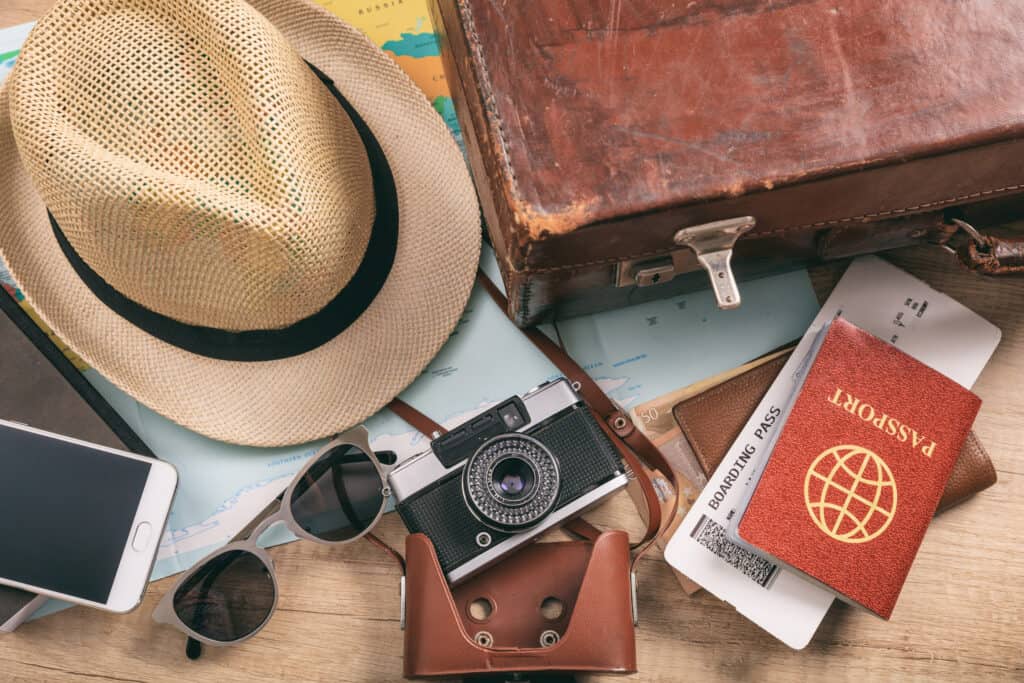
The Best Apps and Resources for Language Learning
If you are interested in learning a new language, here are a few apps and resources I think may be the most helpful to you:
As I mentioned in my post on Spanish p hrases , practicing is really key to feeling comfortable using a new language. You can practice with native speakers by using my favorite language resource, iTalki . On this site you can practice with a tutor, formal teacher, or others just seeking to do a language exchange (for free!). It is hands down the best way to expand your language skills.
This app is best for improving your reading comprehension. And believe it or not, improving your reading comprehension is maybe the best way to consistently expand your vocabulary. (Consider how babies learn languages). On this app, you are provided with videos that come with captions to help you pick up on the vocabulary that you hear. Try Lingopie today !
While I can’t recommend Duolingo alone for learning a langauge, I recommend using this free app to expand and practice your vocabulary in a new language. Note, there is a paid option, but I think the free version is all that you need with this one.
Even better for building vocabulary is Drops, in my opinion. It has a variety of more real-life categories that you can opt for yourself to learn from. You do have to pay an annual fee, but it is absolutely worth it.
Google Translate
If you don’t have time to learn a language before you travel . I recommend using one of the best translation apps out there – Google Translate. This app does wanders for picking up live conversations so you can chat with people like taxi drivers or other new friends in the local language. Even if it is a little indirect.
FAQs About Travel in Different Languages
The root word for “travel” is derived from the Old French word “travailler,” which means “to work, labor, toil, or journey.” Interestingly, it originally denoted the strenuous nature of medieval journeying. Hence, travel inherently carries the essence of a laborious journey.
The word for longing for travel is “wanderlust.” Wanderlust can also be described as a wistful longing for travel as well.
The Old English word for travel is “faran,” which essentially means to journey or to go. It conveys the sense of moving from one place to another, much like the modern term ‘travel’.
Journey Voyage Tour Trip Expedition Trek Roam Navigate Wander Cruise
Travel itch Fernweh Desire to travel Travel bug Itchy feet Globetrotting Adventurousness Nomadism Exploration obsession Journeying passion
In Summary | Travel in Different Languages
I hope that this post has inspired you to explore languages more, or at the very least, inspired you to experience a bit of wanderlust. Learning how to say words like travel in different languages is the start to breaking down language barriers and is a great way to get to know new people in any new place. I hope you will now begin to channel your love of travel into something fruitful, such as learning a second language.
More Words in Different Langauges
- I Love You in Different Languages
- Goodbye in Different Languages
Interested in Learning More? Check Out these Travel Language Guides:
- Spanish for travel
- Portuguese for travel
- Japanese for travel
- Greek for travel
- French for travel
- Italian for travel
- Thai for travel
- Languages and travel
Don’t forget to pin this for later!

Christen Thomas is the founder of TravelWanderGrow, established in 2018. She has lived abroad and traveled extensively to over 30 countries. In addition, she is a certified Travel Advisor and is an expert in planning trips focused on city history and culture. As a frequent traveler, she also shares tips on how to prepare to travel well and how to save money while doing so.
Leave a Reply Cancel reply
Your email address will not be published. Required fields are marked *
Travel in Different Languages. Learn How to Say and Translate
Travel in Different Languages: Please find below many ways to say travel in different languages. This page features translation of the word "travel" to over 100 other languages. We also invite you to listen to audio pronunciation in more than 40 languages, so you could learn how to pronounce travel and how to read it.
Saying Travel in European Languages
Saying travel in asian languages, saying travel in middle-eastern languages, saying travel in african languages, saying travel in austronesian languages, saying travel in other foreign languages.
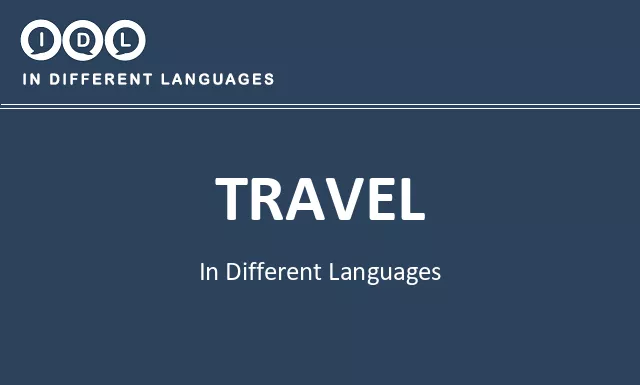
- travel agency
- travel agent
150+ Most Beautiful Words in the World
Disclaimer: This article includes affiliate links to the products we earnestly love and recommend, meaning at no extra cost to you, we might make a teeny-weeny commission if you click on the link and decide to buy something. The money will be used to sustain this little cozy blog we call our virtual home.
Are you a logophile (a lover of words) ? Do you hoard words? Are you a word nerd? Do you believe in epeolatry (the worship of words) ? Then you’re in the right place. This list of unusual and beautiful words with deep meanings will not only enrich your vocabulary but also allow you to perceive the world differently.
Words are powerful. They have a way of transforming people and their lives. Words inspire, stir, challenge, move, touch, and intrigue us.
Words are beautiful. What makes a word beautiful and pretty? Well, a fine blend of sound and meaning makes a word beautiful. The pleasantness of the word’s sound is called eutony . So aesthetically pleasing words are not only pretty sounding words but have a beautiful meaning as well.
Did you know there’s a word that has no one meaning? It’s Eglaf . It can be used in place of any other word and describes many things.
I’ve compiled a list of unusual words with beautiful meanings that stir my mind and soul. Apart from my favorite beautiful English words , the list has foreign words with beautiful meaning s that I learned during my years of travels to different countries. Most of them are simply untranslatable into English but perfectly translate hard-to-be-expressed-in-words emotions.
✈️ 100 Unique and Creative Travel Words with Beautiful Meanings
Want to add mellifluous, invigorating, heartfelt, and the most beautiful words in the world to your vocabulary? Arm yourself with these unique words in different languages and thank me later 🙂 Let’s get going with these prettiest words !
Beautiful Words in Different Languages with Beautiful Meanings
#1 mellifluous (adj.).
Pronunciation: muh-li-floo-uhs Origin: Latin Definition: A sound that’s pleasing and sweet to hear
#2 Apricity (n.)
Pronunciation: a-PRIS-i-tee Origin: Latin Definition: The warmth of the sun in winter
#3 Rakuyou (n.)
Pronunciation: ra-ku-yo Origin: Japanese (落葉 ) Definition: Golden fallen or shedded leaves
🍂 Now that we are talking about our favorite season (Autumn), how can we not talk about the beautiful East Coast Fall Destinations ? Nothing is more autumnal than going for a stroll with crisp golden fallen or shredded leaves beneath your feet!
#4 Retrouvailles (n.)
Pronunciation: ruh-troov-eye Origin: French Definition: The happiness of meeting again after a long time
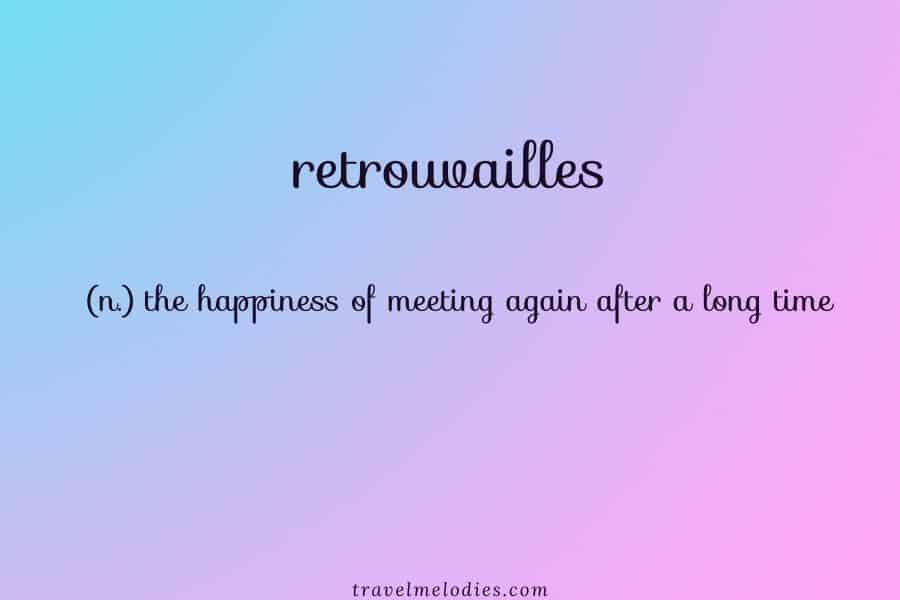
#5 Hitoritabi (n.)
Origin: Japanese Definition: Traveling alone, solitary journey
#6 Luftmensch (n.)
Pronunciation: LOOFT-mensh Origin: Yiddish Definition: An impractical dreamer, literally an air person, someone with her head in the clouds
#7 Raconteur (n.)
Pronunciation: ra-kawn-tuh Origin: French Definition: A talented storyteller who’s able to spin amusing tales from everyday tales; A person who tells anecdotes skillfully and amusingly
#8 Sirimiri (n.)
Pronunciation: si-ri-mi-ri Origin: Spanish Definition: A light rain; A fine drizzle; Stronger than mist but less than a shower
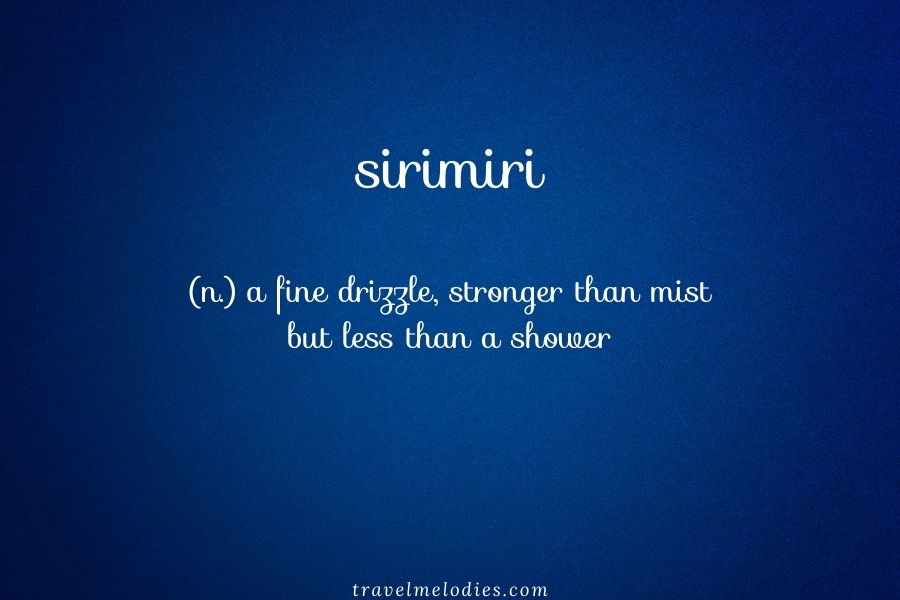
#9 Rimjhim (n.)
Pronunciation: rim-jhim Origin: Sanskrit Definition: The pitter-patter of a drizzle
#10 Petrichor (n.)
Pronunciation: PET-ri-kuhr Origin: Greek Definition: The mild and pleasant smell or scent of earth associated with the first rain after a dry spell
✨ 14 Beautiful Norwegian Words We Need in English Now!
#11 Morii (n.)
Origin: The Dictionary of Obscure Sorrows Definition: The desire to capture a fleeting moment
✈️ Travel Quotes to Inspire Wanderlust
#12 Fernweh (n.)
Pronunciation: FEIRN-veyh Origin: German Definition: An ache for distant places; A strong desire to travel to far-off places; Being homesick for a place you’ve never been; A longing for unseen places even stronger than wanderlust
✨ Beautiful Swedish Words
#13 Resfeber (n.)
Pronunciation: RACE-fay-ber Origin: Swedish Definition: The restless race of the traveler’s heart before the journey begins, when anxiety and anticipation are tangled together; A travel fever that can manifest as an illness
#14 Nefelibata (n.)
Pronunciation: ne-fe-lE-‘ba-ta Origin: Portuguese Definition: Translates to “cloud-walker”; Colloquially “daydreamer”; One who lives in the clouds of their imagination or dreams; One who does not obey the conventions of society, literature, or art.
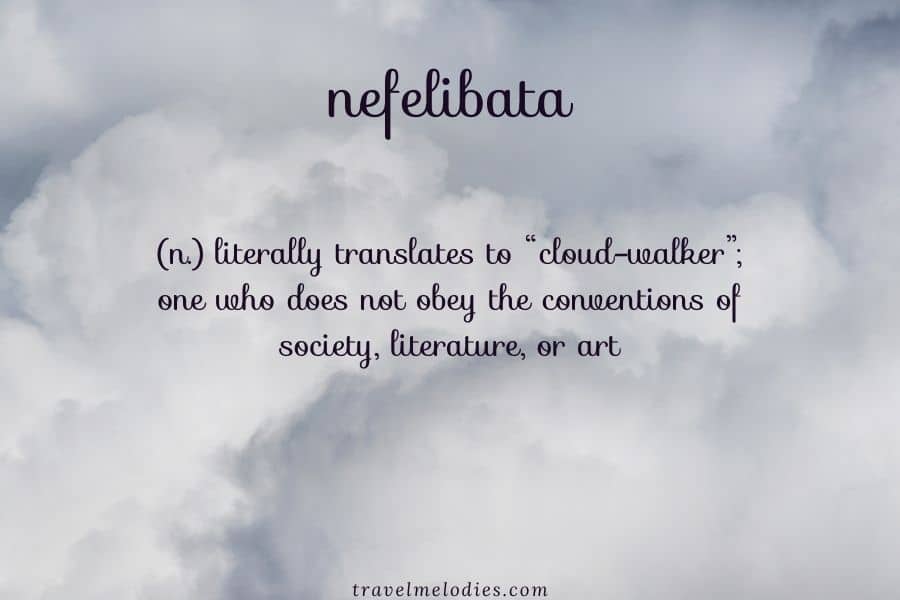
#15 Smultronställe (n.)
Pronunciation: “smUl-tron-‘stel-e Origin: Swedish Definition: Literally “place of wild strawberries” a special place discovered, treasured, and returned to for solace and relaxation; A personal idyll free from stress or sadness.
#16 Dustsceawung (n.)
Pronunciation: ‘dUst-shA-a-wung (DOOST-shay-ah-wung) Origin: Old English Definition: Literally “contemplation of the dust”; Reflection on former civilizations and people, and on the knowledge that all things will turn to dust
#17 Heliophilia (n.)
Pronunciation: hE-lE-O-‘fil-E-a Origin: Greek Definition: Desire to stay in the sun; Love of sunlight
#18 Nakakapagpabagabag (adj.)
Pronunciation: na-ka-ka-PAG-pa-ba-ga-bag Origin: Tagalog (Filipino) Definition: Worrisome
PS: It’s hard to pronounce for native speakers too so don’t worry if you can’t 🙂 Such a variety of pretty words in other languages.
#19 Brontide (n.)
Pronunciation: bron-tahyd Origin: Greek Definition: The low rumble of distant thunder
#20 Aesthete (n.)
Pronunciation: “es-THEt (ess-THEET) Origin: Greek Definition: Someone who cultivates an unusually high sensitivity to beauty, as in art or nature

#21 Sophrosyne (n.)
Pronunciation: sō-fros′i-nē (suh-FROS-uh-nee) Origin: Greek Definition: Soundness of mind, characterized by moderation, self-control, and prudence
#22 Elysian (adj.)
Pronunciation: uh-li-zee-uhn Origin: Greek Definition: Beautiful or creative; Divinely inspired; Peaceful and perfect
#23 Mångata (n.)
Pronunciation: moon-gah-ta Origin: Swedish Definition: The glimmering roadlike reflection of the moon on the water
#24 Koi no yokan (n.)
Pronunciation: koy-noh-yo-kin Origin: Japanese Definition: Translates to “premonition of love”; The extraordinary sense one has upon first meeting someone that they will one day fall in love
#25 Abditory (n.)
Origin: Latin Definition: A place into which you can disappear; A hiding place
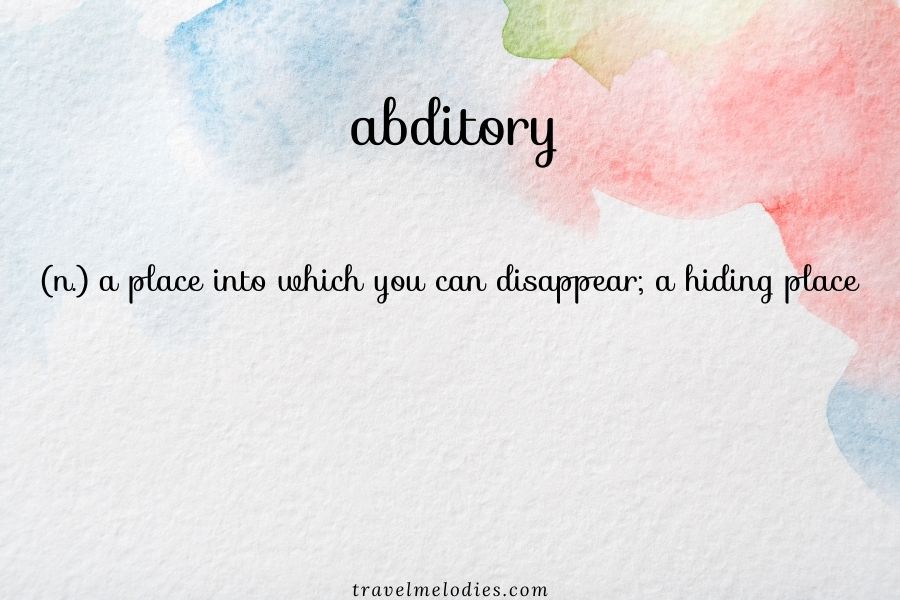
#26 Flawsome (adj.)
Pronunciation: flaw-suhm Origin: coined by the supermodel, Tyra Banks in their show ANTM (America’s Next Top Model) Definition: an individual who embraces their quirks and flaws and knows they are awesome regardless
#27 Datsuzoku (n.)
Pronunciation: thatza-zoku Origin: Japanese Definition: An escape from your everyday routine
#28 Rame (adj.)
Pronunciation: ra:mé Origin: Balinese Definition: Something that’s both chaotic and joyful at the same time
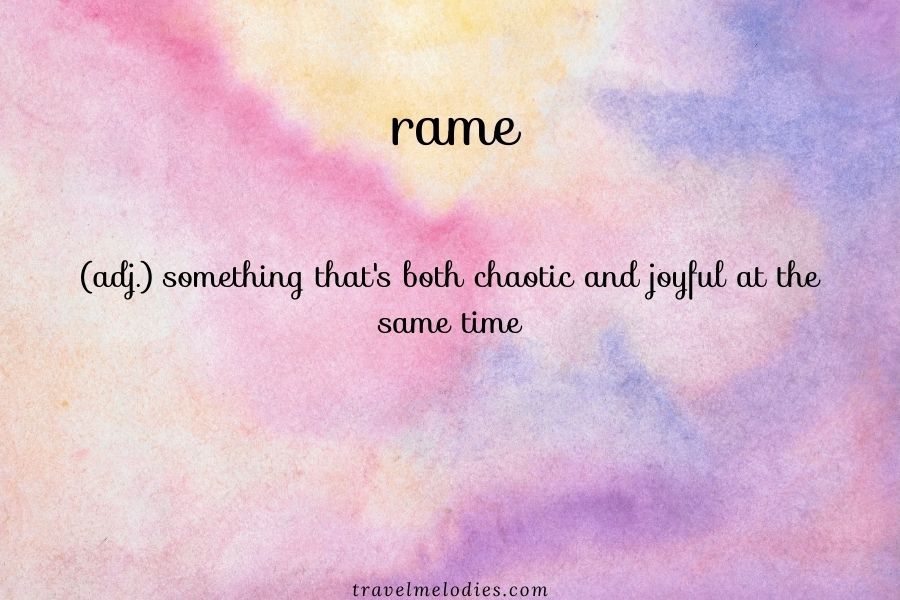
#29 Vacilando (v.)
Origin: Spanish Definition: To wander or travel with the knowledge that the journey is more important than the destination
#30 Lehitkalev (v.)
Origin: Hebrew Definition: Literally “to dog it”; To put up with a lower standard of uncomfortable conditions of living or travel
#31 Komorebi (n.)
Pronunciation: KOH-MOH-REHB-i Origin: Japanese Definition: The effect of sunlight filtering through the leaves of trees; The interplay of the aesthetics between the light and the leaves when sunlight shines through trees
#32 Metanoia (n.)
Pronunciation: meh-tah-NOY-ah Origin: Greek Definition: The journey of changing one’s mind, heart, self, or way of life; Spiritual conversation
#33 Peregrinate (v.)
Pronunciation: PAIR-uh-gruh-nayt Origin: Latin Definition: To travel or wander from place to place
#34 Perambulate (v.)
Pronunciation: puh-ram-byoo-leit Origin: Latin Definition: to walk or travel through or around a place or area, especially for pleasure and in a leisurely way
#35 Peripatetic (n.)
Pronunciation: peh-ruh-puh-teh-tuhk Origin: Greek Definition: One who walks about; A nomad; An itinerant
#36 Shinrin-yoku (n.)
Pronunciation: shindin-yoku Origin: Japanese Definition: To go deep into the woods for its restorative benefits; The Japanese way of forest bathing as nature therapy for peace of mind, restful sleep, and physical health
#37 Shinrabansho (n.)
Pronunciation: shi-nra-banshoo Origin: Japanese Definition: Translates to “All nature”; everything that exists in the universe
#38 Flâneur (n.)
Pronunciation: flah-neur Origin: French Definition: Someone who saunters or ambles around aimlessly but enjoyably observing life and his surroundings
#39 Gadabout (n.)
Pronunciation: gad-uh-bout Origin: Middle English Definition: A person who travels often or to many different places, especially for pleasure
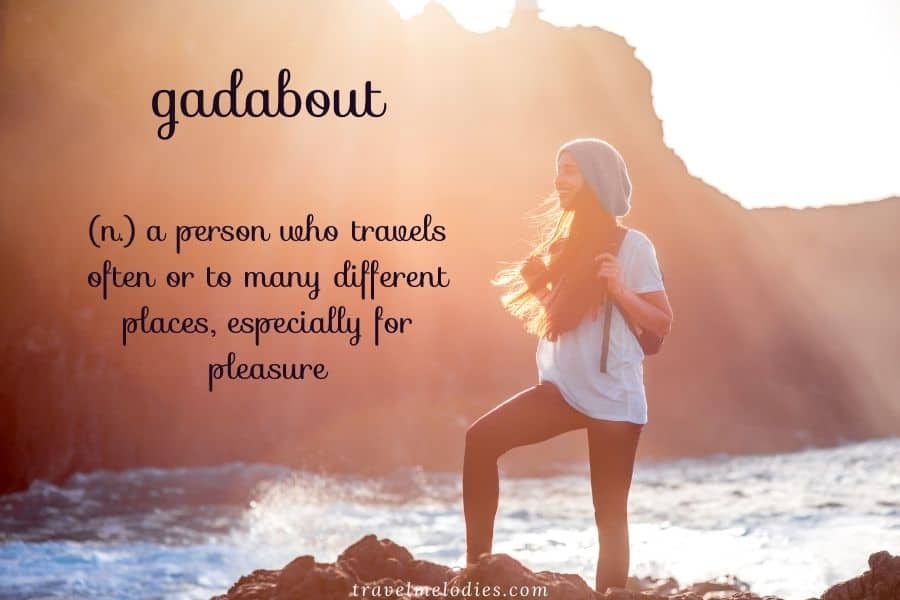
#40 Hiraeth (n.)
Pronunciation: heer-eye-th Origin: Welsh Definition: A homesickness for a home to which you cannot return, a home which maybe never was; The nostalgia, the yearning, the grief for the lost places of your past
#41 Toska (n.)
Pronunciation: tuh-skah Origin: Russian Definition: The ache of the soul; Longing with nothing to long for
#42 Dépaysement (n.)
Pronunciation: depeizmɑ̃ Origin: French Definition: Change of scene, disorientation, culture shock; Feeling that comes from being away from your own home country, in a foreign land, surrounded by strangers; The sense of being a fish out of water
#43 Dès vu (n.)
Origin: French Definition: Translates to ” seen as soon as”; The awareness that this will become a memory
# 44 Rasāsvāda (n.)
Pronunciation: ra-sas-vah-da Origin: Sanskrit Definition: Translates to appreciating the taste and flavor of juice; Perception of pleasure; The taste of bliss in the absence of all thoughts
#45 Cynefin (n.)
Pronunciation: ku-nev-in Origin: Welsh Definition: Translates to “habitat”; A place or the time when we instinctively belong or feel most connected; The artist Kyffin Williams described it as a relationship: the place of your birth and of your upbringing, the environment in which you live and to which you are naturally acclimatized
#46 Safarnama (n.)
Pronunciation: su-fur-nama Origin: Persian Definition: Travelogue; An account of the travels

✨ We have a Safarnama . Do you?
#47 Saudade (n.)
Pronunciation: ‘sau-“da-dE Origin: Portuguese Definition: “the love that remains” even after someone is gone; a nostalgic or melancholic longing to be near again to something or someone distant, or that has been loved and then lost
#48 Yūgen (n.) Pronunciation: yoo-gehn Origin: Japanese Definition: A profound and mysterious sense of the beauty and awareness of the universe that triggers a deep emotional response
#49 Wabi-Sabi (n.)
Pronunciation: wah-bee-sah-bee Origin: Japanese Definition: A Japanese concept and art of imperfect beauty; The discovery of beauty within the imperfections of life and art; the acceptance of the cycle of life and death

#50 Ukiyo (n.)
Pronunciation: u-key-yo Origin: Japanese Definition: Literally translates to “the floating world”; Living in the moment, detached from the bothers of life
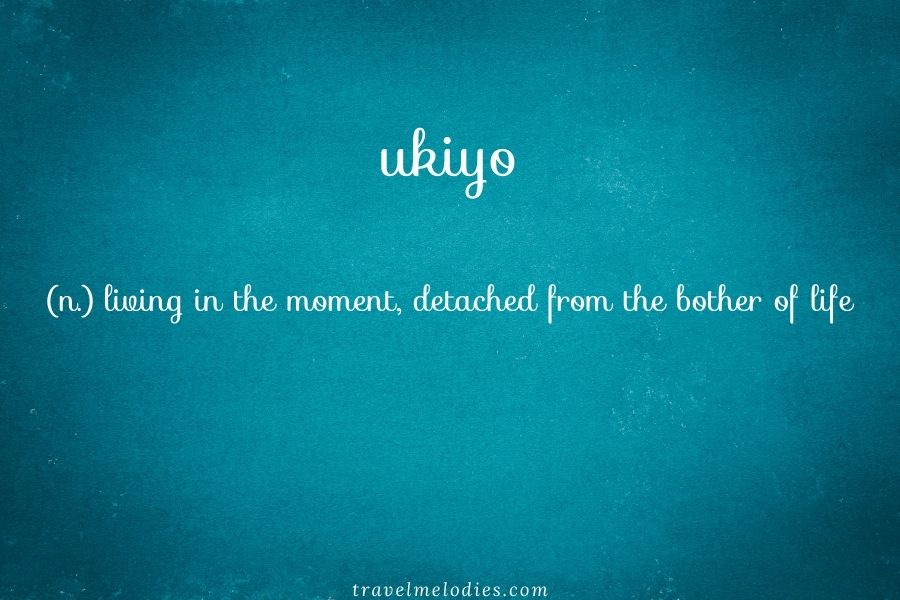
#51 Ikigai (n.)
Pronunciation: ee-kee-guy Origin: Japanese Definition: A Japanese concept translates to “a reason for being”; a reason to get up in the morning’, to enjoy the meaning of life – passion, purpose, something one lives for
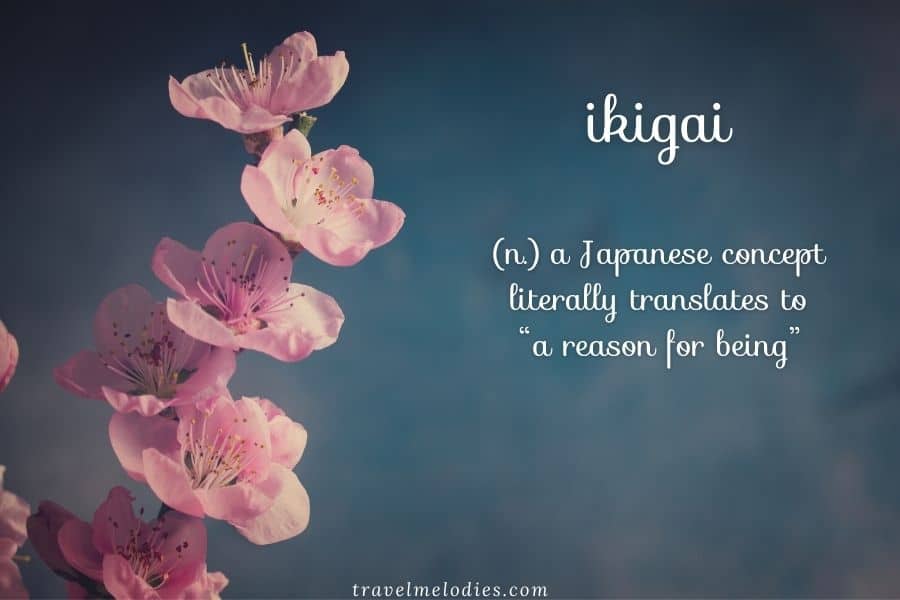
#52 Apprivoise (adj.)
Pronunciation: ap-privoise Origin: French Definition: Translates to “to tame”; To form a bond with one another; to become known to each other through small moments
We are halfway through these best words. Are you also loving these beautiful foreign words?
#53 Wu wei (n.)
Pronunciation: woo-wey Origin: Chinese Definition: A Chinese concept and art of conscious non-action; literally translates to “inexertion”, “inaction”, “effortless action”, or “action without action”; To embrace the flow instead of an effort to achieve a result; A deliberate and principled decision to do nothing for a reason

#54 Còsagach (n.)
Pronunciation: coze-a-goch Origin: Scottish Gaelic Definition: Scottish hygge; A feeling of being snug, sheltered, and warm, inspired by fluffy rugs, cozy fires, outdoor hot tubs, and wood-burning stoves; Finding comfort in life’s simple pleasures
#55 Lagom (adv.)
Pronunciation: la-gum Origin: Swedish Definition: Translates to “in moderation”, “in balance”, “perfectly simple”, “just enough”, and “suitable”; The Swedish concept of having just the right amount; not too much, not too little, just right
#56 Gigil (n.)
Pronunciation: GHEE-gheel Origin: Filipino Definition: The overwhelming urge to squeeze or pinch something irresistibly cute and adorable
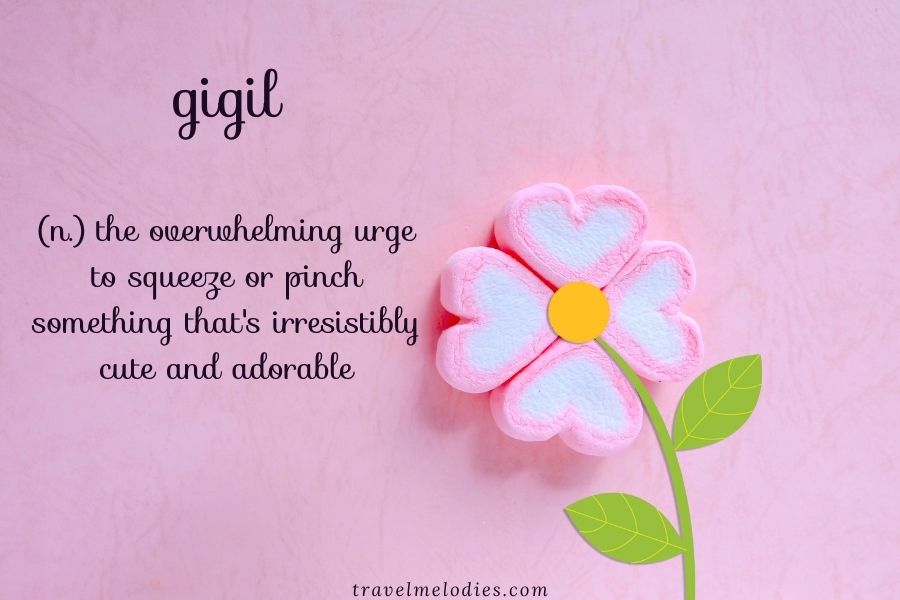
#57 Ataraxia (n.)
Pronunciation: at-uh-rak-see-uh Origin: Greek Definition: A state of freedom from emotional disturbance and anxiety; Tranquility or untroubled mind
✈️ Here’s a list of amazing places to visit around the world for a traveler (Musafir) in you!
#58 Musafir (n.)
Pronunciation: musa-fir Origin: Arabic Definition: Traveler
#59 Wayfarer (n.)
Pronunciation: wey-fair-er Origin: English Definition: Someone who travels, especially on foot
#60 Absquatulate (v.)
Pronunciation: ab-skwoch-uh-leyt Origin: North American English Definition: To leave without saying goodbye; Leave abruptly

✈️👪 40 Inspiring Quotes about Family Travel
#61 Wanderlust (n.)
Pronunciation: won-der-luhst Origin: German Definition: A strong, innate desire to travel and explore the world
🍻☀️ Fancy a beer outside? What’s better than enjoying one under the Midnight Sun in the Finnish Lapland ?
#62 Utepils (n.)
Pronunciation: OOH-ta-pilz Origin: Norwegian Definition: Translates to “outdoors lager”; To sit outside enjoying a beer on a sunny day
#63 Ballagàrraidh (n.)
Pronunciation: bal-la-ga-rye Origin: coined by The Dictionary of Obscure Sorrows inspired by the Scottish Gaelic word – balla gàrraidh Definition: Literally translates to the “garden wall”; The awareness that you are not at home in the wilderness
#64 Acatalepsy (n.)
Pronunciation: ey-kat-l-ep-see Origin: Greek Definition: The impossibility of comprehending the universe; The incomprehensibility of things; The belief that human knowledge can never have true certainty
#65 Waldeinsamkeit (n.)
Pronunciation: VALD-eye-n-zam-kite Origin: German Definition: Forest solitude; The feeling of being alone in the woods
#66 Cockaigne (n.)
Pronunciation: kaw-KAYN Origin: French Definition: Translates to “the land of plenty”; An imaginary or a fabled land of luxury and idleness
#67 Sonder (v.)
Pronunciation: sohn-dehrr Origin: coined by John Koeing of The Dictionary of Obscure Sorrows inspired by the German and French word – sonder Definition: The realization that each passerby has a life as vivid and complex as your own
#68 Boketto (v.)
Pronunciation: bo-ke-tto Origin: Japanese Definition: The act of gazing vacantly into the distance without a thought
#69 Sprachgefühl (n.)
Pronunciation: SHPRAHKH-guh-fuel Origin: German Definition: The character and spirit of a language; An intuitive sense of the rule and rhythm of language
#70 Solivagant (n.)
Pronunciation: “sO-li-‘vA-gant Origin: Latin Definition: A solitary wanderer; someone who wanders alone
#71 Sehnsucht (n.)
Pronunciation: zEn-‘zUkt Origin: German Definition: A wistful longing or indescribable yearning in the heart for we know not what
#72 Serendipity (n.)
Pronunciation: seh-ruhn-DI-puh-tee Origin: English Definition: To find something good without looking for it; To discover something beautiful by chance or accidentally
#73 Mudita (n.)
Pronunciation: Muw-DIY-Taa Origin: Sanskrit Definition: Translates to “pure joy”; Sympathetic, vicarious joy; Taking delight in the happiness, success, and well-being of others
#74 Tsundoku (n.)
Pronunciation: tsoon-DOH-koo Origin: Japanese Definition: The art of buying books and leaving them unread, often piled together with other unread books; Book hoarding
#75 Voorpret (n.)
Pronunciation: VOR – pret Origin: Dutch Definition: Pre-fun; The sense of enjoyment felt before a party or event takes place; joy or pleasure ahead and in anticipation of the actual fun event
#76 Meraki (v.)
Pronunciation: may-rah-kee Origin: Greek Definition: To do something with soul, creativity, or love; to leave a piece and essence of yourself in your work
#77 Hanyauku (v.)
Pronunciation: ha-ahn-yoh-kuu Origin: Kwangali (Namibia) Definition: To walk on tiptoes across hot sand
#78 Jazba (n.)
Pronunciation: jaẕ-bā Origin: Arabic Definition: Strong desire or passion or emotion or sentiment
#79 Drapetomania (n.)
Pronunciation: drap-et-O-mAn-E-a Origin: Greek Definition: An overwhelming urge to run away
#80 Querencia (n.)
Pronunciation: kweeuh-ruhn-see-uh Origin: Spanish Definition: A place where you are your most authentic self; A place from which your strength of character is drawn, where you feel safe, where you feel at home

#81 Quaquaversal (adj.)
Pronunciation: kwey-kwuh-VUR-suh l Origin: Latin Definition: Moving or happening in every direction instantaneously toward a center
#82 Heimweh (n.)
Pronunciation: heim·veyh Origin: German Definition: Homesickness; Longing for home; Nostalgia
#83 Heimat (n.)
Pronunciation: hai-mat Origin: German Definition: A place that you can call home; A sense of belongingness, acceptance, safety, and connection to the homeland.
#84 Dérive (n.)
Pronunciation: dih-rih-vee Origin: French Definition: Translates to “drift”; A spontaneous and unplanned journey where the traveler leaves their life behind for a time to let the spirit of landscape and architecture attract and move them
🏝️ Does this ever happen to you? I felt that drift when I visited the Vis Island in Croatia .
#85 Photophile (n.)
Pronunciation: pho-to-phile Origin: English Definition: Derived from the biological term “photophilic” for an organism that thrives in full light, it means a person who loves photography and light
#86 Ecophobia (n.)
Pronunciation: ih-ko-foh-bee-uh Origin: Greek Definition: A fear or dislike of one’s home
#87 Numinous (adj.)
Pronunciation: ‘nU-mi-nus Origin: Latin Definition: Translates to “divinity”; Describes an experience (mostly spiritual) that makes you fearful yet fascinated, awed yet attracted – the powerful, personal feeling of being overwhelmed and inspired
#88 Schwellenangst (n.)
Pronunciation: ‘shwel-en-ahngst Origin: German Definition: Fear of crossing a threshold to begin a new chapter; Fear of new things
#89 Strikhedonia (n.)
Pronunciation: “strik-he-‘dOn-E-a Origin: Greek Definition: The pleasure of being able to say “to hell with it”
#90 Vagary (n.)
Pronunciation: vuh-gair-ee, vey-guh-ree Origin: Latin Definition: An unpredictable instance, a wandering journey; A whimsical, wild, unusual idea, desire, or action
#91 Livsnjutare (n.)
Pronunciation: lives-noo-tuhreh Origin: Swedish Definition: Literally meaning, “enjoyer of life”, This describes someone who loves life deeply and lives it to the extreme
#92 Commuovere (v.)
Pronunciation: com-muò-ve-re Origin: Italian Definition: To stir, to touch, to move to tears; To be moved in a heartwarming way, usually relating to a story that moved you to tears
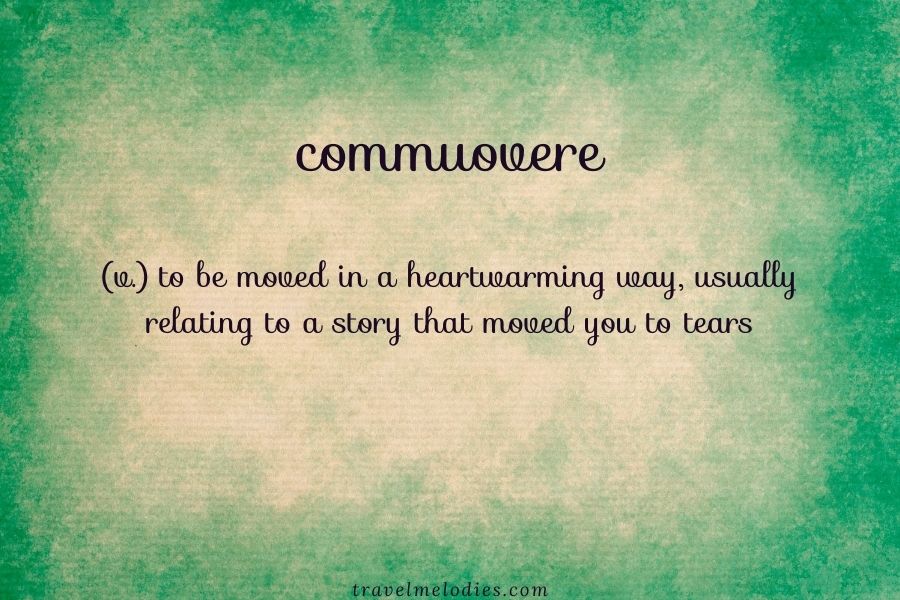
#93 Abendrot (n.)
Pronunctaion: A-bend-rot Origin: German Definition: Translates to “evening red”; The color of the sky while the sun is setting
#94 Serein (n.)
Pronunciation: suh-RAN Origin: French Definition: The fine, light rain that falls from a clear sky in the twilight hours after sunset or in the early hours of the night; Evening serenity
🌇 Sunset Quotes and Sunset Captions for Instagram
#95 Erlebnisse (n.)
Pronunciation: Ar-‘lEb-nis-e (ayr-LEEB-nis-eh) Origin: German Definition: The experiences, positive or negative, that we feel most deeply, and through which we truly live; Not mere experiences, but EXPERIENCES
#96 Astrophile (n.)
Pronunciation: as-trophile Origin: English Definition: A person who loves stars
🌃 Are you Astrophile? Then, you must take this epic stargazing road trip in Colorado!
#97 Psithurism (n.)
Pronunciation: sith-your-ism Origin: Greek Definition: The sound of the leaves rustling as the wind blows through the trees
#98 Trouvaille (n.)
Pronunciation: trU-‘vI Origin: French Definition: A chance encounter with something wonderful
#99 Hygge (n.)
Pronunciation: hue-guh Origin: Danish Definition: The warm feeling you get while enjoying the company of great friends and all life has to offer
🧣 Discover and experience the Danish concept of Hygge in Copenhagen ! Hey, and also take a look at the beautiful Danish words !
#100 Onism (n.)
Origin: Danish Definition: The awareness of how little of the world you’ll experience; The frustration of being stuck in just one body that inhabits only one place at a time
#101 Rückkehrunruhe (n.)
Pronuciation: rück·keh·run·ru·he, Rukeerenruhee The feeling of returning home after an immersive trip only to find it fading rapidly from your awareness The Dictionary of Obscure Sorrows defines – the feeling of returning home after an immersive trip only to find it fading rapidly from your awareness—to the extent you have to keep reminding yourself that it happened at all, even though it felt so vivid just days ago—which makes you wish you could smoothly cross-dissolve back into everyday life, or just hold the shutter open indefinitely and let one scene become superimposed on the next, so all your days would run together and you’d never have to call cut .
#102 Vemödalen (n.)
Pronunciation: ve·mö·da·len Origin: Swedish Definition: The fear that everything has already been done The Dictionary of Obscure Sorrows defines – The frustration of photographing something amazing when thousands of identical photos already exist—the same sunset, same waterfall, same curve of a hip, same closeup of an eye—which can turn a unique subject into something hollow and pulpy and cheap, like a mass-produced piece of furniture you happen to have assembled yourself.
#103 Kopfkino (n.)
Pronunciation: kopf·ki·no Origin: German Definition: Literally translates to “head cinema”; It’s the act of playing out an entire scenario in your mind
#104 Quaintrelle (n.)
Pronunciation: quAn-‘trel Origin: Middle English Definition: A woman who emphasizes a life of passion expressed through personal style, leisurely pastimes, charm, and cultivation of life’s pleasures
#105 Pulchritudinous (adj.)
Pronunciation: pul-kruh-TOO-di-nuhs Origin: English Definition: Beyond beautiful; A person of breathtaking, heartbreaking beauty
#106 Yoko Meshi (n.)
Pronunciation: yoh–koh mesh-ee Origin: Japanese Definition: Translates to “a meal eaten sideways”; It’s a beautiful and untranslatable word that describes the stress of speaking a foreign language.
#107 Selcouth (adj.)
Pronunciation: sel′ko̅o̅th′ Origin: Old English Definition: Unfamiliar, rare, and strange, yet marvelous and wondrous; The way we feel the sense of wonder and amazement when we see and experience something new and unusual whilst traveling
🏞️ The selcouth beauty of Plitvice Lakes National Park left us awestruck!
#108 Monachopsis ( n. )
Pronunciation: mona-chop-sis, MON-a-Cop-sis Origin: Greek Definition: The subtle but persistent feeling of being out of place, not fitting in
#109 Eudaimonia (n.)
Pronunciation: U-de-‘mOn-E Origin: Greek Definition: Literally translates to “human flourishing;” A contented state of being happy, healthy, and prosperous; The way we feel while traveling
#110 Natsukashii (adj.)
Pronunciation: nats-ka-‘shE, nahtzkah-SHEE Origin: Japanese ( 懐かしい ) Definition: Feeling nostalgic; Bringing back happy memories of the past
#111 Coddiwomple (v.)
Pronunciation: KAHD-ee-wahm-puhl Origin: English slang Definition: To travel purposefully toward an unknown or vague destination
#112 Novaturient (adj.)
Pronunciation: nuh-vuh-nyoo-tree-uhnt Origin: Latin Definition: Desiring or seeking powerful change in one’s life, behavior, or a certain situation

#113 Eleutheromania (n.) Pronunciation: el-U-“ther-O-‘mAn-E-a Origin: Greek Definition: An intense and irresistible desire for freedom
#114 Eunoia (n.)
Pronunciation: yoo-noy-iea Origin: Greek Definition: Beautiful thinking; A well mind
Out of the beautiful words in English , Did you know Eunoia is the shortest English word containing all five main vowel graphemes ?
#115 Sturmfrei (adj.)
Pronuciation: stirm-fra Origin: Germany Definition: Literally translates to “storm-free”; the freedom of being alone and being able to do what your heart desires

#116 Nemophilist (n.)
Pronunciation: ne-‘mo-fe-list Origin: Greek Definition: One who loves the beauty and solitude of forest; a haunter of the woods
🏞️ Do you identify yourself as a Nemophilist? You must then plan a trip to one of the best national parks in the world .
# 117 Halcyon (adj.)
Pronunciation: hal-see-uhn Origin: Greek Definition: A period in the past that was idyllically happy and peaceful
#118 Thalassophile (n.)
Pronunciation: thal-uh-suh-fīl Origin: Greek Definition: A lover of the sea or ocean
🌊 You aren’t a thalassophile if you haven’t visited Greece, Croatia , and Sri Lanka 🙂
#119 Fika (n.)
Pronunciation: fee-ka Origin: Swedish Definition: Almost like a ritual in Swedish culture, it’s sharing a cup of coffee (or tea) and cake with friends or colleagues
#120 Ogooglebar (adj.)
Origin: Swedish Definition: Ungoogleable, someone or something that doesn’t show up in Google search results
#121 Gluggaveður (n.)
Pronunciation: glook-ah-vay-ther Origin: Icelandic Definition: Literally translates to “window-weather,” the type of weather that is best appreciated indoors
#122 Arbejdsglæde (n.)
Pronunciation: ah-bites-gleh-the Origin: Danish Definition: Translates to “happiness at work,” when your work is a source of joy and happiness

#123 Vorfreude (n.)
Pronunciation: vor-freude Origin: German Definition: The joyful, intense anticipation that comes from imagining future pleasure s
#124 Brumous (adj.)
Pronunciation: bru·mous Origin: Literary English Definition: Of gray skies and winter days, filled with heavy clouds or fog
❄️🧤 Craving the cozy feel of a brumous day (no pun intended)? Head to one of the best winter destinations in the USA . Is Europe in mind? No problem. We even have a list of the best winter destinations in Europe for you.
#125 Hodophile (adj.)
Pronunciation: how-doh-phile Origin: Greek Definition: The one who loves to travel; A traveler with a special affinity for roads
🛣️ The Ultimate List of Road Quotes for Road Trippers
#126 Ubuntu (n.)
Pronunciation: oo-buhn-too Origin: Nguni, South African Definition: Translates to “humanity”; It’s the belief that we all are defined by our compassion and humanity towards others
#127 Nunchi (n.)
Pronunciation: noon-chee Origin: Korean Definition: Translates to “eye-measure”; It’s a subtle art and ability to listen and gauge others’ moods and react appropriately

#128 Arcane (adj.)
Pronunciation: aa-kein Origin: Latin Definition: Secret, Mysterious, Understood by few
#129 Kaulayaw (n.)
Pronunciation: kauli-haw Origin: Filipino or Tagalog Definition: Intimate or close companion or friend
#130 Kos (n.)
Pronunciation: coosh Origin: Norwegian Definition: Danish hygge; coziness; all things warm and cozy; it can simply mean enjoying a cup of coffee with a freshly baked cinnamon bun, having a good time with family and friends, reading a good book, snuggling in a blanket while it’s snowing outside, or anything that makes you feel purely happy.
❄️🧣☕ Goes without saying, Norway is the best place to discover and experience the Norwegian Hygge.
#131 Ebullience (n.)
Pronunciation: uh·buh·lee·uhns Origin: Latin Definition: The quality of being bubbly, enthusiastic, and exuberant
#132 Goya (n.)
Pronunciation: go-yaa Origin: Persian Definition: As if; A momentary suspension of disbelief that occurs when fantasy is so realistic that it temporarily becomes reality, usually associated with a story very well told; a story that feels like reality
#133 Camhanaich (n.)
Pronunciation: kav’-an-ach Origin: Scots-Gaelic Definition: Early morning twilight; the half-light of dawn or dusk
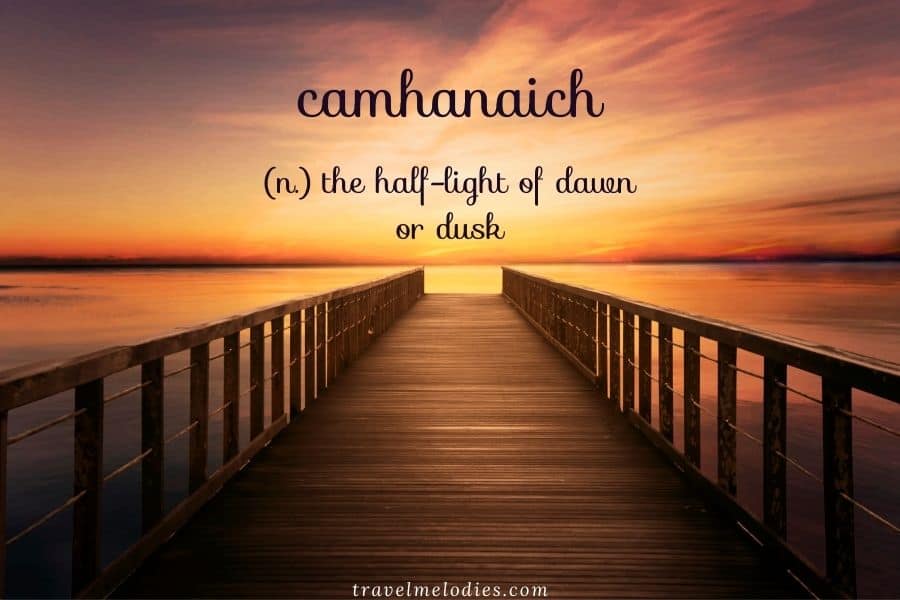
🌅 The Best Sunrise Quotes and Sunrise Captions for Instagram
#134 Kawaakari (n.)
Pronunciation: ka-wa-a-ka-rE Origin: Japanese Definition: The glow of a river or stream in darkness or dusk, the gleaming surface of a shadowed river
#135 Mysa (n.)
Pronunciation: MEE-sah Origin: Swedish, Icelandic Definition: The feeling of comfort and protection; a time dedicated to coziness
#136 Ineffable (adj.)
Pronunciation: uh-NEH-fuh-bl Origin: Late Middle English Definition: Incapable of being expressed in words
#137 Nefarious (adj.)
Pronunciation: nuh-FEUH-ree-uhs Origin: Latin Definition: Wicked, Despicable, Villainous, Evil, Sinful
#138 Somnambulist (n.)
Pronunciation: som-nam-byuh-list Origin: French Definition: A sleepwalker; a person who walks around while they are asleep
#139 Akrasia (n.)
Pronunciation: uh-KRAY-zhuh Origin: Greek Definition: Lack of self-control or the state of acting against one’s better judgment
#140 Zephyr (n.)
Pronunciation: ZEH-fuh Origin: Old English Definition: A breeze from the west; a gentle breeze
#141 Hanan (n.)
Pronunciation: hana-n Origin: Arabic Definition: Compassion and Kindness
#142 Szerelem (n.)
Pronunciation: sze -re -lem Origin: Hungarian Definition: Romantic love
#143 Revontulet (n.)
Pronunciation: Re-von-tu-let Origin: Finnish Definition: Literally translates to Fox Fires; Aurora Borealis; Northern Lights
#144 Yötön yö (n.)
Pronunciation: Yoton-yo Origin: Finnish Definition: Nightless night; Midnight Sun
The summer in Finland is magical. The sun doesn’t go down at all in the northern region of Finland. It’s when you can see the magical Yötön yö.
#145 Elvágyódás (n.)
Pronunciation: El-vagyo-dash Origin: Hungarian Definition: The desire to get away from where you currently are; Aching for what is far away
#146 Sonrisa (n.)
Pronunciation: Sohn-ree-sah Origin: Spanish Definition: Smile
#147 Weltschmerz (n.)
Pronunciation: velt-shmerts Origin: German Definition: Literally translates to translates to “world-weariness” or “world pain”; It’s a melancholic feeling that comes from the realization that the material world can’t ever comfort the emotional and mental desires
#148 Sadiq (n.)
Pronunciation: Saa-duhk Origin: Arabic Definition: Friend; Companion; True; Faithful; Veracious; Sincere; Honest; Loyal
#149 Forelsket (adj.)
Pronunciation: for-el-skit Origin: Danish Definition: Being madly in love – an ineffable euphoria experienced when one’s enamored with someone
#150 Ruhaniyat (n.)
Pronunciation: Ruu-haa-niyat Origin: Arabic Definition: Soulfulness; Spiritualism
#151 Sarang (n.)
Pronunciation: sa-rang Origin: Korean Definition: Love
#152 Ya’aburnee (n.)
Pronunciation: sa-rang Origin: Arabic Definition: Literally translates to – you bury me! But hold up, it’s not as morbid as it sounds! In the context of deep affection or love, saying “Ya’aburnee” is an emotional way to express that you hope to pass away before the person you love because life would be unendurable without them. Yeah, it’s kinda like saying, “I can’t live without you,” but in a more poetic, goosebump-inducing way.
#153 Epiphany (n.)
Pronunciation: uh-pi-fuh-nee Origin: Greek Definition: A sudden realization or insight, like finally understanding why a certain place has been on your bucket list for so long.
#154 Eloquence (n.)
Pronunciation: eh-luh-kwns Origin: Latin Definition: The art of expressive or persuasive speech, the verbal grace that makes a travel story not just heard, but felt.
#155 Felicity (n.)
Pronunciation: fuh-li-suh-tee Origin: Latin Definition: Intense happiness or apt expression, akin to stumbling upon a secret local spot that turns out to be a personal paradise.
#156 Nemesis (n.)
Pronunciation: neh-muh-suhs Origin: Greek Definition: An opponent or rival one can’t overcome, like that elusive destination you’ve always wanted to visit but just can’t seem to get to.
#157 Penumbra (n.)
Pronunciation: peh-nuhm-bruh Origin: Latin Definition: The partial shadow in an eclipse or the gray area between light and darkness, kind of like a dawn or dusk adventure in an unfamiliar city.
#158 Panacea (n.)
Pronunciation: pa-nuh-see-uh Origin: Greek Definition: A universal remedy or cure-all, the aspirin for every ache or the perfect travel hack for every globe-trotter’s woe.
#159 Quintessential (n.)
Pronunciation: kwin-tuh-sen-shl Origin: Latin Definition: The most perfect or typical example of something, like finding that idyllic beach or charming café that embodies the very spirit of a place you’re visiting.
#160 Opalescence (adj.)
Pronunciation: ow-puh-leh-sns Origin: Latin Definition: A shimmering play of colors, much like an opal. It’s that magical quality you see when the setting sun dances on the ocean’s surface during your dream getaway.
#161 Dushi (adj.)
Pronunciation: doo-shee Origin: The specific origin of “Dushi” is not clearly defined, but it’s likely influenced by Iberian languages (Spanish and Portuguese) due to their historical presence in the region. The word reflects the multicultural and linguistic blending that characterizes Papiamento and the cultural history of the Caribbean. Definition: In Papiamento, a language spoken in the Caribbean islands of Aruba, Curaçao, and Bonaire, the word “Dushi” carries a meaning akin to sweet, nice, or good. It is often used affectionately to describe something or someone pleasant, enjoyable, or dear, such as tasty food, a beautiful place, or a loved person.
Papiamento is a Creole language that has evolved from a mixture of African, Portuguese, Spanish, Dutch, and Native American languages.
#162 Kutitap (n.)
Pronunciation: ku·tí·tap Origin: Filipino or Tagalog Definition: Often used to describe the twinkling or sparkling light, similar to the glimmering of stars or the soft flicker of a small light. It conveys a sense of light, sparkle, and brightness.
#163 Şafak (n.)
Pronunciation: sha-fahk Origin: Turkish Definition: The light during dawn or just before the sun rises, marking the start of a new day.
#164 Licnobio (adj.)
Pronunciation: leek-noh-bee-oh Origin: Spanish Definition: This term is used to describe individuals who are active or work during the night hours and rest during the day, similar to nocturnal habits.
#165 Estro (n.)
Pronunciation: es-troh Origin: Portuguese Definition: The creative impulse or inspiration that drives poets and artists in their work.
#166 Ibtida (adj.)
Pronunciation: ib-ti-da Origin: Arabic Definition: Beginning, starting, initiation, or origin
#167 Duende (n.)
Pronunciation: dwen-day Origin: Spanish Definition: It can mean different things. In folklore, it’s like a small, cheeky spirit or fairy or goblin. But in music and dance, like flamenco, it’s about deep feelings and true expression. It’s about feeling really moved, almost like magic.
#168 Seijaku (n.)
Pronunciation: se-ja-ku Origin: Japanese Definition: The word embodies the concept of tranquility and peace. It is most commonly associated with the peacefulness one feels while walking in a serene, open space, like a Japanese garden, reflecting a state of energized calm or stillness
#169 Duša (n.)
Pronunciation: doo-sha Origin: Slavic Definition: Meaning soul or spirit, It is used to refer to an individual’s essence or inner being, and can also be a term of endearment similar to “darling” or “dear”. The word conveys deep emotional and spiritual connotations, reflecting the cultural significance of the concept of the soul in Slavic traditions.
#170 Conte (n.)
Pronunciation: kont Origin: French Definition: Refers to a tale or short story, especially one that involves adventure. It comes from a tradition of oral storytelling and is often dedicated to a single theme.
I’m sure with so many new words added to your vocabulary, it’d be a cinch to describe your emotions, your life, or just you.
Over to you now. Which one of these words do you identify with the most? Would you like to add your favorite word to the list? Share with us in the comments section below.
Thanks for reading. I sincerely hope you enjoyed this post. If yes, would you please share it with the world?
Save the Aesthetic Words to Pinterest
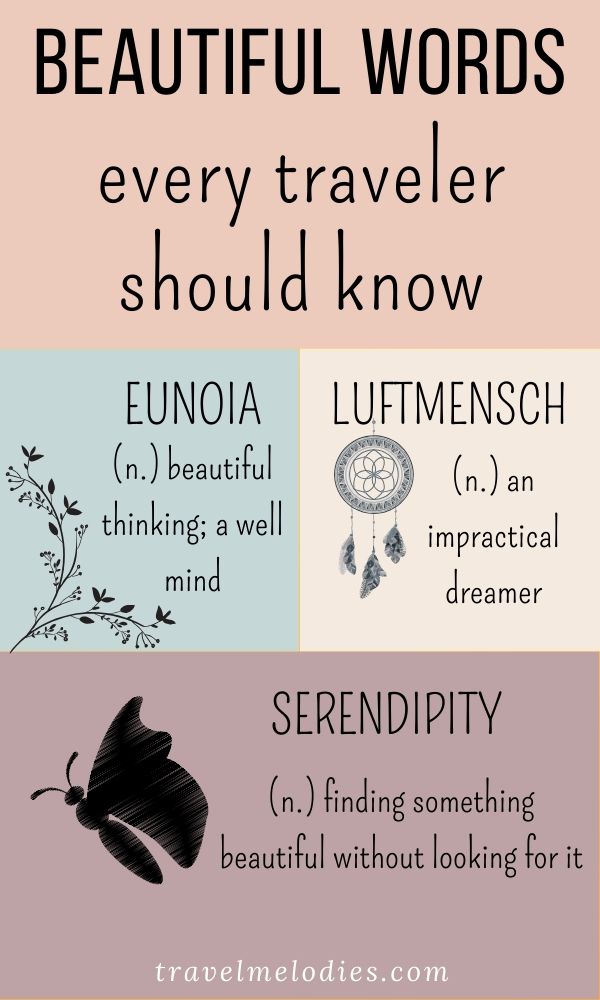
Sharing is nice 🙂 If you have liked our post please share it with your friends and family and feel free to subscribe to our mailing list or you can also follow our stories on Facebook , Instagram , Pinterest , and Twitter .
Anjali Chawla
23 thoughts on “150+ Most Beautiful Words in the World”
hey guys! Great article however I noticed a few mistakes.
#17 Heliophilia (n.) not English, Greek. From the words Helios meaning sun and and Philia meaning friendshp
#86 Ecophobia not English, Greek. From the words Ecos meaning Home and Phobia meaning fear
#96 Astrophile (n.) not English, Greek. From the words Astro meaning star and Philia meaning friendship
97 Psithurism not English, Greek. comes from the Greek psithuros, “whispering, slanderous.”
Thanks for your detailed feedback. You’re right about the origins of the words Heliophilia, Ecophobia, and Psithurism—they all derive from Greek. I just checked, and while “Astrophile” is used in English, it also has Greek roots. I’ll make the necessary corrections to the post. I appreciate your help in keeping the content accurate!
Please Find one word that have a meaning of wanting for meet someone in person
The word you might be looking for is “yearning.” It conveys a strong desire or longing to meet someone in person.
For number #28, the pronunciation is not “raim” but “ra:mé”
Thank you for the correction. I apologize for the error. I’ve updated the pronunciation to “ra:mé” as you pointed out. Thanks again for helping improve the content.
Being a fernweh hiraeth, it’s shocking how some of your words describe me perfectly. Like luftmensch, kopfkino and nunchi ( just to name a few ). My favourite word is sarang.
It’s wonderful to hear how these words resonate with you! Fernweh, hiraeth, luftmensch, kopfkino, and nunchi are all so expressive. “Sarang” is a beautiful favorite. Thanks for sharing!
If you could add the language and create a series of posters, I would purchase it on Etsy for my classroom.
That’s a fantastic idea! I’ll look into creating a series of posters with the language included. Once they’re ready, I’ll make them available on Etsy. Thanks for the suggestion and your support!
Wow, big thank you. this is great work, really thank you!
Thank you so much for your kind words! I’m glad you enjoyed it. Your support means a lot to me!
“Serendipity” is not english, it’s persian. Please correct it!
Thank you for your input. While “serendipity” has its origins linked to the Persian tale of “The Three Princes of Serendip,” the word itself was coined in English by Horace Walpole in the 18th century. I appreciate your interest and hope this clarifies the origins of the term.
Any words you know that describe fire?
Sure! Here are some words that describe fire:
Conflagration: A large, destructive fire. Embers: Glowing remains of a fire. Blaze: A bright, strong flame. Flame: The visible part of a fire. Inferno: A large fire that is dangerously out of control. Smolder: To burn slowly with smoke but no flame. Kindle: To start a fire.
These words capture the various aspects and stages of fire in a vivid and expressive manner.
Heliophilia is an English word?? That was the point I stopped reading any more. 🤦♀️
these are really good, thank you. I was trying to generate company idea names.
(#132 گویا-Goya ) is not urdu it’s persian! it’s from old persian 🤝
Thanks for the heads up, Vida. Fixed it.
There is a Hebrew word: Levater: Pronounced Li-vuh-ter Literally means to “give up”, but is used mostly when someone is willing to forego the last cookie in a jar, or the last seat on a bus for someone else. They “give up” the last seat and stand for the duration of that ride or they’re willing to forego that last cookie so that someone else can have the last one instead.
Thank you for sharing this beautiful Hebrew word ‘Levater’!The willingness to put others before oneself, as encapsulated in ‘Levater’, truly reflects a universal sentiment of kindness and empathy. I appreciate your contribution and will consider including it in future updates of the post!
wow ! beautiful colection, thanks !! I am looking for some good name for my chocolate business,please suggest , thanks
Leave a Comment Cancel reply
© 2024 Travel Melodies. All Rights Reserved.
As an Amazon Associate, we earn from qualifying purchases.

50 Unusual Travel Words with Interesting and Inspiring Meanings
by Aileen Adalid Quotes 46 comments
- Best Hotels in Nara, Japan: From Cheap to Luxury Accommodations and Places to Stay
- Best Hotels in Amsterdam, Netherlands: From Cheap to Luxury Accommodations and Places to Stay
- Best Hotels in Paris, France: From Cheap to Luxury Accommodations and Places to Stay
- Rosetta Stone: Relearning the Dutch Language (Product Review)
- How to Edit Videos for YouTube: All the Resources Vloggers Use! (Top Gear & Editing Tips)
- Best Hotels in Osaka, Japan: From Cheap to Luxury Accommodations and Places to Stay
- Ultimate New Zealand Road Trip with Wild Kiwi (Tour Review)
- French Riviera Road Trip: Top 10 Places to Visit (Côte d’Azur)
- How To Use a Finnish Sauna: Tips & Facts for Beginners
- 10 Must See Places in Mexico for 2024 (Top Destinations)
Have you ever tried to explain a travel experience or feeling and you found yourself at a loss for words? (Unusual travel words) .
Well much like you, there are events and moments wherein I feel like I couldn’t fully express myself — which is probably why I’ve turned to other languages and unusual travel words to help expand my vocabulary… and yes, to satisfy that gnawing feeling.
The more I started researching and looking up these unique words, the more I fell in love with them because somehow, they could perfectly convey certain feelings and emotions where the English language just doesn’t cut it. Inspired by the success of my popular best travel quotes article, here is my top list of the most unusual words with cool and beautiful meanings!
100 Best Travel Quotes & Captions
Check out these best travel quotes that will help inspire you to travel!
Table of Contents
. Best Unusual Travel Words
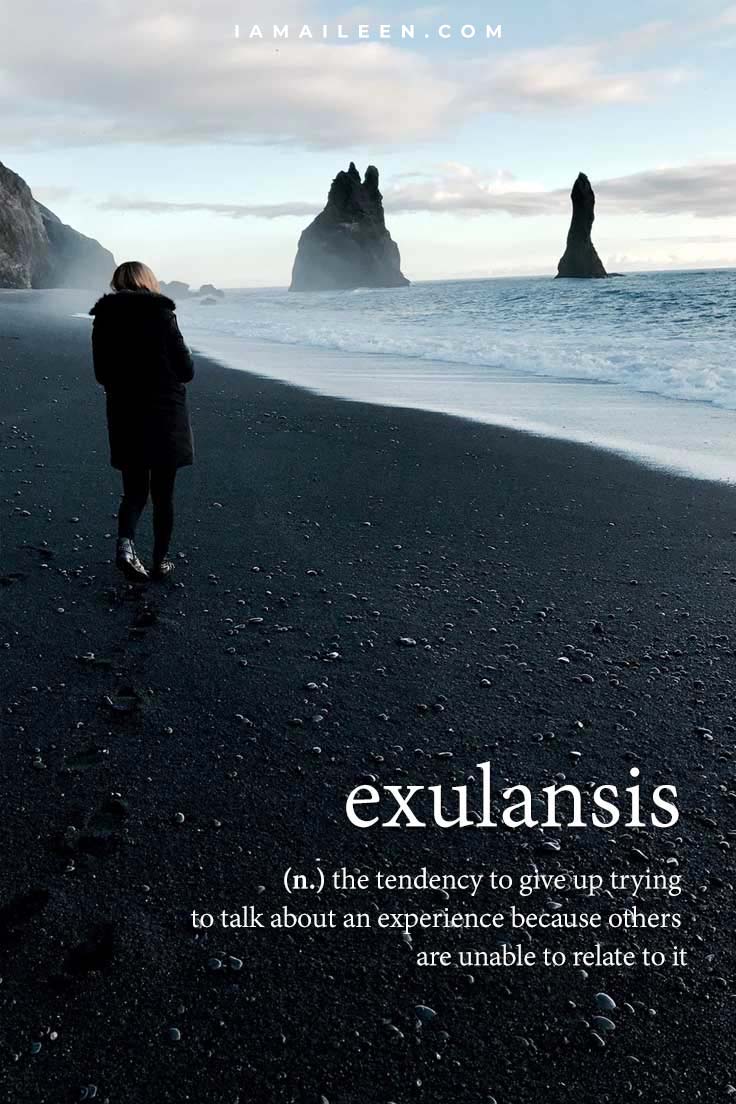
1. Exulansis
The tendency to give up trying to talk about an experience because people are unable to relate to it (Noun / Origin: Dictionary of Obscure Sorrows / exu·lan·sis)
“…whether through envy or pity or simple foreignness, which allows it to drift away from the rest of your life story, until the memory itself feels out of place, almost mythical, wandering restlessly in the fog, no longer even looking for a place to land.”
FYI : In case you don’t know, the ‘Dictionary of Obscure Sorrows’ is written by John Koenig and it has become so famous that he even went on to do a TED show. Basically, the dictionary presents neologisms (up and coming words) for powerful feelings that you likely don’t have a proper term for, and indeed ‘exulansis’ is one of the beautiful unusual travel words that you must know!

The desire to capture a fleeting moment (Noun / Origin: Dictionary of Obscure Sorrows / mo·rii)
“ With every click of the shutter, you’re trying to press pause on your life. If only so you can feel a little more comfortable moving on living in a world stuck on play.”
I’m sure that we all have felt this, not only when we’re traveling but in all the meaningful moments of our lives! We all have this kind of desire given the fact that cameras together with social media will — and always — be on the rise. After all, we simply don’t want to miss a thing. We just want to capture moments before they slip through our fingers so that we can hopefully relive and relish on it later on. But then again.. it is a constant struggle of balance between ‘capturing’ and being there and savoring those moments.
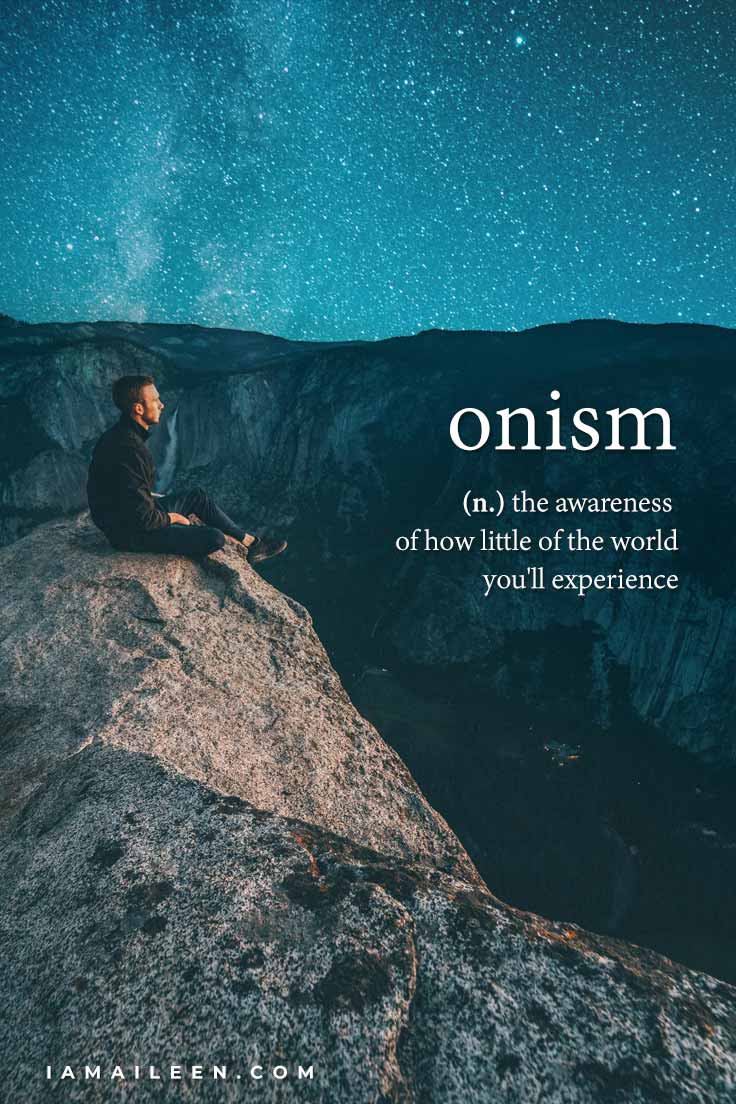
The awareness of how little of the world you’ll experience (Noun / Origin: Dictionary of Obscure Sorrows / o·ni·sm)
“The frustration of being stuck in just one body, that inhabits only one place at a time, which is like standing in front of the departures screen at an airport, flickering over with strange city names like other people’s passwords, each representing one more thing you’ll never get to see before you die.”
ETYMOLOGY : Portmanteau of monism (the philosophical view that a variety of things can be explained in terms of a single reality) + onanism (alternative word for self-pleasure).
Raise your hand if you’ve ever encountered this thought — yep, I knew it, you’ve felt this too! This sentiment is often the reason why I like the idea of immortality… because yes, I am selfish: I would really like to see and experience EVERYTHING. But as it is, I’ll make most of my time — and you should too!

4. Photophile
A person who loves photography (Noun / Origin: Dictionary of Obscure Sorrows / pho·to·phile)
This is an obscure word but supposedly, this came about after deriving it off from the word “photophilic” which is an organism that loves or seeks light — which is related in a way to how cameras function.

The realization that each random passerby has a life as vivid and complex as your own (Noun / Origin: Dictionary of Obscure Sorrows / son·der)
“The realization that each random passerby is living a life as vivid and complex as your own — populated with their own ambitions, friends, routines, worries and inherited craziness.”
ETYMOLOGY : Related to the German word ‘sonder’ (special) and French ‘sonder’ (to probe). If you ask me, this is one of my favorites on all of these unusual travel words especially because I personally love people-watching when I travel abroad. It’s just simply the kind of realization you gain as you witness more of the world.

6. Rückkehrunruhe
The feeling of returning home after a trip only to find it fading rapidly from your awareness (Noun / Origin: Dictionary of Obscure Sorrows / rück·keh·run·ru·he)
This is exactly why I learned how to create a travel blog as well as build a travel vlog . Both of them help me record the fleeting memories that I’ve had for as much as I could!
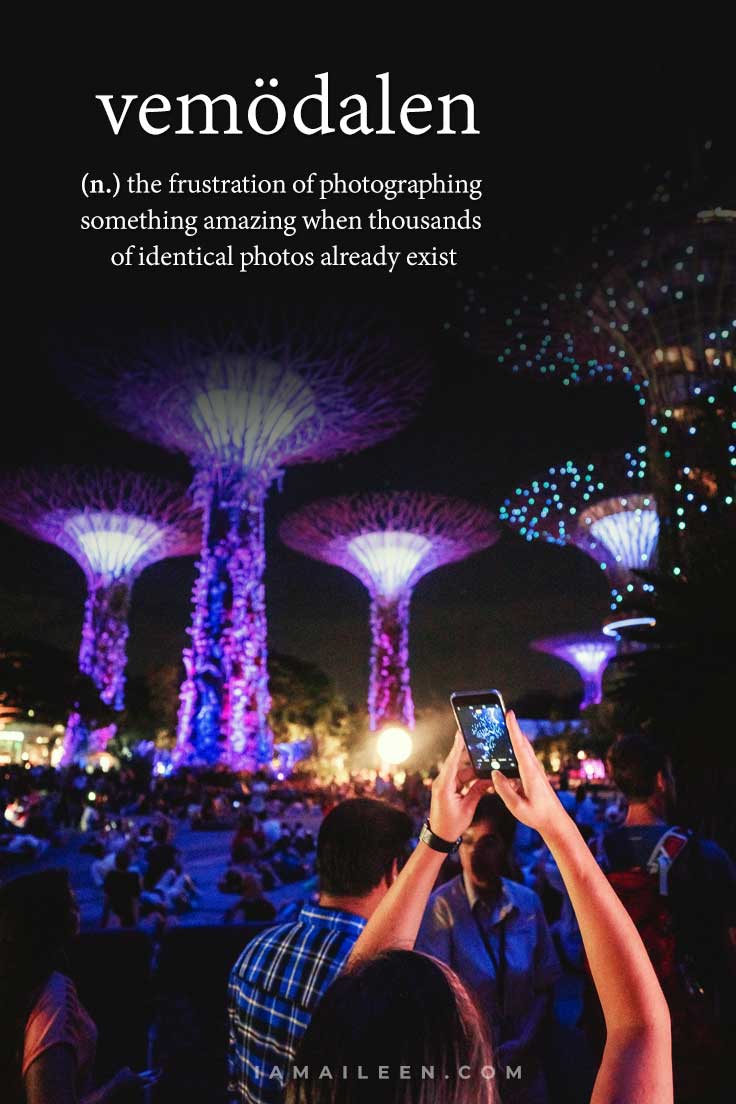
7. Vemödalen
The frustration of photographing something amazing when thousands of identical photos already exist ( Noun / Origin: Dictionary of Obscure Sorrows / ve·mö·da·len)
“The frustration of photographing something amazing when thousands of identical photos already exist — the same sunset, the same waterfall — which can turn a unique subject into something hollow and pulpy and cheap.”
ETYMOLOGY : From the Swedish word vemod which means “tender sadness, pensive melancholy” and then combined with Vemdalen, the name of a Swedish town. Swedish place names are the source of IKEA’s product names — the original metaphor for this idea was that these clichéd photos are a kind of prefabricated furniture that you happen to have built yourself.
So, I never actually felt this… because though there are tons of ‘duplicates’, I still like to make my own and say that “Ah, I shot this!” . BUT of course, I have a lot of friends — most especially the avid photographers — who go through vemodalen ! Let me know if you also have the same sentiments.
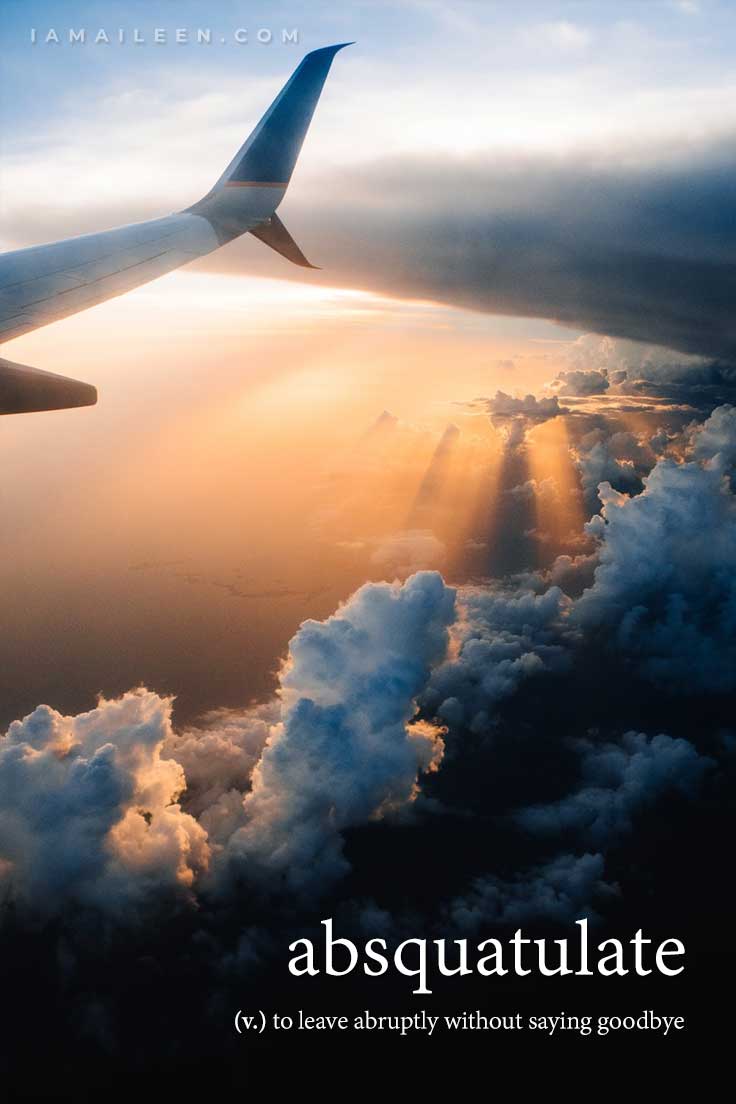
8. Absquatulate
To flee or leave abruptly without saying goodbye (Noun / Origin: Dictionary of Obscure Sorrows / ve·mö·da·len)
I once reached a point where I just wanted to leave everything and go. I can still vividly recall that memory because it’s how my travel lifestyle started !
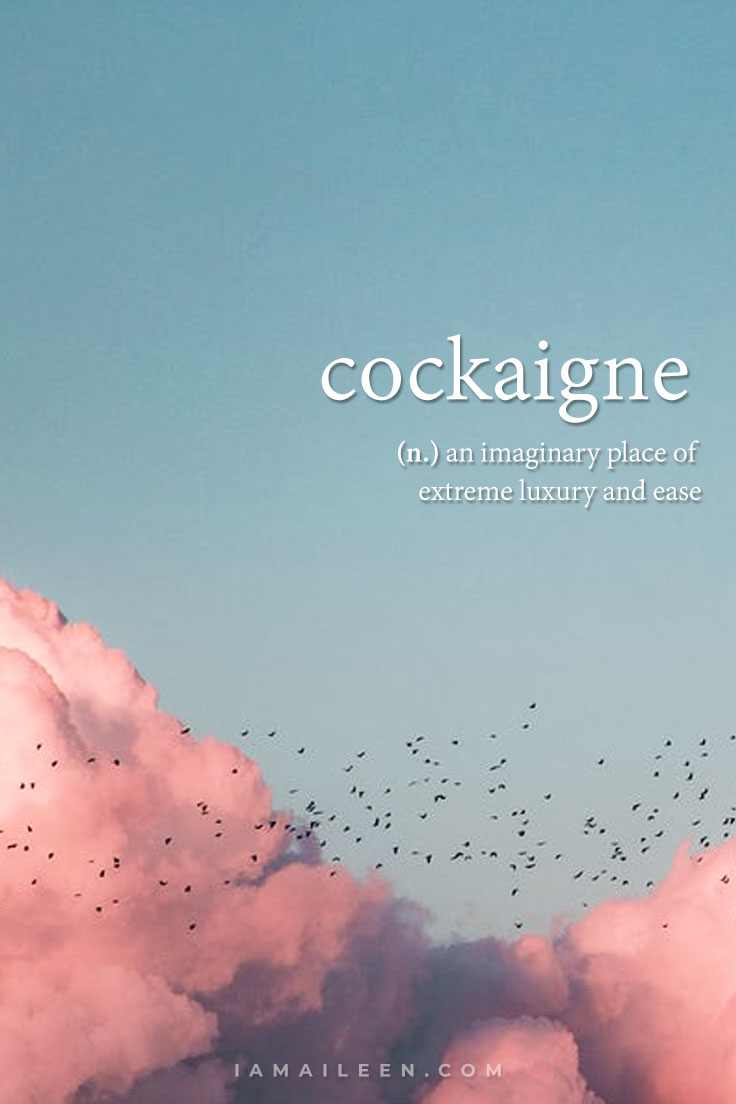
9. Cockaigne
An imaginary place of extreme luxury and ease (Noun / Origin: English / cock·aigne)
This is one of the many uncommon English words and this term is derived from the Middle French phrase pais de cocaigne , which literally means “the land of plenty.”
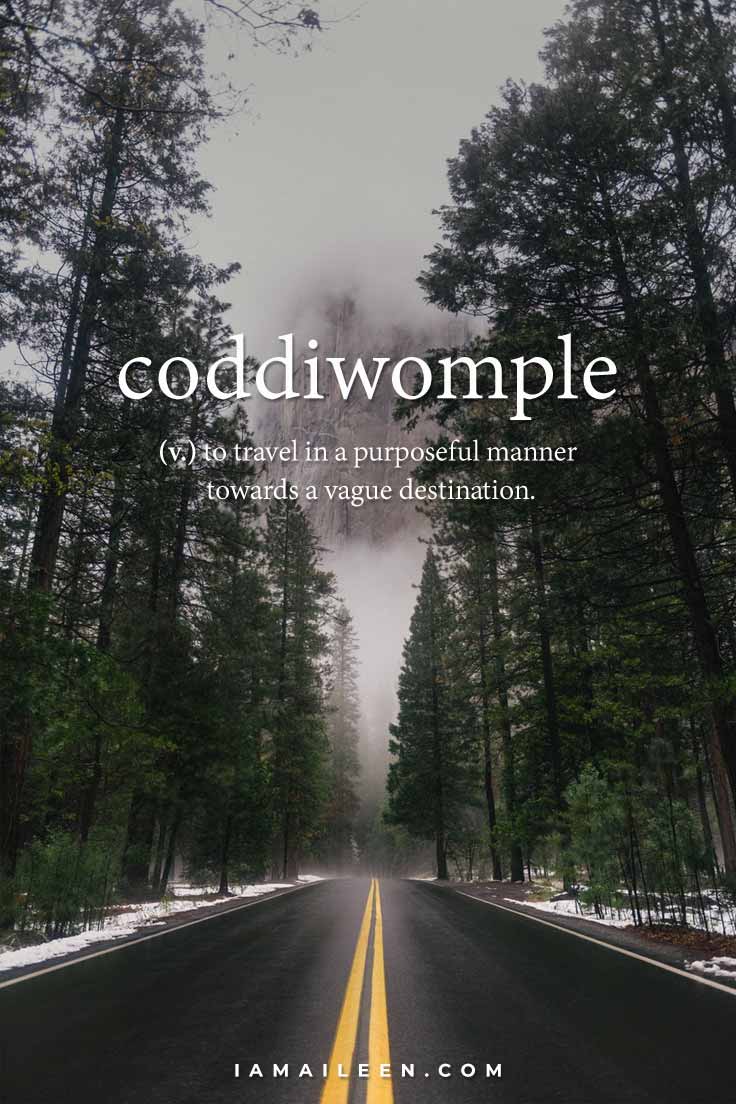
10. Coddiwomple
To travel in a purposeful manner towards a vague destination (Verb / Origin: English / cod·di·wom·ple)
I gotta admit, the first time I saw this word (which was when I was around 15), I honestly thought that it meant cuddling or something of that sort. It’s just such a unique word! When I finally saw the correct definition, I was floored at how deep it was so I just had to put it up in this list of unusual travel words.
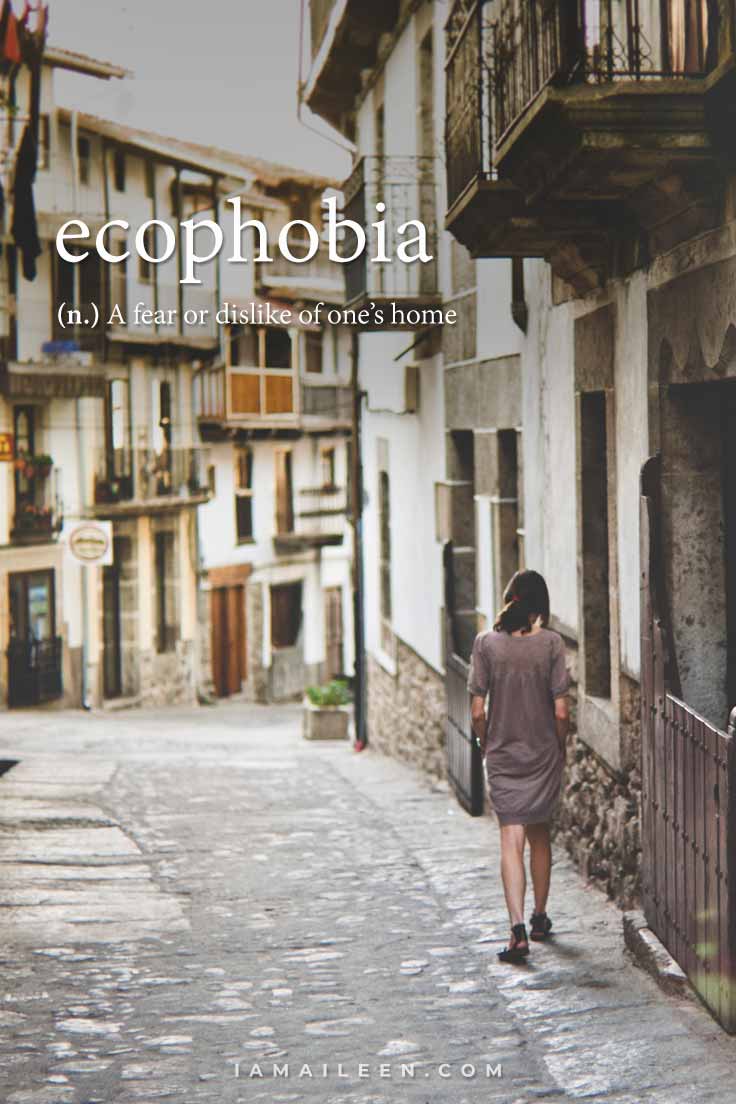
11. Ecophobia
A fear or dislike of one’s home (Noun / Origin: English / e·co·pho·bia)
— and so you leave, to find where home is for you. *wink*
This word is based from Ancient Greek in whick ‘eco’ is derived from oîkos or “house”, and then of course ‘phobia’ from phóbos or “fear”.

12. Gadabout
A person who travels often or to many different places, especially for pleasure (Noun / Origin: English / gad·about)
Tracing back to the Middle English verb ‘gadden’ which means ‘to wander without a specific aim or purpose’. Speaking of, I’m definitely a gadabout as I find pleasure in going on adventures all over the world !
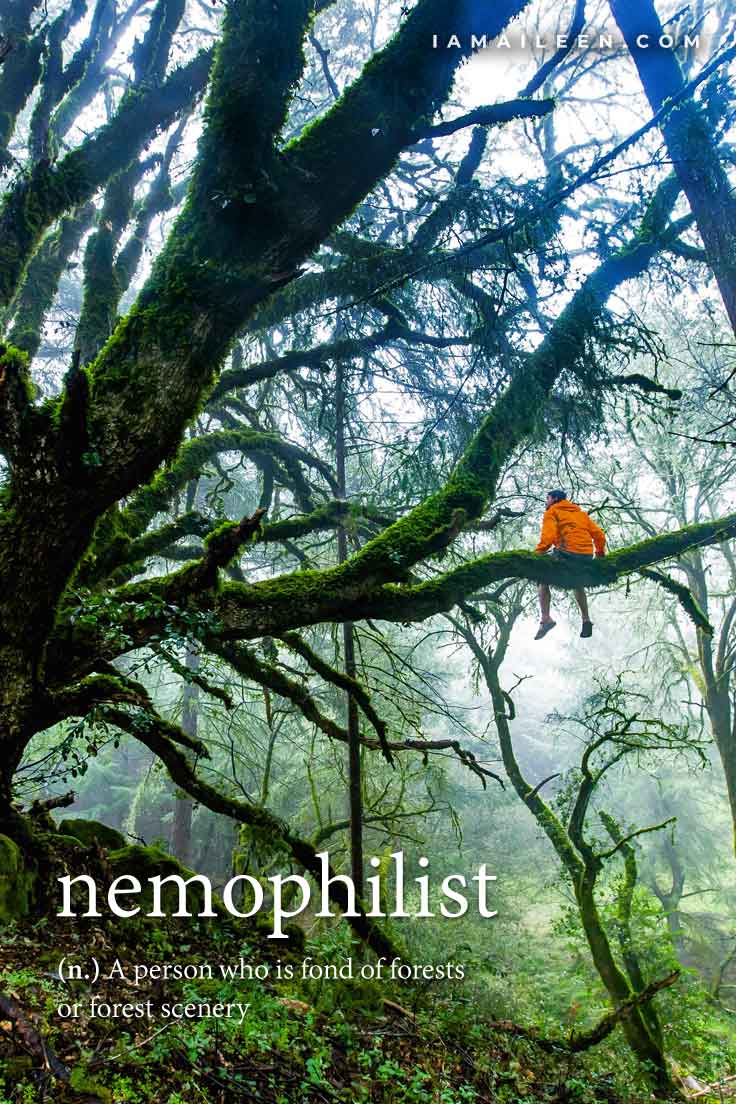
13. Nemophilist
A person who is fond of forests or forest scenery (Noun / Origin: English / ne·mo·phi·list)
As far as unusual travel words go, I have added yet another term on my arsenal to describe not only my friends but myself as well!
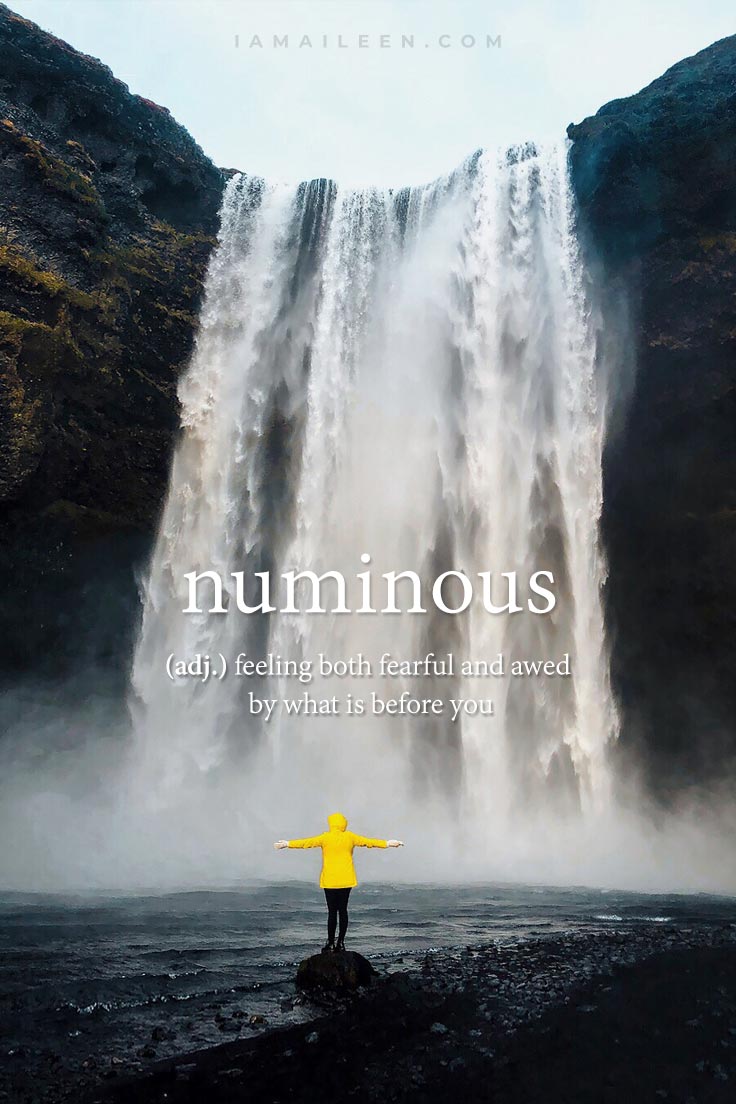
14. Numinous
Feeling both fearful and awed by what is before you. (Adjective / Origin: Latin / nu·mi·nous)
This word can mean a lot of things and it especially leans more towards depicting something supernatural or mysterious that is almost as if it’s by some divine power.
You can take this word the way you want it, but the way I see it, this perfectly describes several travel experiences that I have had.
I’m not exactly a spiritual person but I recognize some strong connection to nature and you bet that I felt a numinous presence in amazing places like Antarctica and Iceland . You just gotta be there to experience the emotion yourself!

15. Selcouth
Something unfamiliar, unusual or wondrous (Adjective / Origin: Old English / sel·couth)
This is the perfect adjective to use when defining a place you have traveled to that just feels foreign or novel — which is in itself a good thing and an inevitability.

16. Serendipity
The natural ability of making desirable discoveries by accident (Noun / Origin: English / ser·en·dip·i·ty)
A term in the 1750s to describe those who ‘ were always making discoveries, by accidents and sagacity, of things they were not in quest of’ . This usually happens to me in moments where I least expect it and it’s such a wonderful thing!
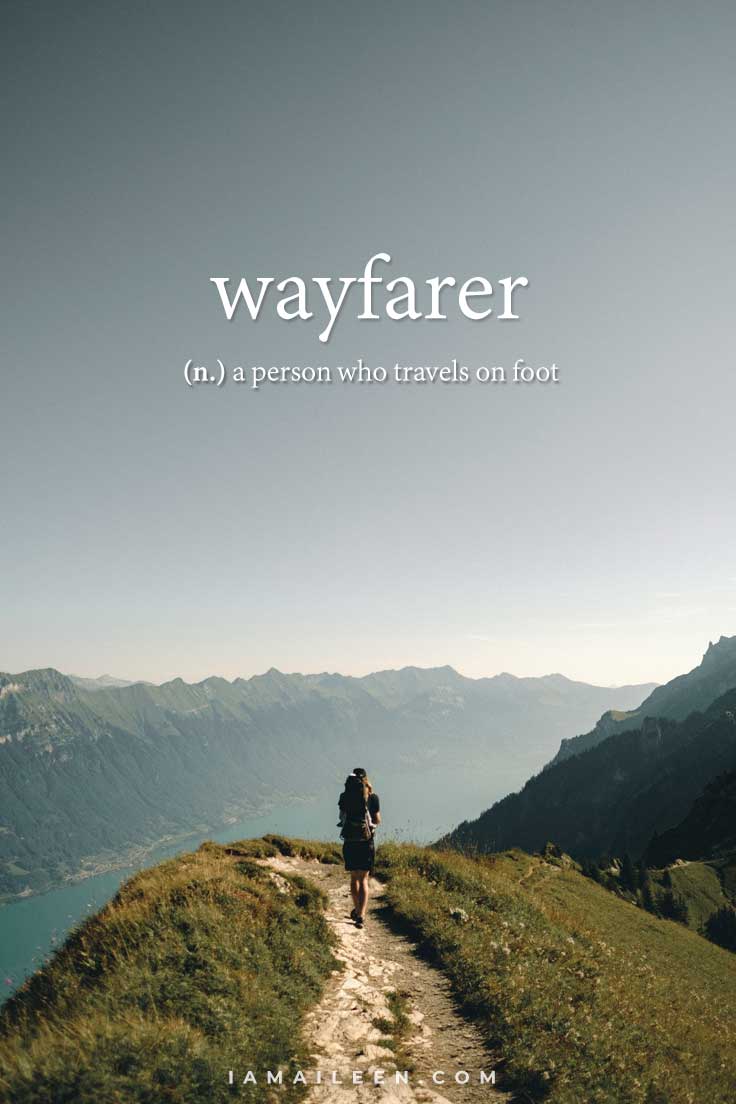
17. Wayfarer
A person who travels on foot (Noun / Origin: English / way·far·er)
This is from the Middle English word weyfarere which is equivalent to way + farer (‘to journey).

Spontaneous journey, led only by the spirit of the landscape (Noun / Origin: French / de·ʁiv)
This is a French word that originally refers to a strategy whereing participants “drop their everyday relations and let themselves be drawn by the attractions of the terrain and the encounters they find there”.
In this list of unusual travel words, don’t you think that this perfectly describes a lot of traveling and digital nomads today?
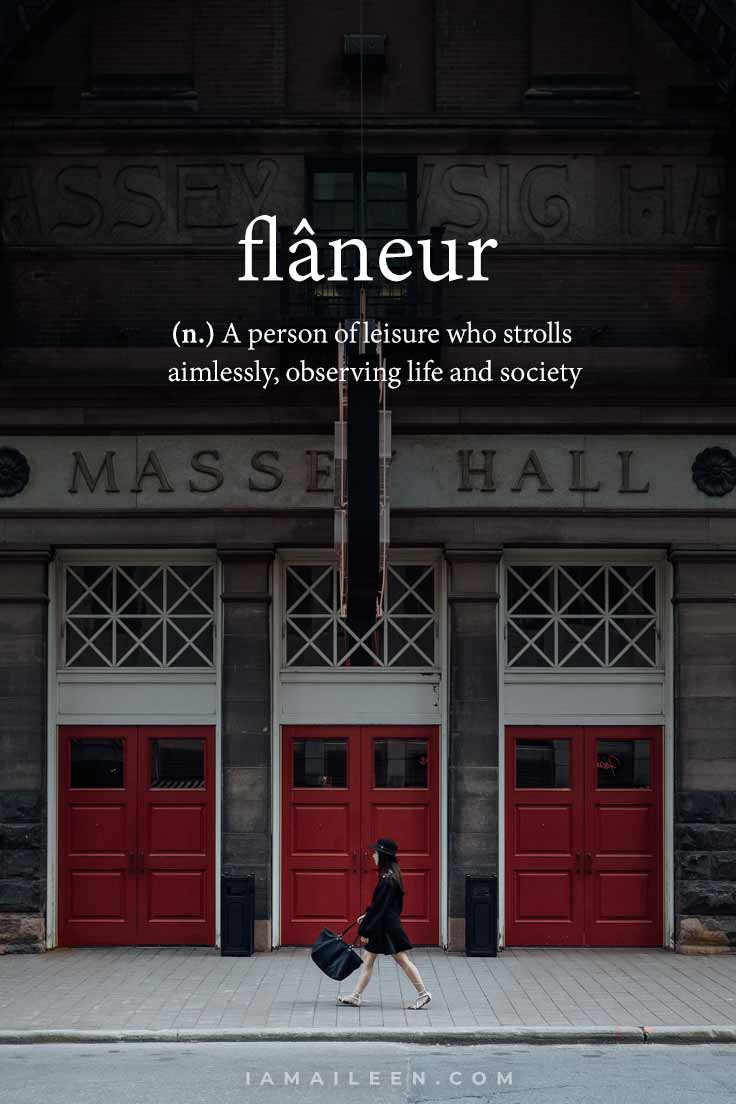
19. Flâneur
A person of leisure who strolls aimlessly, observing life and society (Noun / Origin: French / flâ·neur)
The flâneur was, in some way, essential to any picture of the streets of Paris . The word carried a set of rich associations: the man of leisure, the idler, the urban explorer, the connoisseur of the street.

20. Dépaysement
The good or bad feeling that comes from being in a foreign country (Noun / Origin: French / de·pɛ·iz·mɑ̃)
This word could literally mean something like: ‘to be uncountried’ and it could either be due to disorientation or gladness — depends on you, and you bet that I’ll be using this word from now on!

21. Trouvaille
A lucky find (Noun / Origin: French / trü·ˈvī’)
There’s something about the French language that is romantic and melodic, and this has got to be one of my favorite unusual travel words!
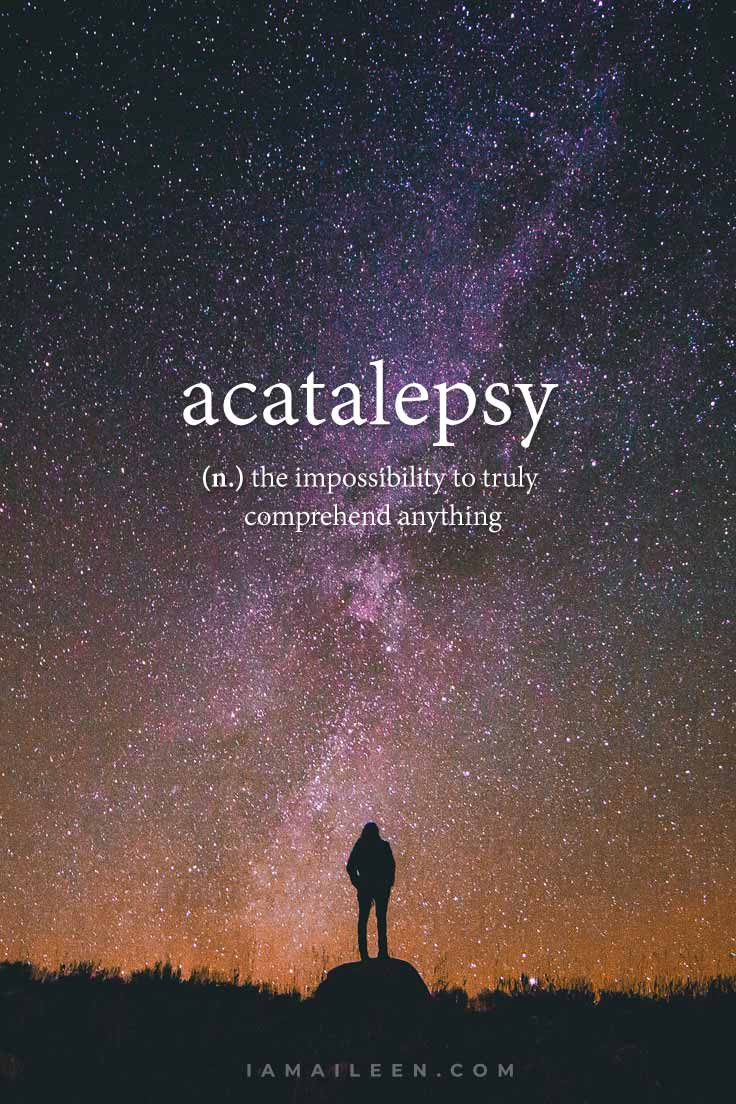
22. Acatalepsy
The impossibility to truly comprehend anything find (Noun / Origin: Greek / acat·a·lep·sy)
This is clearly an overwhelming feeling, but don’t you think that it humbles us in some way? The more I travel, the more I feel a sense of acatalepsy and though it might seem daunting at first, I think that’s just what makes our world and life itself an incredibly beautiful thing.
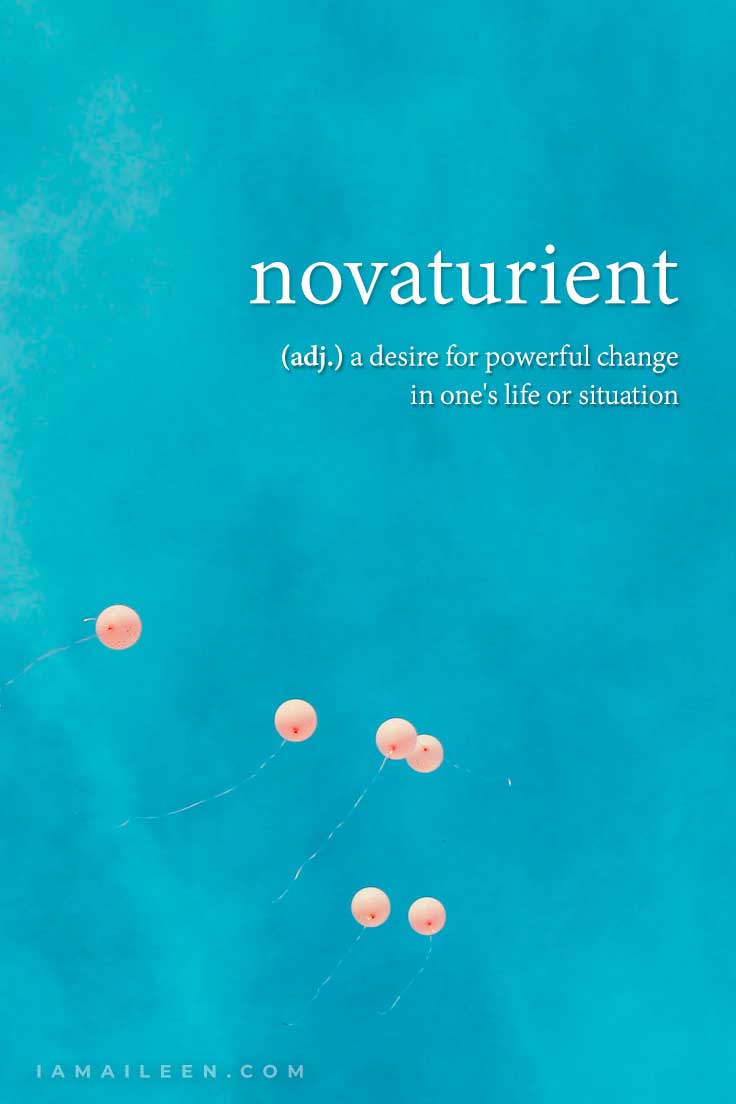
23. Novaturient
A desire for powerful change in one’s life or situation (Adjective / Origin: Latin / nO·va·’tUr·E·ent)
ETYMOLOGY : The word “nova” originates from the Latin novus meaning ‘new’.
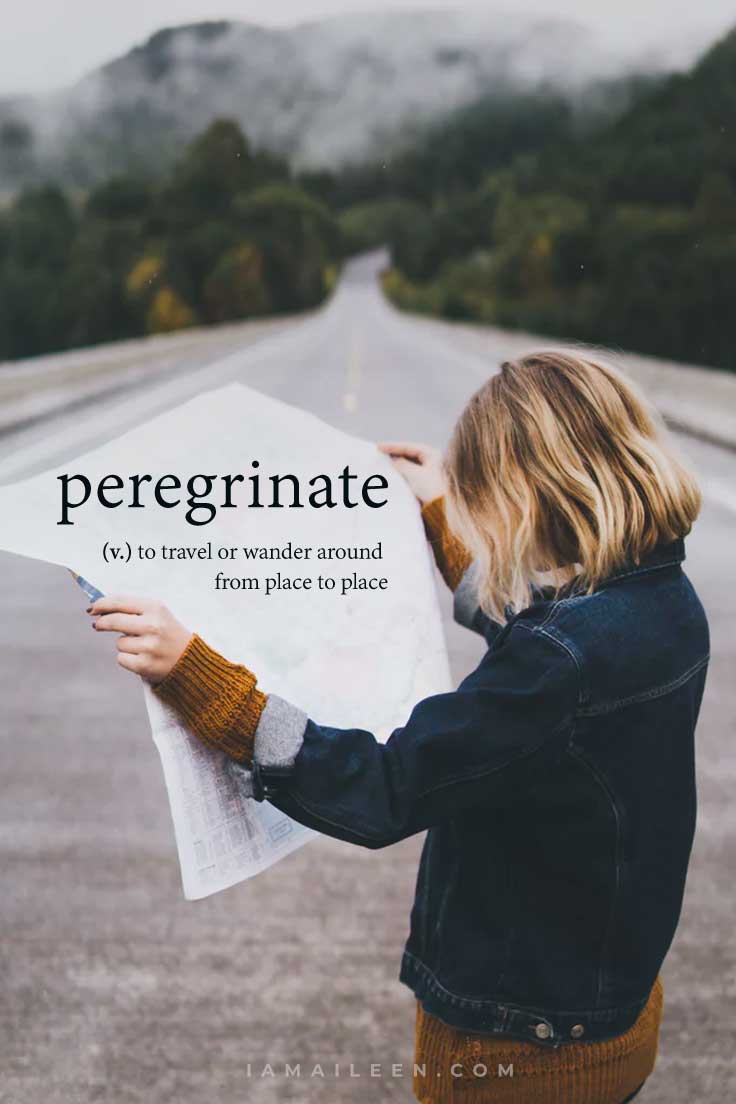
24. Peregrinate
To travel or wander around from place to place (Adjective / Origin: Latin / per·e·gri·nate·e·gri·nate)
The best way to plan for such an adventure? By checking out these top travel resources and planning tips!
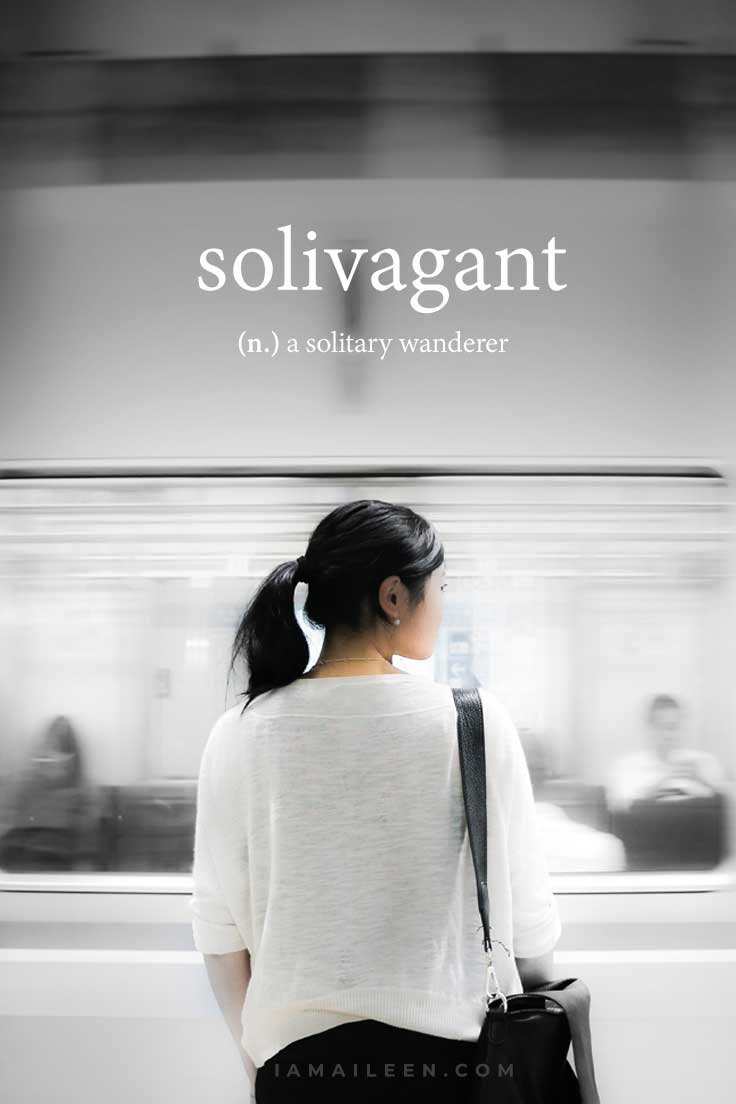
25. Solivagant
A solitary wanderer (Noun / Origin: Latin / so·liv·a·gant)
ETYMOLOGY : Latin word of solivagus meaning wandering alone + English – ant

26. Eleutheromania
An irresistible yearning for freedom (Noun / Greek / el·u·ther·o·man·ea)
ETYMOLOGY : From Ancient Greek ἐλευθερία (eleuthería, ‘freedom’) + -mania.
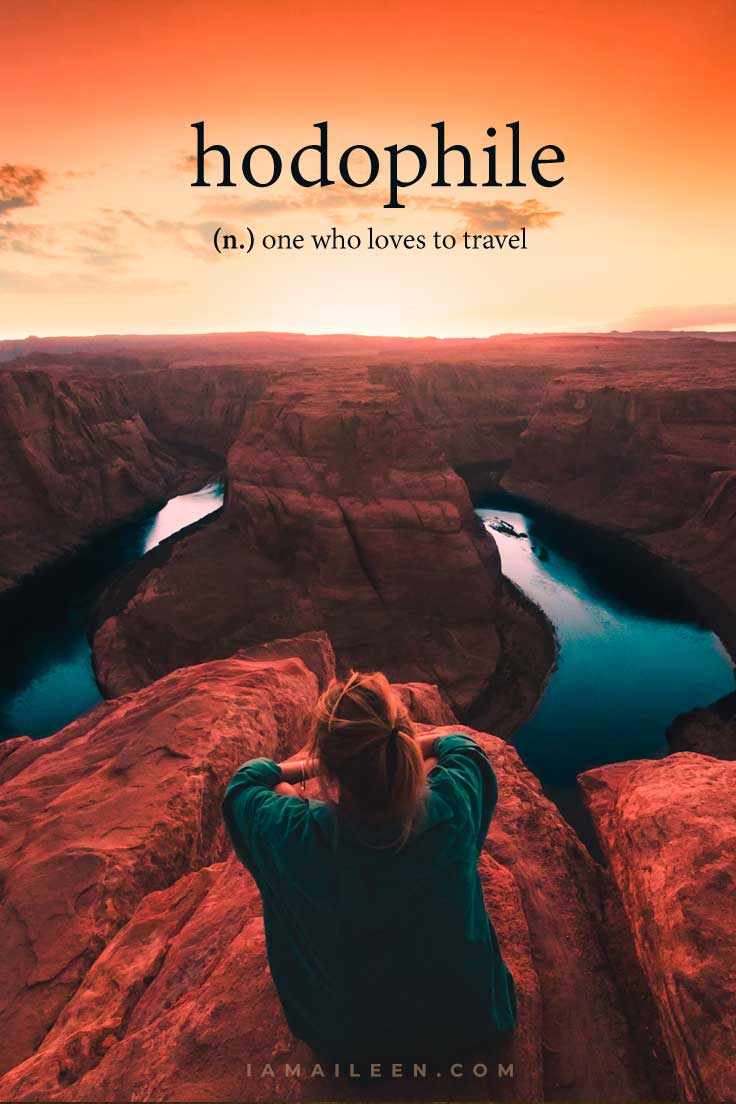
27. Hodophile
One who loves to travel (Noun / Origin: Greek / hodo·phile)
ETYMOLOGY : From Ancient Greek ὁδός (hodós) which means travel.

Putting a part of yourself into what you’re doing (Noun / Origin: Greek / me·ra·ki)
This is a modern Greek word that’s often used to describe the instance wherein you leave a part of yourself (your soul, creativity, or love) in your work — so it’s like when you intensely love to do something or just about anything that you put something of yourself into it.

29. Peripatetic
A person who travels from place to place (Noun / Origin: Greek / peri·pa·tet·ic)
We can trace back the origin of this word to Aristotle and his followers. They often walked around peripatos (covered walk in the Lyceum) while Aristotle does his lectures, given that the former loves walking. As such, the Greek word peripatētikos (from peripatein, meaning “to walk up and down”) came about because of them.

30. Eudaimonia
A contented state of being happy, healthy and prosperous (Adjective / Origin: Greek / U·de·‘mOn·E·a)
Leave a comment below if you’ve felt eudaimonia while traveling!
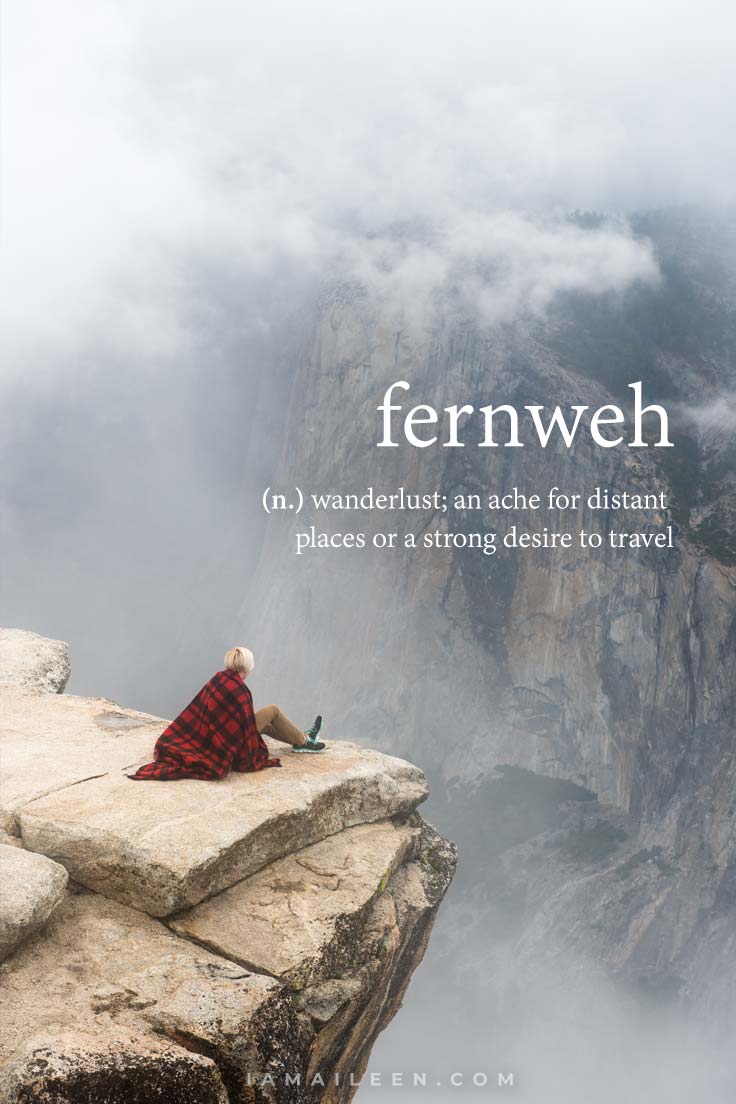
31. Fernweh
Wanderlust; an ache for distant places or a strong desire to travel (Noun / Origin: German / feirn·veyh)
ETYMOLOGY : From the word fern (“far”) and weh (“pain”). It can be literally translated as farsickness or longing for far-off places.

32. Heimweh
A longing for home (Noun / Origin: German / heim·veyh)
As contrasted with Fernweh, this is a German word for homesickness.

33. Kopfkino
The act of playing out an entire scenario in your mind (Noun / Origin: German / kopf·ki·no)
Hard translation is “head cinema” and as the definition goes, these are for those times where you start daydreaming or imagining scenarios about how a situation will unravel.
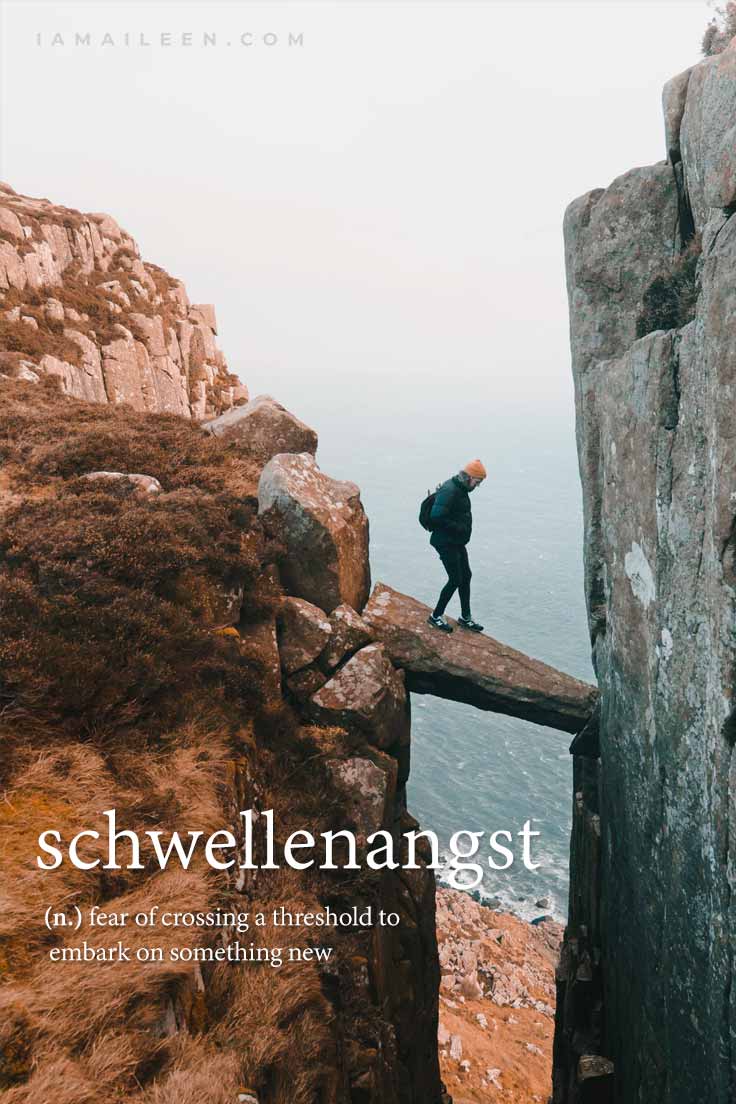
34. Schwellenangst
Fear of crossing a threshold to embark on something new (Noun / Origin: German / shwel·en·ahngst)
ETYMOLOGY : From the German words Schwelle (threshold) + Angst (anxiety).

35. Sehnsucht
An intense yearning for something far-off and indefinable (Noun / German / zEn·‘zUkt)
ETYMOLOGY : From German words sehnen (to long) and Sucht (anxiety; sickness; addiction).
The origin of the word doesn’t sound too good but as a whole it simply means that it’s an indescribable yearning for far off places and indescribable goals.

36. Sprachgefühl
A person who has the feel for a language (Noun / Origin: German / shpräḵ-gə-ˌfᵫl)
This literally translates as ‘language feeling’ from compound nouns combining Sprache (language) and Gefühl (feeling). Basically, this does not only refer to a person who has a good understanding of foreign languages but also to a person who has intuitiveness for what is linguistically appropriate.
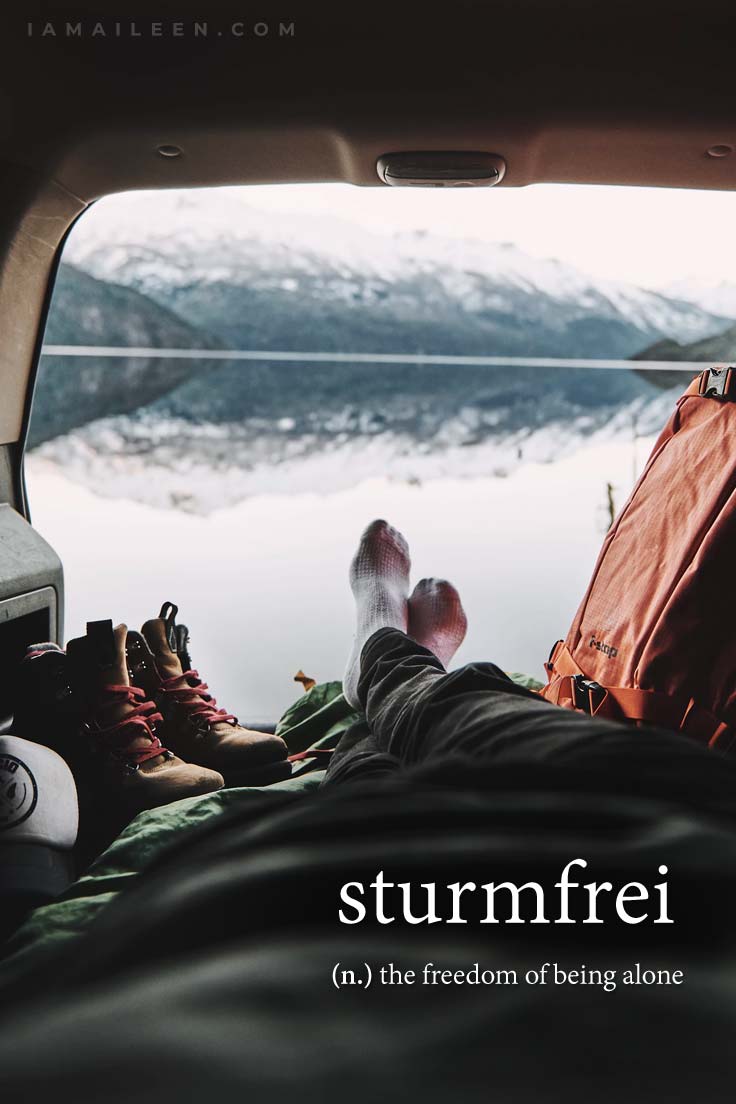
37. Sturmfrei
The freedom of being alone (Noun / Origin: German / shtUrm·frI)
A German word that translates literally to “storm free” — but the real meaning has nothing to do with the weather. As a slang, it means having the house or place to one’s self; but if we put a romantic twist to it then it’s about having the freedom or of having some alone time.

38. Vorfreude
The joyful anticipation that comes from imagining future pleasures (Noun / Origin: German / FOR·frI)
ETYMOLOGY : Combination of German words vor (pre) and Freude (happiness). This is one of the rare words that I’ve come to love!
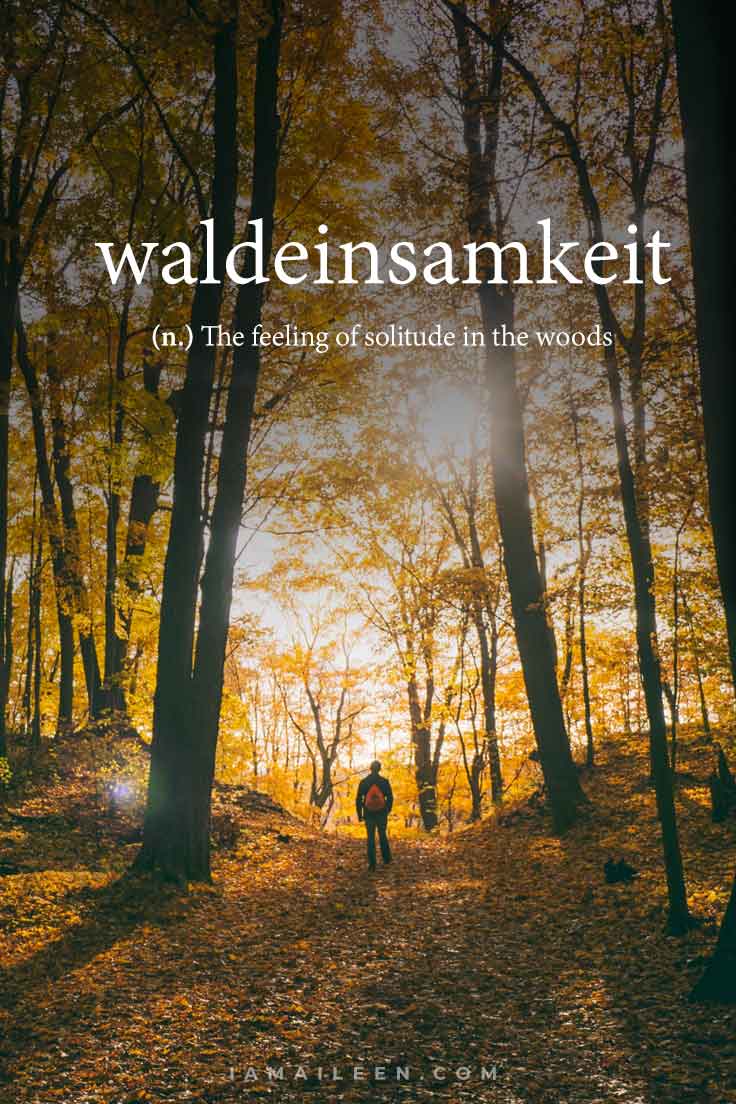
39. Waldeinsamkeit
The feeling of solitude in the woods (Adjective / Origin: German / vahyd-ahyn-zahm-kahyt)
ETYMOLOGY : Combination of Wald (forest) and Einsamkeit (loneliness)

40. Livsnjutare
A person who loves life deeply and lives it to the extreme (Adjective / Origin: Swedish / lives·noo·tuhreh)
Yet another word discovery that I loved since it’s something that I want to refer to myself as!
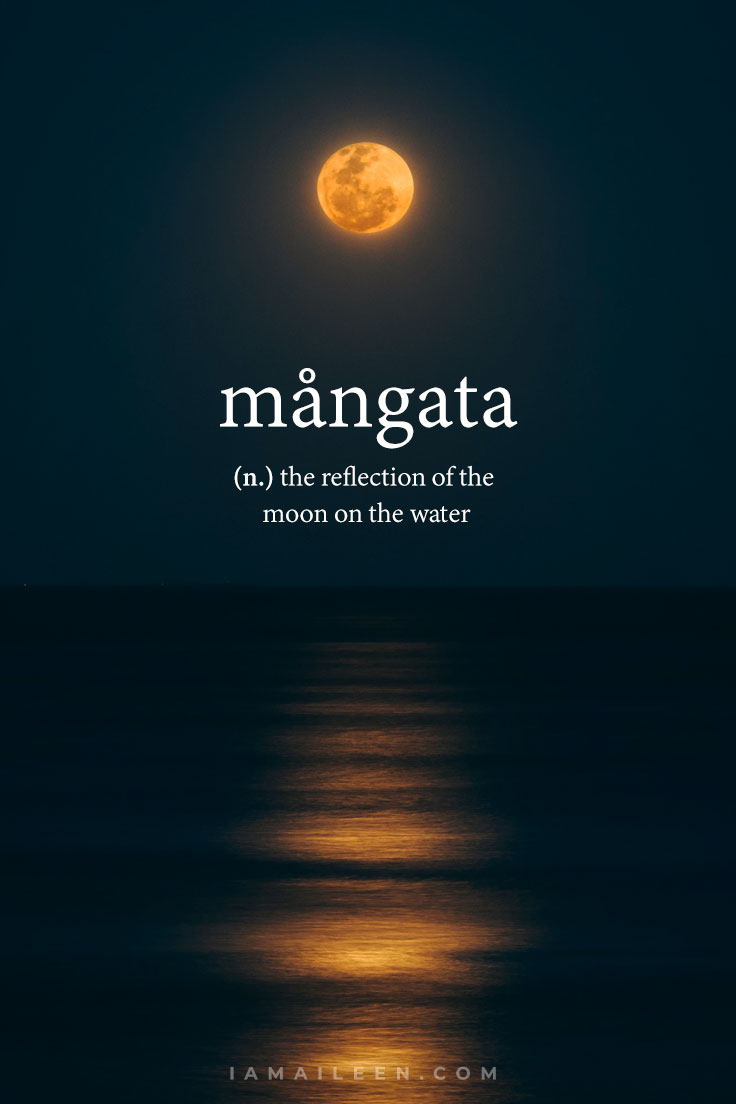
41. Mångata
The reflection of the moon on the water (Noun / Origin: Swedish / mo-an-gaa-tah)
ETYMOLOGY : Combination of Swedish words måne (moon) and gata (street, road). If you ask me, this is one of the best aesthetic words!
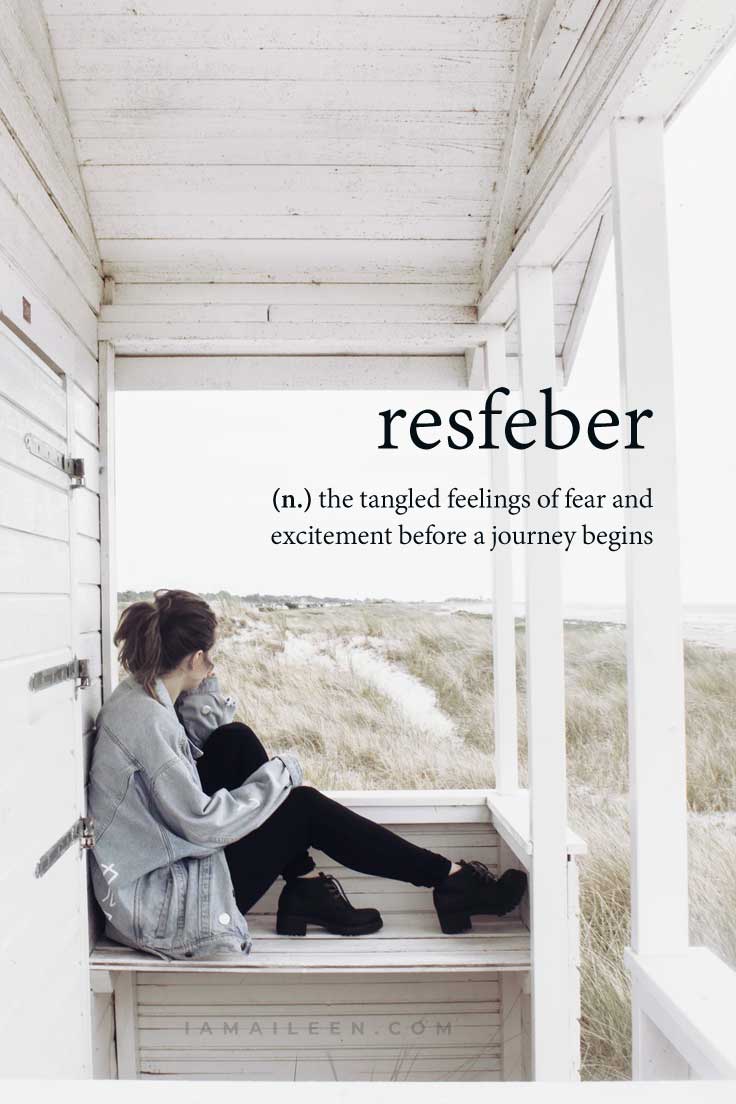
42. Resfeber
The tangled feelings of fear and excitement before a journey begins (Noun / Origin: Swedish / reece·FEE·ber)
I always experience this, especially when I’m about to board a flight — and it’s not just because I have a fear of flying , but it’s simply because there are just far too many mixed emotions swirling inside me (which is a great and surreal thing!)
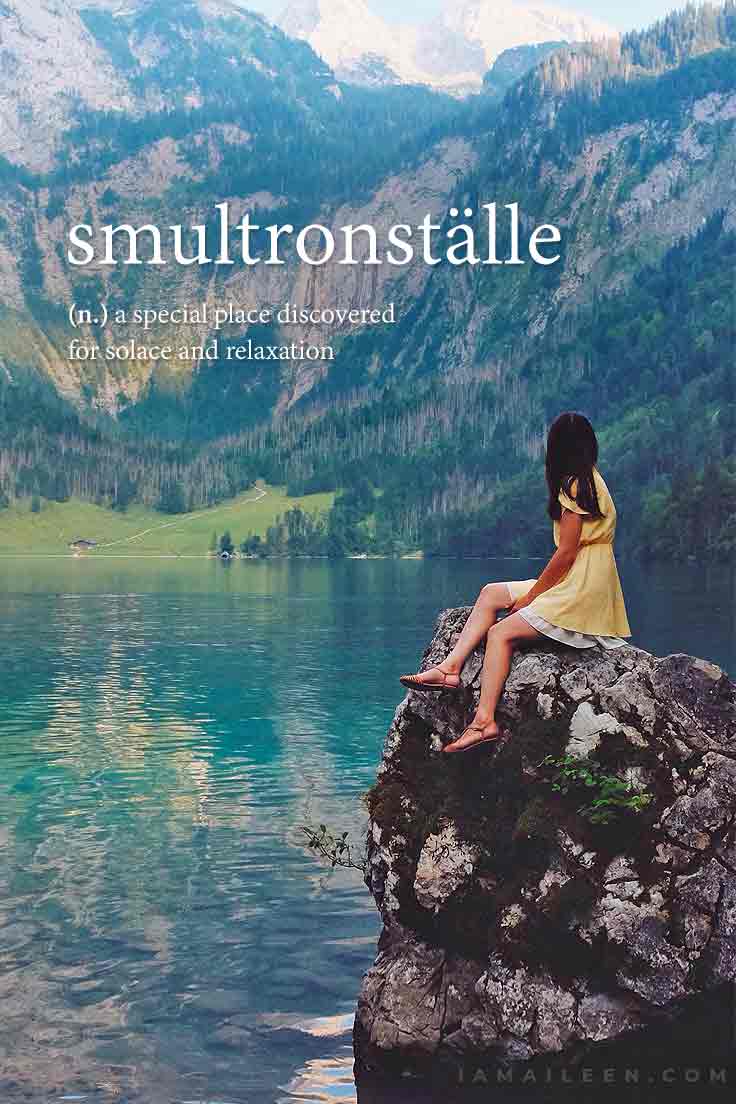
43. Smultronställe
A special place discovered for solace and relaxation (Noun / Origin: Swedish / smUl·tron·’stel·e)
This Swedish word literally translates to “place of wild strawberries” and it’s a place where you feel most at home that’s away from any stress or sadness.
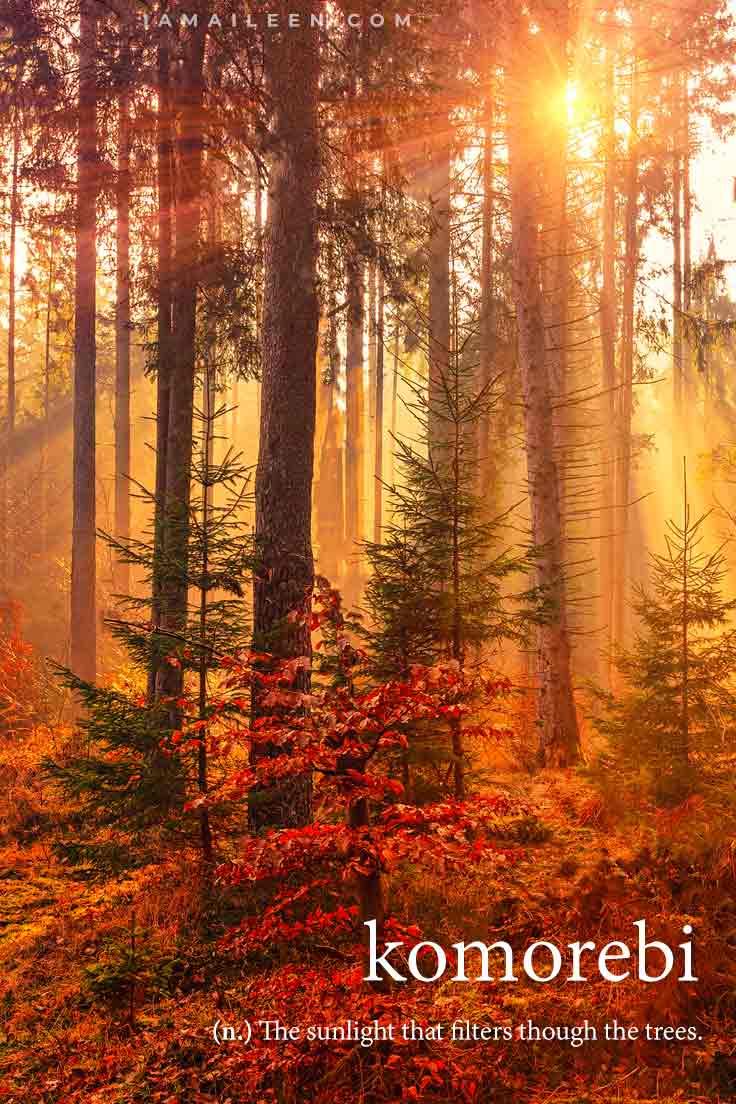
44. Komorebi
The sunlight that filters though the trees (Noun / Origin: Japanese / 木漏れ日 ko·mo·RE·bee)
The Japanese truly have a way of coming up with the most interesting words and this is such a poetic addition to this list of unusual travel words!
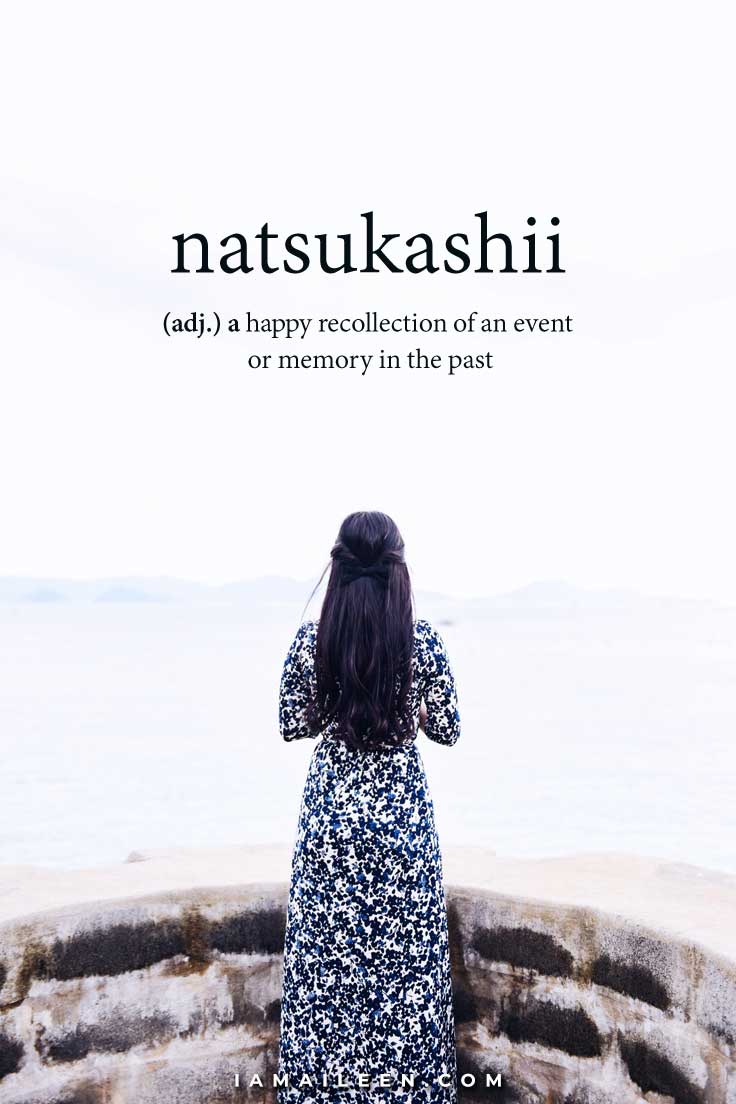
45. Natsukashii
A happy recollection of an event or memory in the past (Adjective / Origin: Japan / 懐かしい nat·su·ka·shii)
The adjective originally described wanting to keep something close or wanting to express fondness for something. Over time, this term was used more to describe happy reminiscences, leading to the modern meaning. Take note that this is different from a nostalgic longing, but more of joyous remembrance of a past memory.
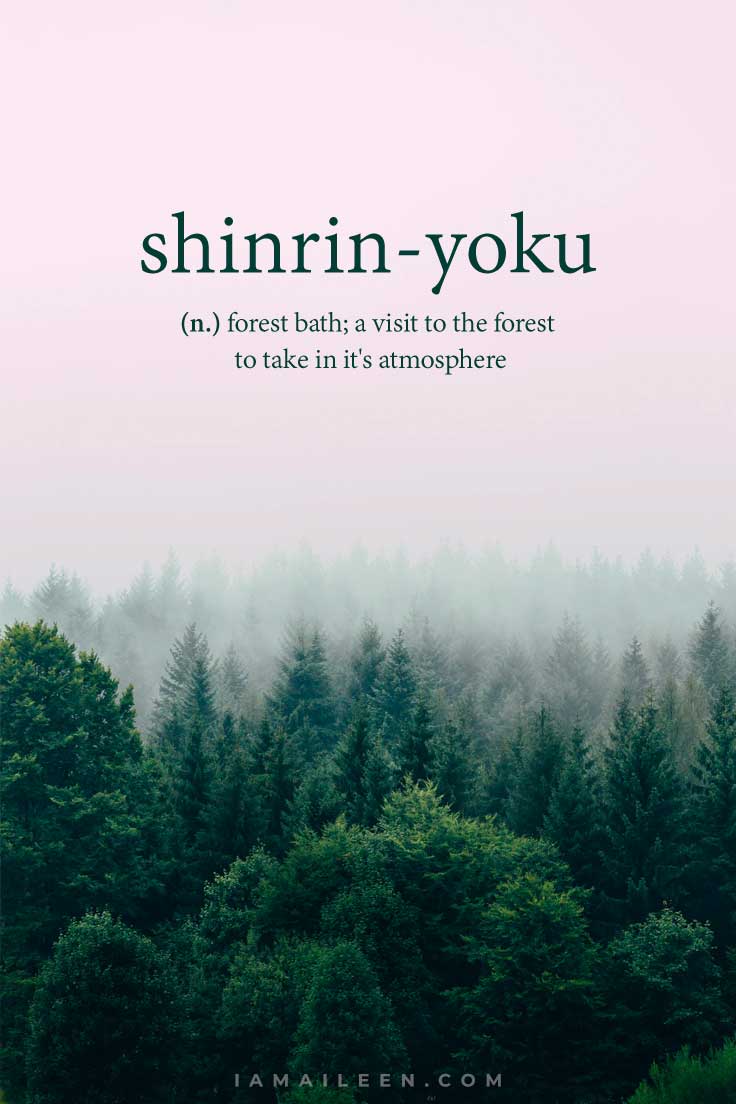
46. Shinrin-yoku
Forest bath; a visit to the forest to take in it’s atmosphere (Noun / Origin: Japan / 森林浴 shin·rin·yo·ku)
This is actually a form of nature therapy that is practiced in Japan ever since the 80s.
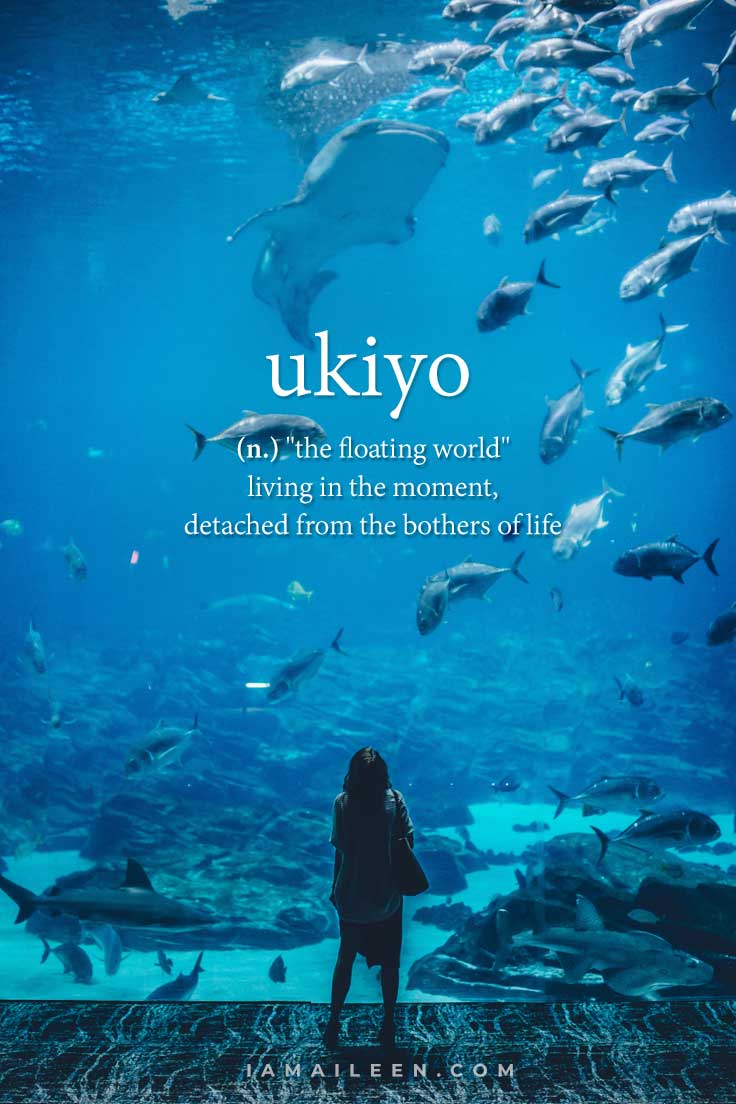
“The floating world” — living in the moment, detached from the bothers of life (Noun / Origin: Japan / 浮世 ooh-ki-yo)
A hard translation of this word dates back to Japan’s Edo-period as it describes the urban lifestyle, and a famous related word is ukiyo-e or Japanese art paintings of the ‘Floating World’ or of our fleeting life and transient world.
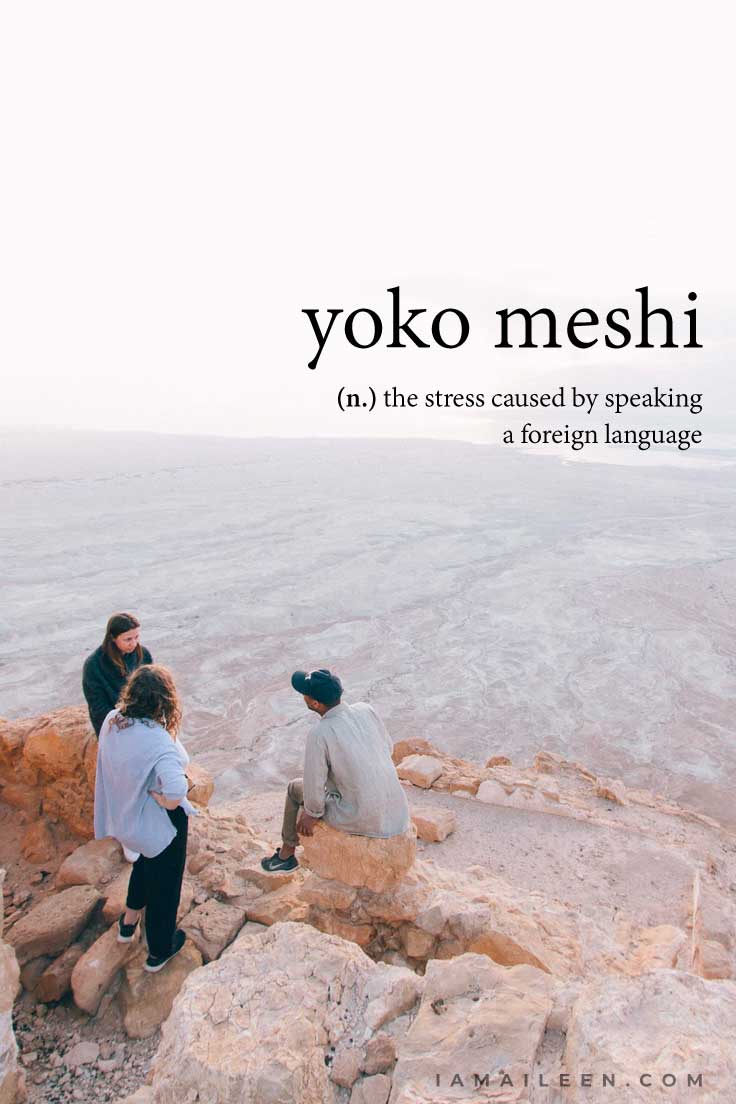
48. Y oko Meshi
The stress caused by speaking a foreign language (Noun / Origin: Japan / 横飯 yo·ko·me·shi)
Its hard translation is ‘boiled rice’ ( meshi ) and ‘horizontal ( yoko ) which will sort of mean as ‘a meal that’s eaten sideways’ — this metaphor actually refers to the fact that the Japanese write vertically instead of horizontally. Hence, the word yoko-meshi has a nice spin to it, doesn’t it?
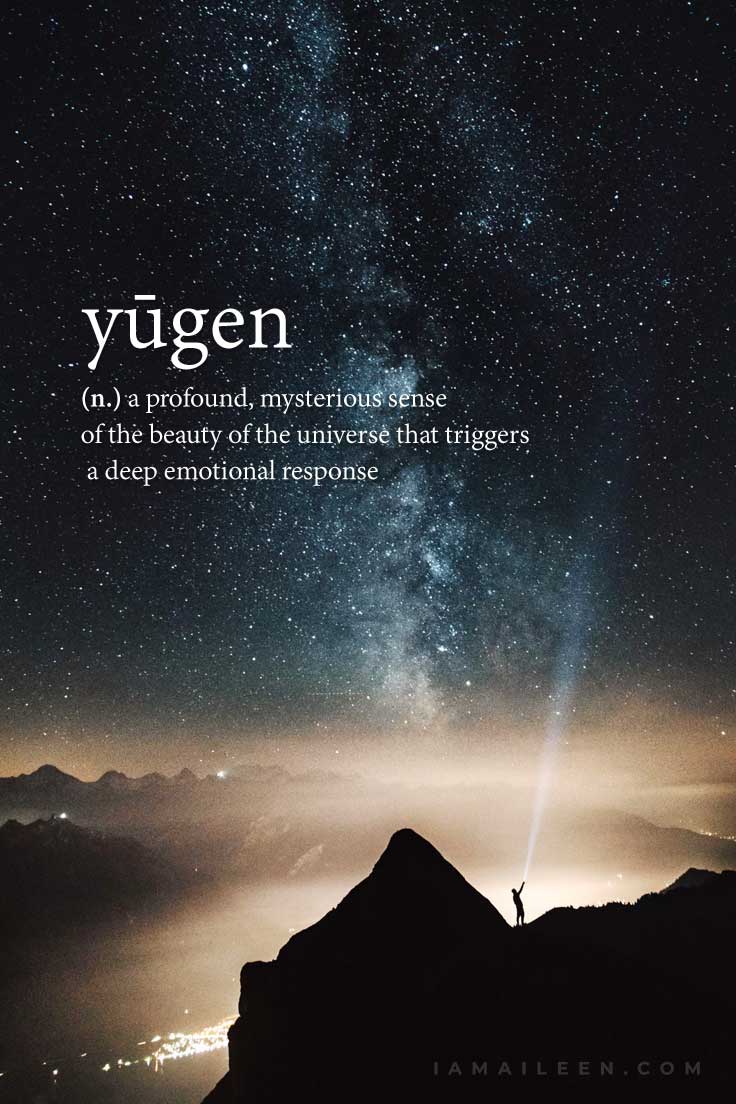
A profound, mysterious sense of the beauty of the universe that triggers a deep emotional response (Noun / Origin: Japan / 幽玄 yu·gen)
TRIVIA : Yugen is an important concept in the study of traditional Japanese aesthetics.
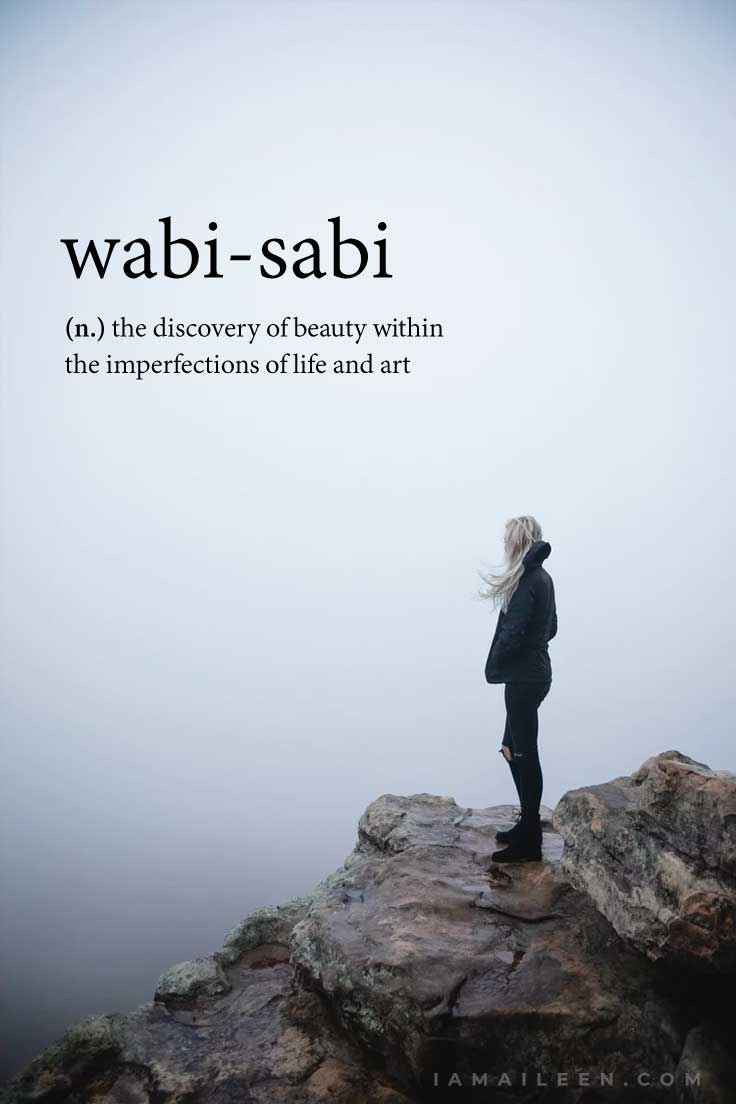
50. Wabi-sabi
The discovery of beauty within the imperfections of life (Noun / Origin: Japan / 侘寂 wabe·sabe )
This yet another Japanese aesthetic that has a very deep meaning in which life and art are viewed as beautiful not because they are perfect and eternal but because they are imperfect and fleeting. Isn’t this truly one of the best unusual travel words with a beautiful meaning?
. Bonus Unusual Words
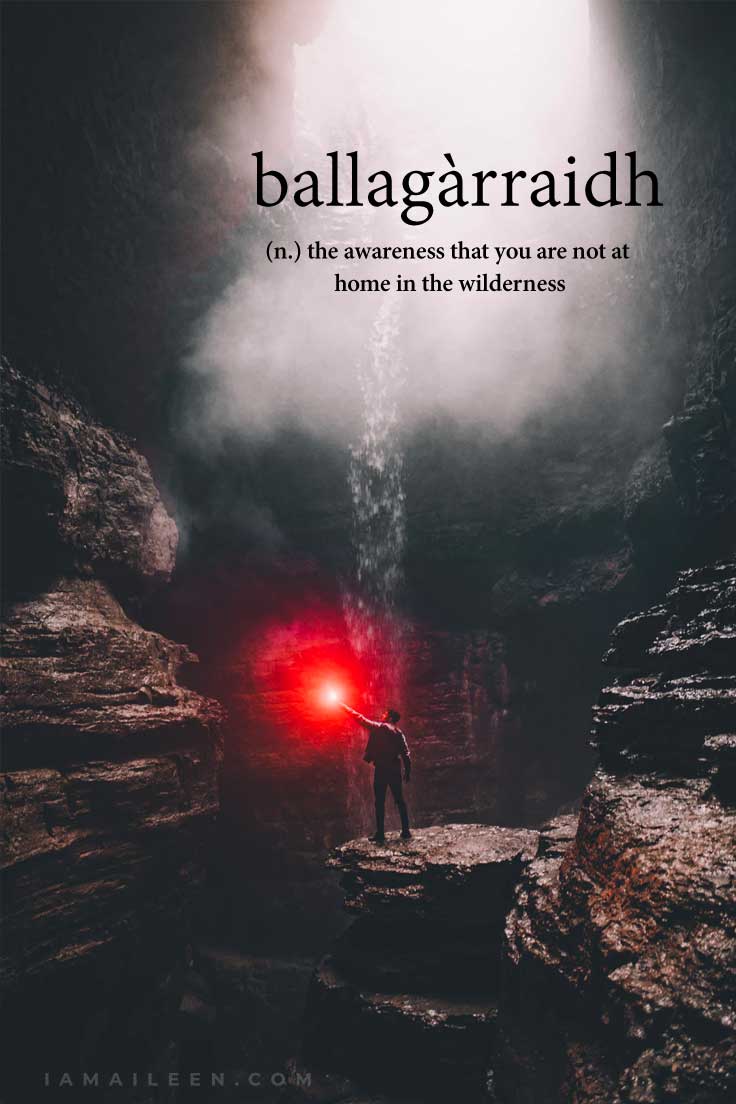
Ballagàrraidh
The awareness that you are not at home in the wilderneess (Noun / Origin: Dictionary of Obscure Sorrows / bal·la·ga·rye)
ETYMOLOGY : From Gaelic balla gàrraidh , “garden wall”
This is a word with a very deep meaning — so don’t let that simple definition fool you. To better understand it, I implore you to watch this video .
In fact, I gotta say that this is one of the unusual travel words that I often always feel most especially when I’m doing nature trips . Of course, there have been times when I’ve felt the opposite, but it’s more common to feel and be aware of how highly domesticated we all are. It’s not an entirely bad thing because advancement is a blessing; however, sometimes, it just makes you think how the olden times were truly far simpler and pristine. * sigh * I can’t really put it into words well, but let me know your thoughts once you get to watch the video above!

The awareness that this will become a memory (Noun / Origin: Dictionary of Obscure Sorrows)
ETYMOLOGY : From the French word dès vu, “seen as soon as” or “seen from this point forward”
“ Once in a while you look up, and watch as the present turns into a memory, as if some future you is already looking back on it. “

A feeling of warmth and cosiness as you enjoy life’s simple pleasures (Noun / Origin: Danish / hoo·gah)
This is a well-loved word in Denmark with Norwegian origins and you can even basically call it a way of life and it’s basically all about creating a warm atmosphere with other people.
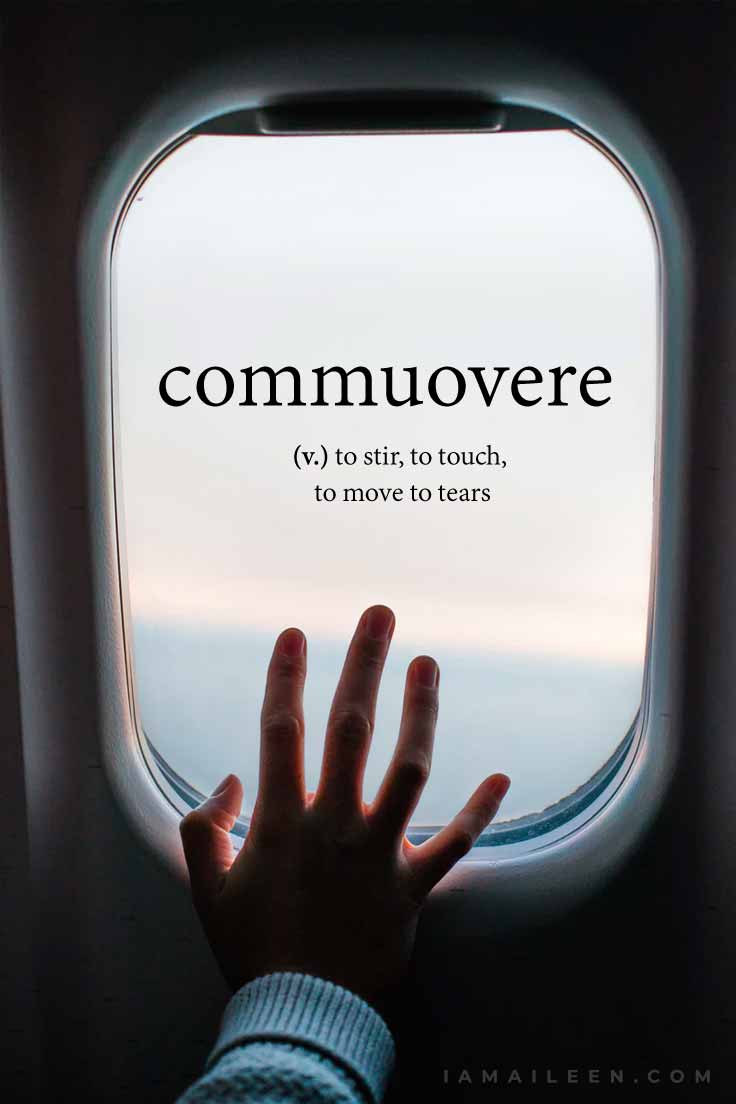
To stir, to touch, to move to tears (Verb / Origin: Italian / ko’mːwɔvere)
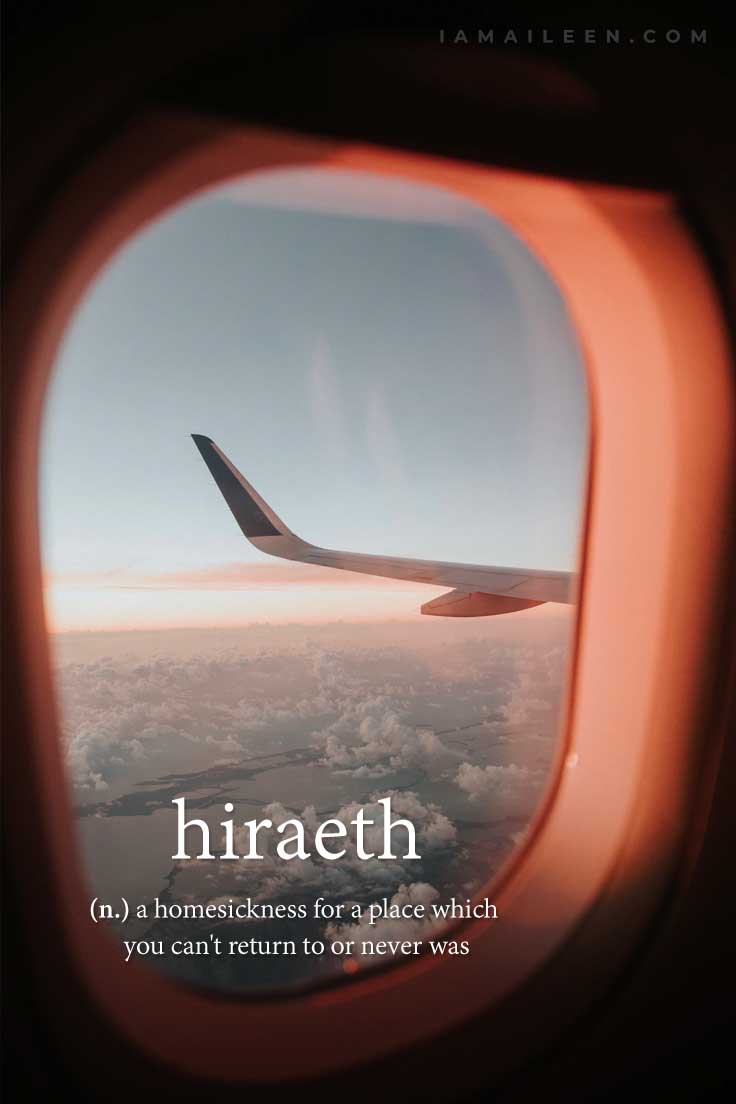
A homesickness for a place which you can’t return to or never was (Noun / Origin: Welsh / HEER-eyeth)
This is a Welsh concept of longing for home — but more than just missing something, it implies the meaning of having a bittersweet memory of missing a time, era or person.
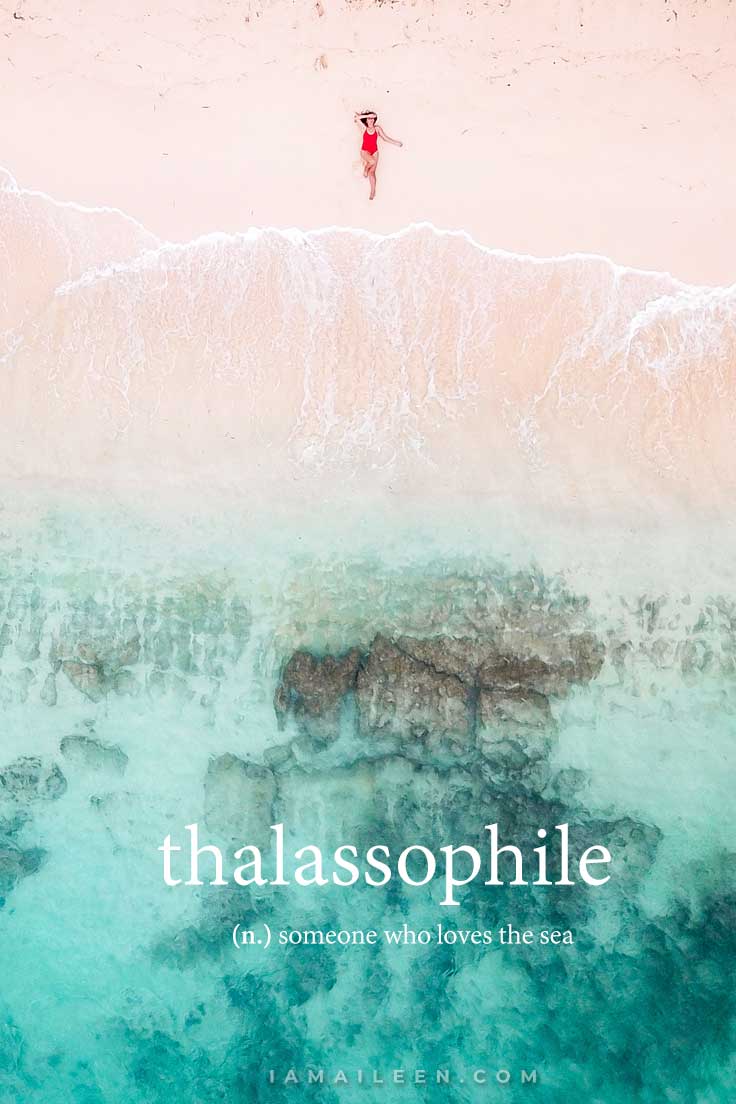
Thalassophile
Someone who loves the sea (Adjective / Origin: Greek / THəˈlasəˌfīl)
From the Greek words θάλασσα / thalasso- (sea) and -phile.
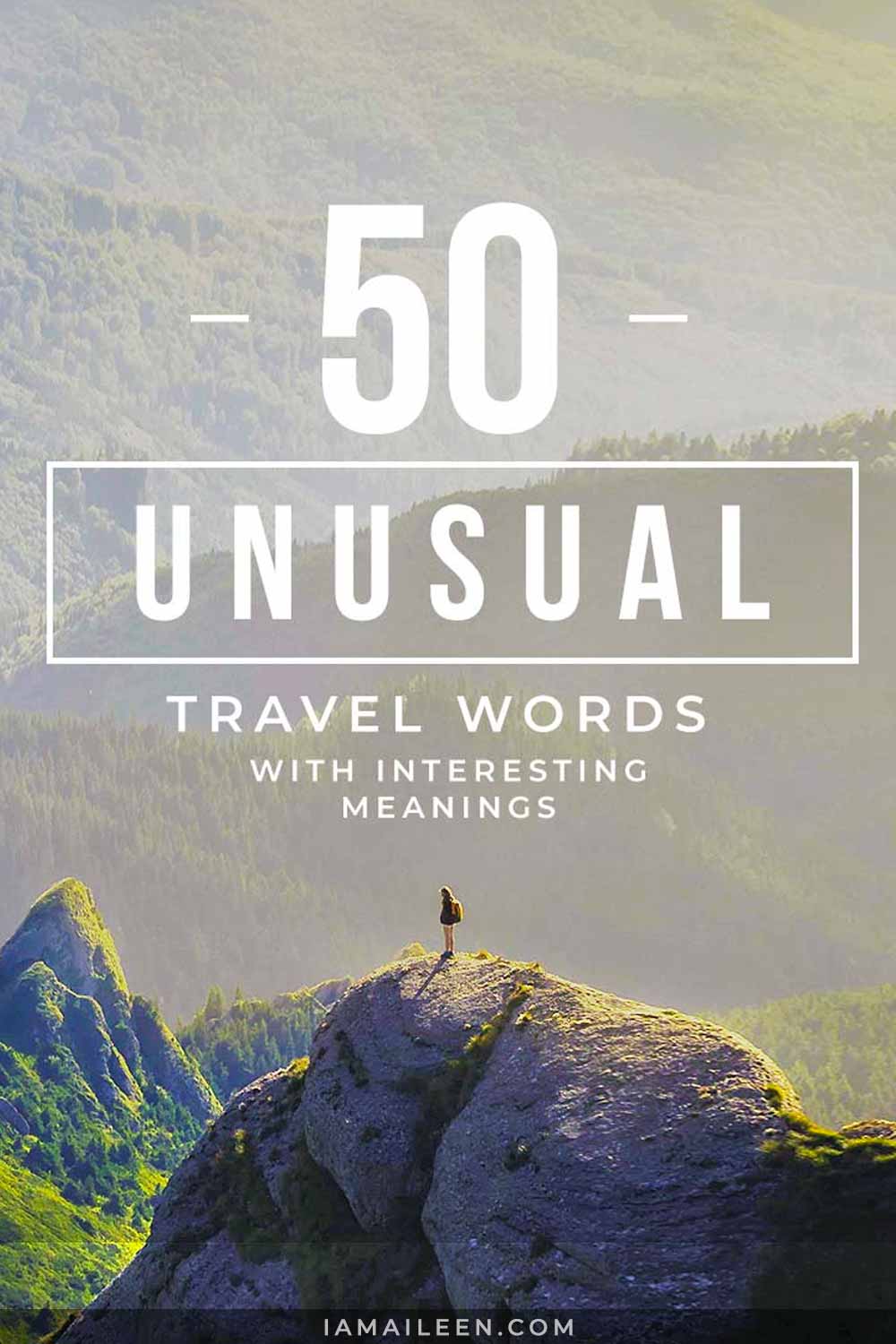
I hope you enjoyed discovering these unusual travel words — as much as I had a lot of fun discovering them too!
I’m sure there are still a lot of other unique words out there that could perfectly capture an emotion that we can’t easily express with our own language; so if you have something in mind that’s not already listed here, do let me know in the comments section below!
Have you seen my latest vlog?

Hey there! I am Aileen Adalid. At 21, I quit my corporate job in the Philippines to pursue my dreams. Today, I am a successful digital nomad (online entrepreneur, travel writer, & vlogger) living a sustainable travel lifestyle.
My mission? To show you how it is absolutely possible to create a life of travel no matter the odds — and I will help you achieve that through my detailed travel hacks, guides, resources, tips, and MORE!
Follow Along
CURRENTLY BASED IN: The Philippines
- 100k Followers
- 51k Followers
- 80k Followers
- 10k Followers
- 23.1k Followers
Join over 1 million readers worldwide and get my FREE packing checklist, gain exclusive access to travel giveaways and more!
Success! Next, please check your email to confirm your subscription.
GET FREE PRINTABLE NOW!
Trending Now
Best hotels in cebu: from cheap to luxury accommodations and places to stay.
Explore the best hotels in Cebu — from luxurious five-star resorts, cozy boutique stays, to budget-friendly hostels!
EU261 Compensation: Your Essential Guide on European Flight Delays or Cancellations
Learn to claim EU261 compensation for flight disruptions like delays, cancellations, downgrades, or denied boarding!
20 Safest Countries for Solo Female Travelers: The Best Trip Destinations in the World (& The 5 Worst!)
Find out the BEST and safest countries for solo female travelers to go on adventures to — as well as the 5 most dangerous destinations!
How to Start a Travel Blog in 2024: Your Ultimate Guide with Easy Step-by-Step Instructions
So you want to know how to start a travel blog? Here’s a comprehensive and easy to follow step-by-step guide to help you start successfully!
Top 20 Philippine Online Shopping Sites for Gift Ideas & More
Running out of gift ideas? Not enough time to go shopping? Here are the top 20 online shopping sites in the Philippines to help you out!
Latest Posts
Learn Today
How to start a successful blog, 46 comments.
I really really enjoyed this ! And esp the way it was presented. I am crazy about words. Yhanks. Pardis Kavousi
Submit a Comment Cancel reply
Your email address will not be published. Required fields are marked *
Be notified of follow-up comments by email
Submit Comment
Pin It on Pinterest

- Ask RAI / Inspiration / Quotes / Travel / World Languages
ᐅ TRAVEL LOVER: 100 Unique + Creative Travel Words From Around the World
Published January 18, 2024 · Updated January 18, 2024
Get inspiration from around the world with these catchy and creative travel words in other languages >> A list of the best words for travel lovers. ❤️
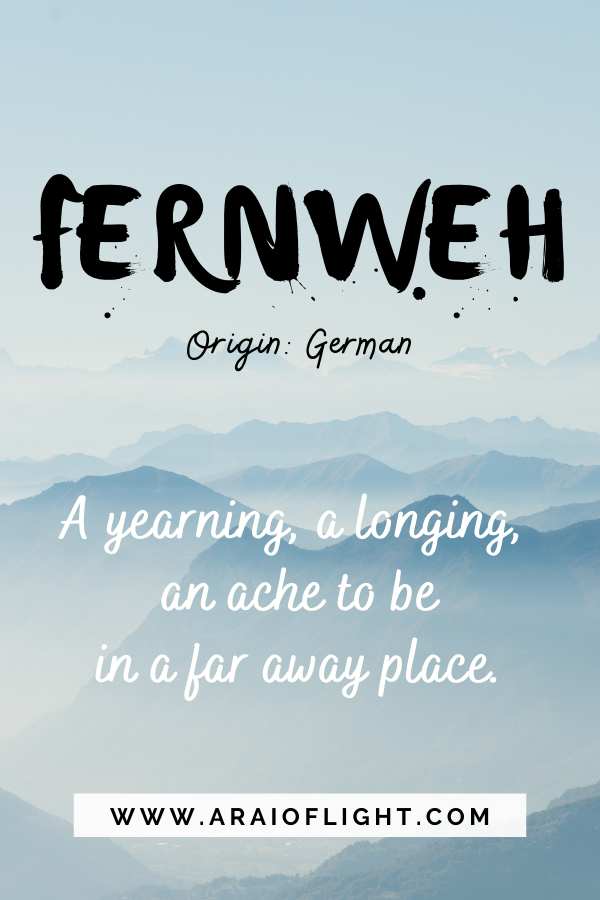
Travel. It can leave you speechless and then turn you into a storyteller . The experience has a tendency to make us feel a plethora of emotions and when you’re reliving those times there may not be an accurate word to describe the travel experience , the adventure, the magic, the moments, or the way you felt. This loss of words is more common than you may think. Especially since the English language is limited when it comes to words related to travel or words to describe a person who loves to travel. Sure, you could use the popular travel word wanderlust, but it is also often way overused (have you noticed every new travel influencer and their dog jumping on the wanderlust-wagon?). Rather use these wanderlust synonyms below instead.
Wanderlust (n.) Origin: German Definition: A strong, innate, impulse or desire to travel the world
How do you explain your deep-seated need to get away or the desire to always be on the move and live a nomad existence? Is there a travel-related word to describe the mix of excitement and anxiety one feels on starting a new journey? Are there other creative words for travellers to articulate the curiosity to experience other cultures , other exotic foods , other landscapes, and other ways of life around the world? How can you express the profound feeling of awe you feel on the awareness of the vastness and beauty of the universe when observing the stars? Or the thrill of discovering a hidden waterfall during a hike up a mountain to catch the last sunset?
Fortunately, there are foreign words from other cultures and different languages to voice these special moments. These beautiful travel words , often with no English equivalent, are meant to educate and inspire you. And perhaps even assist with your next clever travel caption for the gram or pinterest.
>> Must Read:
- More foreign language guides: How to say Hello , Thank You , Goodbye , and Love in different languages around the world
- Fun list: Best travel questions , the world’s best flags , or these road trip questions
- The top 50 travel songs to add to your playlist
- Why is travel important? Find 10 key benefits of travelling the world
- Get inspired: Short quotes about traveling and funny travel quotes
What do you call someone who loves travel?
Hodophile — one who loves to travel
Studies have shown that people who spend their money on experiences rather than material stuff, such as travel, tend to be more open minded, creative, carefree, and happier in their life. *searches for my next flight out.
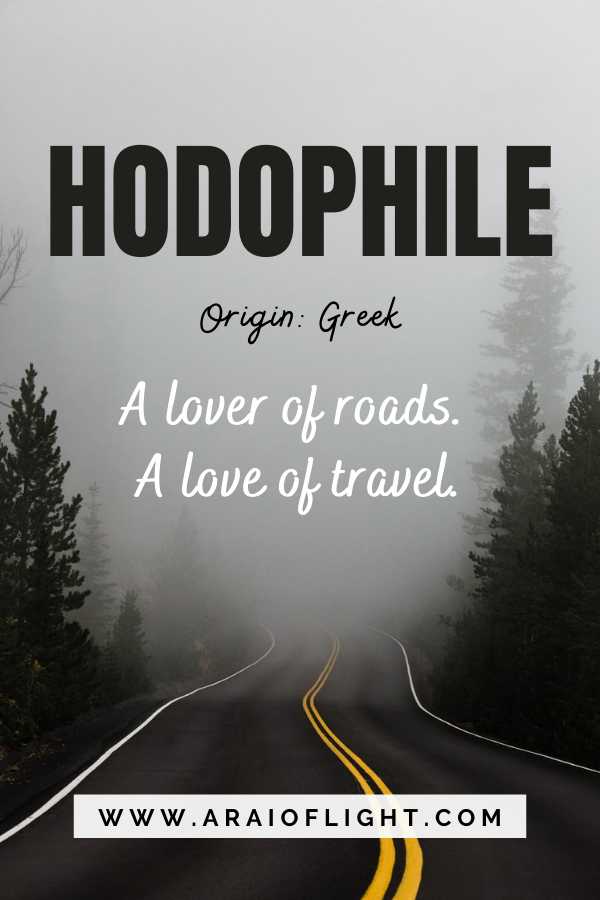
Travel the Word: Unique + Beautiful Travel Words from Other languages of the World
A handful of my favourite words associated with travel. Save a couple of your own favorites from this list , bookmark this page, and add them to your vocabulary before your next adventure! Describe your explorations with these foreign words about travel taken from different languages around the world . Ready. Let’s go….
v. = verb n. = noun adj. = adjective
In alphabetical order….
Absquatulate (v.)
to leave without saying goodbye.
Origin: North America My close friends know that I absquatulate. Like, a lot. So no surprise there, when the urge to pack your things and just disappear shows up… with no time to say goodbye. Continue reading to find more creative words for travelers.
Coddiwomple (v.)
To travel purposefully towards a strange location.
Origin: English slang Some days you wander with no plan at all, seeing where the day will take you. And other days, you coddiwomple. I do like the sound of this unusual word related to travel.
Cosmopolitan (v./adj.)
A citizen of the world or at home all over the world.
Origin: English This definition varies, depending on whether you use the word as a noun or an adjective. Even though, the origins of these creative travel words are from English, it can be traced back to Pythagoras, who first used the Greek word kosmos as a way to describe the order of the universe. Travellers naturally feel at home in the world and the saying, “home is where the heart is” applies perfectly.

Dérive (n.)
To drift unplanned on a spontaneous journey, leaving everyday life behind and guided by the scenery, architecture, and landscapes.
Origin: French One of my favourite words to describe my travel experience. This untranslatable travel term perfectly describes spontaneous exploration. There is no strict plan, instead going with the flow away from the beaten beaten path and towards unplanned discoveries such as a beautiful sunset .
Dromomania (n.)
An uncontrollable and irrational impulse or psychological urge to wander or travel without purpose.
Origin: Greek Dromomania, also referred to as travelling fugue or vagabond neurosis, is seen as an abnormal and uncontrollable psychological impulse to wander. It comes from a combination of the Greek words dromos and mania to diagnose those with this condition to spontaneously abandon their everyday lives to travel long distances, even taking up different identities and occupations. This irrational desire stems from a strong emotional and physical need to constantly be travelling and having new experiences. It also often involves sacrificing security, relationships, and careers in the hunt for these experiences. Fantasies about exploring occupy their thoughts and dreams. I guess, I have a serious undiagnosed case of the dromomania.

Ecophobia (n.)
A fear or distaste of home.
Origin: Greek Now, this unusual word for travel can be used in the literal sense. Or, as I prefer, to describe when you can’t stop thinking about a different place. A place, other than where you live. Say, an exotic tropical island ?
Eleutheromania (n.)
The intense and insatiable desire for freedom.
Origin: Greek When asked why I pursue travel so much, my response often involves an insatiable yearning for freedom, amongst the many other reasons for exploring the globe. Yes, I’ve since learned that freedom comes from within as much (or even more) than your external circumstances. However, the very act of travelling does leave me feeling free and eleutheromania perfectly describes the desire for this feeling. For sure, one of my favourite words associated with travel holidays and tourism.
Eudaimonia (v.)
A state of feeling happy and content whilst travelling.
Origin: Greek This is one of my favourite words associated with travel because it such an apt description of the journey. The joy of wandering, the excitement of new discoveries, the contented state of living the dream…. and everything feels perfectly alright. Even when things go wrong .
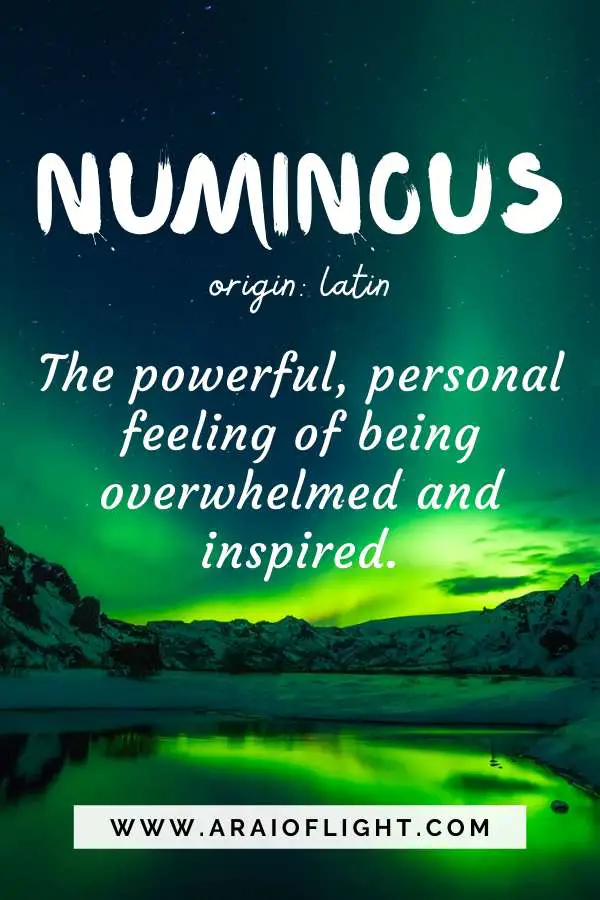
Exulansis (n.)
When you give up trying to talk about an experience because none are able to relate to it.
Origin: Dictionary of Obscure Sorrows How many times have you given up trying to explain yourself or something you’ve done because those around you are just not on the same wavelength as you and are unable to relate or even understand. Yeah, I know this feeling all too well and exulansis is one of the most unique travel words I’ve come across to articulate this.
Fernweh (n.)
Distance sickness. A yearning, a longing, an ache to be elsewhere. To be in a far away place.
Origin: German Not as popular or overused as wanderlust, this catchy travel word has gained much traction over the past few years. This German word is often described as feeling homesick for a far away place. A place you’ve never been to before. This urge to travel is strong and fernweh, a synonym for wanderlust, describes the aching desire to be far away from home.
Flâneur (n.)
Someone who strolls aimlessly and enjoyably, observing life and their surroundings.
Origin: French One of the best words describing travel lovers, flâneur derives from the French flâner, meaning to stroll or saunter. My favourite kind of days when travelling do not have a plan nor involve a requirement to be in a particular place. It is simply wandering around aimlessly at a comfortable pace, observing the local life and appreciating the day as it unfolds. Yes, I am a big time flâneur.
Forelsket (adj.)
The overwhelming euphoric-feeling that takes place at the early stages of falling in love.
Origin: Norwegian
Gadabout (n.)
A habitual pleasure-seeker who moves about restlessly or aimlessly.
Origin: Old Norse It is used to refer to a person who gads or walks idly about. A person who’s constantly on the move, restlessly seeking amusement along the way.
Gallivant (v.)
to roam without a plan… to wander about, seeking pleasure or diversion.
Origin: German No list of creative travel words is complete without including gallivant. This word is used to describe the action of going to many different places as a form of enjoyment while completely forgetting or disregarding other things you should be doing. As an example, using travel as a form of escape, something that many a lover of travel is guilty of.
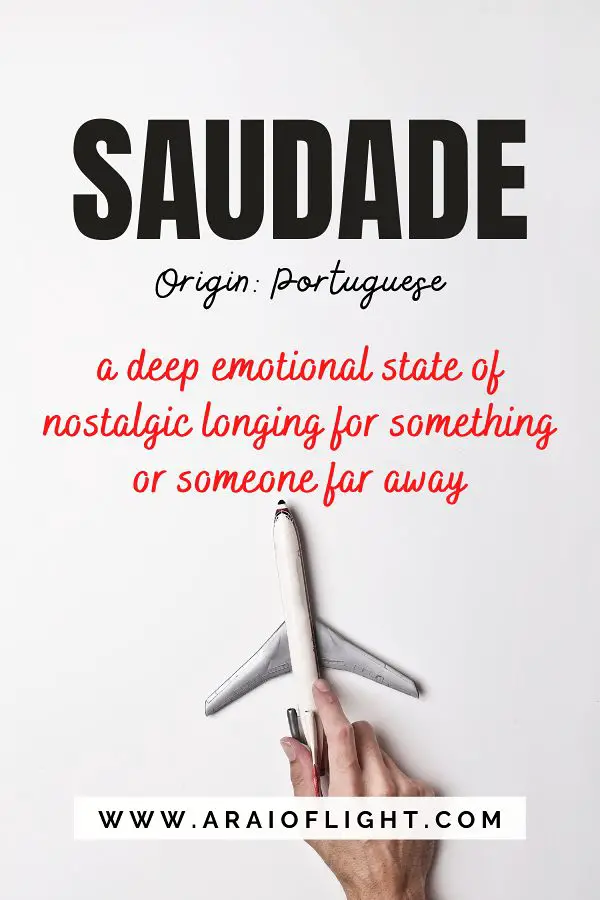
Hiraeth (n.)
A homesickness for a place which you can’t return to. A longing for what may no longer exist.
Origin: Welsh This Welsh term describes not just a longing for home, but a nostalgic desire to reconnect with a place or time period you can’t return to or that may not exist anymore.
Hodophile (adj.)
A lover of roads . A love of travel.
Origin: Greek A unique word to describe a person who loves to travel. I mean, what’s there not to love about exploring the world. The unusual sights, the new tastes, the beautiful landscapes and the people you meet along the way. Raise your hand if, like me, you’re the biggest hodophile? *guilty as charged
Holoholo (n.)
to ride or walk around for pleasure.
Origin: Hawaiian One of my favorite Hawaiian words , it is the perfect description of something I do a lot when exploring a new country.
Hozhoni (n.)
a feeling of being filled with beauty and balance.
Origin: Navajo
The feeling of comfort, relaxation, and coziness in certain settings around certain people, particularly friends.
Origin: Danish This unusual word is not just reserved for travel and holiday, but it is perfectly suited to describe those moments when you’re enjoying a meal, drinks, and those simple pleasures with friends around the world. The Dutch words gezellig or gezelligheid is similar to hygge, describing that feeling of ease and coziness when you’re around friends you feel comfortable with.
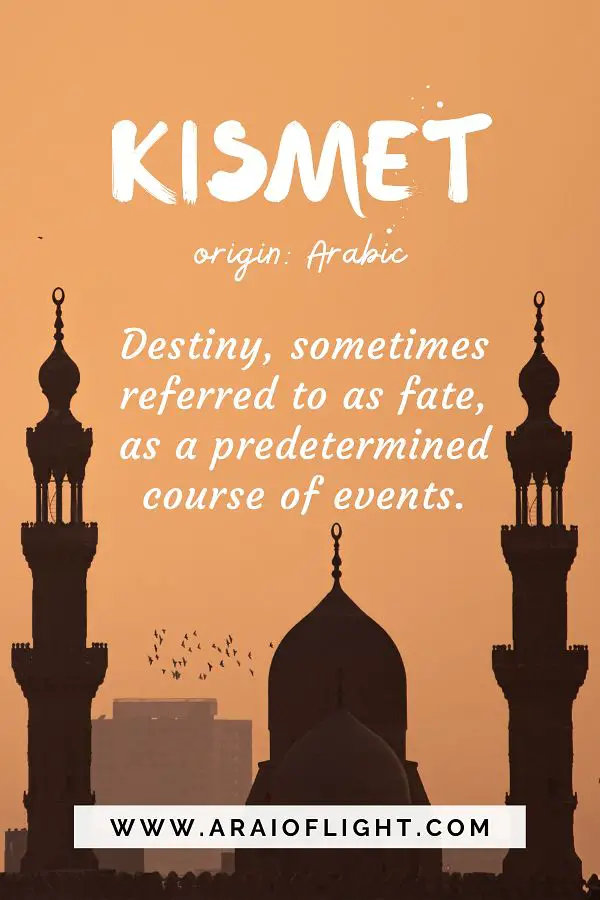
Kismet (n.)
Destiny, sometimes referred to as fate, is a predetermined course of events. It may be conceived as a predetermined future, whether in general or of an individual .
Origin: Arabic This beautiful Arabic-derived word refers to one’s destiny and something that one believes was meant to be.
Livsnjutare (n.)
A person who truly enjoys life and lives it to the extreme .
Origin: Swedish This unique trip word, of Swedish origin, is often used to describe someone who enjoys life and lives it to the full, making the most of each moment. When I am wandering around the world, in places like Mexico , it certainly feels like living to the extreme.
The feeling of enjoyment and oneness with the Universe that comes from the simplest of pleasures .
Origin: Serbian
Meraki (n.)
Doing something with creativity, with love, with soul — when you put “something of yourself” into what you’re doing.
Origin: Greek A beautiful word, that also happens to be one of my favourites. Meraki, derived from Greek, describes the action and the feelings that results when one does something with complete focus and love. Being so caught up with what you’re doing as if your entire being and soul is part of the whole experience. Moments of meraki flood my experience often when painting or when exploring a beautiful landscape.
Monachopsis (n.)
The subtle but persistent feeling of being out of place .
Origin: Greek It comes from the combination of words monos and opsis, where ‘monos’ means solitary or unique and ‘opsis’ refers to like or appearance.
Nefelibata (n.)
One who lives in the clouds of their own imagination and does not obey convention.
Origin: Portuguese Ok, this is me. Just a beautiful meaning word to describe a person who loves to travel. The direct translation is “cloud-walker,” referring to those, like myself, who live in their own world/imagination. An unconventional person that does not blindly follow the rules of society. More about me here.
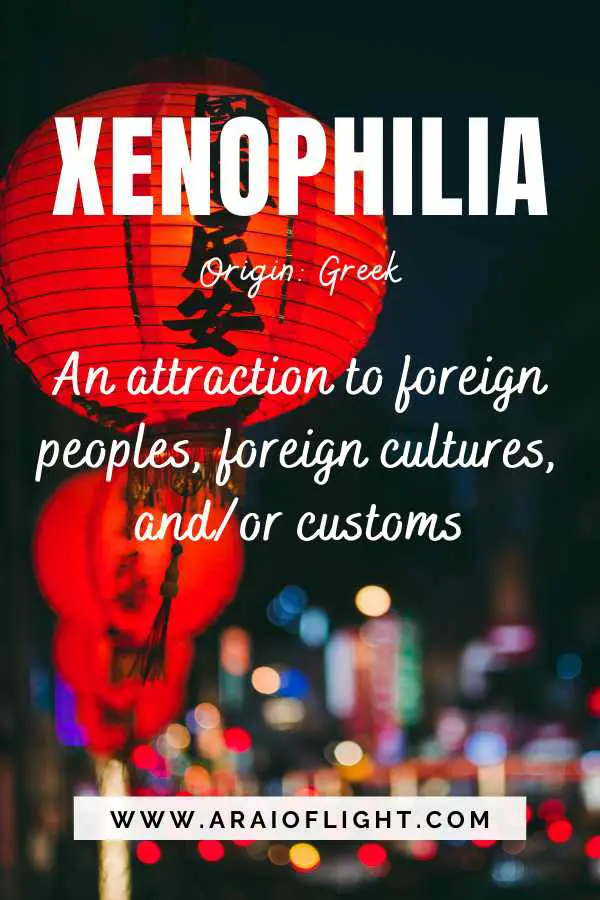
Novaturient (adj.)
A desire to alter your life. The feeling that pushes you to travel.
Origin: Latin This is the feeling that pushed me to quit my job and travel the world. You know, when you are curious to discover what more is out there.
Numinous (adj.)
The powerful, personal feeling of being overwhelmed and inspired.
Origin: Latin Numinous has its origins in Latin, meaning to be both fearful, awed, and inspired by what you see and experience before you. Exploring tends to bring up all the human emotions, often simultaneously, and these catchy travel words are an apt description of the experience. Like the time I went trekking among some of the highest mountains in the world in Nepal .
The awareness of how little of the world you will experience.
Origin: The Dictionary of Obscure Sorrows Once you start seeing the world, you realise just how much more there is to see out there. And you actually reach a point, somewhere along the journey, where you come to the realisation that no matter how extensive your travels are, you will only ever experience a little bit. This realisation is referred to as onism. This creative word associated with travel is not from a foreign language, but actually originates from a book by John Koenig.
Peregrinate (v.)
Travel or wander from place to place.
Origin: Latin From the Latin peregrinari, meaning “to travel abroad,” this type of inspirational travel words refers to a long journey in which you travel to various different places, especially on foot.
Peripatetic (adj.)
A person who travels from place to place.
Origin: Greek Originating from the Greek word peripatein, “to walk up and down,” this adjective is used to describe backpackers who are constantly moving from place to place, living a nomadic existence .
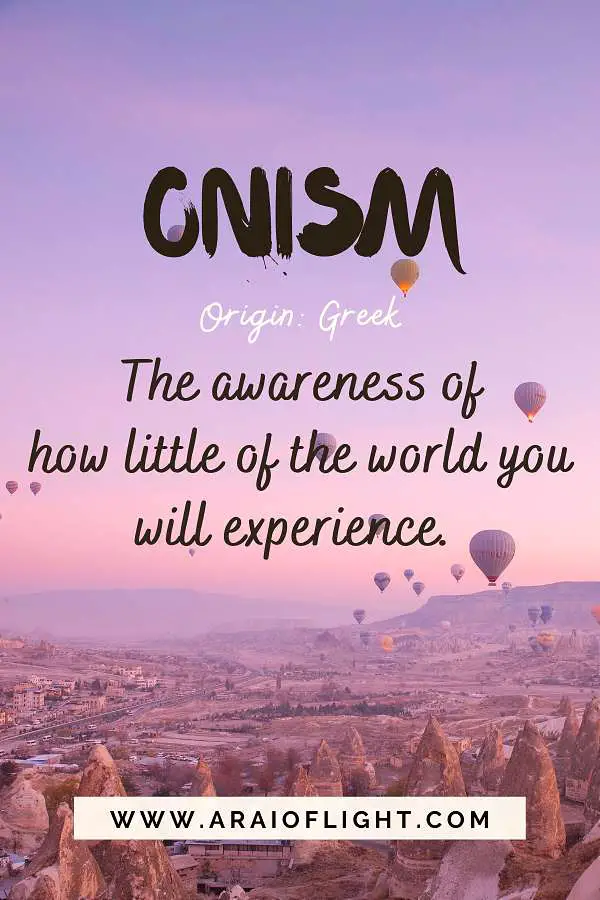
Photophile (n.)
A person who loves photography and light.
Origin: English This pretty word is derived from the biological term of the same name for an organism that loves or thrives in light . If you carry a camera with you wherever you go and post to photo sharing websites ( like instagram ) all day, you’re a photophile.
Quaquaversal (adj.)
Directed outwards in all directions from a common centre
Origin: Latin A good word for travel and the desire to experience everything all at the same time.
Querencia (n.)
The place where you are your most authentic self. Where one’s strength is drawn from; where one feels at home.
Origin: Spanish The term comes from the Spanish verb “querer,” which means “to desire.” Many long term travellers feel at home in the world and their most authentic self when connecting with this place. One of the best words for travel lovers.
Resfeber (n.)
the restless race of a traveler’s heart before the journey begins, when anxiety and anticipation are tangled together.
Origin: Swedish Another catchy word related to travel, resfeber is universally used to describe the mixed emotions one feels just before the journey begins. These emotions include both excitement as well as anxiety and nervousness when starring in the face of the unknown. Like that time I had decided to climb Kilimanjaro , the highest mountain in Africa .
Rückkehrunruhe ( n.)
The feeling of returning home after a trip only to find it fading rapidly from your awareness.
Origin: The Dictionary of Obscure Sorrows

Saudade (n.)
a deep emotional state of nostalgic or melancholic longing for something or someone far away that one cares for and loves.
Origin: Portuguese This is the creative word to use when you’re fondly thinking back to a beautiful moment during your travels and longing to return to that experience.
Schwellenangst (n.)
a fear of, or aversion to, crossing a threshold or entering a place to begin a new chapter.
Origin: German That anxious and fearful feeling you get when you’re about to begin a new chapter in your life, like a new travel adventure to the Caribbean islands . That’s schwellenangst.
Sehnsucht (n.)
a wistful longing and yearning of the heart for travels that have been and travels to come.
Origin: German
Selcouth (adj.)
Strange and uncommon. Unfamiliar, rare, and yet marvellous.
Origin: Old English This is one of my favourite travel words on this list. Not only because of its unusual sound, but also because it is an appropriate way of describing the way you see things when you travel. Everything is unfamiliar and strange, yet we find it inviting and marvellous anyway, much like my time in these South American countries .
Smultronställe (n.)
A special place discovered for solace and relaxation.
Origin: Swedish This Swedish word directly translates to “place of wild strawberries,” used to describe a location or place in this world where you feel most at home. A place that serves as a refuge from any stress and/or sadness. This place, once discovered, is often returned to for comfort and consolation.
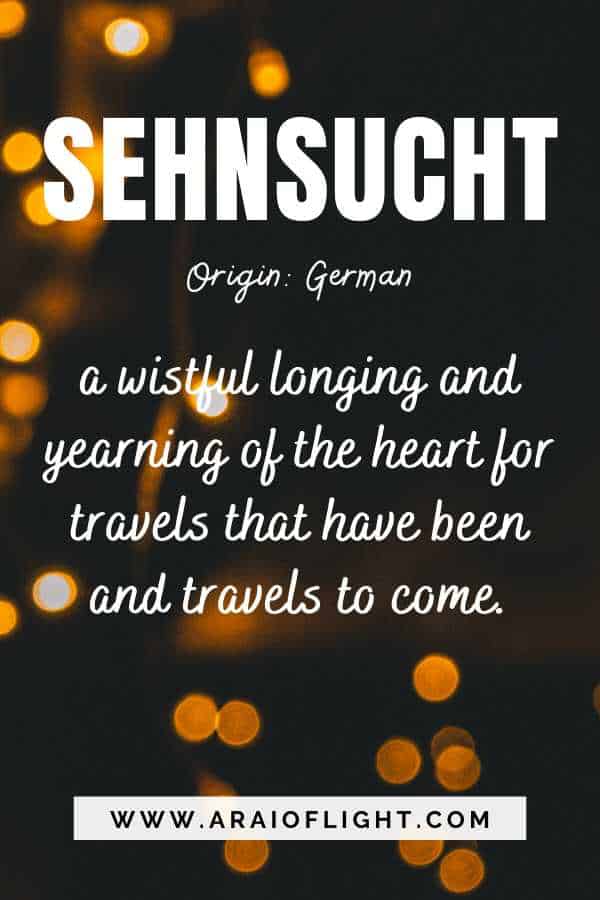
Sojourn (n.)
To stay as a temporary resident. A short period when a person stays in a particular place.
Origin: Old-French Like the months I’ve spent in one of my favorite cities Paris , over the years.
Solivagant (adj.)
A lone wanderer. A solo traveller. A person who revels in the act of wandering alone.
Origin: Latin This popular word, to describe a person who loves to travel alone, as opposed to vacationing with family or friends . It originates from the Latin sōlivagāns, with sōlus meaning “alone” and vagāns meaning “wander.”
Sonder (n.)
The realisation that everyone you pass is living a life just as complex as yours.
Origin: Dictionary of Obscure Sorrows Have you ever had that realisation that a random stranger is living a life that is just as complex and vivid and important as your own. This is sonder. Just a beautiful word and one of the best for travel lovers.
Strikhedonia (n.)
The joy of being able to say “to hell with it.”
Origin: Greek This word about travel perfectly describes the time you stop making excuses, quit everything, book a one way flight , and explore the world. Exactly what I did in 2013, leaving behind my well-paying career in finance to travel the world .
Sturmfrei (adj.)
The freedom of being alone. The ability to do what you want.
Origin: German This German word that directly translates to “storm-free.” However, its real meaning has nothing to do with the weather nor a description about how we feel. It is more a description of the situation itself, such as having the house to one’s self or not having to wait or compromise on what you want to do as a solo traveller.
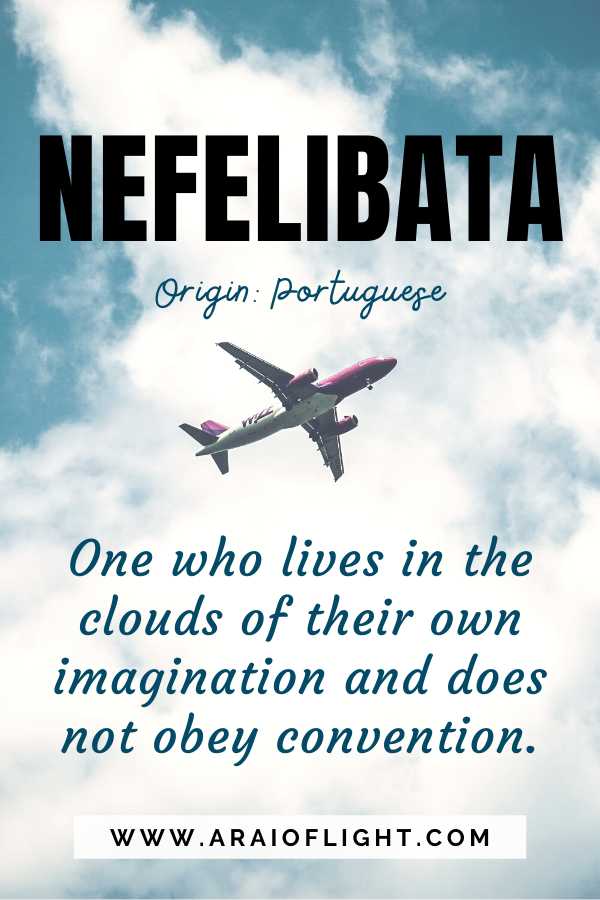
Thalassophile (n.)
a lover of the sea.
Origin: Greek A coconut, a tropical island, a hammock, (maybe some cute animals like those found on Flamingo Beach Aruba ), and a bungalow that leads directly onto the beach and into the sea. Is there anything more that you need, fellow thalassophile?
To wander or roam around in a carefree way
Origin: Thai
Traipse (n.)
To go on foot. A tedious or tiring journey on foot
Origin: unknown
Travitude (n.)
when you start to feel grumpy cause you to miss traveling.
Anyone been feeling this way recently? I sure have.
Tripophobia (n.)
The fear of not having any travel trips currently booked.
When the world and travel shut down in 2020, thipophobia was the main emotion running through my veins. What kind of life is it where there are no adventures to look forward to and you’re forced to remain in the same location for the foreseeable future. You tell me?
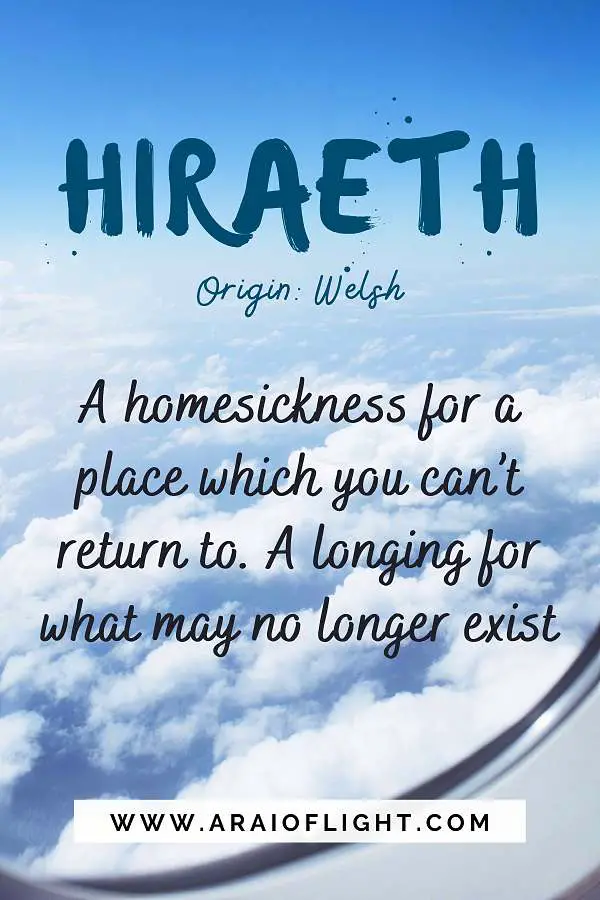
Trouvaille (n.)
Something lovely discovered by chance. A chance encounter with something wonderful.
Origin: French When travelling, especially without much of a plan and with an open heart, it is not uncommon to discover something beautiful purely by chance. These discoveries make for some of the most memorable experiences. This interesting travel word is often used by French travellers to describe a chance encounter. It’s time the rest of us use this word too the next time we unexpectedly stumble upon an inspiring landscape, a cute cafe, or a welcoming local.
Vacilando (v.)
The act of wandering when the experience of travel is more important than reaching the a destination.
Origin: Spanish The word, from Spanish, aims to describe someone who travels for travel sake, and not to reach a particular goal or destination. For us, the journey is more important than the destination or vacation spot . While others despise the act of getting to a place, I savour it and enjoy the long plane, boat, or bus rides and the happenings along the way, especially if the journey occurs in a beautiful setting like the Spanish islands or Greek islands . One of the most inspiring travel words that should be a part of every globetrotter’s vocabulary.
Vagary (v.)
A whimsical or wandering journey.
Origin: Latin With its origins in 16th-century Latin, Vagārī translates as, “to roam.” This unique travel word to describe the travel experience of an unpredictable or impulsive desire or action for a wandering journey.
Vorfreude (n.)
The joyful anticipation when looking forward to something or while imagining future pleasures.
Origin: German Much like the idea or plan of moving abroad and living in Costa Rica .
Waldeinsamkeit (n.)
The feeling of solitude, being alone in the woods and connected to nature.

Wayfarer (n.)
Someone who travels, especially on foot.
Origin: English The travel term may seem modern, but it goes back all the way to the mid-1400s as a combination of way defined as “a path or course leading from one place to another,” and fare, meaning “to go, travel.”
Xenophilia (n.)
An attraction to foreign peoples, foreign cultures, and/or customs.
Origin: Greek This attraction, appreciation, and affinity for foreign people, their cultures and customs is what draws many to explore the world. These unique travel words, as a synonym for wanderlust, comes from the Greek “xenos,” meaning “unknown, stranger, foreign” and “philia,” defined as “attraction or love.”
Yoko meshi (n.)
The stress of speaking a foreign language.
Origin: Japanese Another word related to travel that literally translates to, “a meal eaten sideways.” It is used to explain the difficulty and stress when trying to speak a language that is not your native language, whether at home or when abroad. Like, that time I found myself in St Petersburg , struggling to speak Russian to get around the city.
The desire to feel things just as intensely as you did when you were younger.
Origin: Chinese As you grow older, life seems to be less exciting. Travelling overseas and exploring new places is one way of mitigating this. Yu Yi is an inspirational Chinese word that describes the yearning to feel things the way you did while growing up, before expectations, before memory, before words.
a profound, mysterious awareness of the vastness and beauty of the universe… and the sad beauty of human suffering.
Origin: Japanese This untranslatable travel word is used for those moments that lead to a greater awareness and trigger a deep emotional response within.

Over to YOU… Did you enjoy traveling the word? How many of these these creative travel words have you heard before? Which one(s) your favorite and which of these unique words associated with travel do you resonate with most? What phrases describe the travel experience and make for the best words for travel lovers in your language? Let me know in the comments below or start a conversation with me on social media.
>> Read next:
- Learn these words in other languages: Beautiful . Light . Cheers
- The ultimate list of smile quotes to keep you smiling all day
- The best quotes about travelling to inspire you
- How many countries in the world? And should you visit all?
- Sustainable travel: 10 ways to become a more responsible tourist
- Be inspired: An ode to my fellow travellers .
- What should you do with you life? What is the purpose of life?
Your fellow hodophile, Rai
You may also like...
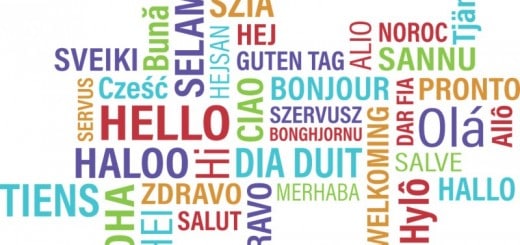
200+ Ways To Say HELLO in Different Languages! (With Pronunciation)
January 27, 2024
by Raihaan · Published January 27, 2024

100+ Short Travel Quotes That Are BIG on Inspiration
September 7, 2023
by Raihaan · Published September 7, 2023

Cinque Terre Italy — Quick Travel Guide
June 28, 2023
by Raihaan · Published June 28, 2023
Leave a Reply Cancel reply
Your email address will not be published. Required fields are marked *
- Next story First Trip to Egypt? My Ultimate Guide of Insider Tips To Know BEFORE You Go
- Previous story My Stay at Tintswalo at Waterfall: Hotel Review
WHO IS ARAIOFLIGHT ✈

Welcome to A Rai of Light!
A home for extraordinary people around the world. If you've ever felt like there must be more to life, this site is for you.
Out of a love for travel, writing, photography, sharing stories and a desire to inspire others , I created this space to connect with other like-minded individuals.
Along the way, I share my journey and strategies on Travel , Art and Life . Enjoy!
DISCOVER MORE: POPULAR ✈
- Recent Posts
- Popular Posts

Nomad eSIM Review: Everything You Need to Know as a Traveler

Best Safari in Africa → Top Countries + Places for First-Timers

Greece Island Hopping: Your Complete Travel Guide

35 Essential Dominican Republic Travel Tips in 2024 [+ Top Destinations]

Epic List: The Best Short Treks in Nepal!

Where To Stay in Chicago FIRST TIME → Best Areas + Hotels

Living in Costa Rica → Honest Pros and Cons To Know BEFORE Choosing That Pura Vida Life

Ranked: 15 Most Beautiful Flags in the World in 2024
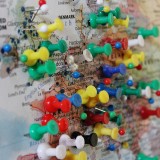
List: Which Countries Can You Visit on a Schengen Visa in 2024

WEIRD Food around the world | 35 World Travelers reveal the strangest food they’ve ever eaten

First Trip to Egypt? My Ultimate Guide of Insider Tips To Know BEFORE You Go

Flying Tips: 13 Things NOT To Do on an Airplane

Aruba Flamingo Beach: Worth $130? + How To Visit in 2024
FOLLOW THE ADVENTURE ✈
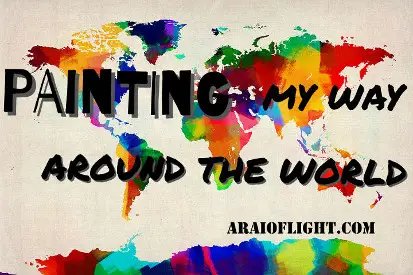
- Work With Us
- Blogging Resources
- Trip Planning

- Destinations
- Solo Travel
- Couples Travel
- Family Travel
- Expat Tips + Stories
- Expat Interview Series
- Inspiration + Musings
Get Inspired
42 inspiring & unusual travel words (besides wanderlust).
We’ve all tried to find words to describe a travel experience, and sometimes nothing seems to quite explain it right.
I love discovering new ways to express myself, and over the years I’ve slowly collected the below list of creative travel words that are either not commonly used in English or are from another language or are words that describe travel emotions we go through much better.

If you’re a bit of a Pinterest addict like me you might have heard some of these alternative words for travel before, but hopefully, some are new.
After all, we could all use some other words for wanderlust!
These are just a few of my favourite words associated with travel.
As someone who writes about travel all the time, I love finding new words for travel and to describe travel experiences.

Everyone knows wanderlust, but are there words for wanderlust in other languages, or even just another word for travel too?
I first wrote this post back in 2015 with just 24 new travel words that I had found over the course of the year while I was living abroad in Spain .
Since then I’ve come across many more so I’ve updated it to include the new ones!
Each travel word definition has been written in my own words, with a photo of my own, and examples from my own experiences.
I hope that you’re able to learn some new words for travel (that aren’t wanderlust but are other words for wanderlust!) and be a bit inspired by them like I have been!
The unusual travel words you need to know:
Resfeber (n), origin – swedish.
The tangled feelings of fear and excitement before a journey begins.
This is one of the most popular words associated with travel and all over Pinterest!
We’ve all felt this. That jolt in your heart when you book your flights, or when you tell your family and friends what you’re about to do.
Now that feeling has a word you can use!
This feeling is for new travellers and old alike. I still feel it when I embark on new journeys, especially before I moved to Spain to teach English .

Fernweh (n)
Origin: german.
Farsickness. An urge to travel even stronger than wanderlust.
That feeling you get when you’ve been home too long and you ache to be out into the world again.
Sometimes you don’t know where you want to be, but you know that it’s away. Sometimes you know where, and you want to get there as quickly as possible. This is that feeling.
I’ve had a serious case of the post travel blues , and felt this to the extreme!
It’s one of my favourite words related to travel, since it really does describe how I’ve felt on so many different occasions.

Origin: French
To drift unplanned, led only by the landscape and architecture around you.
The idea that even if you drift you will end up falling into a path that is lined out for you by your surroundings. This could describe life overall, but it also describes small journeys.
When you’re wandering through a new city and you just happen to wander on a path that takes you to great discoveries.
This happened to me in Stockholm, when I went to the archipelago and saw absolutely nothing of the city, and again in Lisbon where we made no plans and just let the city show us where to go.
This is a travel word I’ve seen less often, probably because many of us love to plan our trips, tick things off a bucket list and not miss out, but sometimes if you just allow yourself to wander you’ll find the most unexpected and best things of your trip.

Numinous (adj)
Origin: latin.
Feeling both fearful and awed by what is before you.
I don’t know why but there’s something intriguing about finding Latin words for travel. Maybe it’s because it’s not a language we really use anymore, but it forms the basis for so much of ours now.
There are quite a lot of words for travelling that are Latin based, or that we can turn into a word associated with travel.
Firstly referring to divinity, but I think it is a wonderful way to describe how you feel when you see things that are so amazing you’re not sure whether to be amazed or realise your own insignificance in the world. It’s the magical feeling when you see something truly awe-inspiring, be it the scenery before you, or just something amazing falls into place when you’re travelling.
Visiting the rice terraces of China was that moment for me.

Schwellenangst (n)
Fear of crossing a threshold to embark on something new.
Ok so this German word isn’t traditionally a word related to travel but it could be used as one of those words to describe a travel experience now.
Maybe referring literally to a door, but a great way to explain that feeling you might have before deciding to set out on a new journey.
Did you make the right decision? Those questioning feelings now have a name. I thought I might have made a mistake in moving to Spain but really, it was just this feeling of fearing something new.

Strikhedonia (n)
Origin: greek.
The joy of being able to say “to hell with it”.
A popular Greek word associated with travel!
This is what you can do when you decide to quit everything, stop making excuses , and explore the world.
Something you say when you book your flights or you decide to do something on your journey that you wouldn’t normally do. You’re travelling, who cares right?!
Now you have a word related to travel for that awesome feeling.

A wandering or roaming journey.
An unpredictable idea, desire or action.
Travelling without knowing the destination, and it doesn’t matter.
I got completely lost with friends in the Alpujarras in southern Spain , and it didn’t matter one bit. This is another Latin word for travel that we should definitely bring back into our vocabulary!

Sehnsucht (n)
A wistful longing and yearning in the heart for travels that have been and travels to come.
When you’re not travelling this can be an overwhelming feeling, or when you think about the travel you’ve done and you wish you could relive it all over again.
This feeling is why you need to make the most of every moment! It’s why the more you travel, the harder it gets .
This is one of those other words for wanderlust that we could use instead, although not as easy to say I admit!

Eleutheromania (n)
The intense desire for freedom.
This is probably one of the closest words to explaining wanderlust in different languages. People often say that travelling makes them feel free, and eleutheromania is the desire for this feeling.
We seem to find freedom in other cultures, or just in being outside the norm, and when you stop travelling, you crave it again.
I think this is what led me to make the crazy decision to move abroad for the first time at 16 !
Definitely one of my favourite other words for wanderlust and a firm favourite on Pinterest when you look for travel words.

Livsnjutare (n)
Origin: swedish.
Someone who loves life deeply and lives it to the extreme.
Someone I try to be. One that takes chances, takes risks, and always chooses the adventure .
This other word for travel could be used in place for wanderluster, nomad or traveller. We could all stand to appreciate what we have and make the most of life, and so this is an inspirational travel word!

Sturmfrei (adj)
The freedom of being alone and having the ability to do what you want.
Travelling solo can be especially rewarding because it’s all up to you. You can make your travel journey exactly how you want it to be. No compromises, no one else to please. Just you and the road.
You might meet amazing people when you travel , but being on your own is real freedom.
This isn’t traditionally a word associated with travel either, but instead with being in a place alone or without supervision from your parents, so like when they leave you at home for the weekend as a teenager.
But isn’t that slightly giddy feeling of being able to do whatever we want similar to how we feel when we travel? No one’s watching, so you can be who you want and let go!

Solivagant (adj)
Wandering alone.
The kind of traveller many of us are. Solo travel has exploded so much that it is no longer out of the ordinary.
As most solo travellers know, you’re not alone for long as you make your friends on the road . But sometimes, it’s the wandering journey you take alone that is the most rewarding.
This is a word for someone that travels a lot or someone on a solo journey.
It’s definitely a popular description amongst travel bloggers too!

Saudade (n)
Origin: portuguese.
Nostalgia and the love that remains. A desire to be near to something or someone distant.
This is a travel word for after your journey ends and you just want to be back where you were, or with the people you met on the way. It’s the feeling that’s left after it all ends.
It’s what makes you want to return to your favourite place , even if you know it might not be the same. Part of the definition of this travel word is also about looking forward positively to the future!

Origin: Japanese
An awareness of the universe that triggers emotional responses too deep and mysterious for words.
That feeling when it’s dark and you look at the stars and your wonder for all the things in the world wells up inside of you.
I felt like this when I saw the northern lights in Iceland during the wintertime . It was the most amazing experience and if I had any word to describe it then this would be it!

Acatalepsy (n)
The idea that it is impossible to truly comprehend anything.
Acatalepsy is a word that we can associate with travel.
Can you truly understand your travels, the things you see, and how they affect you?
Sometimes it takes time to process how travel might have changed your life, and sometimes we never truly know why we take the journeys we do and what they’ll mean for us until afterward.
We can reflect on amazing travel moments , but never fully know their impact until much later!

Origin: In doubt
The realisation every person is living their own vivid life.
I stumbled across this word and fell in love with the meaning, as it’s something I sometimes think about. How each person’s life is as full of different connections, memories, and possibilities as my own.
Although research tells me Sonder may not be a real word, the concept is beautiful and I think it can be a word closely associated with travel.
When we’re travelling we realise how everyone is living their own different and vivid life, sometimes close to our own and sometimes on a completely other level!

Trouvaille (n)
Something lovely found by chance.
A street, cafe, an experience stumbled upon by luck.
I love when this happens in my travels. A moment drinking coffee under a lemon tree in the south of Spain , a garden or a lake or a swimming hole discovered with no one else around.
I love finding alternative words to describe a travel experience, and this is a great one! It’s so important to appreciate the little things, especially when we come across them in an unexpected way.

Origin: Danish
The cosy feeling you get while you’re enjoying the good things in life with friends.
When you’re out for a meal with people you met during your travels , and you feel content and right.
That feeling that you’re right where you’re meant to be.
This isn’t traditionally associated with travel and has become much more popular in recent years as a word describing a Danish way of living.
This word is now much more popular and well known than when I first wrote this post when I was an expat ! When I first came across it in 2015 I’d never heard of it before at all!
And I love that.
To me, it sounded like a word to describe the experiences I’d had while travelling, when I’d met an amazing group of people and we were enjoying a shared meal together at the end of an awesome day of exploring.

Origin: The Dictionary of Obscure Sorrows – John Koenig
Awareness of how little of the world you’ll experience.
When you’re staring at the departures board and wishing you could go to all of those places at once.
It’s possible that the more you travel the harder it gets , and this is one of the reasons why. You can live abroad to try and travel more, but there’s still only so much to be seen.
This travel word is a little different in that it isn’t from another language but instead from a book.
However, it is another word that describes travel in that you’ll never reach the end of your exploration.
Travelling just makes you realise how much of the world there is still to see, and fuels your wanderlust even more!

Novaturient (adj)
A desire to change and alter your life.
This word for travel lovers describes the feeling that pushes you to travel.
When you know you’re not living the life you could be and there must be more out there for you.
It’s time to go and find it . I’ve never regretted travelling or moving abroad , even alone . It’s this knowledge and this feeling that makes me keep doing it!

Yoko meshi (n)
The stress of speaking a foreign language.
Literally translates to, “a meal eaten sideways”, and how I felt about speaking Spanish when I moved to Spain!
When people would tell me to “just start speaking” and it’s really not that easy.
Can you really learn a language just by moving abroad ? Maybe not, but you can try. Just be prepared for this feeling that you now have a travel word to describe!

Selcouth (adj)
Origin: old english.
Strange and uncommon, the way you see things when you travel.
Everything seems different and foreign, and it’s a good thing. We travel to seek out the things we don’t have at home .
This is another word that we can make into a word for travel, even though it doesn’t traditionally mean that.
It is one I could kind of see myself using to describe the odd things I’ve come across while travelling!

Eudaimonia (n)
The contented happy state.
That bursting feeling in your chest when you travel when it all feels right. The constant change in travel often puts our senses in overdrive and the highs are higher than ever.
Learning to dive on the Great Barrier Reef was one of the best experiences of my life, and I won’t soon forget this feeling.
This Greek word is actually related to a philosophy that has been translated as meaning happiness or well-being, but I think that it’s the way we often feel when we travel, so it’s a word for travel lovers too!

Coddiwomple (v)
Origin: english slang.
To travel purposefully towards a vague destination.
When you have an idea of where you’re going, but it doesn’t matter how long it takes to get there.
The road doesn’t have to be a straight one. In fact, sometimes it’s better when it’s not .
I love this travel word because I can imagine an old English gentleman discussing his latest “coddiwomple”!

Flâneur (n)
Someone who strolls aimlessly but enjoyably, observing life and the surroundings.
This is what I love to do when I get to a new city, or through the countryside .
When we travel we seem to have fewer worries in general, allowing us to place ourselves more IN the moment.
Plus walking a city and people watching is a great way to learn about a new culture! It’s also a lovely way to spend a romantic date !

Nefelibata (n)
“Cloud-Walker”. One who lives in the clouds of their own imagination, or who does not obey the conventions of society, literature or art. An unconventional person.
Probably the way people have described me on occasion!
For those who don’t travel, or don’t know how to begin, the idea can seem fantastical and unconventional.
But these days there are so many people breaking free of “cubicle” life and working as digital nomads with the world as their office, working different travel jobs , saving to move abroad , or taking a year off to travel. Phil and I now work for ourselves and travel as we like (with kids!).
It may be unconventional to some, but for the rest of us, it’s life.

Brumous (adj.)
Origin: english.
Of gray skies and winter days, filled with heavy clouds or fog.
This may be a travel word you only use if you travel to the United Kingdom, especially in Scotland (it’s not the weather though, you just need the right clothes !)
It’s well known as the land of rainy days and fog, and I’ve experienced first hand.
However, I visited the Isle of Skye , one of the beautiful places in the UK, in the wind and rain and it was no less amazing. So really, I don’t mind if I have to describe some of my travels this way.

Vorfreude (n)
The joyful, intense anticipation that comes from imagining future pleasures.
When we book a new trip and in the time before we go, this is the way we often feel.
We can think about the people we’ll meet , and all the exciting things we’re going to experience.
I love watching movies about places I want to go and then imagining myself there too, which is basically this feeling!

Commuovere (v)
Origin: italian.
Heartwarming, something that stirs and moves you.
I love finding new words that don’t translate into English. This one is a prime example of a word that is difficult to explain, but the best I can do is heartwarming, something that moves you to tears in a good way.
Maybe you’re wondering how this relates to travel… crying?!
Well, I’ve definitely shed a few tears over travel, from the good to the bad, and I’ve definitely been moved and awed by the things that I’ve seen.

Peregrinate (v)
Travel or wander around from place to place.
A pretty simple word that we could use to describe our travels and yet it seems to have fallen out of favour. “We peregrinated around the Scottish Highlands .” It works right?!

Nemophilist (n)
Origin: english.
A haunter of woods, one who loves the forest and it’s beauty and solitude.
There’s something magical about walking through the woods, and even more so in a foreign country.
When I lived in Canada on a study abroad one of my favourite things to do was wander through the huge forests there. So much so my new friends and I once got lost for 8 hours…

Querencia (n)
Origin: spanish.
The place where you are your most authentic self, from where strength is drawn, where you feel at home.
I’m so excited to have a Spanish word, after learning Spanish while giving in Spain.
This word comes is related to the verb querer , which is to want or desire.
It can be associated with bullfighting, as it is also the name for the area of the bullring where the bull takes its stand, but I like to think of it more as a travel word, of course.

Komorebi (n)
The sunlight that filters through the leaves of trees.
If you’re on those forest walks when you’re travelling like above, then this is hopefully what you’ll see!
Another unusual word that doesn’t translate directly into an English word, but one that describes a beautiful sight.

Hireath (n)
Origin: welsh.
A homesickness for a home to which you cannot return, a home which maybe never was. The nostalgia, the yearning, the grief for the lost places of your past.
Homesickness isn’t quite the right translation for this beautiful Welsh word, it’s more than that. It’s one of my favourites though as I often reminisce about my previous travels and times in my life.
It’s strange to think back to times like our babymoon in France , and how we had no idea what was ahead of us. As much as I love our life now I sometimes wish to live those times again!

Smultronställe (n)
Literally “place of wild strawberries” a special place discovered, treasured, returned to for solace and relaxation; a personal idyll free from stress or sadness.
When I went to Luleå in the north of Sweden in summer we discovered wild strawberries growing on an island in the middle of the archipelago.
That’s what I think of when I see this word because what better place to be? These are often the kind of places we discover when we travel.

Mångata (n)
The reflection of the moon on the water.
Something I only seem to see or see the most when I’m travelling.
It reminds me of being by the sea, of the Full Moon Party in Thailand and of the early darkness when I lived in the Gold Coast, Australia, where this photo was taken!

Photophile (n)
Origin: possibly english or greek.
A person who loves photography and light.
This one is a little in dispute. It could originate from the word for organisms that love light, “photophilic”, but have been adjusted to fit with photographers too.
Or, it could come from the same origins as “hodophile” in that “phos” means light and “philos” means friends. I can’t find concrete evidence either way, but that’s the beauty of finding new words!
Photophiles carry their camera wherever they go, and many travellers now do the same.
I used to have an old point and shoot camera, and then I stuck to mostly iPhone before finally getting a “proper” camera. I’ve been testing it out in Spain at places like the Alhambra , and in Portugal around the streets of Lisbon .
But there was nothing quite like the midnight sun in Luleå last summer.

Dépaysement (adj.)
Feeling that comes from not being in one’s own country. Being out of your element, a fish out of water.
Living abroad has often made me feel like this , especially in the early days.
Sometimes we can idealise moving abroad and not realise how it will affect us , but eventually, a place will feel like home, even if it’s a different concept of home than before.

Hodophile (adj.)
“Lover of roads”. One who loves to travel.
Does this travel word really need an explanation?
There’s something magical about setting out on a trip with the open road before you. My absolute favourite was driving across the Nullabor in Australia! It’s one of the longest straight roads in the world.

Cockaigne (n)
Origin: an english word with french origin.
Imaginary land of luxury and idleness; the land of plenty.
This word originates from a medieval myth, a land of plenty where society’s restrictions are defined and the harshness of life in medieval times does not exist.
Although we’re not in this time anymore, we could use this word to describe our ideal land of plenty now. One where people are not persecuted for their religion or race, one where equality reigns supreme, maybe one we will all be able to travel to one day?

Wayfarer (n)
Someone who travels, especially on foot.
Maybe not as unusual a word as some on this list, and one that you may already know. I considered making this my blog name when I started blogging !
It’s a word that makes me think of older times when people travelled in a more whimsical way that had nothing to do with social media. You went wherever the wind took you!

Absquatulate (v)
Origin: north american english.
To leave without saying goodbye.
Invented in the US in the 1830s as a word that sounded vaguely Latin, to make it seem older.
It means to make off with someone or something without announcing you’re going! The way many of us might feel we want to leave for our travels. No fuss, please!

Have you heard of these travel words and would you use them? Do you think they explain things better than we usually can?
If you liked them, pin them!
Sonja - Migrating Miss
Sonja is from New Zealand but now lives in Scotland with her husband and two little boys, after having lived in 5 other countries along the way including the USA, Australia, Canada, and Spain. Travelling has always been her passion and she has now made it her full-time job and worked in the industry for the last 8 years. She shares her living abroad experiences and best tips to make your travel experiences the best they can be!
55 thoughts on “ 42 Inspiring & Unusual Travel Words (Besides Wanderlust) ”
Amazing list! Looking to impress a number of my fellow travelers with this list now!
I swear some of them can be worked in to normal conversation! Others may be a little different but it’s so nice to have words that describe those travel feelings.
Sonja, that’s a great one!! Sharing it all over now:) love all the words and the idea of such a post:)
Thanks so much Monika! I have been sitting on all of these for a long time. They are saved all over my phone and written in personal journals, so I thought it was time to share!
I’d add: ecdemomania <3
That’s a good one I didn’t have! I’ll have to add it to the next list 🙂
I absolutely love these! I so often find myself having a hard time describing my deep seeded need to get away, always be moving, or travel solo. The long pause and struggle I have to express the answer to “why” when asked about my journeys can feel very awkwardly isolating, and not in the good way of standing alone on a mountain top or wandering an empty desert. I like to feel all alone in the world sometimes but other times, I want to be a part of something, a community, and understood. Seeing words like you have dug up to share in this post do just that. The fact that there are words in so many languages to describe exactly how I feel, means that I am not really alone, even when I have been on a road with no signs of humans for days!
Thanks Bethany! You are definitely not alone! I too loved discovering that there are words that actually describe how I feel when I can’t even really describe it myself. It means that there are other’s that have felt like this, and so much so that whole words have been created for it. I hope you find a way to explain how you feel and why you want travel and movement in your life. All the best x
Wow, I love these, thank-you!
Thanks! I’ve been collecting them for awhile, I love finding out about different words that we can use to explain our feelings, not that I would end up actually saying most of these!
Your list of words is awesome! But Germans actually don’t use “sturmfrei” in the context of traveling. It’s being said when your parents have left home for one or more nights so you can invite friends and party. 😉 it’s not a description about how we feel, it’s more a description of the situation itself. I definitely like your interpretation – hopefully it’ll become a part of travelers diaries.
Thanks Josi! It’s good to know the real meaning behind the word. I like the idea of trying to adapt it as a travel word too, so fingers crossed others see it like you too! 🙂
Thank you Sonja, This was a fun list. I doubt I will be able to work them into my vocabulary. I don’t think I can even pronounce most of them. Perhaps it would be fun to have a follow up post that included the pronunciation of each. You clearly have comfort with many languages. I envy that. Happy Trails to You, Michelle
Haha no they are not exactly everyday words! I think a few may be easier than others, but anyone actually understanding them is the problem! I love the idea that sometimes other languages can explain things better than English though, and I do find it fascinating in learning Spanish that things are not always a direct translation. The use of words can be so different! Happy travels to you too!
I loved reading these words! Thanks for finding them and creating the pin for them! What an excellent way to express our traveling emotions!
Thanks so much! You’re most welcome :). I have to admit I don’t use them a whole lot in my blog writing, but I just love them!
I love your words. Thank you.
Thanks for your comment!
This is a great list, I enjoyed it! Thanks. However, I just want to correct a minor detail. While I was reading along, I got surprised by the word “onism” as I am Danish and has never in my life heard of this word before, whereas “hygge”, the other Danish word on your list, is very commonly used. I looked up “onism” on the internet and found that it comes from The Dictionary of Obscure Sorrows which is a compendium of invented words written by John Koenig. I suppose it is made as a combination between the words “monism” (Greek?) and “onanism” (English?), so there is nothing Danish about its origin (at least not that I could find) x
Thanks Ida! I tried to research everything as much as I could (hours in fact haha) and I’m not sure how I ended up with that one! I’ll take another look but I suspect I’ll find the same as you and change it! Thanks again 🙂 x
I loved reading this post and found myself relating to almost every one! ? Thought the accompanying photos were perfect too. It’s given me inspiration for a new travel/art journal …
Thanks so much! It makes me really happy to hear I’ve given someone else inspiration 🙂 🙂
Wow !! Love them.. I was actually looking for a new word which would describe my travel agency. I think I should be able to come up with something using the list of words, u’ve mentioned in this post.
That’s great I’m glad they’re able to help you! Best of luck.
Thnx a lot for giving this sort of knowledge about the words who r completely new to me. Keep posting these words along with their meaning it helps a lot.
Thanks dea… It perfectely helped me to explain my inner feelings , but some words have difficulty in pronouncing . I wrote down every word in ma notebook for future description pf my Travel Thanks alot yaar <3
Hi, I would like to know if there is a word for this feeling describes below,
‘I feel at home when I’m travelling, but when I’m actually at home, I feel weird.
I don’t think wanderlust is the word, can you please help me?
I’m sorry I’m not sure! I only know these words and the other post I did about unusual travel words. It’s possible something exists though and I’ll keep an eye out since I love finding unusual words 🙂
Was looking for travel words from Greek origin, and have found it, thanks so much. Love your page as well, maybe we see each other on the road sometime 🙂
Thanks so much! I’m glad they’re useful 🙂
So who copied who? 🙂 https://www.theintrepidguide.com/travel-words-that-describe-wanderlust-perfectly/#.WjWJFCPMwmo
Great list!
OMG!!!! Thanks for bringing this to my attention!!! I can’t believe how similar some of the wording of this is!!! 🙁 🙁 🙁 I first published this in early 2016.
Thank you for compiling such a great list! I may be incorrect, but shouldn’t ‘Vagary’ be listed as a noun rather than a verb?
It appears it’s listed as a noun now to mean something unpredictable but it came from the verb to wander!
So great to see Eleutheromania included in the list, passionate about freedom!
One of my favourites!
This is a very impressive, creative and original list. Will revisit many times. Thanks for sharing 🙂
42? How did anyone even get to this comment section? I had to scroll for 2 days just to get to leave this comment. This is really outrageous. 7 would have been plenty. We are internet users here, not book readers.
Two days well spent I’m sure 😉
When one is confined within the four corners of the home, because of the pandemic, this list is very encouraging! Thank you Sonja, many of the words here describes various emotions I have already experienced. Two more weeks of lockdown, I have time to do a project, finding my travel photos that match the words :).
Love this post! I’m feeling so much fernweh at the moment <3
Same here!!
Thank you so much for these! At this time of great challenges in the world, it is comforting to know that I can read the wonderful words you have compiled to capture all the positive feelings travel evokes. Slainte!
I couldn’t find all of these travel words anywhere else. You know, I am gonna bookmark it right away. Thanks for sharing these travel phrases. I love it. Looking forward to reading more of these informative articles 🙂
Amazing read. Needed these for getting a travel domain name. Bookmarked this post already. It’s very useful. Looking forward to reading more of these awesome travel blogs.
Ha ha what a random post! Learned so many new words from this, excited to casually *drop* them into my conversations
Haha so many! I mean, half I think I’ve never said but it’s fun to learn their meaning and find words that can describe the things we feel and think when we travel x
Wonderful article, it must have taken a lot of work to put together so many words 🙂
Thanks! I collected them over a few years and then reworded in my own words :).
Nice article. Thanks for sharing these travel phrases. Looking forward to reading more of these informative articles .
Stunning article, loved to read. will read more for sure…
Was very helpful article
I love this list of inspiring words for travel! I’m always looking for new ways to explore new places and this list has given me some great ideas.
Leave a Reply Cancel reply
Your email address will not be published. Required fields are marked *
Save my name, email, and website in this browser for the next time I comment.
Sign up for tips, info, and travel antics delivered once a month to your inbox. Go on.

- 17 Eye-Opening Foreign Travel Words That Describe Wanderlust
- December 23, 2022

FREE DOWNLOAD: 20 QUESTIONS THAT WILL CHANGE YOUR LIFE(STYLE)
A simple roadmap for setting up a life you don’t need to escape from.
- World Travel

Have you ever been to a place so beautiful, amazing, or surreal that there were no adequate words in your language to describe it? Or maybe you’ve been to a place where everything is just so different from home that it’s hard to find the right way to talk about it.

Blake Miner
Do you ever feel like you need a new word to describe your travel experience? Something that really captures the feeling of being in a new place, seeing amazing things and living life on the go? Well, you’re in luck. Because foreign languages have all sorts of great words for describing travel . Here are 17 of our favorites that help describe feelings you experience on the road in a way English just can’t.
These thought-provoking foreign words each explain a concept that isn’t as simply or easily expressed in English.
Bon voyage !
Travel Words From Foreign Languages
1. flânerie.

Definition : Aimless strolling or sauntering without a set plan or defined destination; walking at a leisurely pace, simply observing as you’re being taken along.
Part of Speech : Noun
Origin : French

Definition : A longing or craving for distant, far-off places; “homesick” for places you’ve never been to. Literally: farsickness.
Origin : German

Definition : To become free or untied; to break loose .
Part of Speech : Verb
Origin : Tagalog
4. Novaturient

Definition : Desiring to alter your life; a feeling that pushes you to want to travel.
Part of Speech : Adjective
Origin : Latin
5. Metanoia

Definition : The journey of transforming your mind, heart, self, or way of life .
Origin : Greek

Definition : A deep, profound awareness of the universe; an unfathomable realization that triggers an emotional response .
Origin : Japanese
7. Peripatetic

Definition : A person who spends his time walking or traveling from place to place .

Definition : A deep, nostalgic, melancholic yearning for something or someone absent; accompanied by the realization that what you’re longing for will never be experienced again.
Part of Speech : Noun
Origin : Portuguese
9. Lebenskünstler

Definition : A “life artist” who is able to deal with any arising problems in a very artful, almost magical manner. Literally: someone who has mastered Lebenskunst (the art of life).

Definition : A quality of coziness and comfort accompanied by feelings of well-being, relaxation, contentment and presence; often likened to the feeling of drinking a warm cup of cocoa on a snowy day .
Parts of Speech : Noun, adjective
Origin : Danish
11. Resfeber

Definition : The restless feeling before starting out on a journey; a mix of anxiety, excitement and anticipation.
Origin : Swedish
12. Shinrin-yoku

Definition : The practice of going into the woods seeking out a mentally soothing experience; taking in the forest atmosphere with your senses. Literally: “forest bathing.”
13. Nefelibata

Definition : Someone who doesn’t conform to the conventions of society, literature, or art; an unconventional, unorthodox person who lives in the clouds of their own imagination or dreams . Literally: “cloud walker.”

Definition : A vague sense of unease, sadness, melancholy, nostalgia or yearning; a type of spiritual anguish.
Origin : Russian

Definition : Drifting; a spontaneous, unplanned journey in which the traveler relinquishes control and is guided solely by the landscape and architecture.
16. Rasāsvāda

Definition : The sensation of bliss in the absence of all thought.
Origin : Sanskrit
17. Trouvaille

Definition : A chance encounter with something wonderful; a valuable discovery; a lucky find .
A Final Word
We hope you’ve enjoyed this brief foray into the strange, wonderful world of foreign travel words. What’s your favorite? Leave us a comment below! And don’t forget to share with your friends – they may find some of these words useful on their next trip abroad (or even just in their day-to-day lives).
Our website is supported by our users. We may earn a small commission when you make a purchase through links on our site at no additional cost to you.
This Post Has 8 Comments
Pingback: The best way to learn a new language to travel - Love and Road
Pingback: Flâneur Quotes: A Collection of Words Related to Flâneurs and Flânerie
Pingback: What I'm Committing to Overall in 2020 » Flâneur Life
Pingback: 9 Famous Thinkers from History Who Were Habitual Walkers
Aw I love these words! I know a little French and an even smaller amount of Spanish but putting these words from all different languages is such a good idea. Alpas is a great one! Soph – https://sophhearts.com x
I know the feeling of yugen well. It’s being moved to tears when you watch the sunrise from a mountain top, or suddenly realizing how very small you are when confronted with the vastness of the ocean.
Interesting list. I’m curious to also know how you discovered these words.
Pingback: Flânerie Definition: What Does it Actually Mean? » Flâneur Life
Leave a Reply Cancel reply
This site is protected by reCAPTCHA and the Google Privacy Policy and Terms of Service apply.

Let’s Connect
Blog CATEGORIES
MOST RECENT Posts
How to Escape the Matrix and Live a Fulfilling Life
17 best copywriting books for aspiring writers revealed, 101+ unique bucket list ideas to make life an adventure, 11 scientifically proven self-help books for effective growth.

Ready to create your own freedom?
We’ve compiled our best resources for creating a life of autonomy into one toolkit.
Get the essential tools and tactics for crafting your own life of freedom, regardless of where you’re starting from.
Escape the daily grind, take back your dreams, and design a life you love living.
- Related Posts

Cheapest Countries to Travel To: Guide to Affordable Adventuring

How to Choose a Country to Live in (For Digital Nomads and Expats)
Beyond Wanderlust: 30 Words Every Traveler Should Know

For those who travel, wanderlust is a familiar feeling. It’s that nagging voice in your head that says, “Yes, you do need to book that flight,” even if your bank account says otherwise. Regardless of how many passport covers this word may adorn, it doesn’t begin to cover the spectrum of emotions and experiences that can be revealed through the act of travel. Here are 30 travel words from around the world to keep in your back pocket as you're exploring this summer.
From the Latin vagari , meaning “to wander,” this 16th-century word originally meant a wandering journey . Nowadays, "vagaries" refer to unpredictable or erratic situations, but that doesn’t mean the old sense of the word can’t be invoked from time to time.
2. Selcouth
An Old English word that refers to something that’s both strange and marvelous . It's a great way to sum up those seemingly indescribable moments spent in an unfamiliar land.
Who hasn’t felt a strong desire to be somewhere—anywhere—other than where you currently are? That’s fernweh , or “ farsickness ," and this German word has been described as a cousin of wanderlust, another German loan word.
4. Dépaysement
Anyone who has traveled abroad will recognize this feeling. The French word refers to the sense of disorientation that often sets in when you step outside your comfort zone, such as when you leave your home country.
Another gift from the French, this word literally translates to “drift,” but thanks to some mid-20th century French philosophers, it can also refer to a spontaneous trip , completely free of plans, in which you let your surroundings guide you.
6. Peregrinate
To peregrinate is to travel from place to place, especially on foot. Its Latin root, peregrinus (meaning “foreign”), is also where the peregrine falcon (literally “ pilgrim falcon ”) gets its name.
7. Perambulate
Similar to peregrinate, this word essentially means to travel over or through an area by foot. So instead of saying that you’ll be walking around London, you can say you’ll be perambulating the city’s streets—much more sophisticated.
8. Numinous
This English word could appropriately be used to describe the Grand Canyon or the Northern Lights. Something numinous is awe-inspiring and mysterious. It's difficult to understand from a rational perspective, which gives it a spiritual or unearthly quality.
9. Peripatetic
The young and the restless will want to incorporate this word into their lexicon. The adjective refers to those who are constantly moving from place to place—in other words, a nomadic existence. It stems from the Greek word peripatein (“to walk up and down”), which was originally associated with Aristotle and the shaded walkways near his school (or, according to legend, his habit of pacing back and forth during lectures).
10. Waldeinsamkeit
You’re alone in a forest. It’s peaceful. The sun is filtering through the trees and there’s a light breeze. That’s waldeinsamkeit . (Literally "forest solitude." And yes, Germans have all the best travel words.)
11. Shinrin-Yoku
In a similar vein, this Japanese word means “ forest bathing ,” and it's considered a form of natural medicine and stress reliever. There are now forest bathing clubs around the world, but you can try it out for yourself on your next camping trip. Take deep breaths, close your eyes, and take in the smells and sounds of the forest. Simple.
12. Solivagant
In those moments when you just want to run away from your responsibilities, you may consider becoming a solivagant : a solo wanderer .
13. Yoko Meshi
This Japanese phrase literally translates to “ a meal eaten sideways ,” which is an apt way to describe the awkwardness of speaking in a foreign language that you haven’t quite mastered, especially over dinner.
14. Resfeber
You just booked your flight. Your heart starts racing. You’re a little nervous about your journey, but mostly you just can’t wait to get going. The anticipation, anxiety, and excitement you get before a big trip is all rolled into one word— resfeber —and you can thank the Swedes for it.
15. Flâneur
Taken from the French flâner , meaning to stroll or saunter , this word describes someone who has no particular plans or place they need to be. They merely stroll around the city at a leisurely pace, taking in the sights and enjoying the day as it unfolds.
16. Gadabout
This could be construed as the traditional English equivalent of flâneur . Likely stemming from the Middle English verb gadden , meaning “to wander without a specific aim or purpose,” a gadabout is one who frequently travels from place to place for the sheer fun of it. In other words: a modern-day backpacker.
17. Hiraeth
Sometimes, no matter how amazing your vacation may be, you just want to come home to your bed and cats. This Welsh word sums up the deep yearning for home that can strike without warning. As Gillian Thomas put it in an interview with the BBC , “Home sickness is too weak. You feel hiraeth , which is a longing of the soul to come home to be safe.”
This Japanese word can be taken to mean “graceful elegance” or “subtle mystery,” but it’s much more than that. It's when the beauty of the universe is felt most profoundly, awakening an emotional response that goes beyond words.
19. Schwellenangst
Translating to “ threshold anxiety ,” this German word sums up the fears that are present before you enter somewhere new—like a theater or an intimidating cafe—and by extension going anywhere unfamiliar. The fear of crossing a threshold is normal, even among the most adventurous of travelers—but it often leads to the most unforgettable experiences.
20. Commuovere
Have you ever seen something so beautiful it made you cry? That’s commuovere in action. The Italian word describes the feeling of being moved, touched, or stirred by something you witness or experience.
This Danish word refers to a warm feeling of contentedness and coziness, as well as the acknowledgment of that feeling. Although not explicitly related to this term, author Kurt Vonnegut summed up the idea behind this concept quite nicely when he said, “I urge you to please notice when you are happy, and exclaim or murmur or think at some point, 'If this isn't nice, I don't know what is.'"
22. Hanyauku
Here's one for those who have a beach trip coming up. Taken from Kwangali, a language spoken in Namibia, hanyauku is the act of tiptoeing across hot sand.
23. Smultronställe

This Swedish word translates to something along the lines of “place of wild strawberries,” but its metaphorical meaning is something along the lines of a "happy place." Whether it’s a hidden overlook of the city or your favorite vacation spot that hasn’t been “discovered” yet, smultronställe refers to those semi-secret places you return to time and time again because they’re special and personal to you.
24. Dustsceawung
This Old English word describes what might happen when you visit a place like Pompeii or a ghost town. While reflecting on past civilizations, you realize that everything will eventually turn to dust. A cheery thought.
25. Vacilando
In some Spanish dialects, the word vacilando describes someone who travels with a vague destination in mind but has no real incentive to get there. In other words, the journey is more important than the destination. As John Steinbeck described it in his travelogue Travels With Charley : “It does not mean vacillating at all. If one is vacilando , he is going somewhere, but doesn't greatly care whether or not he gets there, although he has direction. My friend Jack Wagner has often, in Mexico, assumed this state of being. Let us say we wanted to walk in the streets of Mexico city but not at random. We would choose some article almost certain not to exist there and then diligently try to find it.”
26. Lehitkalev
Backpackers and budget travelers, this one is for you: The Hebrew word lehitkalev translates to “dog it” and means to deal with uncomfortable living or travel arrangements.
27. Komorebi
This beautiful Japanese word is a good one to save for a sunny day spent in the woods. Komorebi translates to “sunshine filtering through the leaves.” Does it get any lovelier than that?
This Balinese word refers to something that is simultaneously chaotic and joyful. It isn’t specifically a travel word, but it does seem to fit the feelings that are often awakened by travel.
29. Trouvaille
Translating to a “lucky find,” this French word can be applied to that cool cafe, flower-lined street, or quirky craft store that you stumbled upon by chance. Indeed, these are the moments that make travel worthwhile.
30. Ullassa
Just in case you needed another reason to plan that trip to Yosemite, here's one last word for nature lovers. The Sanskrit word ullassa refers to the feelings of pleasantness that come from observing natural beauty in all its glory.
A version of this story ran in 2018; it has been updated for 2022.
Beautiful Words In Other Languages: 56 Words You’ll Want To Use

One of the greatest pleasures you can have when learning another language is coming upon a word that you have never heard before that’s just beautiful.
Beautiful words in other languages are precious treasures that provide you with insight into the hearts and minds of people of other cultures.
There’s no joy that quite encompasses learning cool sounding words in other languages. Sometimes these words are just a nicer way of saying something like “I love you”. Sometimes there are beautiful untranslatable words that capture a thought, feeling, or even sight that you don’t have a word for in your own native tongue.
In this post, we’ve gathered some of the most beautiful words from around the world. Take a look and marvel at how rich and inspirational words in other languages can be.
Language: Hindi
Sort of like unconditional acceptance. When you think of other people as “your own” and take care of them because you love them and expect nothing in return.
Language: Japanese
This refers to the bittersweet feeling of recognizing that a beautiful moment will only last a short time and is already fading away.
Language: Sanskrit
Being in a state of bliss and perfect peace in your mind.
Language: Portuguese
This refers to the act of running your fingers slowly through the hair of someone that you love.
5. Commuovere
Language: Italian
This is a word that refers to a good and heartwarming story. A story that stirred your emotions and had you fighting back tears.
6. Desbundar
The feeling of being carefree and uninhibited. When you stop caring what anyone else thinks and give yourself over completely to having fun.
7. Douleur Exquise
Language: French
The exquisite pain of truly loving someone who doesn’t love you back. Unrequited love.
Language: Swedish
This is meant to designate the space contained between two arms. So, it means something like “in my arms.”
Language: Yiddish
When you are unashamedly and loudly proud and happy about someone’s success.
10. Feierabend
Language: German
This German word literally translates to “evening celebration”. It refers to the relieved and festive mood that comes over someone during the end of the day, specifically after you’ve gotten off work.
This is a “coffee break”, but in Sweden, it’s a break that is a high point of their day. It is time to spend drinking coffee and having some sweet baked goods with colleagues, friends, or family,
This is a word that was popularized by the literary crowd of 19th century Paris. This is a leisurely stroll that you take with no specific destination in mind. You are simply strolling for the pleasure of enjoying the beauty of your surroundings.
13. Forelsket
Language: Norwegian
This is similar to “crushing” as it’s meant to describe the feeling of deep infatuation. When you feel this for someone, you are falling in love with them, but are not quite in love yet.
14. Gattara
Language: Italian
This is the equivalent to a “cat lady”. A female who lives alone with a lot of cats, or “gatto” as they are called in Italian.
15. Gezelligheid
Language: Dutch
A feeling of warmth. Not necessarily literal “warmth” but more intense quiet happiness associated with being around loved ones.
Language: Filipino
This is a visceral reaction that you get when you see something cute and you just want to squeeze it. Think of a baby and its cheeks. It can also be used to express mild irritation. You are irritated enough to want to mildly hurt them, but not angry enough to really cause harm.
Language: Urdu
This is a word used to describe a very VERY good story or storyteller. It means that a story is so good that you suspend your disbelief and the fantastic becomes real.
18. Gökotta
This refers to the act of getting up early in the morning specifically to go outside to hear the birds sing.
19. Hanyauku
Language: Rukwangali
This describes the act of walking across warm sand on your tiptoes.
Similar to “homeland” or “home country” but it goes a little deeper. Maybe the more accurate way to think of this is “beloved homeland”. This doesn’t just refer to where you were born but the place that has shaped you and your attitudes.
21. Hiraeth
Language: Welsh
This refers to feeling a mixture of homesickness and nostalgia. When you experience grief and sadness over something that was lost, either in time or because you are no longer in the same location.
22. Hyggelit
Language: Danish
The feeling of being completely comfortable and at home. Cozy.
23. Iktsuarpok
Language: Inuit
When you just “can’t wait” to see someone. This is an intense feeling of anticipation for someone’s arrival. You are so excited and impatient to see them, you keep checking “out the window” to see if you can see them coming.
Language: Indonesian
This is meant to refer to when someone has told a bad joke. A joke so bad or corny, you can’t help but laugh – albeit grudgingly.
25. Jijivisha
This refers to the strong desire to keep living. It’s usually used to talk about someone who loves life.
Similar to the idea of “having butterflies in your stomach” when you see someone you have a crush on. It can refer to the sweet thrill of seeing something romantic. “Kilig” doesn’t just refer to something that happens to you, however; you can get “kilig” if you witness something sweet happening to someone else.
27. Komorebi
This is a beautiful and inspiring word in Japanese that is meant to describe sunlight that is filtering through the leaves.
28. Kreng-jai
Language: Thai
This is a sense of not wanting someone to be inconvenienced because of you. You don’t want them to do you a favor or go to any trouble for your sake.
29. Mamihlapinatapei
Languages: Yaghan
A meaningful look shared between two people who want to start something, maybe a romance, but are too shy or scared to make a move. It can also mean an unspoken agreement between two people.
30. Mångata
This is a beautiful, descriptive word that refers to the reflection of the moon in the water. Specifically, the long wavy shape that moonlight makes when it shines on the water.
Language: Serbian
A feeling of bliss and contentment over a simple pleasure. Can also refer to the act of pursuing these simple pleasures so that they add up to a general feeling of fulfillment and happiness with your life.
Language: Greek
This cool Greek word means “pouring one’s heart” into an endeavor. To put everything you have into what you are doing.
The pride you have in knowing that the love someone has for you is unconditional. An unshakable belief that your love is strong and true.
Language: Spanish
This is similar to “gigil” in Filipino. When you feel such a great rush of affection towards something you just want to squeeze it.
35. Philotimo
This translates to “love of honor” and refers to the importance that Greeks put into respecting and honoring their family and friends.
36. Piliriqatigiinniq
This word may be a bit of a mouthful, but it simply means having a sense of camaraderie and community spirit.
37. Prozvonit
Language: Czech
This refers to the very modern practice of ringing someone’s mobile phone. Specifically, this is a tactic used by a mobile phone user to try and save on their minutes. Basically, they will call you and only allow it to ring once, so you will have a “missed call” from them. They hope that it will make you call them back, so they can contact you without spending their minutes.
Language: Mandarin
Someone or someplace that is fun and lively. THE place to be.
39. Resfeber
Travelers are very familiar with this feeling; it’s the restless beating of your heart as you anticipate the start of a journey.
40. Retrouvailles
This word mean’s “rediscovery” but the French use it to refer to a reunion between loved ones who have been apart for a long time.
A time of peace and quiet, when there is nothing bothering you and you feel completely calm.
Language: Arabic
The cozy and convivial feeling of staying up late talking, with friends or family, or both.
43. Saudade
A melancholy nostalgia. When you long for something that is now lost to you.
44. Sobremesa
What is better than a good meal? Good conversation shared with family and friends after the meal is over.
45. Stuisvogelpolitiek
This word literally translates to “ostrich politics”. It is a reference to the idea that the ostrich will bury its head in the sand and believe that that hides it from approaching danger. The Dutch use this to describe someone who ignores the situation around them and continues on with their life.
Language: Russian
Russians use this to describe a very deep melancholy that you feel for no specific reason.
47. To’oborni
This describes the feeling of loving someone so much, that you hope that you die before them because you can’t imagine your life going on without them.
48. Trepverter
This literally translates to “stair words” and it is used to describe that frustrating feeling you get when you’ve come up with the perfect witty retort -- hours after the conversation or argument has happened.
49. Ukiyo-e
The literal meaning of this word in Japanese is “floating world”. The Japanese use this to describe someone who is “living for the moment” and who doesn’t let the small things bother them.
50. Uitbuiken
This literally translates to “out bullying”. The Dutch use it to refer to the feeling of being pleasantly full and satisfied after a good meal.
51. Uteplis
The Norwegian’s use this to describe the act of sitting outside, enjoying a beer on a sunny day.
52. Vacilando
This is the Spanish word for “wanderer” but it goes a little deeper than that. This is someone who will say with all earnestness, “it’s the journey, not the destination.”
53. Wabi-Sabi
This word refers to a very Japanese mindset of finding beauty in something by embracing its flaws and imperfections. The Japanese art of Kintsugi, which repairs broken pottery with gold or silver lacquer, embraces this mindset.
54. Waldeinsamkeit
If you like the outdoors, you probably understand the feeling of “waldeinsamkeit”. It refers to the special sense of peace that comes from being alone in the woods and connected to nature.
55. Ya’aburnee
It seems like one of the most horrible things that could happen to an Arabic language speaker is for them to outlive their loved ones. This phrase translates to “you bury me” and means that you hope that you will go before your loved one because otherwise, life will be unbearable.
56. Yuánfèn
Fated. This describes a relationship that is destined or predetermined.
So, there you have it, 56 beautiful and inspirational words in other languages. While this might sound like a lot, we’re actually just scratching the surface when it comes to beautiful words.
If you talk with a native language speaker, they are sure to be able to tell you more than 50 beautiful and cool sounding words in other languages.
Working with a tutor who is a native language speaker is a great way to expand your vocabulary to include beautiful words from other languages. They can also help you figure out the best times and ways to use these words in conversation.
What does Douleur Exquise mean?
It's a French word that describes the exquisite pain of truly loving someone who doesn’t love you back. Unrequited love.
What does Fika mean?
Swedish word for a “coffee break”, but in Sweden, it’s a break that is a high point of their day. It is time to spend drinking coffee and having some sweet baked goods with colleagues, friends, or family.
What does Wabi-Sabi mean?
Japanese word that refers to a very Japanese mindset of finding beauty in something by embracing its flaws and imperfections. The Japanese art of Kintsugi, which repairs broken pottery with gold or silver lacquer, embraces this mindset.
Releated Articles

Using Media to Learn Arabic: Tips and Tricks

The Power of Patterns: How to Learn Arabic Quickly

Top 5 Mistakes English Learners Make (And How to Avoid Them)
Daily learning tips directly in your inbox.
Get amazing tips and tricks to help you succeed on your language learning adventure. No spam, just valuable learning.

Travel Words: 27 Special Worldly Words to Inspire Travelers
Table of contents.
Do you want to travel around the globe but also fill your journey with inspiring and insightful words along the way? Whether it’s a phrase, proverb, fairy tale, or even a religious dictum – learning foreign expressions or travel words can open up a gateway of knowledge while enriching the experience of any trip.
Why Learn New Travel Words?
Learning travel words from other cultures can be a great source of inspiration, especially for those who love to travel. Exploring different languages and learning new travel words can broaden your vocabulary and allow you to express yourself in new and exciting ways. Incorporating travel words from other cultures into your writing or speech can add depth and personality to your communication.
Plus, it’s always satisfying to connect with people from other parts of the world on a deeper level. By embracing linguistic diversity, you can open yourself up to new ideas and perspectives, making you a more creative and culturally aware individual.
Here is our list of 27 travel words to elevate your trips and enhance your life experiences:
Abditory (Latin)
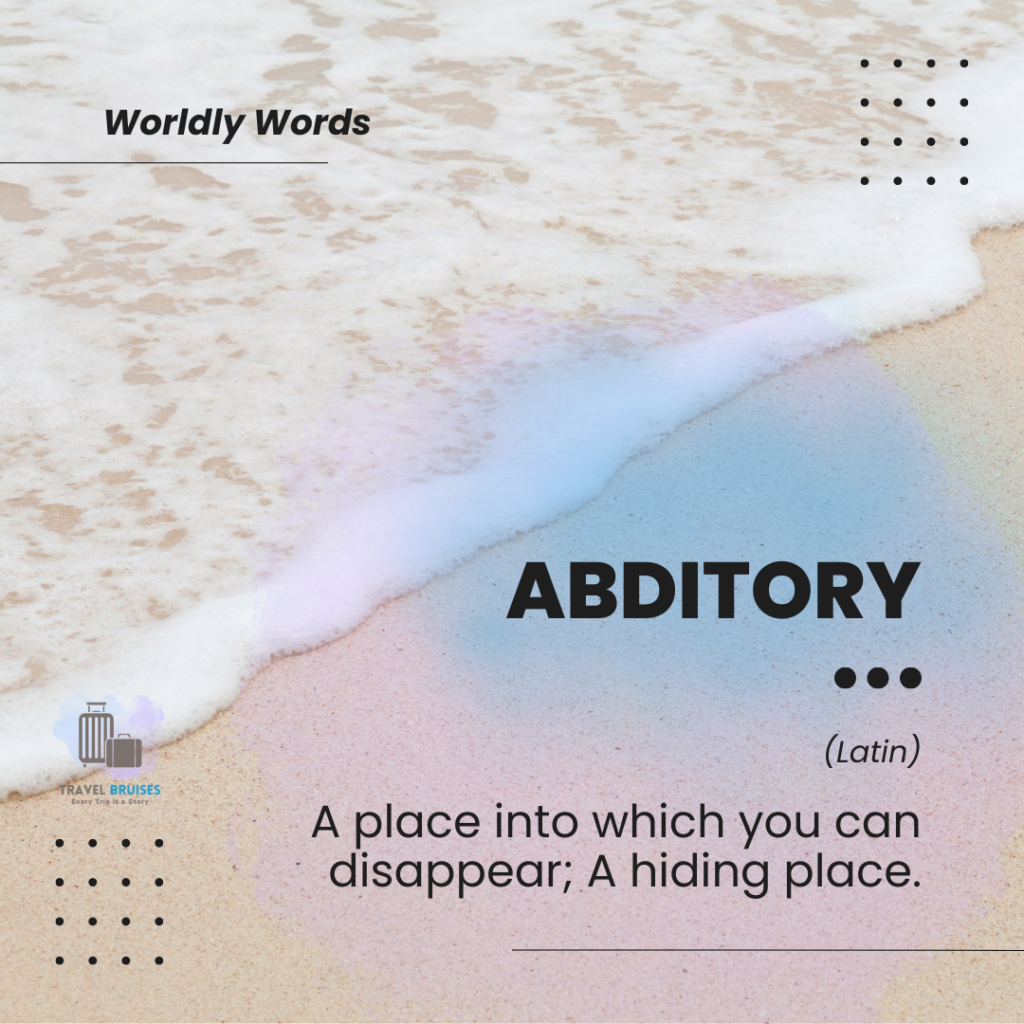
Abditory refers to a secret hiding place, often used for storing valuable or treasured items. The idea of having your own abditory can be quite inspiring, as it gives you a sense of privacy and security. Imagine creating your own hidden nook, filled with special mementos and memories from your travels. It’s a wonderful way to keep your experiences close to your heart.
Datsuzoku (Japanese)
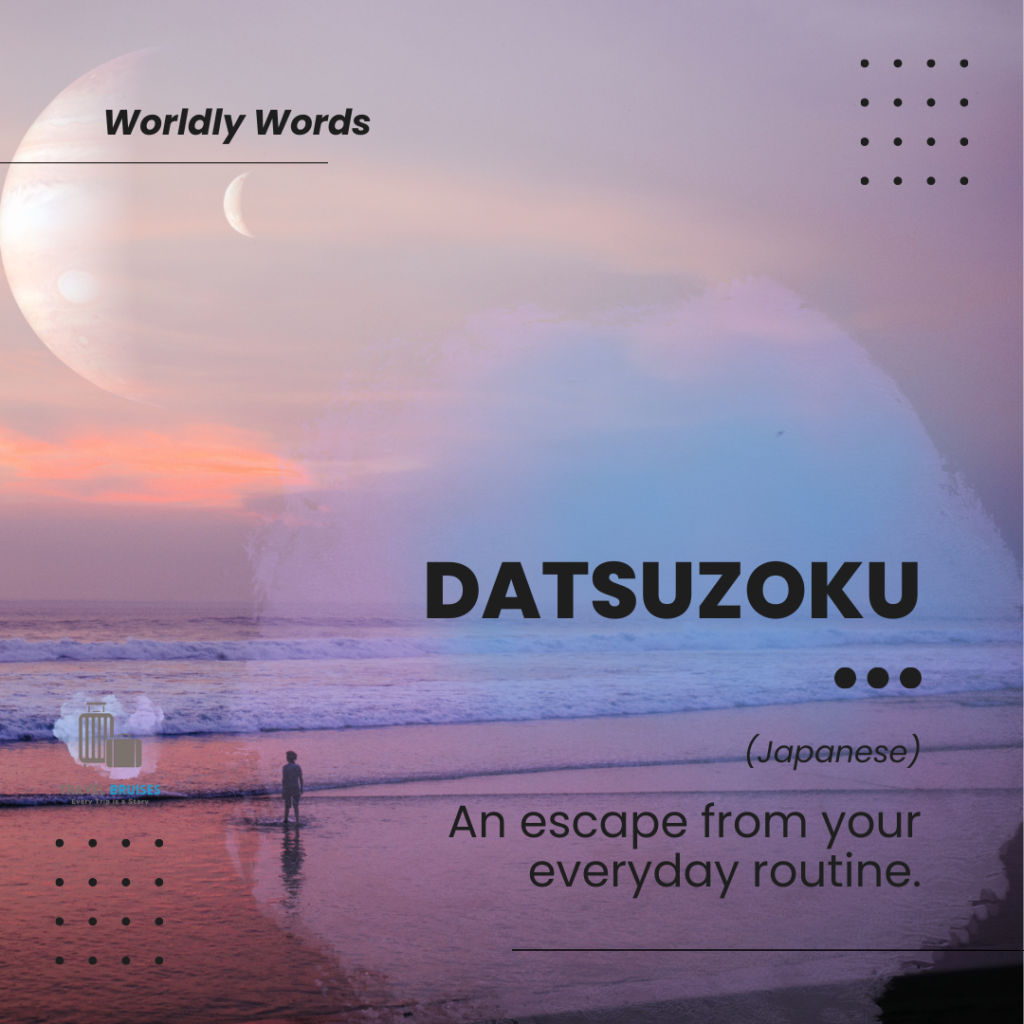
This fascinating Japanese word captures a concept that’s highly valued in their culture. It means to break away from the norm, the established order, and pursue something that brings you joy. It’s about exploring new paths and seeking out experiences that fill your heart with excitement. For travelers, Datsuzoku can be incredibly inspiring and a reminder to let go of expectations and embrace the unknown.
Fernweh (German)
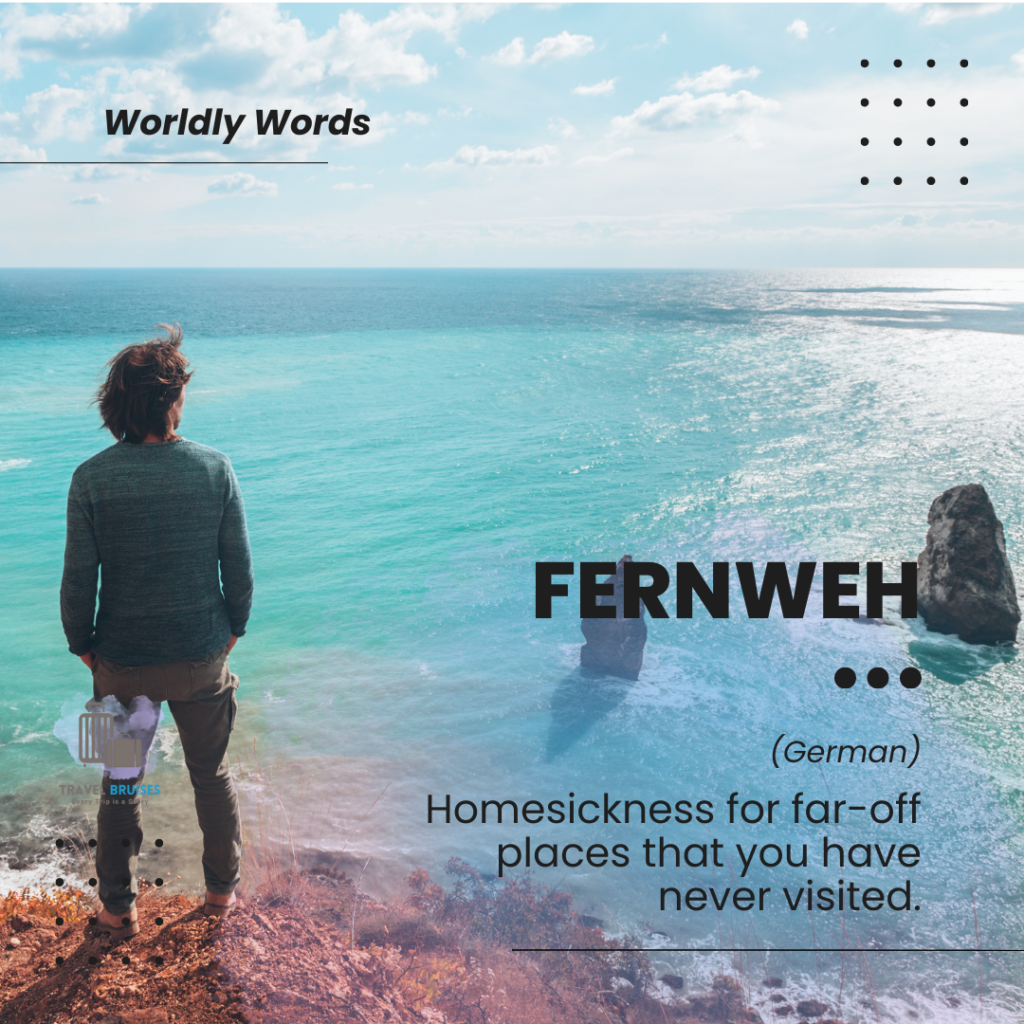
Are you feeling homesick for a place you have never been to? Maybe what you’re experiencing is Fernweh – a German word that translates to “wanderlust” or a strong desire to travel and explore new places. It’s that longing feeling you get when you see a photo of a beautiful landscape or hear someone talk about their travels. Fernweh is more than just an urge to wander, it’s a passion that drives you to experience all the beauty and wonder that the world has to offer.
Gemütlichkeit (German)

The German word is all about creating a cozy and comfortable atmosphere, often involving things like warm blankets, good food, and great company. It’s a feeling of relaxed contentment, of feeling at home while away from home. And isn’t that what travel is all about? Finding inspiration in new places, connecting with new people, and experiencing different cultures–all while feeling a sense of comfort and familiarity. Embrace the spirit of gemütlichkeit on your next adventure and see where it takes you.
Haneul (Korean)
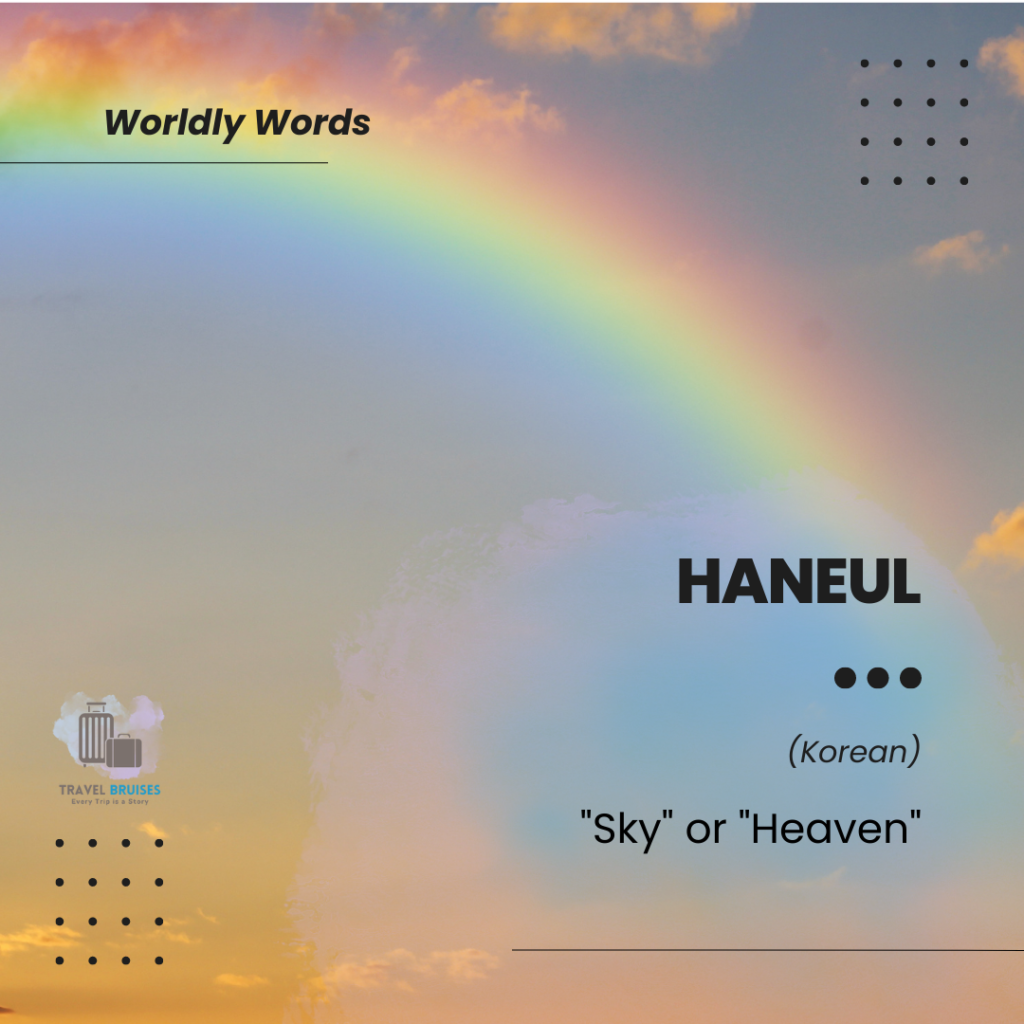
“Haneul” is a Korean word for “sky” or “heaven.” It is often used in Korean culture as a symbol of inspiration and hope. The vast and limitless nature of the sky inspires many to dream big and reach for the stars. In Korean literature and poetry, the word “Haneul” is often used to depict a sense of freedom and a connection to the divine.
Hanyauku (Namibian)
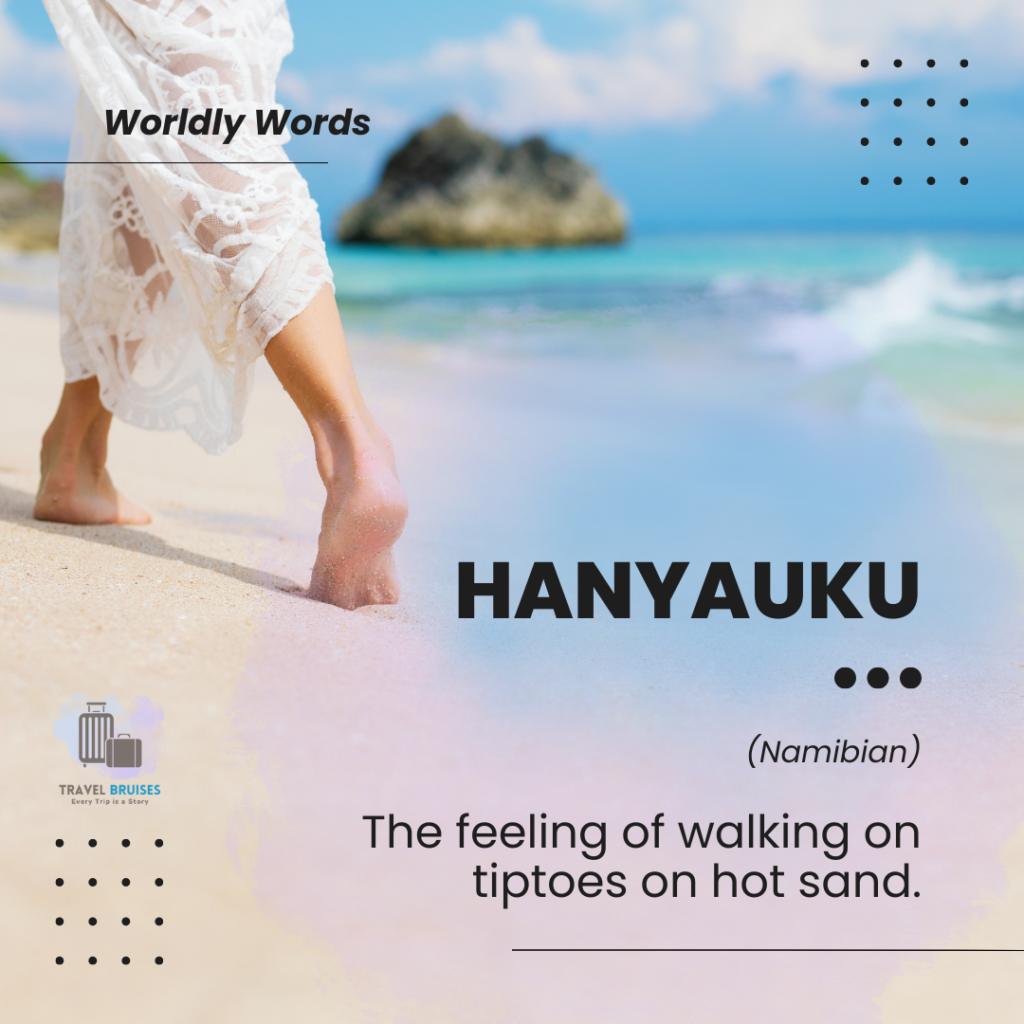
When it comes to travel, inspiration can come from the most unexpected sources. One such source is the word Hanyauku, which has a fascinating meaning when it comes to hot sand. In the Himba language of Namibia, Hanyauku refers to the art of walking on hot sand without showing any signs of discomfort. It’s an ancient practice that has been passed down through generations and is still used today. This incredible skill is a testament to the resilience and adaptability of the human body and serves as a source of inspiration for those looking to push their physical limits.
Hiraeth (Welsh)

While difficult to translate directly, hiraeth is often described as a longing or nostalgia for a place or time that may never have existed. It’s a complex emotion that speaks to our deepest desires to connect with the world around us and find meaning in our journeys. Whether you’re exploring new destinations or reminiscing on past adventures, hiraeth is the word that encapsulates all the beauty and mystery of travel in one succinct term.
Hygge (Danish)

Pronounced “hoo-gah”, it’s a term that describes the feeling of cozy contentment and warmth, often associated with a peaceful moment spent with loved ones. Although it’s difficult to translate directly into English, understanding what hygge means can inspire travel and a deeper appreciation for life’s simple pleasures. From curling up with a good book on a rainy day to sharing a meal with friends by candlelight, hygge encourages us to find comfort in the present moment and savor the joys of life.
Jayus (Indonesian)

This unusual word comes from Indonesian culture and refers to a joke that is so unfunny that everyone breaks out laughing. However, it’s often used to describe something that’s funny in an absurd way, which can inspire creativity and out-of-the-box thinking.
Kilig (Filipino)

“Kilig” is a Filipino term that describes the feeling of butterflies in your stomach, the thrill of excitement, or the happiness of being in love. It’s the natural high that one experiences when they feel inspired and touched by something or someone. Whether you’re traveling solo, with your partner, or with friends, kilig is a feeling that can positively impact your journey and give you those unforgettable moments.
Koi No Yokan (Japanese)
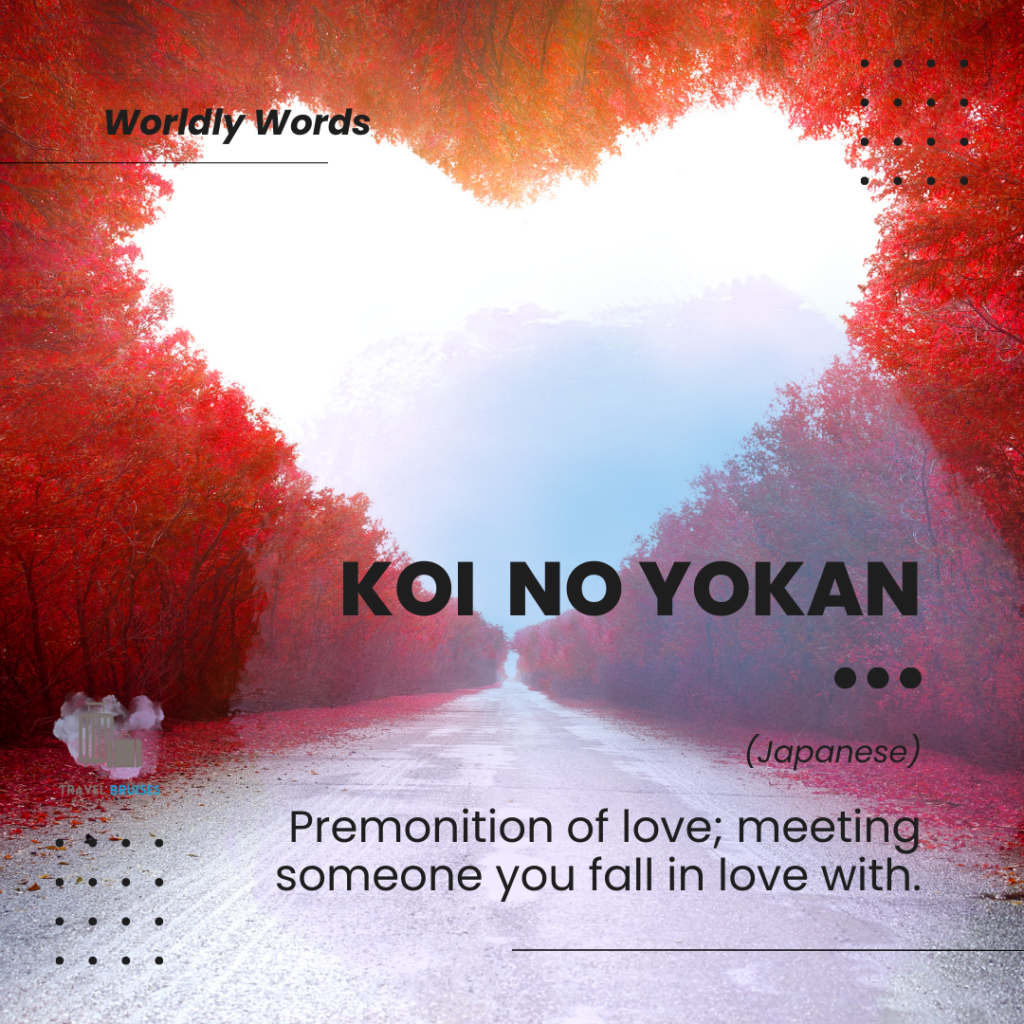
The Japanese term is often used to describe the feeling of knowing that you will soon fall in love with someone. However, it’s a phrase that goes beyond romantic love. It’s all about the feeling of intuition, the sense of knowing that something is about to happen. Koi No Yokan can apply to any situation, whether it’s a new job opportunity or a chance meeting with a stranger. The beauty of this concept lies in the anticipation and the mystery of what comes next. It’s a reminder that life is full of surprises, and we should embrace them with open arms.
Komorebi (Japanese)
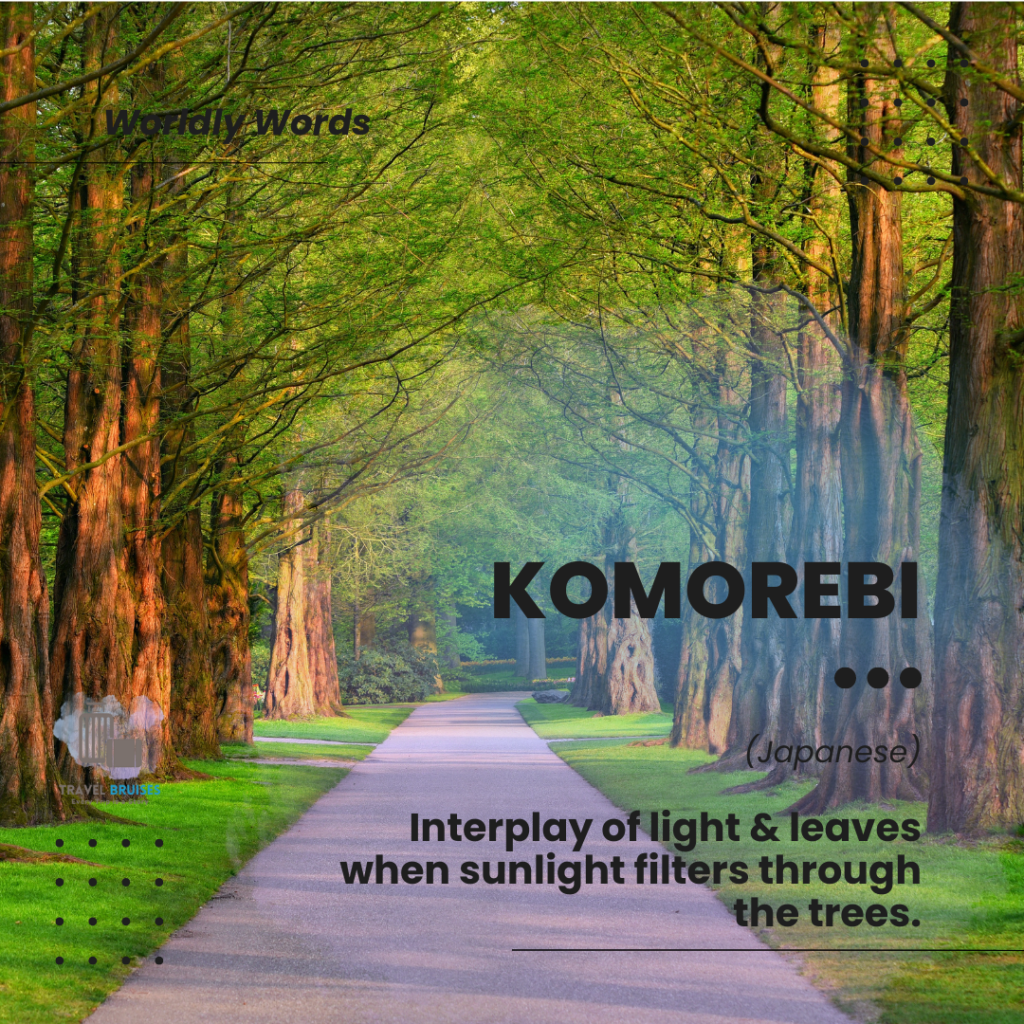
Have you ever strolled through a forest on a sunny day and noticed the way the sun’s rays filter through the leaves, creating a mesmerizing pattern on the ground? That dappled effect has a name: Komorebi. In Japanese, komorebi refers to the interplay between light and foliage and is often used to describe experiencing nature in a spiritual way.
La Dolce Vita (Italian)

If you’re planning a trip to Italy, you may have heard the phrase “La dolce vita” being thrown around. In essence, la dolce vita captures the idea of “the sweet life” – a lifestyle of leisure and pleasure. This phrase has become emblematic of Italian culture and the allure of travel to Italy.
Lebenskünstler (German)

In German, it loosely translates to “life artist,” someone who lives their life to the fullest and finds inspiration in the everyday. As a traveler, I have met many Lebenskünstlers along the way. They are the ones who embrace the unknown, take risks, and see beauty in the simplest things. They inspire me to live in the moment and approach life with a sense of curiosity and creativity.
Mamihlapinatapai (Yaghan)
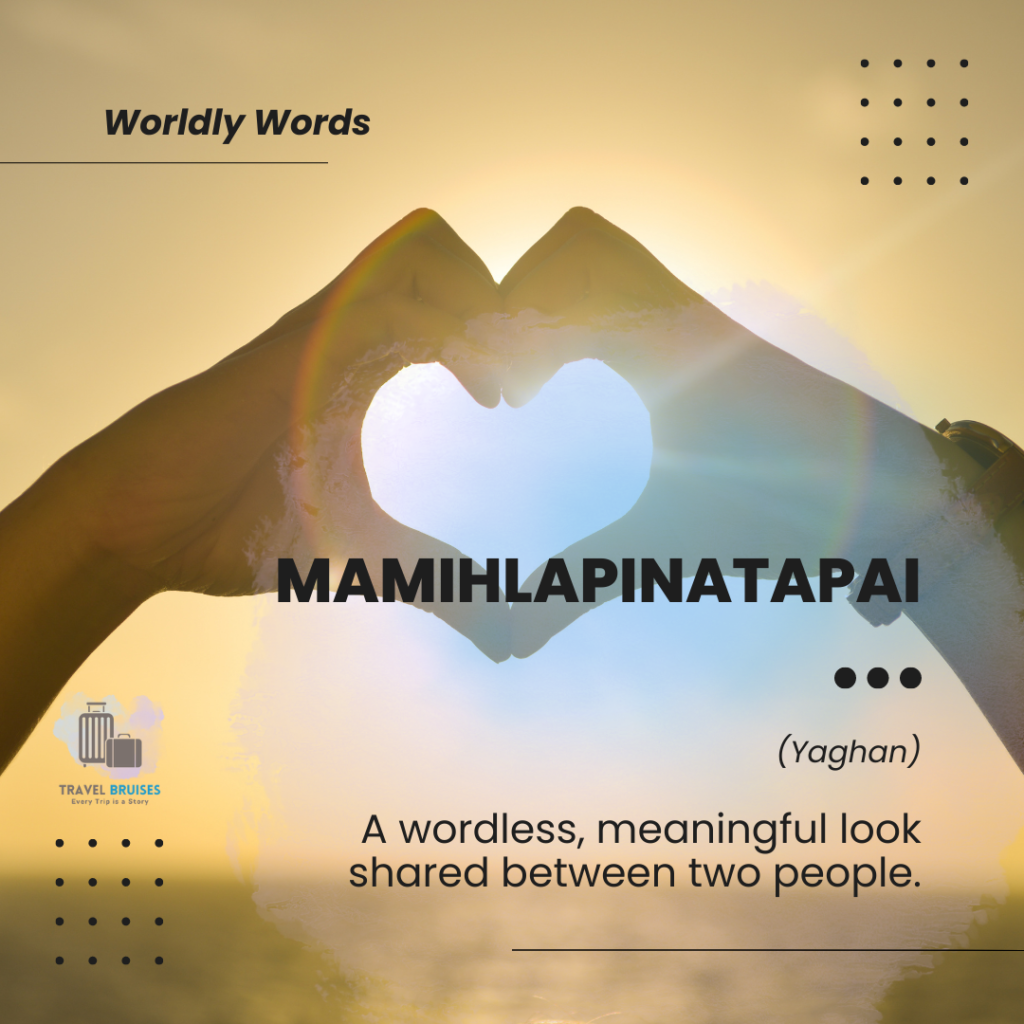
Hailing from the Yaghan language of Tierra del Fuego, this word is often cited as one of the most difficult concepts to translate into English. It refers to a meaningful, reflective, yet fleeting look between two people who both desire something but are hesitant to initiate it. While the literal definition may seem abstract, the concept can apply to all sorts of travel-related experiences: connecting with locals, exploring hidden corners of a new city, or simply taking a risk on an adventure.
Meraki (Greek)

Meraki is a beautiful Greek word that is often used to describe the intense passion and creativity that goes into creating something. It can be applied to anything, from cooking a delicious meal to painting a piece of art. This word is truly inspiring and can be used to encourage creativity and exploration in all aspects of life.
Pura Vida (Spanish, Costa Rican)

Translated literally, Pura Vida means “pure life.” However, it’s so much more than that. It’s a philosophy, a way of living, an attitude toward life. Pura Vida is all about enjoying the journey, taking things as they come, and appreciating the little things. It’s an inspiration to live life to the fullest, with a sense of gratitude and joy.
Resfeber (Swedish)

A Swedish word that describes the mix of emotions you feel when embarking on a journey, whether it’s adventure, anxiety, curiosity, or excitement. Essentially, it’s the feeling of butterflies in your stomach and a racing heart as you’re about to board a plane, train, or even a car for a road trip. Resfeber is a reminder that travel is not just about the destination, but the journey that takes you there, and it’s something that can provide inspiration to embrace the unknown and accept that the adventure of travel comes with a mix of emotions.
Saudade (Portuguese)

It’s a Portuguese word that doesn’t have a literal translation in English, but experienced travelers know what it means. It’s a feeling of nostalgia and longing for a place or person that’s currently far away. Even if you’ve never heard the word before, there’s a good chance you’ve felt saudade during your travels. It’s a bittersweet emotion that can inspire us to keep exploring the world, to stay connected with the people we meet, and cherish the memories we create.
Sisu (Finnish)
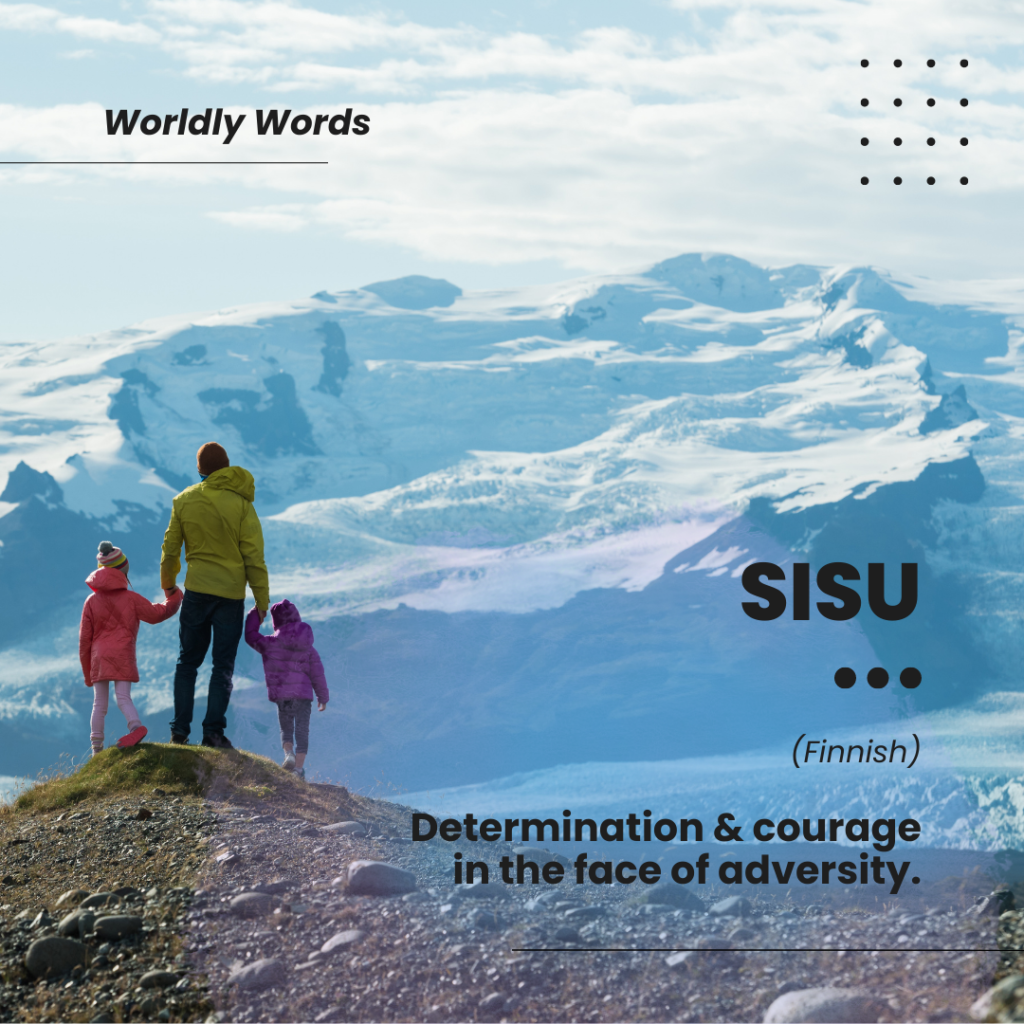
Sisu is an untranslatable Finnish word that describes a particular mindset. It conveys the idea of inner strength, tenacity, resilience, and perseverance in the face of adversity. It is a quality that Finns hold dear and derive inspiration from when facing tough challenges. Sisu can be found in the way they approach work, sports, relationships, and life in general.
Smultronställe (Swedish)

Smultronställe translates to “wild strawberry patch,” but it holds a deeper meaning for Swedes. It refers to a special place in nature that is known only to a few, a spot where one can escape the hustle and bustle of daily life and find inner peace. Smultronställe can inspire anyone to explore and uncover their own version of hidden havens around the world, whether it’s a deserted beach or a hiking trail. Don’t let the limits of technology stunt your travel dreams; let “smultronställe” be your guide to finding the next adventure that awaits.
Sobremesa (Spanish)

This phrase encapsulates the cultural tradition of post-meal conversation and relaxation. Sobremesa translates directly to “over table” and refers to the time spent lingering over food and drink while enjoying the company of friends and family. This concept is so important in Spanish culture that it has become a cornerstone of their way of life.
Tsundoku (Japanese)
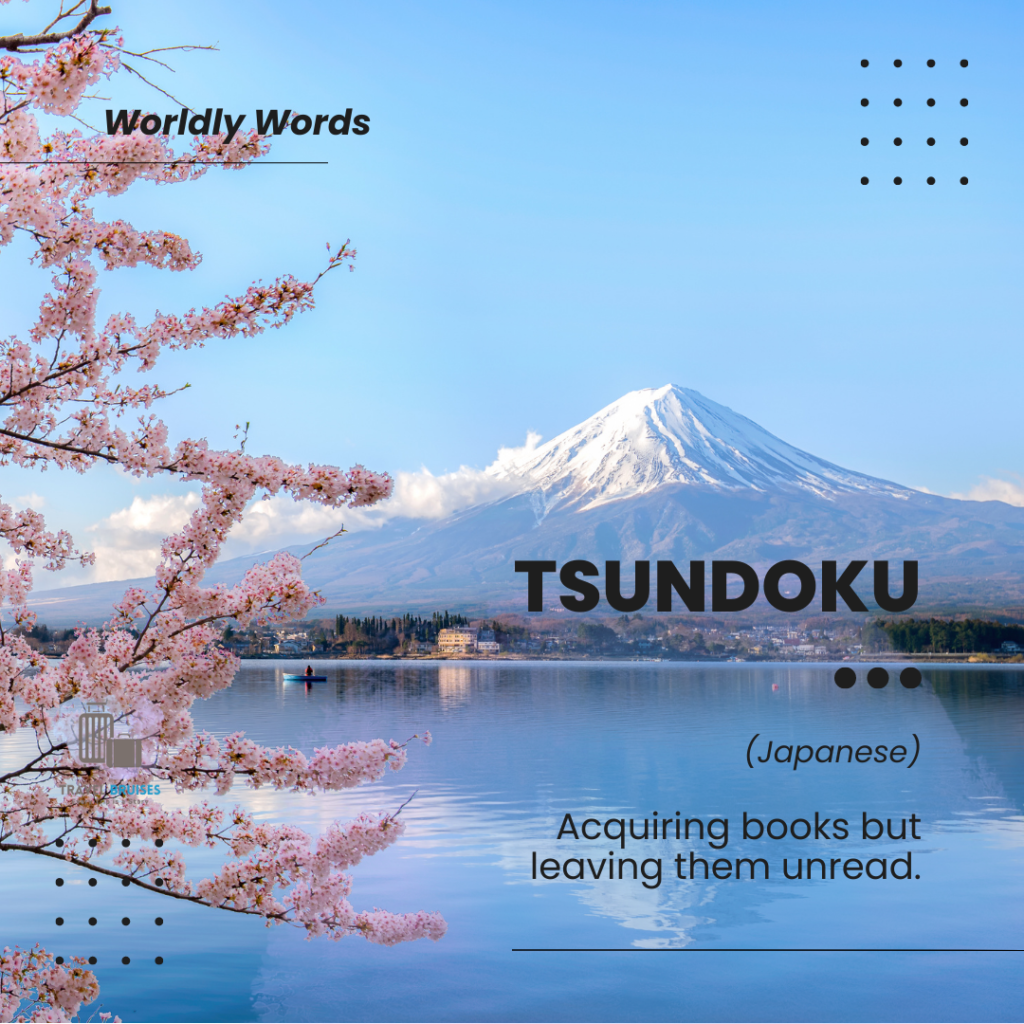
Tsundoku refers to the habit of acquiring too many books, but not having enough time to read them all. It’s a word that many of us can relate to, especially those who love to travel and seek inspiration through literature. Despite being a seemingly innocuous word, Tsundoku perfectly captures that feeling of excitement when we discover a new book we simply can’t resist, even if we still have a pile of unread books at home.
Ubuntu (Zulu)

This mystical, ancient word is a cornerstone of the country’s cultural identity and is held in high esteem by all who live here. At its core, ubuntu represents compassion, connection, and a sense of community spirit. It’s an idea that inspires people to look out for each other, and to recognize that every individual is an integral part of something much larger.
Vacilando (Spanish)
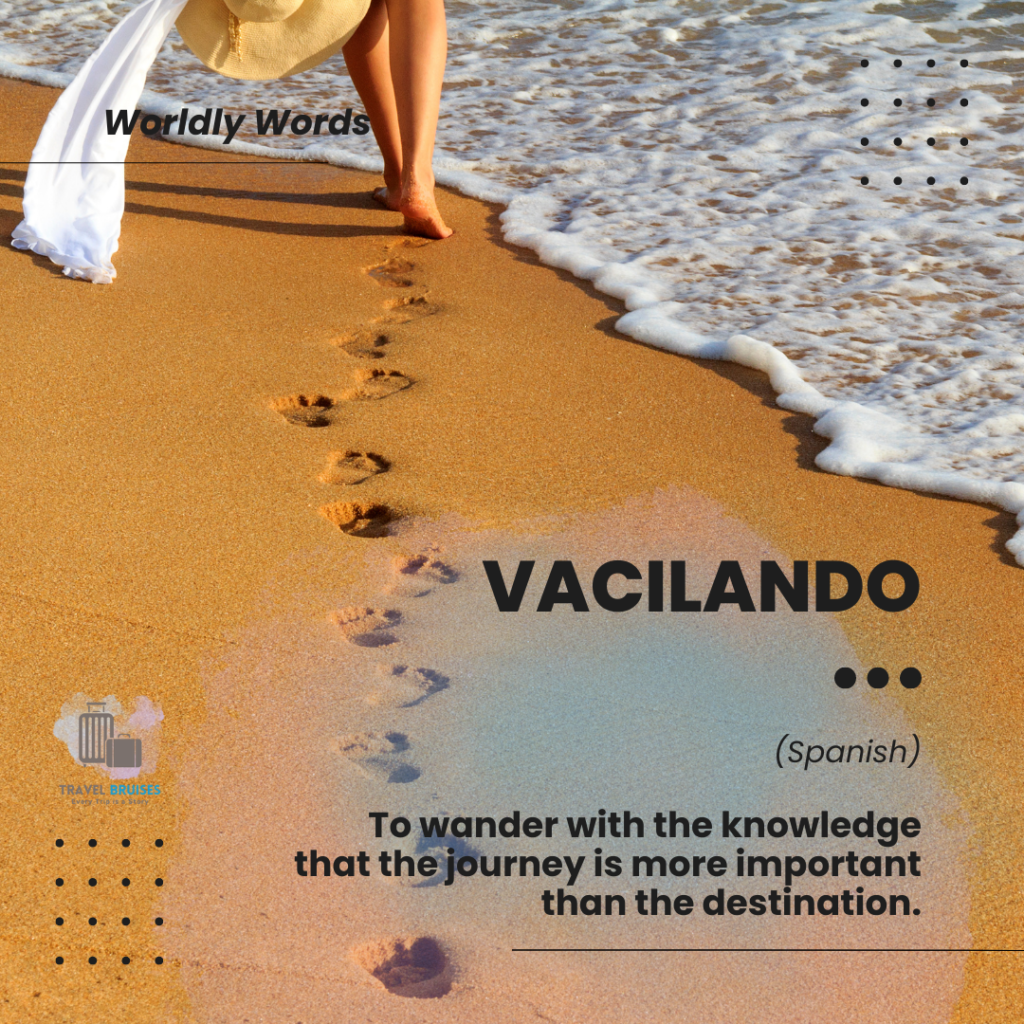
The Spanish term, often associated with writer John Steinbeck, encompasses the idea of wandering with a sense of purpose. It’s about exploring a place, whether new or familiar, with open eyes and an open mind. It’s about embracing uncertainty, taking detours, and discovering unexpected treasures. Vacilando invites us to be present in the moment and to let go of preconceived notions.
Wabi-sabi (Japanese)
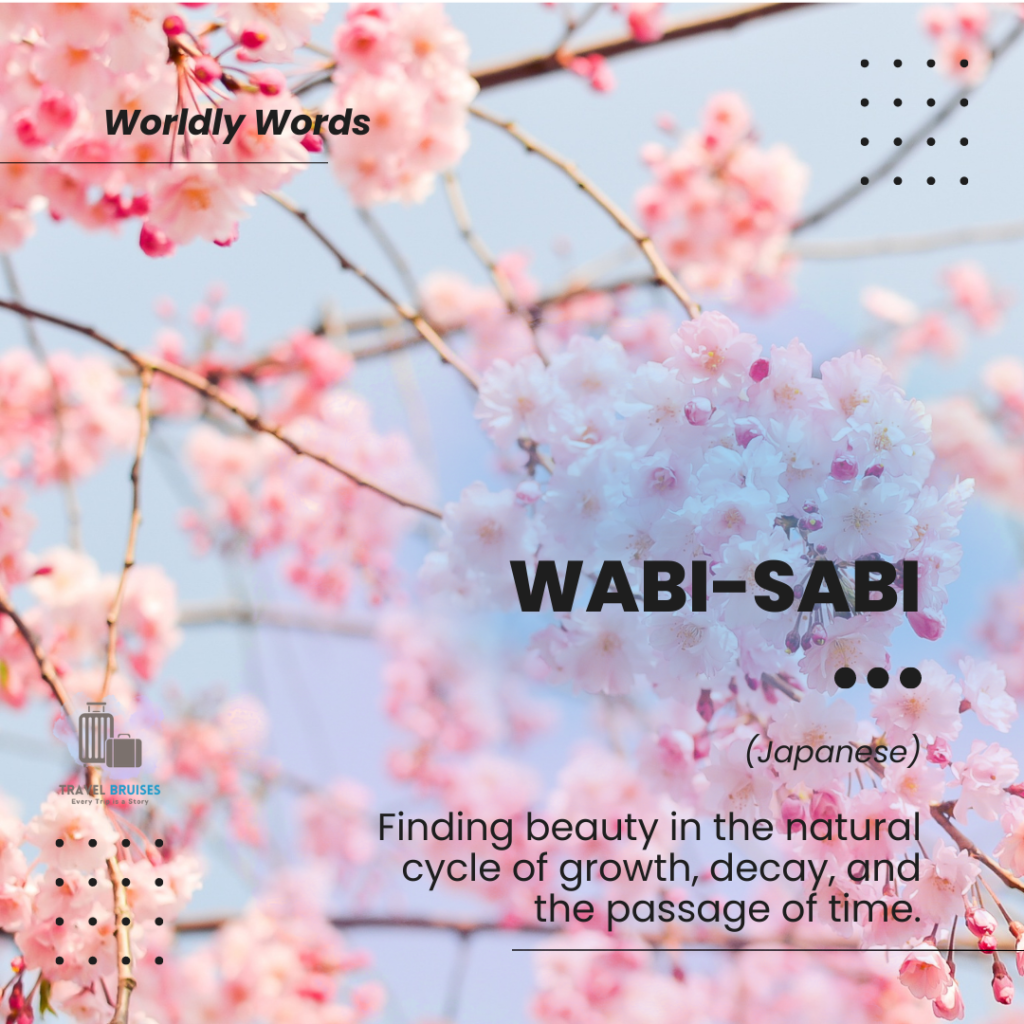
Originating from Japanese aesthetics, wabi-sabi is an idea that embraces the beauty of imperfection, simplicity, and nature. It celebrates the flaws and unique characteristics of objects and living things, rather than striving for perfection and uniformity. By traveling to Japan and experiencing the wabi-sabi lifestyle firsthand, you may find a new source of inspiration that encourages you to find beauty in the ordinary and appreciate the impermanence of life.
Schwellenangst (German)

This a German term that refers to the fear of crossing a threshold- a perfect word to describe that overwhelming feeling of apprehension before taking a leap of faith into something new. For those who love to travel, Schwellenangst can be a common experience, particularly when visiting foreign countries with different customs, languages, and cultures. But through facing our fears, we often find the most inspiring experiences and create unforgettable memories.
Worldwide Travel Words
Learning words from other cultures is a great way to bring new perspectives to our work and inspire creativity. By reading about different cultural concepts, we can gain new ideas for approaching familiar problems or finding innovative solutions. It’s also important that we remember the context in which these travel words are used, as their real meanings may differ from those of the language they originated in.
If done respectfully, learning and understanding travel words from various cultures can become a beautiful form of collaboration that can unite us all in our quest for knowledge and self-improvement. As always, we must strive to honor each culture’s unique perspective and traditions without causing offense. To ensure respect and understanding of different cultures within our conversations, the best place to start than by looking at each other’s language.

54 Travel Apps You Absolutely Need Before Your Next Trip
With smartphones and apps at our fingertips, there are so many ways to make traveling easier. Whether you are planning a dream vacation or simply looking for some essential travel hacks, having the right apps can be invaluable.
Find out the best 54 Travel Apps You Absolutely Need Before Your Next Trip !
Travel Word FAQs
How can i learn new travel words.
Reading about different cultures is a great way to expand your understanding and knowledge of their language and customs. You can also look for language-learning resources online, such as apps or podcasts, to help you get started on learning the basics of a new language. Additionally, if you’re traveling, you could try practicing the language of the country you’re visiting with a local.
Are there any tips for remembering travel words?
One way to help remember new vocabulary is to write down or create flashcards of important terms and concepts so that you can easily refer back to them. Additionally, listening to native speakers of the language is an effective way to learn pronunciation and get a feel for the language. Finally, incorporating travel words into daily conversations or activities is another great way to remember them.
Are there any other ways I can use travel words?
Travel words can be used in many different ways! You could incorporate them into your conversations with friends or co-workers, use them in writing, or even create art inspired by different cultural concepts. They can also be used to help you understand and appreciate the cultures of other countries while traveling. Finally, learning new travel words is a great way to challenge yourself and continually expand your global knowledge base.
Should I worry about cultural appropriation when using travel words?
It is important to be mindful and respectful of different cultures, traditions, and languages when using travel words. Research the deeper meanings behind the words you learn, as some have multiple interpretations or connotations depending on the context. Finally, it is always important to ask for permission before using any words from another culture in order to avoid any potential cultural appropriation or offense.
You May Also Like

Unlocking the Charm of Portugal: Stunning 10-Day Itinerary

10 Sensational Cenotes in Mexico | Travelers Guide

Cultural Immersion Travel: Experience the World Like a Local
10 Travel Words You Should Know in Other Languages
Published by

Have you ever come across a word in your own language that explains something so perfectly? Some languages have words that cannot be translated into other languages directly. Since we’re all travel addicts over here, we’re going to look at travel words in different languages that should definitely be a part of your vocab! ✈️
Learn all the travel words!
- Flâneur (French)
- Vacilando (Spanish)
Hygge (Danish)
- Eleutheromania (Greek)
Smultroställe (Swedish)
- Peregrinate (Latin)
- Sonder (Unknown Origin)
- Sehnsucht (German)
Numinous (Latin)
Fernweh (german), flâneur ( french) .
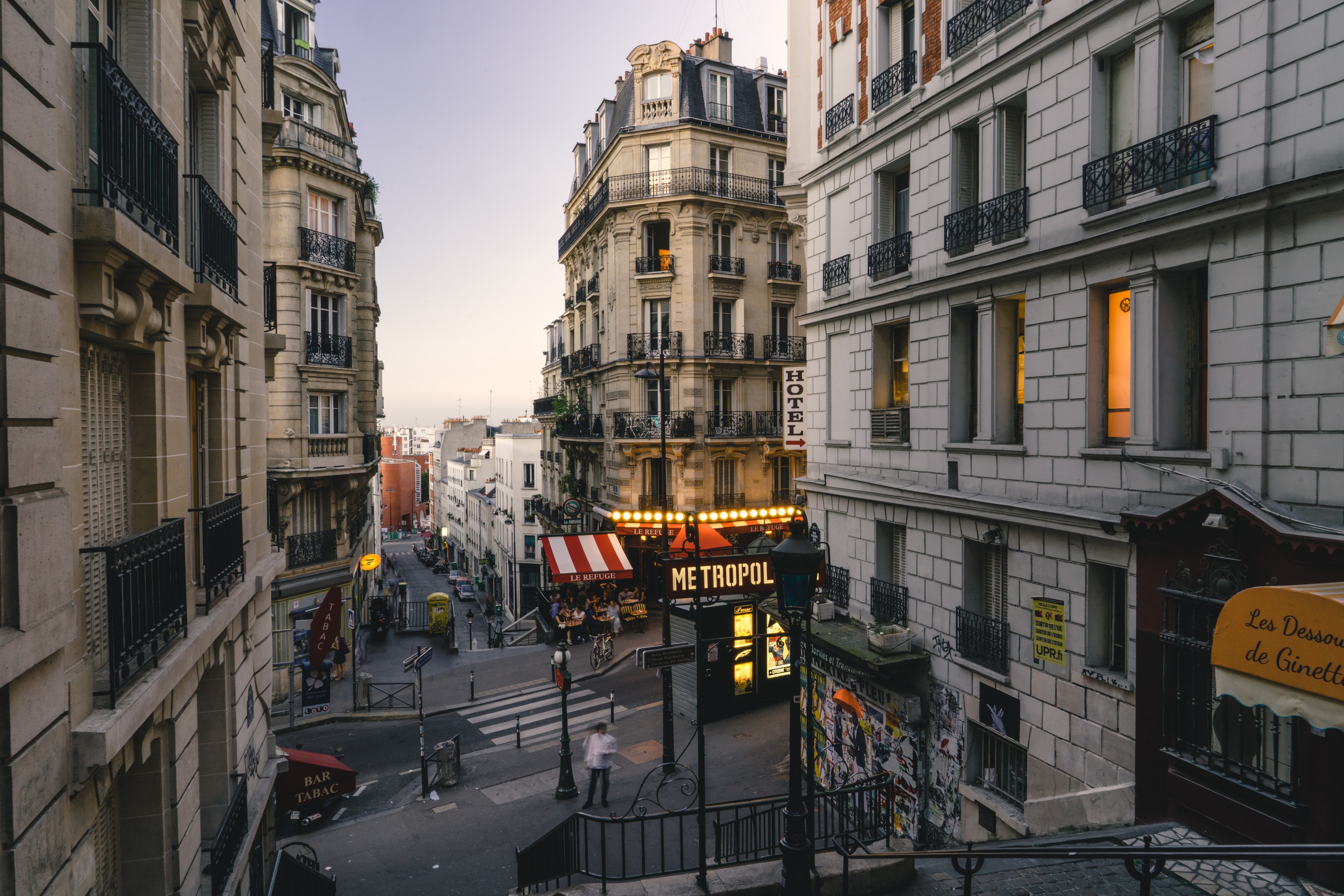
French is a beautiful language, and it has a lot of travel words. One of them is Flâneur, a perfect word for all of you daydreamers. It means an aimless stroller who observes and enjoys a slow wandering pace. Sometimes the best thing to do in new places is to practice a little flâneur . You never know where you might end up!
Vacilando (Spanish)

Ever heard of the saying, ‘it’s the journey, not the destination?’ This travel word describes all that perfectly in one word. Vacilando is a Spanish word meaning wandering around and taking the experience of travel as being more important than actually reaching your destination. Vacilando around the world with your newly found JoinMyTrip !
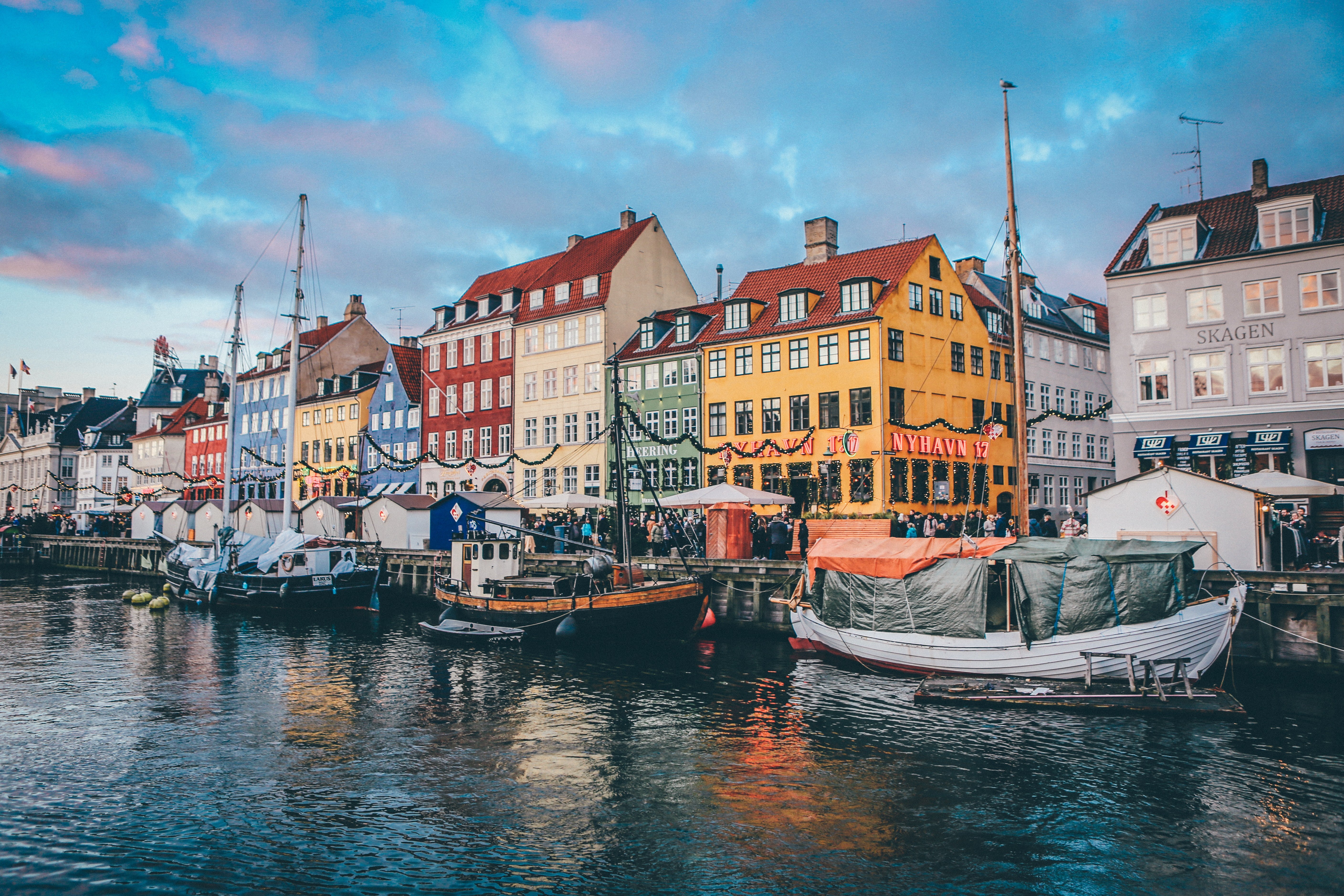
The Danish travel word Hygge has become a quite widely used travel word in recent days. It’s one that we can all learn from when it comes to enjoying the little things in life. Furthermore, Hygge is all about enjoying simple pleasures with friends, like random travel moments during your trip that leave you with all the good vibes.
Eleutheromania (Greek)

How does travel make you feel? What about if you can’t travel for some time? In Greek , Eleutheromania means an irresistible desire for freedom. In other words, it’s like how we’ve felt after not traveling for a long time. Start your first adventure now to cure your Eleutheromania.

What’s your go-to place when you want to escape from this life? Many of us have a favorite travel destination that never gets old. The Swedish Smultroställe describes a special place that frees us from stress. So, where is your Smultroställe ? Tell us in the comments!
Peregrinate (Latin)

Many of our travel words have origins in Latin, and we especially like this one. Peregrinate means ‘to travel from place to place.’ What a liberating feeling when there’s no end in sight to your adventure! So, where is your next plan for traveling?
Sonder (Unknown Origin)

The term sonder describes the odd feeling of connection to people which we have, even if we do not know them. It is the realization that everyone who surrounds you is ultimately living a life that is just as complicated as your own. So, you’re not alone! Sonder is also a perfect reason for you to start traveling with friends you haven’t met yet! 😉
Sehnsucht (German)

Germans are geniuses at creating words that describe so many feelings at once. The following travel word is Sehnsucht. Sehnsucht refers to the yearning and nostalgia we experience for travels in the past and those in the future! What trip do you have planned next?

Numinous is the feeling you get when you experience something truly wonderful before your eyes but also scary- like a supernatural experience. It’s described as being overwhelmed by awe at something in front of your eyes- like a beautiful mountain landscape. ⛰️

We saved the best for last! Fernweh is one of many German travel words that describes the ache we feel about going to a distant place, and it is a feeling that is even stronger than wanderlust. The literal translation is ‘distance-sickness.’
Now you’ve expanded your travel words to describe all the feelings you get while dreaming of travel or traveling. Time to get rid of your fernweh and fl â neur the streets of Paris. 😉 Start exploring upcoming trips with like-minded TravelMates at JoinMyTrip !
- Search Please fill out this field.
- Manage Your Subscription
- Give a Gift Subscription
- Newsletters
- Sweepstakes
- Travel Tips
How to Say 'Hello' in 100 Different Languages
Gearing up for a trip? Here's how to say "hello" in different languages spoken around the world.
:max_bytes(150000):strip_icc():format(webp)/Stacey-Leasca-2000-631fabdcfe624115bea0ce8e25fdec96.jpg)
Tony Anderson/Getty Images
The world is becoming a smaller place. Thanks to new technology and better modes of travel, we’re all able to connect faster than ever before. And that’s why learning a second language may be a great idea, especially for jet setters.
“Besides the obvious convenience of being able to communicate your basic traveling needs, learning another language could be the difference between a fun vacation and a life-changing experience,” Esteban Touma, a Babbel Live Teacher and language learning expert, shares with Travel + Leisure . “Sure, you can visit some tourist spots and see the highlights, but the best way to really connect with others and experience a different culture is the language. Even maintaining basic conversations will make your host country a more welcoming place.”
And if you’re an adult who’s never learned a second language, Touma says that shouldn’t stop you from trying.
“It takes effort and patience, but in general, I think the reason why people think it’s hard is because it’s such a different learning experience than anything else,” Touma says. “And as adults, it’s harder for us to keep an open mind. It’s not like learning chemistry or the history of the place you’re visiting, but rather, it’s like learning how to play tennis. You can study the rules, you can practice your serves, but the best way to learn it is to go out there and swing that racket, even if at first you’ll just lob the ball and miss the court. Just try to have fun.”
Don’t have time to learn an entire language before your trip? That’s OK. Just make sure to master this one word: Hello.
“It’s certainly the first thing you should learn,” Touma shares. “Just approaching someone and having this, the most basic of interactions, will open you up to a new reality.”
Here are 100 ways to say hello in different languages, translated by Google Translate and checked in part by our friends at Babbel , so you’re ready for wherever your travels take you next.
Related: The Best Language Learning Apps to Download Before Your Next Trip
Related Articles

203 Most Beautiful Untranslatable Words [The Ultimate List: A-Z]
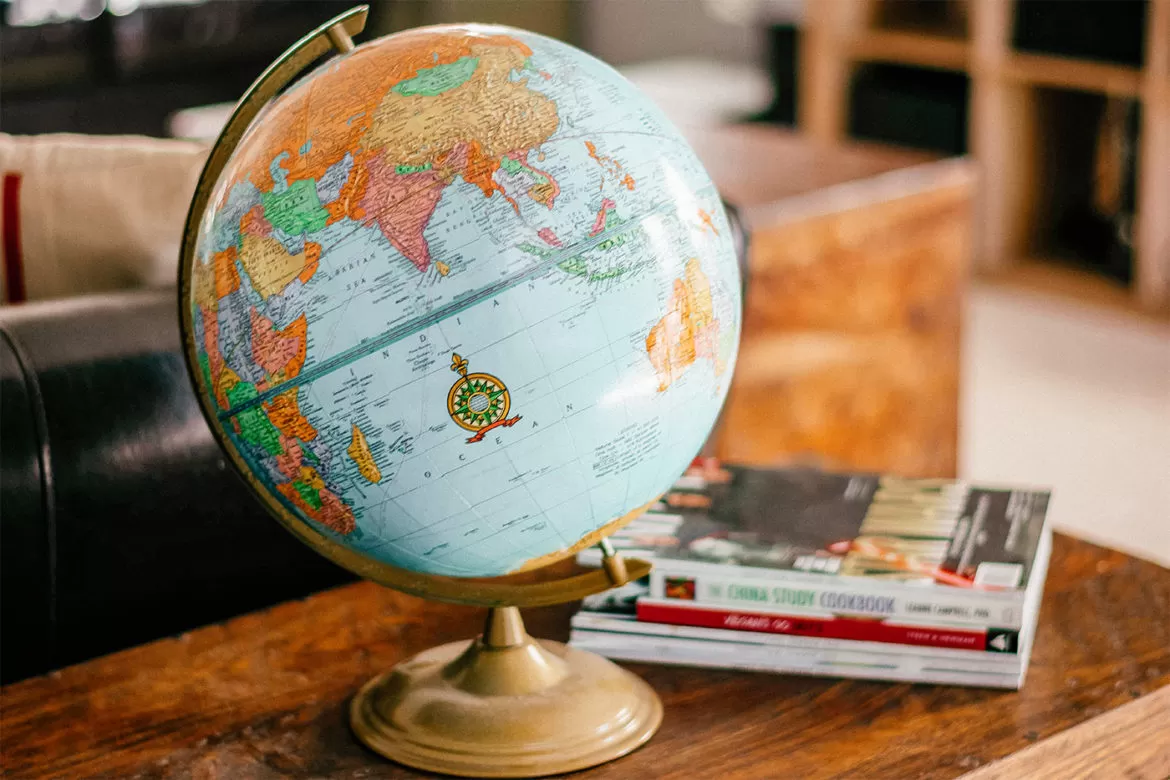
From Afrikaans to Zulu, here are 203 most beautiful untranslatable words in other languages from around the world that should exist in English.
If you’ve ever tried to learn a language , then you’ll know that translating is not always an easy task. There are over 7,000 languages in the world and just as many words and ideas that get ‘lost in translation’ due to differences in grammar and semantics, or even linguistic complications. When a language fails to convey the essence of a word during translation, the word is considered to be ‘untranslatable.’
There are many terms that drip with feeling and emotion that are simply untranslatable into English. By taking a closer look at some of the most beautiful untranslatable words from around the world, they can give us a glimpse into different cultures and belief systems that help us to understand the people who speak these marvellous languages.
English is no stranger to borrowing words from other languages and even inventing new ones like ‘ hangry ‘, a combination of anger and hunger because you need something to eat asap. Then there is ‘ nomophobia ‘, an irrational fear or sense of panic felt when you’ve lost your phone or are unable to use it. Even English playwright William Shakespeare invented plenty of words too such as ‘ faint-hearted ‘ and ‘ tongue-tied ‘. These new words have entered English dictionaries at a fast pace, keeping up with the diversity of the English-speaking world.
In spite of this, the English language can’t explain everything so succinctly, and yet there are many other languages that have, in just one word. This comprehensive list looks at some of the most beautiful words in different languages that are simply untranslatable into English. Many of which we should definitely borrow.
From Afrikaans to Zulu, here are 203 of the most beautiful untranslatable words from other languages.
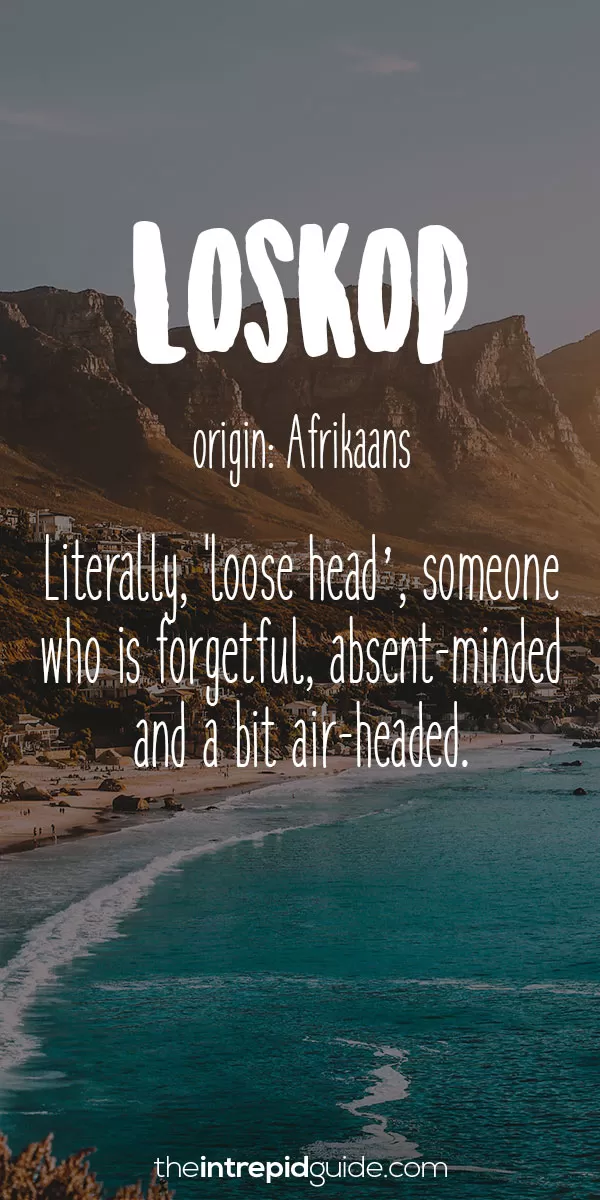
Learn Afrikaans for travel! Get my free Afrikaans travel phrase guide here .
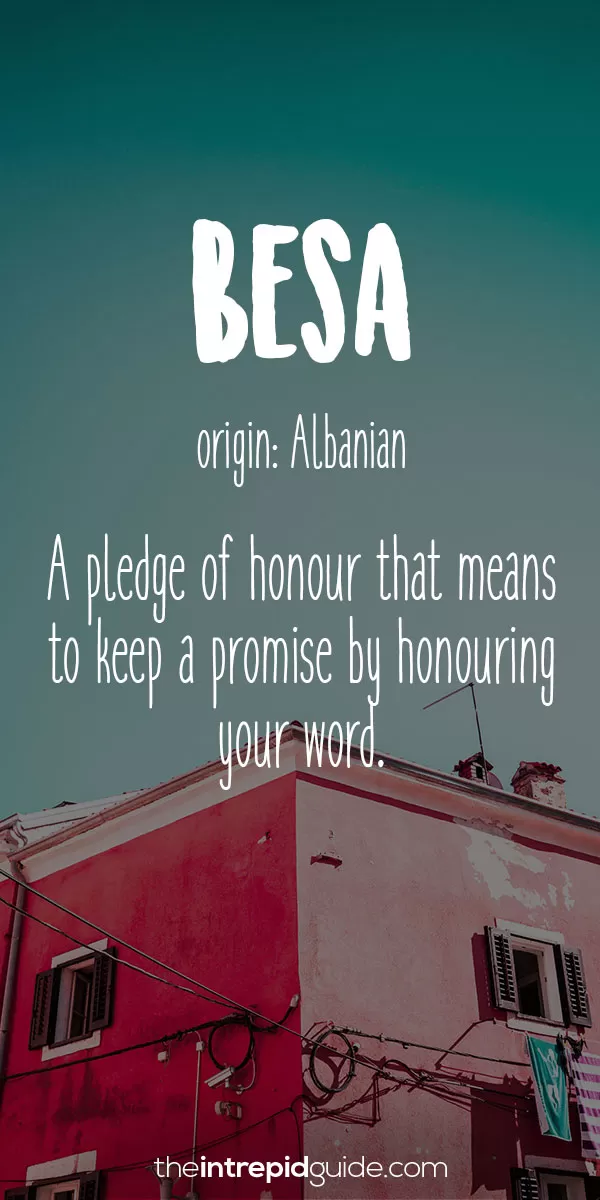
Taarradhin (تراض) – Taarradhin is the act of coming to a happy compromise where everyone wins. It’s a way of reconciling without anyone losing face.
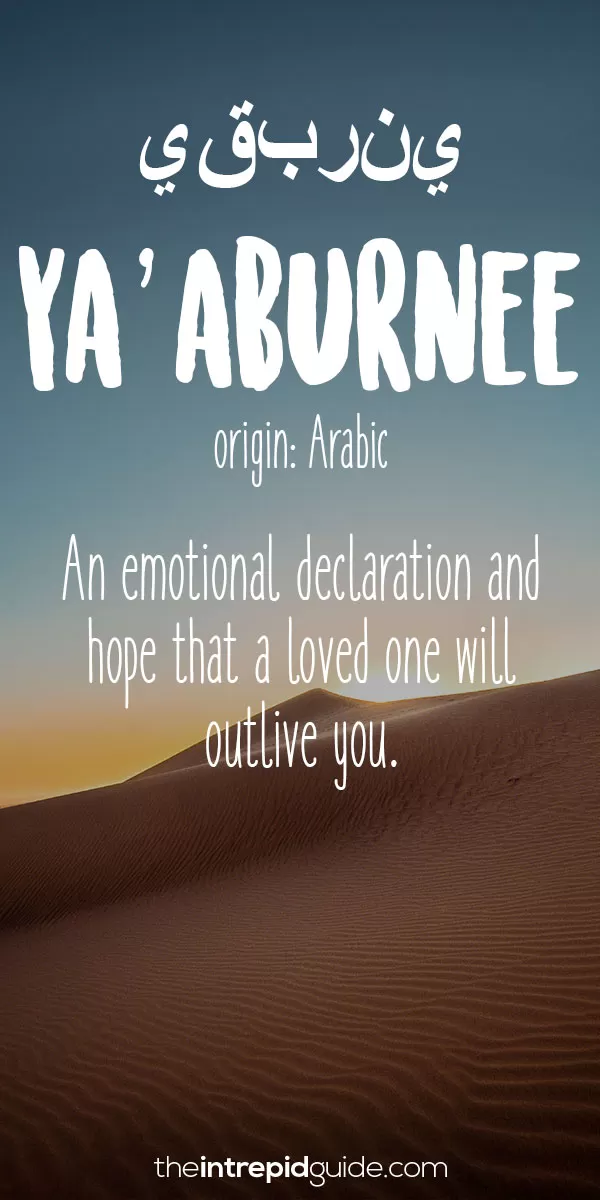
Learn Arabic for travel! Get my free Arabic travel phrase guide here .
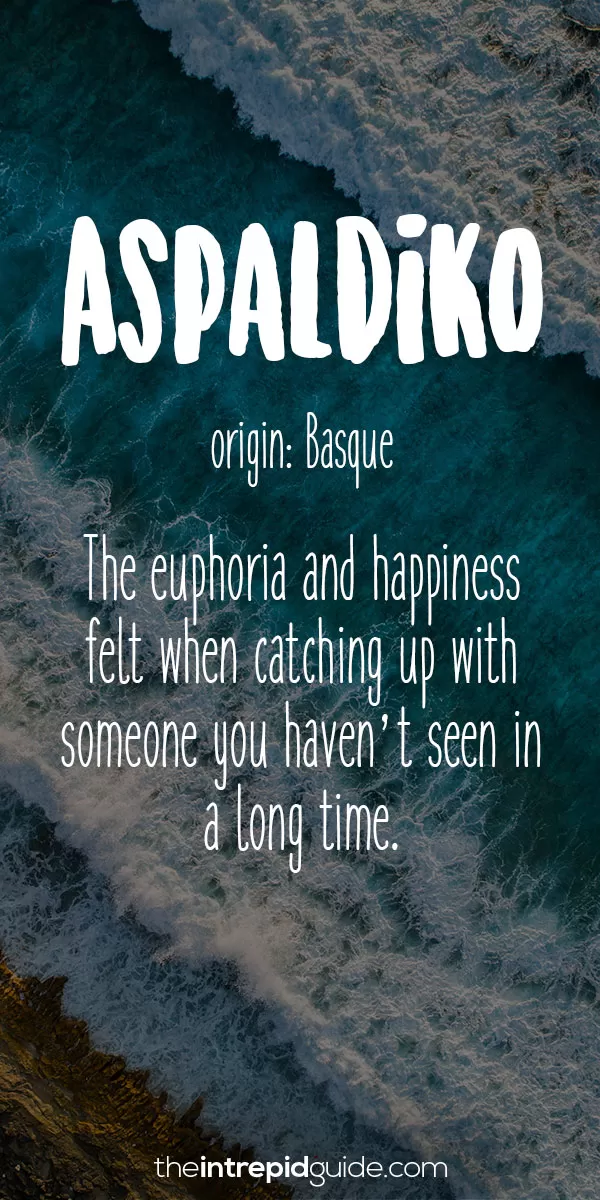
Learn Basque for travel! Get my free Basque travel phrase guide here .
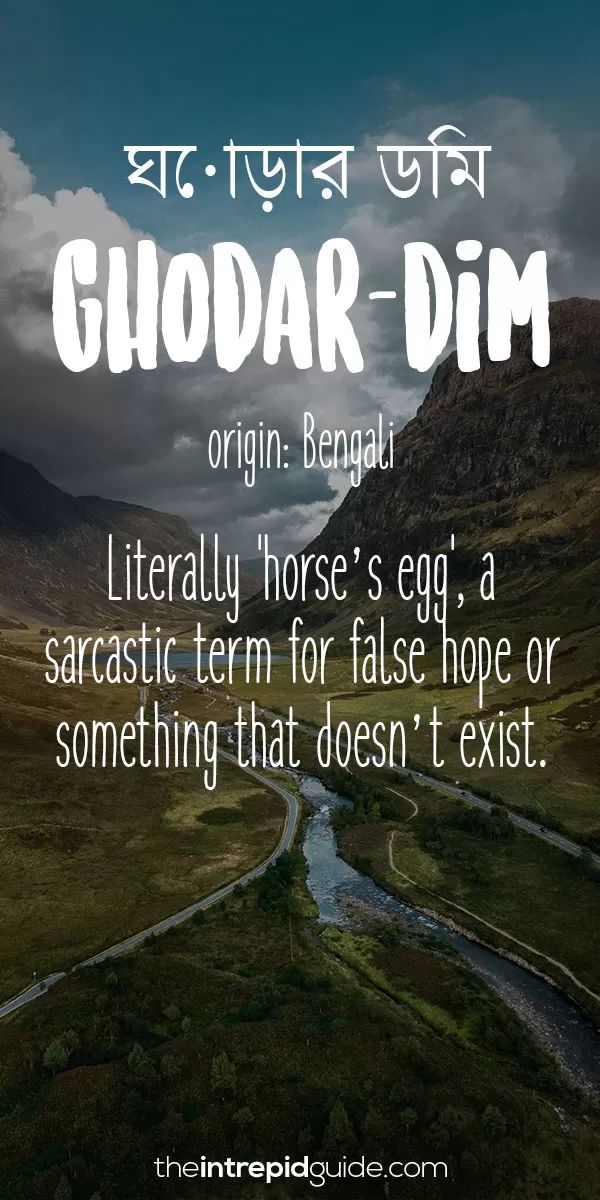
Bulgarian
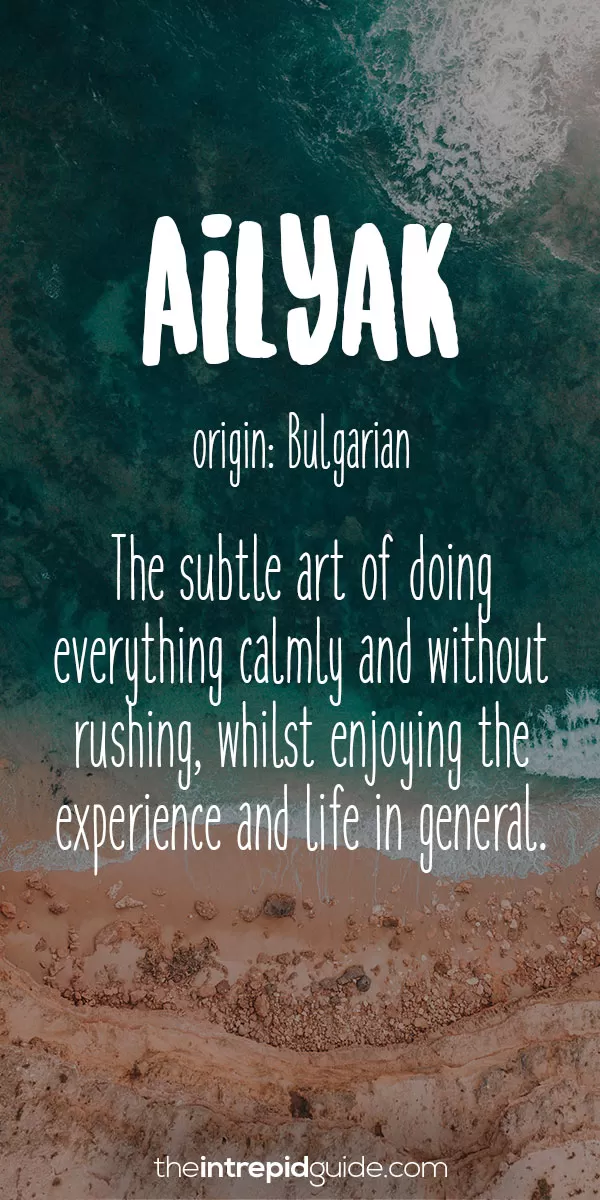
Learn Bulgarian for travel! Get my free Bulgarian travel phrase guide here .
Chinese (Mandarin)
Guanxi (关系) – Pronounced [gwan-shee], guanxi is often translated as ‘connections’, ‘relationships’ or ‘networks’ and refers to having a strong personal relationship with someone which involves moral obligations and exchanging favours. This is one of the essential ways of getting things done in traditional Chinese society. To build up good guanxi , you do things for people such as give them gifts, take them to dinner, or other favours. If you need to call in a favour then you ‘use up’ your guanxi .
Once a favour is made, an unspoken obligation exists. Because of this, people often try to refuse gifts, because, sooner or later, they may have to repay the debt. However, the bond of guanxi rarely ends, because once the relationship exists, it sets up an endless loop that can last a lifetime.
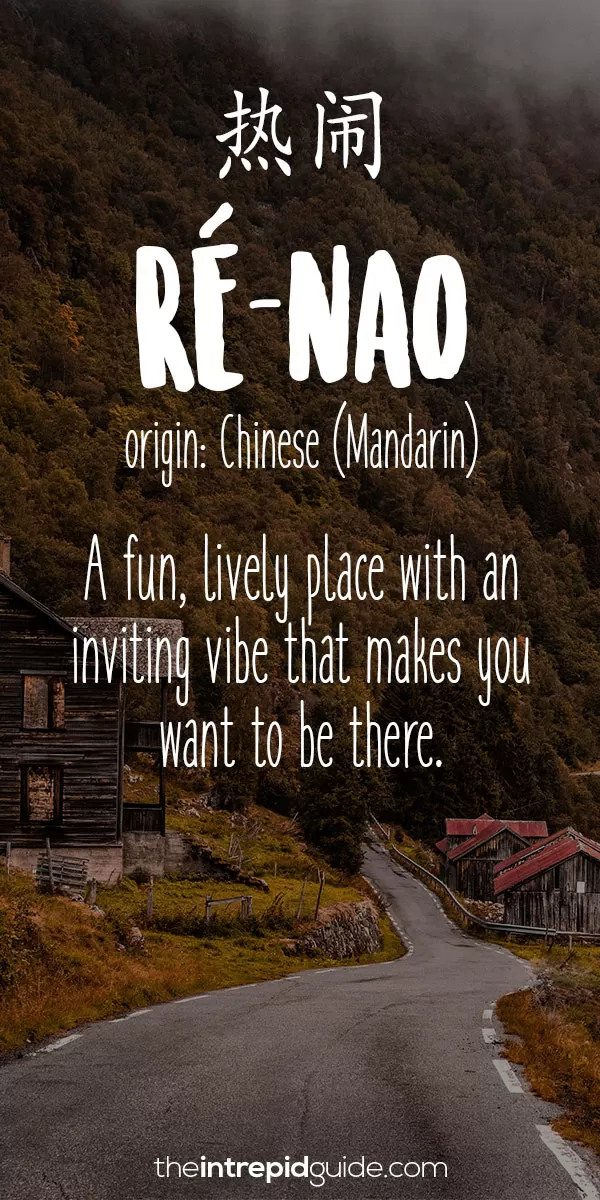
Mít kliku – This Czech verb means to have luck on your side or be lucky enough to achieve something. It literally means, ‘to have a door handle’.
Prozvonit – Prozvonitis when you call but only let it ring once so that the other person calls back without so you save money or minutes.
Learn Czech for travel! Get my free Czech travel phrase guide here .
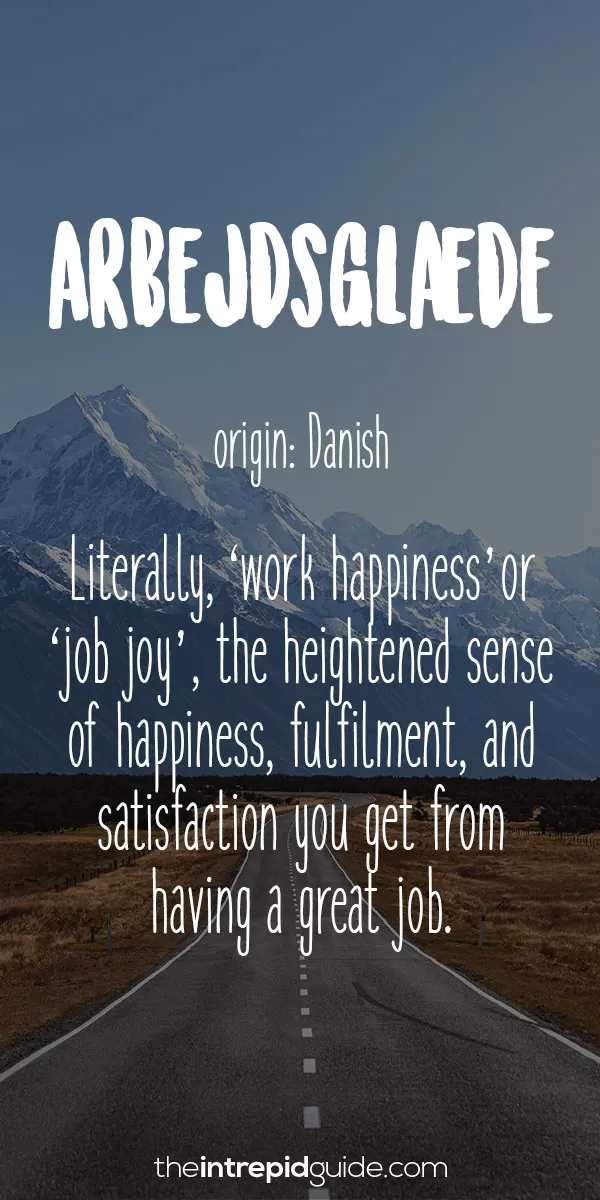
Learn Danish for travel! Get my free Danish travel phrase guide here .
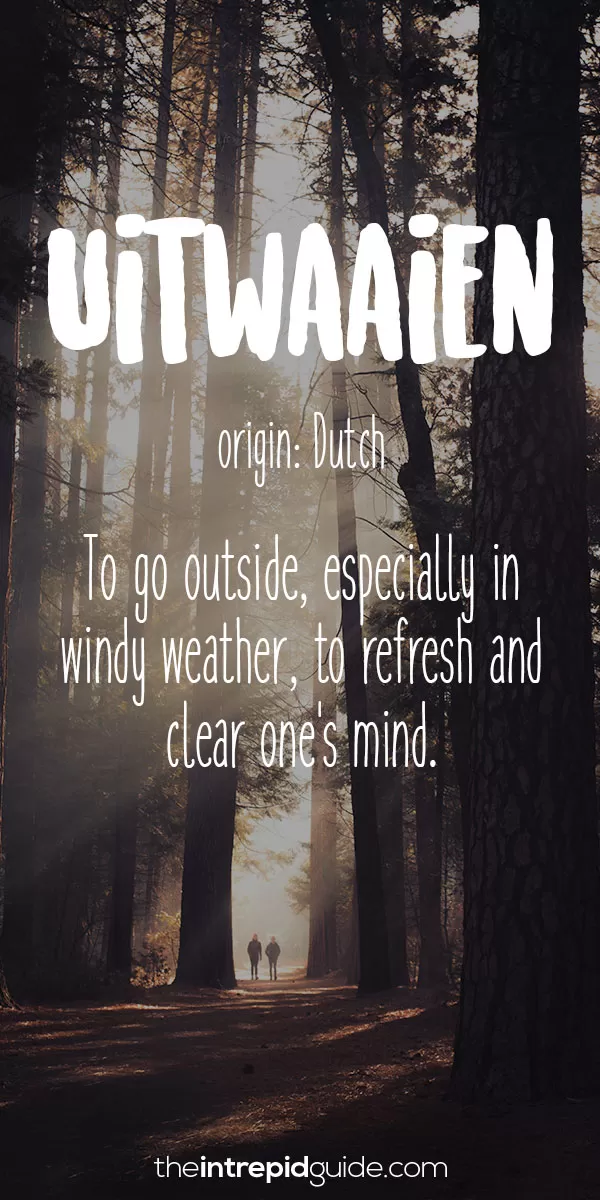
Voorpret – Voorpret is the build up of anticipation, joy or pleasure you feel ahead of the actual event such as setting up for a party and can’t help but dance as you do it. Voorpret literally means, ‘pre-fun’ but means more than just the anticipation of something fun, it’s enjoying the anticipation. It’s voorpret !
Gezelligheid – This Dutch word combines the Danish concept of hygge and the German gemütlichkeit . Gezelligheid is the idea of being in a comfortable, cozy atmosphere with loved ones, catching up with an old friend, or just the general togetherness that gives people a warm feeling. It suggests a sense of closeness that many consider encompasses the heart of Dutch culture.
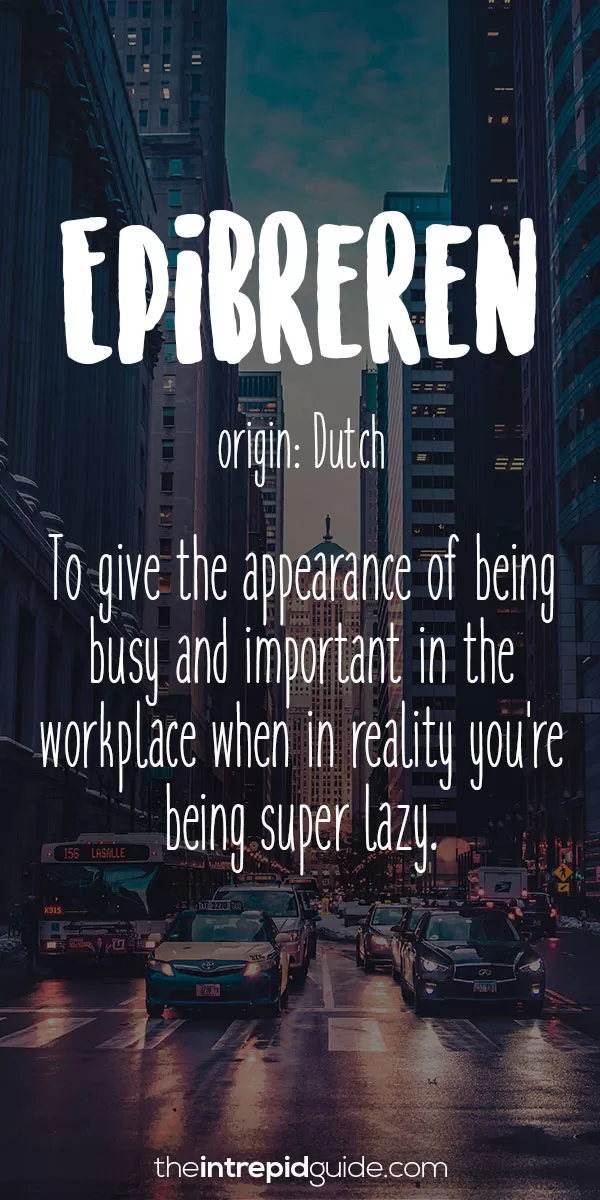
Learn Dutch for travel! Get my free Dutch travel phrase guide here .
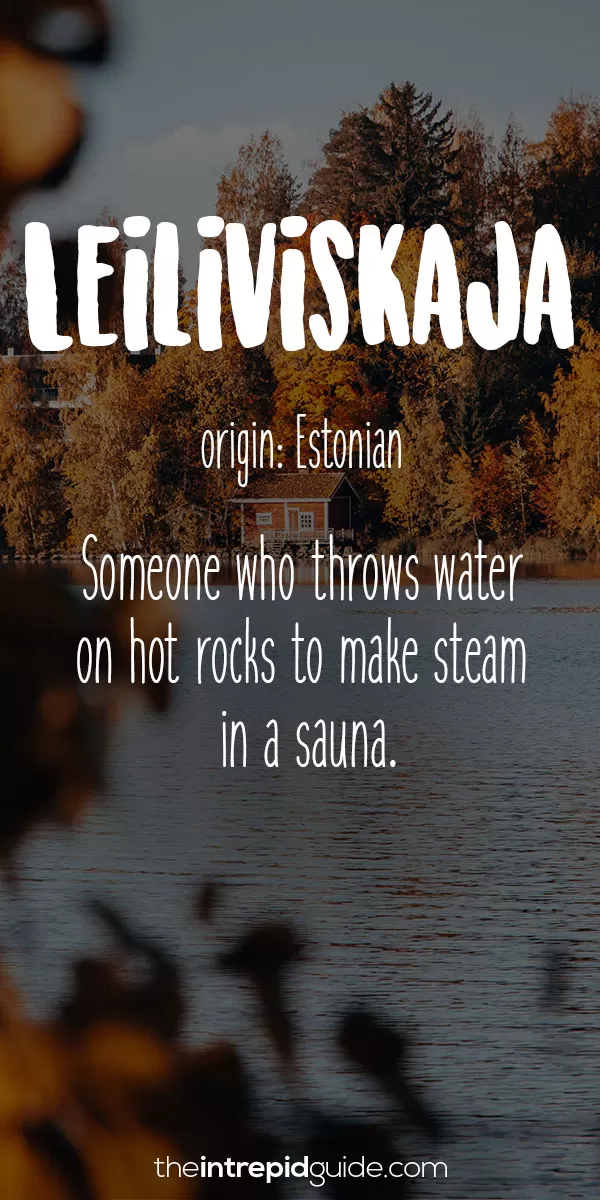
Jaksaa – A severe absence of enthusiasm to do something. When you just don’t have enough strength, will power to do something or can’t be bothered.
Kaamos — Kaamos is more than just Polar Night when there are 24 consecutive hours of darkness, kaamos describes the longing for sunshine, and a feeling of depression and lack of motivation and enthusiasm. It signifies long dark days and bad weather, no social life, and a lack of inspiration.
Lieko – A trunk of a tree that has submerged to the bottom of a lake.
Myötähäpeä – Experiencing a shared embarrassment or shame when seeing someone else do something embarrassing. Myö means ‘we,’ myötä means ‘with’ and häpeä is ‘shame’, so it can be roughly translated to something like ‘co-embarrassment’ or ‘secondhand embarrassment’.
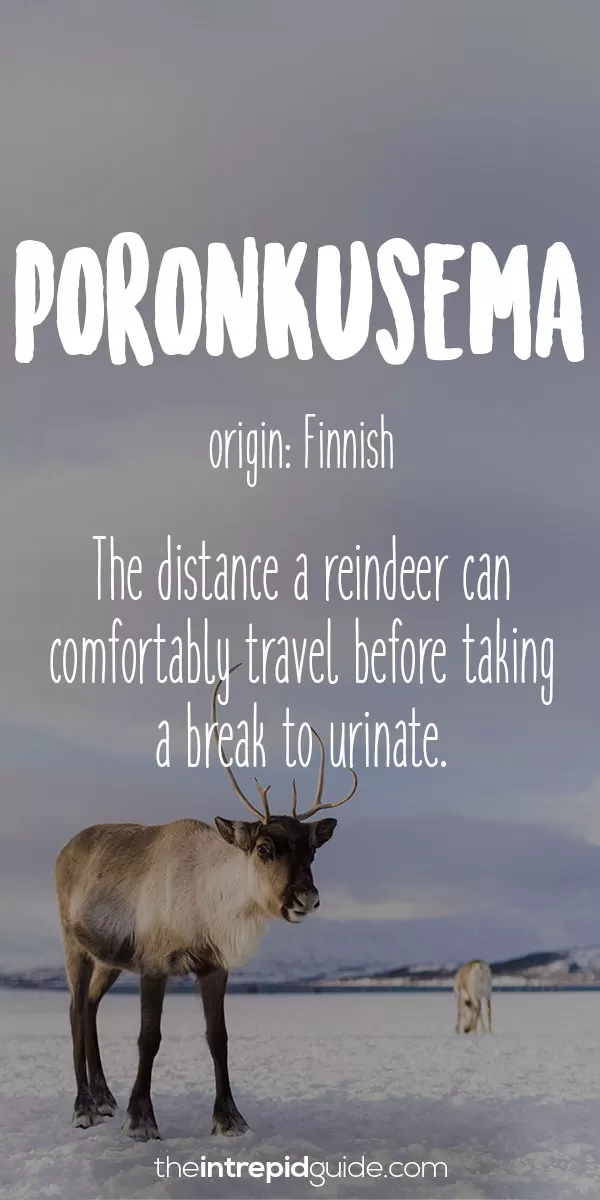
Sauna – A sauna is a small room used as a hot-air or steam bath for cleaning and refreshing the body. Saunas were invented in Finland several millennia ago and are still a cornerstone of Finnish culture, as well as of every Finnish home. So much so that, traditionally, when people moved they used to build the sauna first, and only then the house.
Sisu – Sisu is a Finnish concept that describes a stoic resilience, determination and hardiness considered to be necessary to face the difficulties of life in general and of life in harsh conditions in particular. This Finnish term that can be roughly translated as strength of will, determination, perseverance, and acting rationally in the face of adversity. Sisu isn’t momentary courage, but the power to sustain that courage to see something through.
Tokka – Pronounced [talk-uh] is a Finnish collective noun for a large herd of reindeer. It is said that there are as many reindeer as there are people in Finland.
Learn Finnish for travel! Get my free Finnish travel phrase guide here .
Bérézina – A sense of panic associated with a huge defeat. The word Bérézina is used in the French idom ‘ C’est la Bérézina’ meaning a complete defeat, loss. The origin of this expression dates back over 200 years to the banks of the river Berezina in Belarus. It was here that a fierce battle took place between Napoleon’s retreating army and the Imperial Russian army. The battle ended in a victory for the Russian Empire and heavy losses for the French.
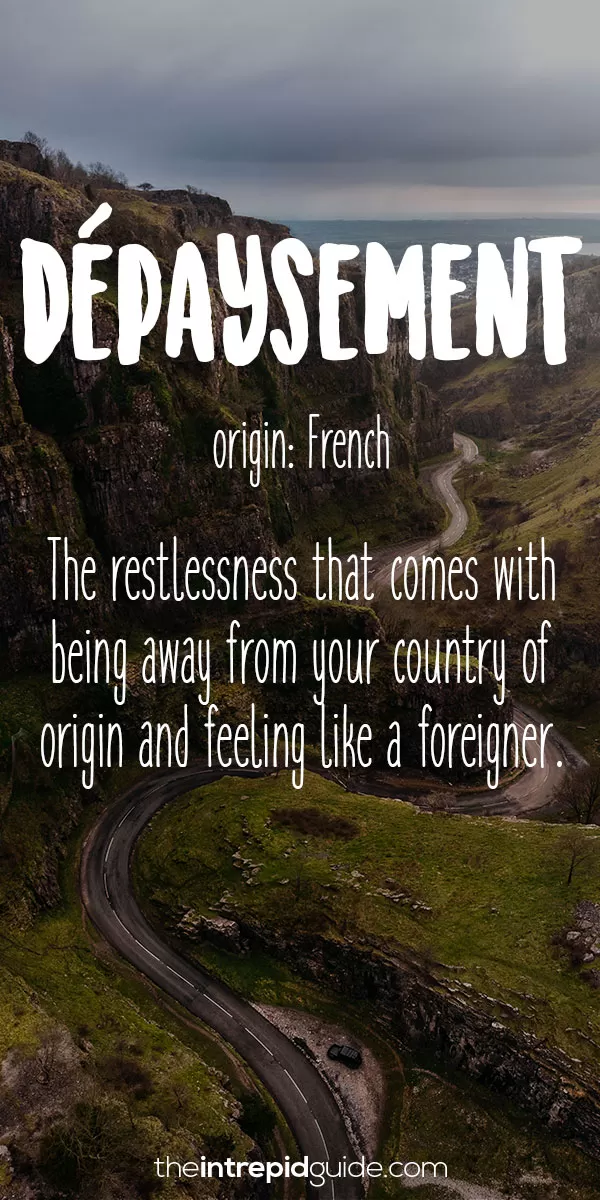
Bricoleur — A bricoleur is a handyman who uses whatever materials he can get his hands on to create a construction (or bricolage). Think of the well-known term Bric-à-brac – miscellaneous objects and ornaments of little value. The closest equivalent in English would be something like a DIY-er.
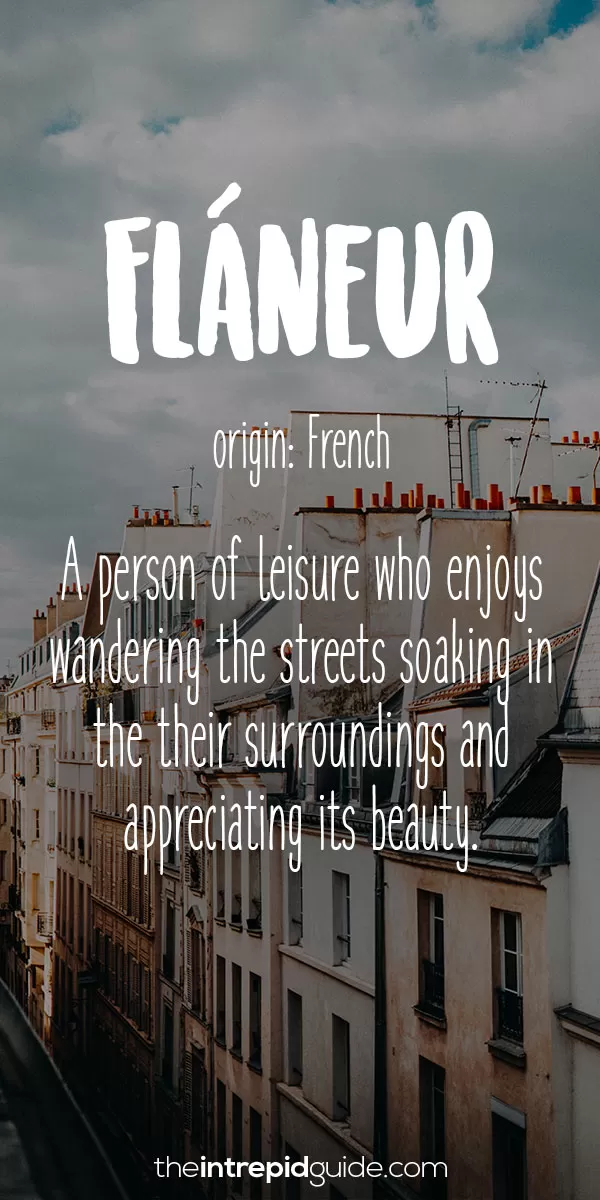
La douleur exquise – If French is the language of love, then it seems only fitting that it has a term to describe all the feelings associated with unrequited love. La douleur exquise literally means ‘the exquisite pain’, the pain of wanting something you can’t have, such as someone who will never return your feelings.
L’appel du vide – L’appel du vide is that little voice in your head telling you to do something stupid like jerking the steering wheel to the right and take a flying leap off the edge or staring out at the view from a balcony and have a sudden urge to jump over the ledge. In English, you might refer to it as the call of the Siren song.
L’esprit de l’escalier – Literally ‘stairwell wit’, l’esprit de l’escalier is the feeling that you’ve got the perfect comeback, but you think of it too late. Similar to the German, treppenwitz , mentioned earlier.
Retrouvailles – This beautiful French word means ‘refindings’, referring to the reunion you would have with someone you care deeply for but haven’t seen in a long time. The English word ‘reunion’ doesn’t quite capture this intense feeling.
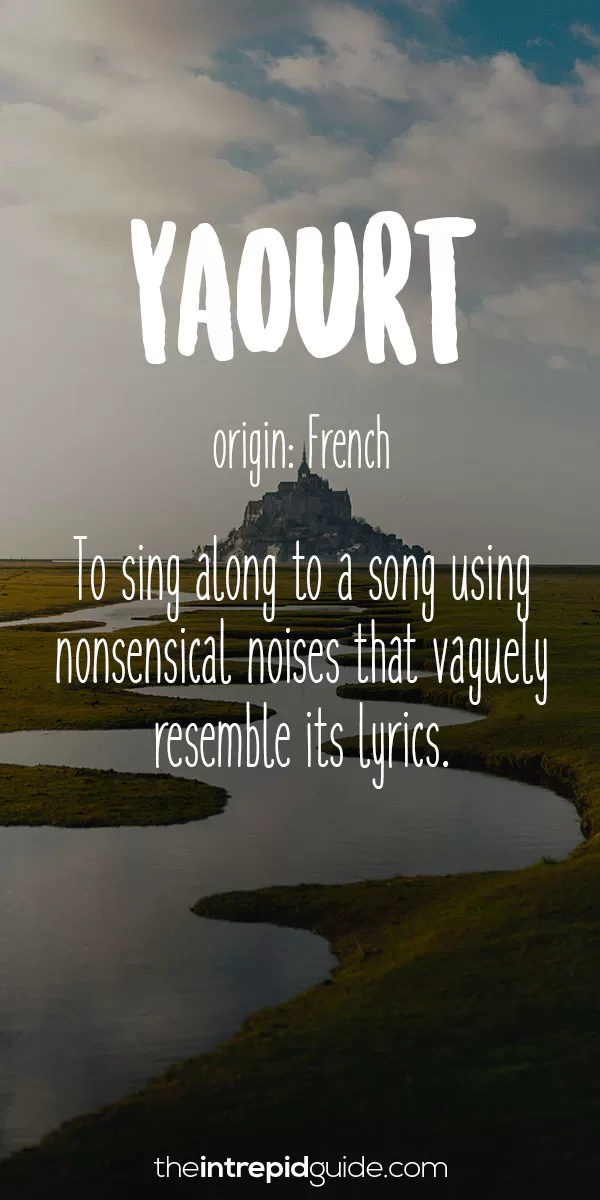
Learn French for travel! Get my free French travel phrase guide here .

Drachenfutter – Literally, ‘dragon fodder’, this is a gift someone gives to placate and apologise to someone, especially a spouse, after they’ve done something wrong or stupid.
Erklärungsnot – The urgent need to explain something, either yourself or the situation. It can also mean to struggle explaining something. Erklärungsnot is made up of the German words Erklärung (‘explanation’) and not (in this case, can be translated as ‘need.’)
Extrawunsch – A term used to call someone who complicates things by being fussy or picky, and thus slows things down.
Fachidiot – Fachidiot , literally it means ‘subject-idiot’. A f achidiot is a person with expert knowledge in their own field and are well-accomplished but are clueless when it comes to anything outside that area.
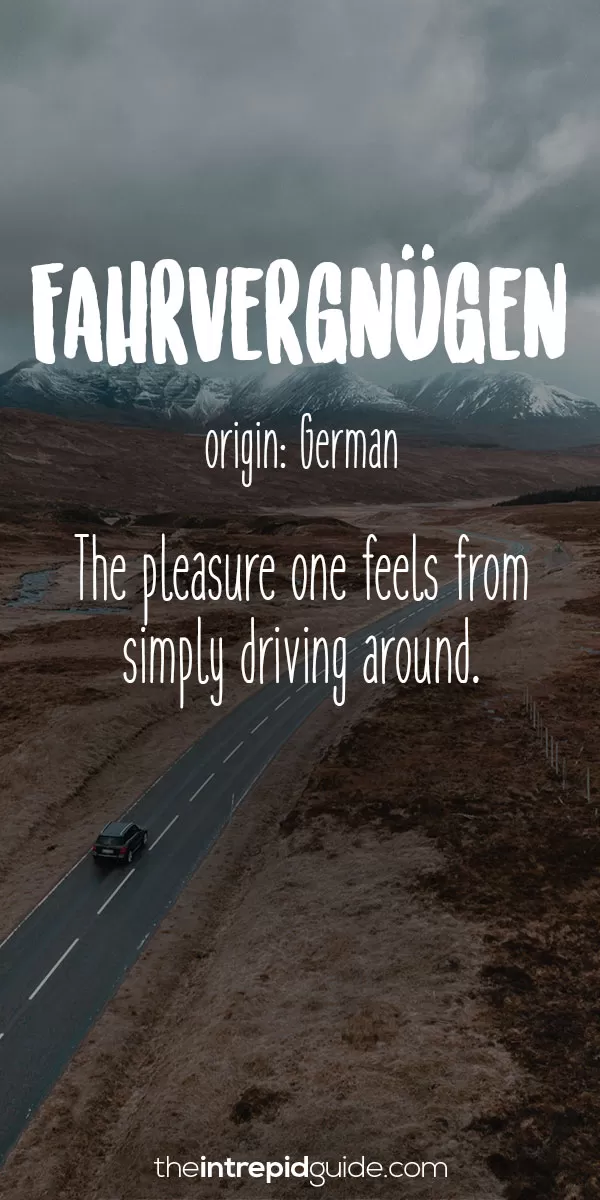
Fisselig – This represents a temporary state of sloppiness, usually elicited by a person’s nagging. This often means that a person is flustered to the point of incompetence.
Kabelsalat – Kabelsalat literally means, ‘a cable salad’, a beautiful word to describe the mess of tangled cables.
Handschuhschneeballwerfer – Handschuhschneeballwerfer is German slang for ‘coward’. It literally means, ‘someone who wears gloves to throw snowballs’. In other words, a cowardly person who criticises and abuses something from a safe distance.
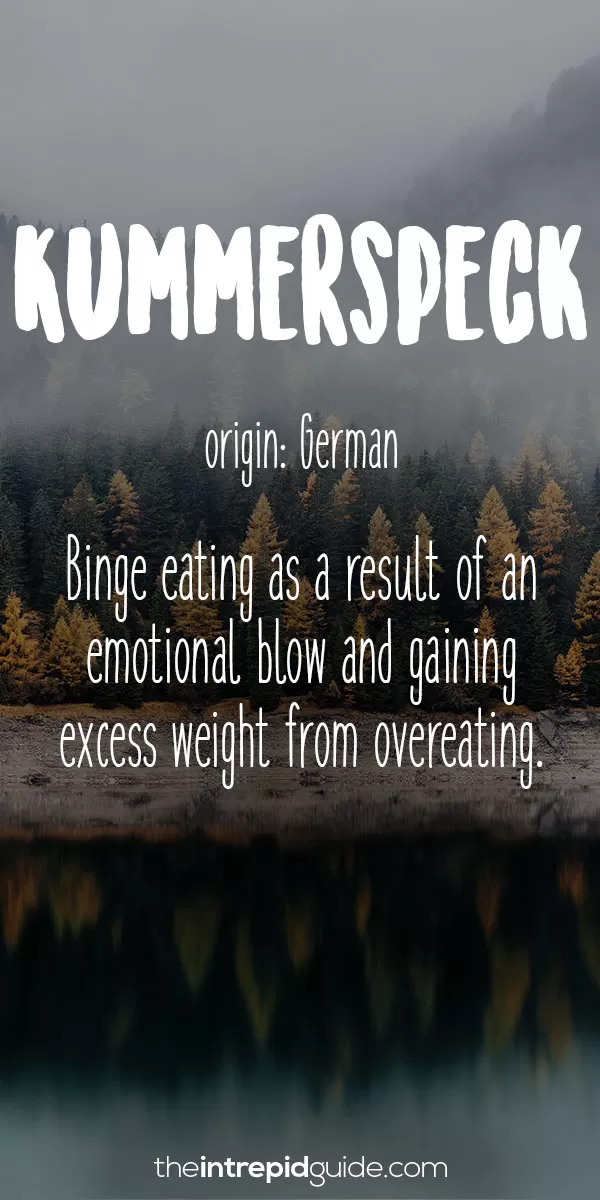
Lebensmüde – Lebensmüde is a German compound noun made up of the words leben (life) and müde (tired), and literally means ‘life tired’. It describes the feeling of being tired or weary of life. Its closest English equivalents are probably world-weary, depressed, fed up, restless and dissatisfied.
Schadenfreude – A feeling of joy and pleasure that comes with seeing another’s misfortune. Usually. someone you really dislike.
Schilderwald – A street that is so overcrowded and rammed with street signs, that you’re more prone to getting lost rather than finding your way.
Schlimmbesserung – Something that was meant to be an improvement, but actually makes things worse.
Schnapsidee – Literally, ‘schnapps idea’, is a plan so ridiculous you must have been drunk when you thought it up.

Torschlusspanik – This beautiful word is used to refer to the feeling you experience at a certain point in your life where you see an imaginary door closing on all your opportunities, and you wonder what could have been. Tor means ‘gate,’ schluss means ‘closing’ or ‘ending,’ and panik means, ‘panic.’ So, torschlusspanik literally translates to ‘gate closing panic.’
Treppenwitz – Possibly the most useful untranslatable word on this list, treppenwitz describes all the things you should have said in the heat of the moment but only think of when it is too late. Also known as, the best comeback line you never said.
Waldeinsamkeit – The feeling of being alone in the woods. Derived from two German words ‘ wald ,’ meaning forest, and ‘ einsamkeit ,’ meaning loneliness, it refers to a connectedness with nature and the peace experienced in that moment.
Weichei – Weichei is a German slang term which used to refer to a cowardly person. Literally meaning ‘a soft egg’, the closest English equivalent would be ‘wimp’.
Weltschmerz – The literal translation of the word is ‘world grief’, or ‘world-pain’, a term first coined by the German author Jean Paul. Weltschmerz refers to a deep sadness about the imperfection and pain of the world.
Verschlimmbessern – Verschlimmbessern describes the act of trying to make something better, only to end up making it worse than it initially was. In English, you might say something like ‘to put your foot in it’.
Learn German for travel! Get my free German travel phrase guide here .
Filotimo (φιλότιμο) – Filotimo is almost impossible to translate but can be summed up as ‘love of honour’. It describes a person who understands the responsibility to themselves, as a human, being to always do the right thing and with honour. Even if their wealth, safety, freedom, or even life is at peril. No matter what, this person will do the honourable thing, regardless of the consequence.
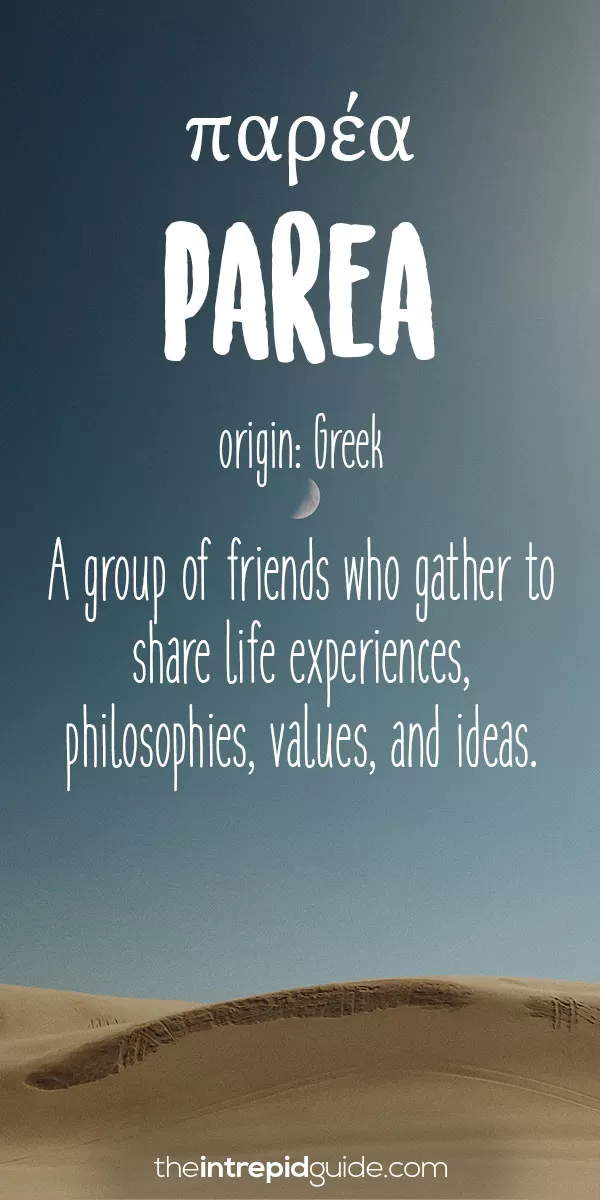
Psithurism (Ψυθισμός) – Psithurism is the rustling sound of leaves in the wind. It comes from the Greek psithuros , meaning ‘whispering, slanderous.’
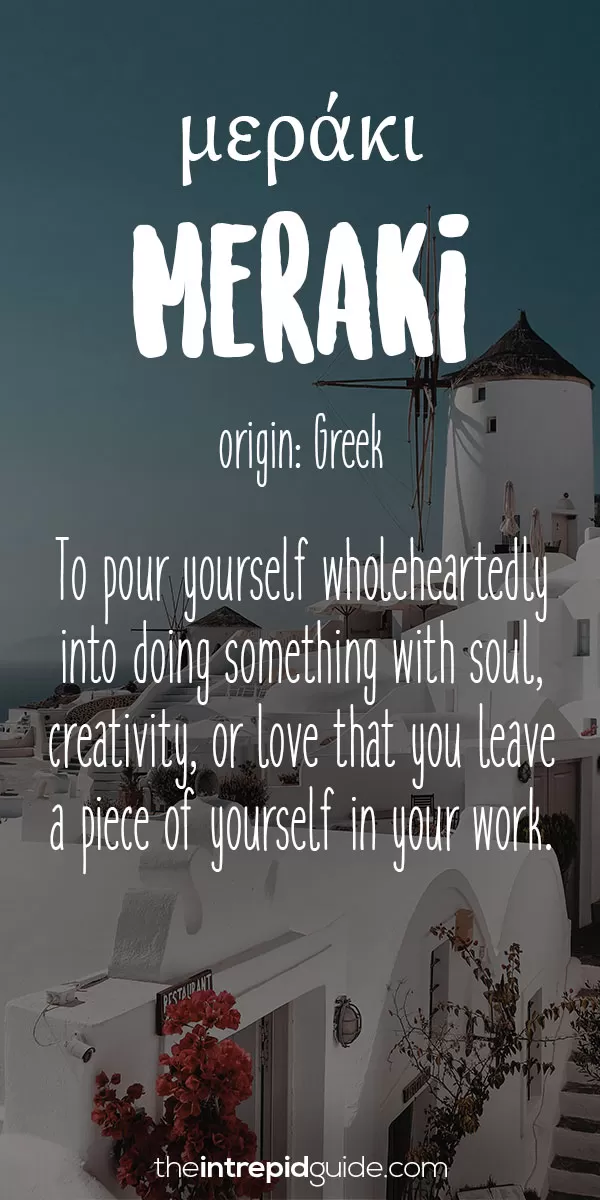
Learn Greek for travel! Get my free Greek travel phrase guide here .

Learn Hebrew for travel! Get my free Hebrew travel phrase guide here .
Chai-Pani (चाय पानी)– The phrase ‘Chai-Pani’ literally meaning, ‘tea and water’, is used to offer welcome drinks and facilitate guests in houses of India. It can also refer to a bribe given to someone, often a bureaucratic worker, to get a job done quickly.
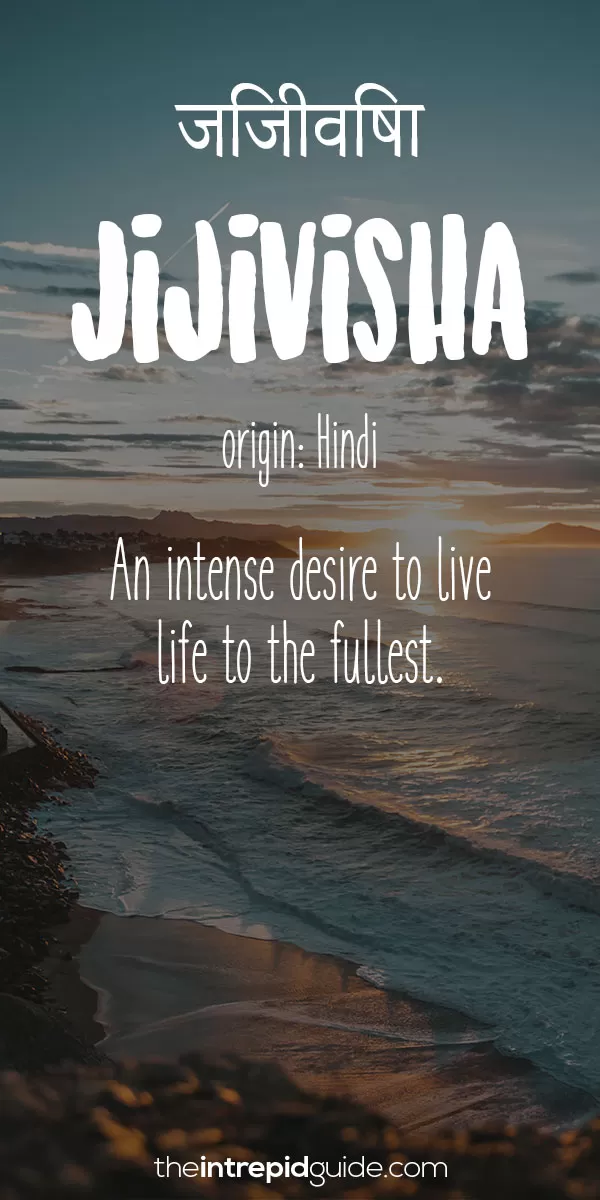
Viraha (विरह) – Realising you love someone only after you’re separated.
Learn Hindi for travel! Get my free Hindi travel phrase guide here .
Elmosolyodni – A kind of smile that forms when something isn’t especially funny, but you can’t help but smile anyway.
Házisárkány – A nickname for your spouse or better half who is constantly nagging. It literally means an ‘Domestic Dragon’
Dalalæða – A low waist-deep fog that forms after a warm and sunny day. It literally means, ‘a fog that sneaks up from the bottom of a valley’ or ‘valley-sneak.’
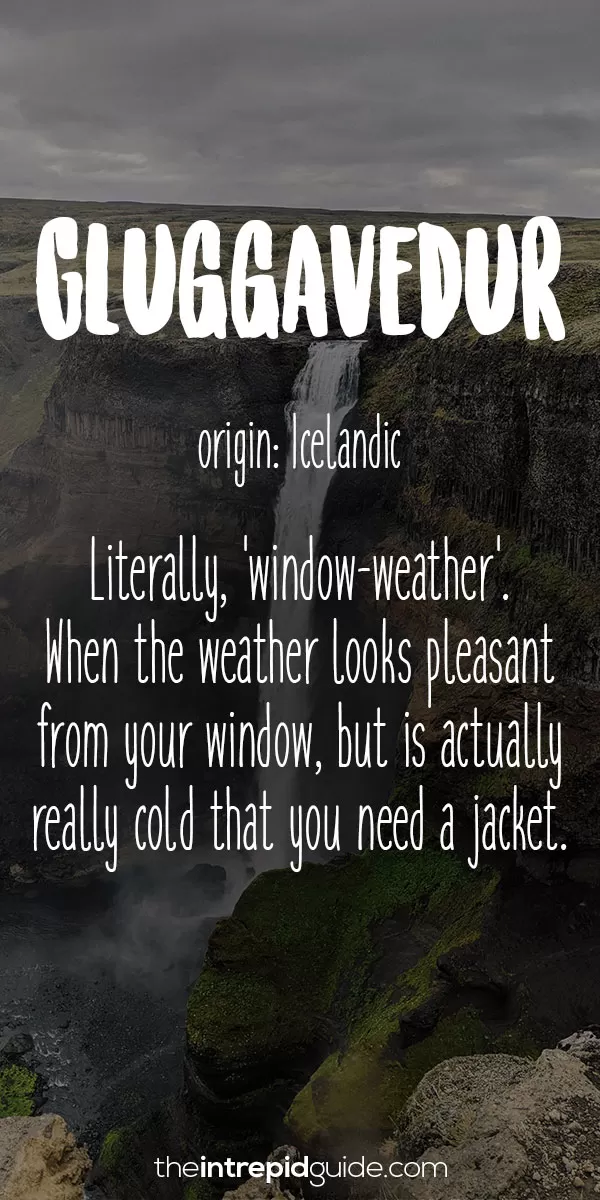
Þetta reddast – Pronounced [THETTA red-ahst], Þetta reddast is Iceland’s unofficial motto that loosely translates as ‘everything will work out in the end’.
Tima – Being unwilling to spend time or money on a particular thing, even though you can afford it.
Learn Icelandic for travel! Get my free Icelandic travel phrase guide here .
Jayus – A joke so terrible and unfunny that you can’t help but laugh. It’s funny because it’s not funny, kind of like a dad joke.
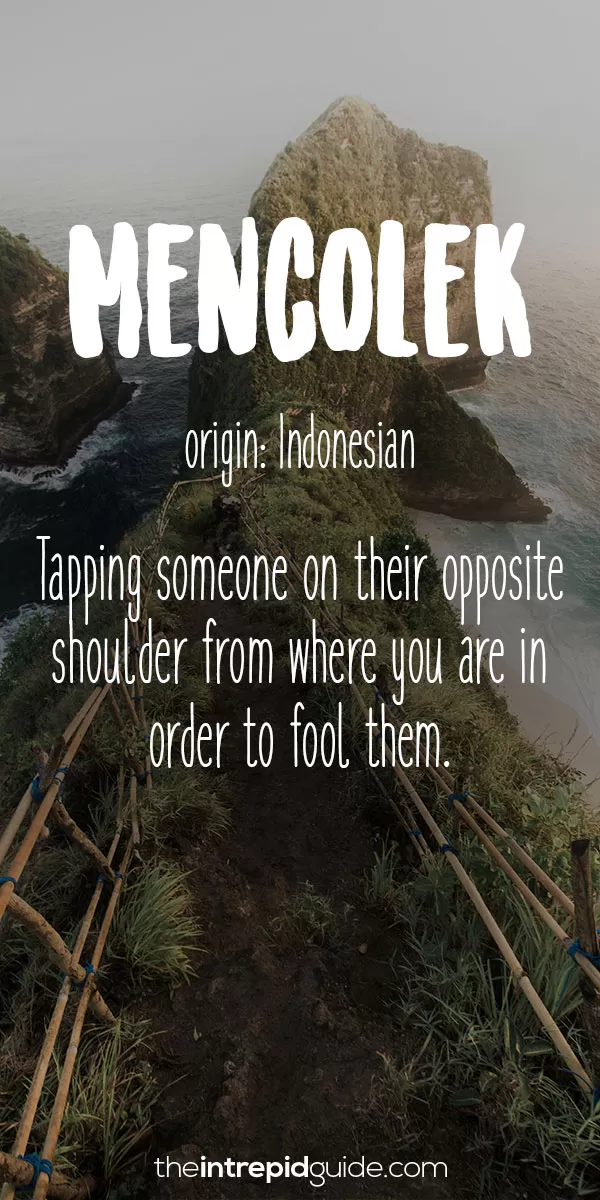
Cúbóg – A batch of Easter eggs.
Learn Irish for travel! Get my free Irish travel phrase guide here .
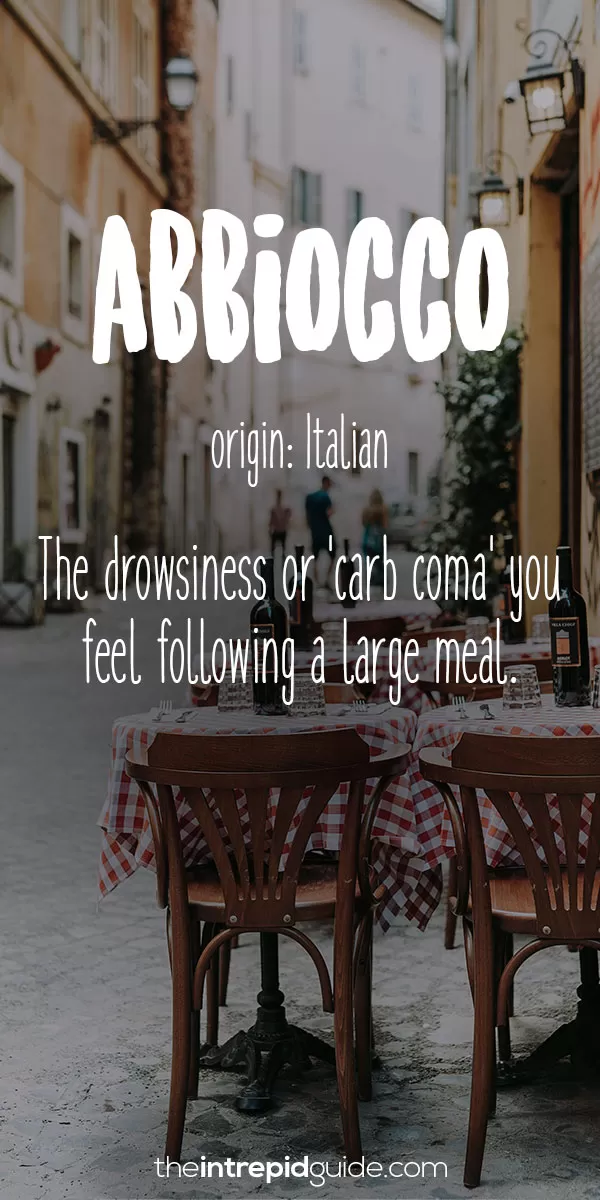
Attaccabottoni – Literally, ‘attach buttons’, an attaccabottoni is a chatty person who corners you to tell you long, meaningless stories, in endless detail about their life.
Cavoli riscaldati – Literally reheated cabbage, this is essentially an attempt to reheat an old romance. In other parts of Italy, ‘ minestra riscaldata ‘ or ‘ zuppa riscaldata’ , meaning reheated soup, is used to describe the same sentiment.
Commovente – Often translated as ‘heartwarming,’ but it directly refers to being moved to tears. The verb commuovere means to move, to touch, to stir emotions.
Culaccino – Culaccino refers to the dregs in a glass but also the residue or water ring left on a surface by a moist, cold glass or other small container. In Italian, ‘ culo ‘ means bottom.
Gattara – A woman devoted to caring for and feeding stray or domestic cats. A more extreme version of a cat lover.
Fare la scarpetta – To finish up the contents of your plate, especially the sauce, with a piece of bread.
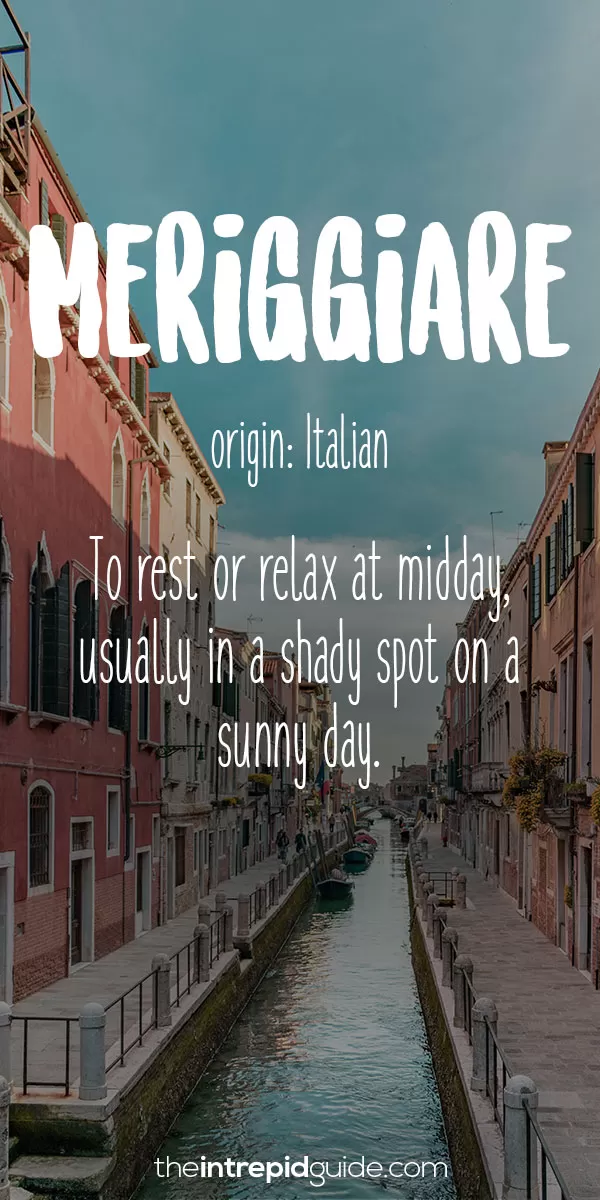
Learn Italian for travel! Get my free Italian travel phrase guide here .
Age-otori (上げ劣り) – Pronounced [aah-gey-oh-toh-ree], Age-otori is a beautiful Japanese word that perfectly sums up a disaster haircut that makes you look worse than before.
Arigata-meiwaku (ありがためいわく) – This is used to refer to an act that someone does for you, even though you didn’t want to have them do it and tried to avoid having them do. They might have gone ahead, determined to do you a favour, then things going wrong, causing you a lot of trouble. In spite of this, social conventions required you to still express gratitude. What a mouthful! Yet the Japanese have a simple concise term that says it all in just 2 words, arigata-meiwaku.
Bakku-shan (バックシャン) – This dating slang term literally means ‘back beautiful’ and is used to describe a girl who is beautiful, as long as you’re looking at her from behind! Harsh! An English equivalent could be either ‘good from afar, but far from good’, or ‘Butter face’ – where everything but her face is attractive). What makes this Japanese word so interesting is that it’s not Japanese at all, it’s a composite of バック ( bakku , ‘back’, from English back) and シャン ( shan , ‘beautiful’, from German schön ).
Boketto (ぼけっと) – Gazing vacantly into the distance without thinking of anything specific, in other words, daydreaming.
Chindōgu (珍道具) – A prank originating from Japan, which is done by a person seemingly inventing ingenious everyday gadgets that seem like an ideal solution to a particular problem, but are in fact nothing more than a useless gag. Literally translated, chindōgu means unusual (珍, chin) tool (道具, dōgu).

Kyōiku mama (教育ママ) – Pronounced [ky-oh-ee-kuu-mama], Kyōiku mama is an offensive Japanese term used to describe a mother who relentlessly pushes her children to achieve academic excellence. It literally translates to ‘education mother’.
Mono no aware (物の哀れ) – Literally ‘the pathos of things’, and also translated as ‘an empathy toward things’. The term Mono no aware was coined by Motoori Norinaga, an eighteenth century literary scholar, who combined aware, which means sensitivity or sadness, and mono, which means ‘things.’ Norinaga believed that this feeling was at the very centre of Japanese culture.
Nekama (ネカマ) – Nekama refers to a certain type of male, who in their normal daily life are usually heterosexual, however, online they represent themselves as female. Thus, this term commonly refers to a man pretending to be a woman on the internet, regardless of his sexuality.
Shouganai (しょうがない) – A Japanese philosophy that states that if something is meant to be and cannot be controlled, then why worry about it? The idea is that worrying won’t prevent the bad things from happening; it will only deprive you of the joy of enjoying the good things in life. Translated literally, shouganai means ‘it can’t be helped’.
Tatemae (建前) and Honne (本音) – Tatemae has the specific cultural meaning. It refers to the behaviour that Japanese people adopt in public, according to what is socially accepted or not by Japanese society. It could be translated as the ‘public facade’. Privately held views that you would never admit in public is called honne .
Tsundoku (積ん読) – How many times have you bought a book but never read it? This is called tsundoku , a beautiful word used to describe the act of buying books but letting them pile without ever reading them. The term originated in the Meiji era (1868–1912) as Japanese slang. The word consists of tsunde-oku (積んでおく, to pile things up ready for later and leave) and dokusho (読書, reading books). It is also used to refer to books ready for reading later when they are on a bookshelf.
Wabi-Sabi (侘寂) – This is a beautiful Japanese concept that represents finding beauty in imperfections. It allows us to accept that growth and decay are a natural process. In traditional Japanese aesthetics, wabi-sabi is a world view centered on the acceptance of transience and imperfection. Wabi-sabi is a concept derived from the Buddhist teaching of the three marks of existence (三法印, sanbōin), specifically impermanence (無常, mujō), suffering (苦, ku) and emptiness or absence of self-nature (空, kū).
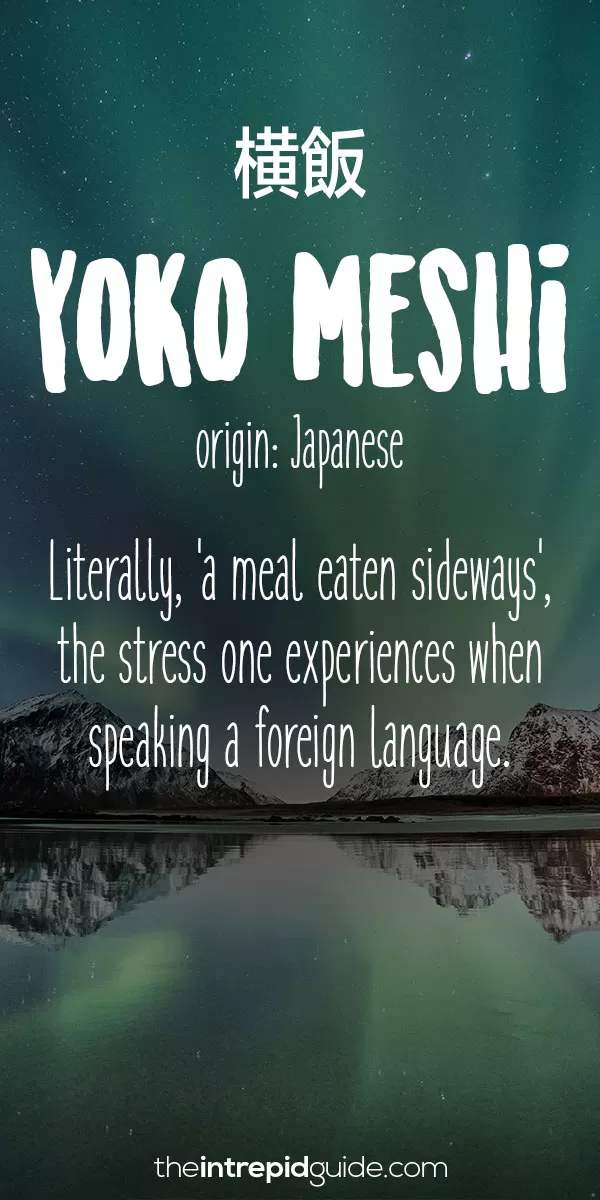
Yūgen (幽玄) – Yūgen is an important concept in traditional Japanese aesthetics. It refers to the sad beauty associated with human suffering, coupled with a sense of profound mysterious sense and beauty of the universe.
Related: 6 9 Wonderful Japanese Expressions That Will Brighten Your Day
Mokita – From the Kivila language native to Papua New Guinea, mokita is a commonly known truth that no one wants to admit or talk about.
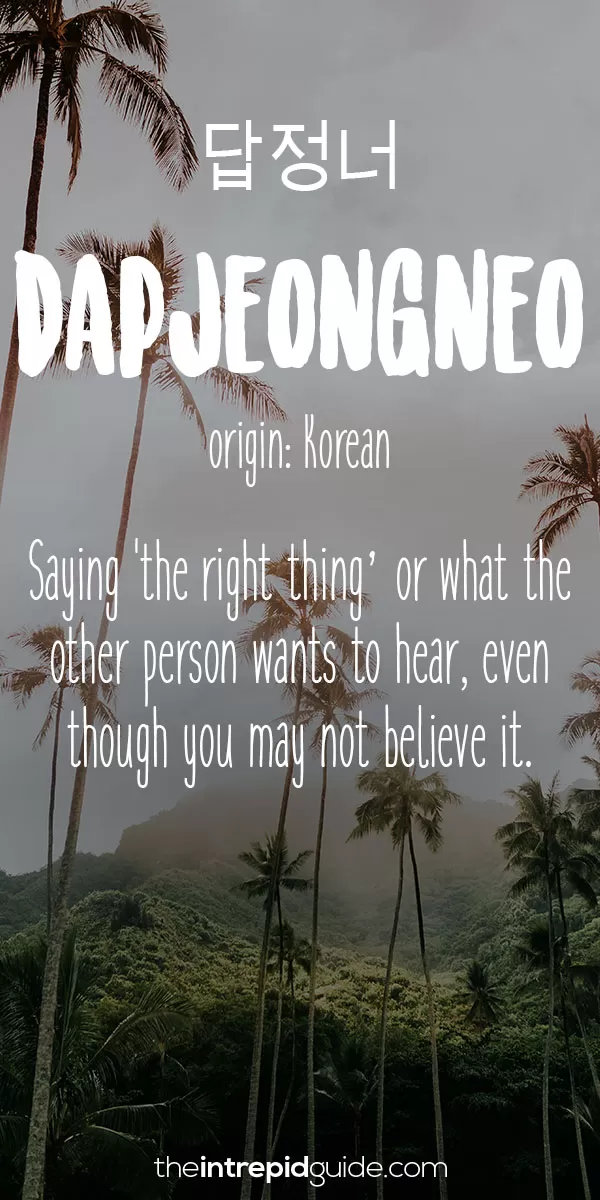
Gosohada (고소하다) – The feeling you get when someone finally gets what they deserves. When you think to yourself ‘HA serves you right!’, that’s Gosohada .
Gilchi (길치) – What you call someone who has a terrible sense of direction and who constantly gets lost.
Hyo – Pronounced [hee-yo], this is both a name meaning ‘dutiful’ and a term to describe the sense of duty children have towards their parents and the expectation that they may need to make sacrifices for them out of respect.
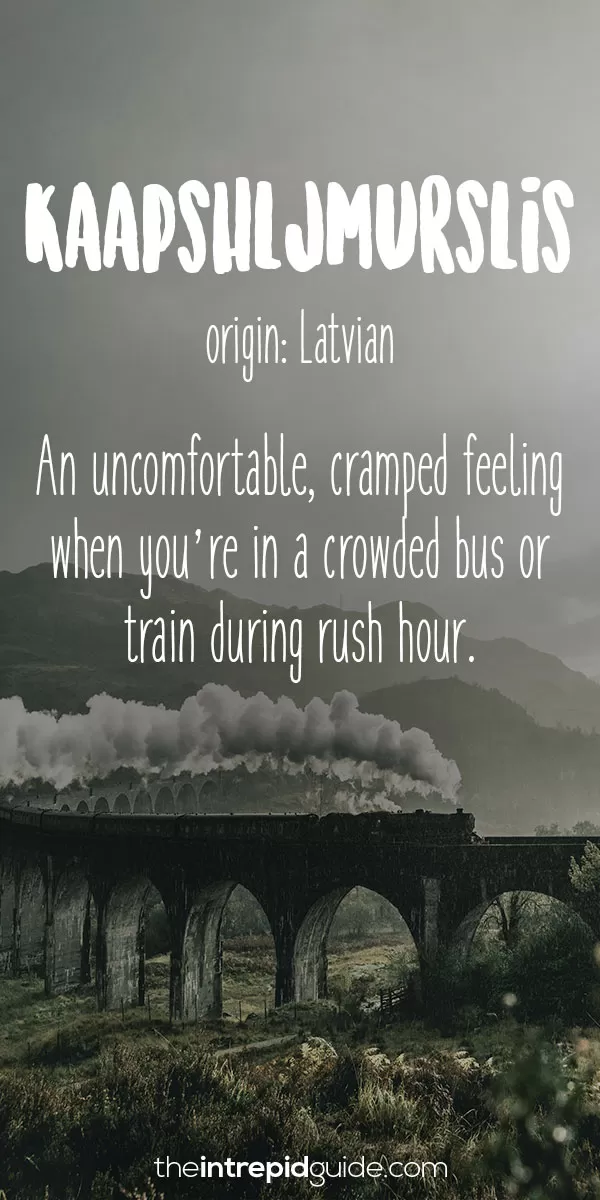
Lithuanian
Nepakartojama – A never-to-be-repeated perfect situation. Directly translated, it means ‘unable to repeat’
Manja – Manja is a person who shows so much outward love and affection towards someone they care about, like a spouse, partner, or child, to the point where they are pampering or spoiling them
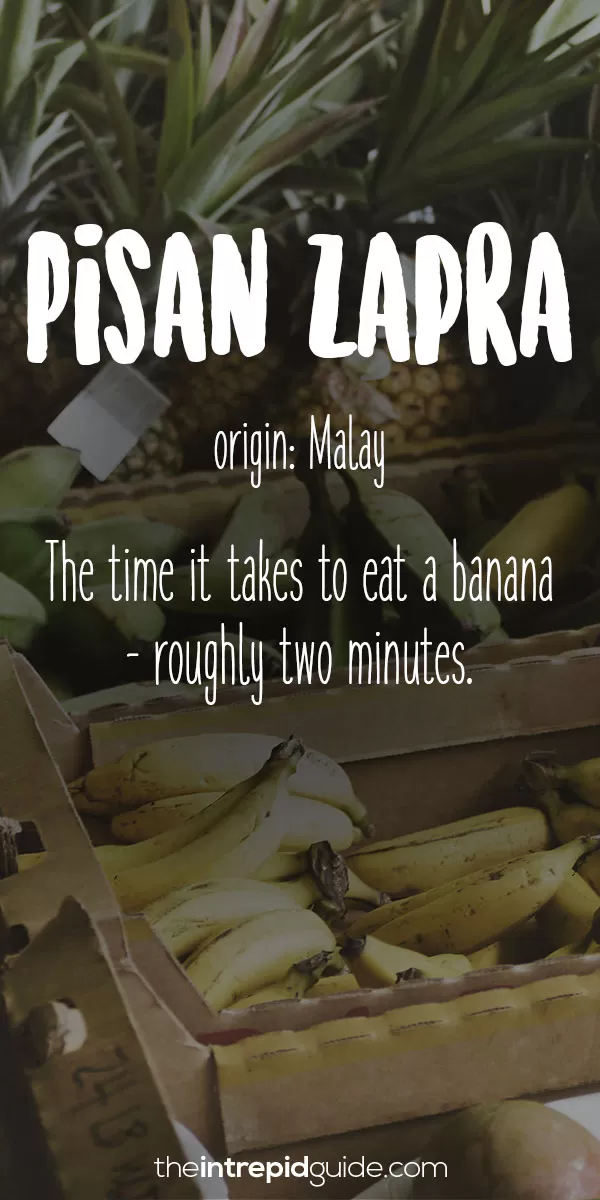
Māori (Cook Islands Maori)
Papakata – To have one leg shorter than the other.
Dugnad – Is a type of community day where Norwegians get together to help clean up their neighbourhoods by fixing, cleaning, painting or just tidying things up. A dugnad takes place around the change in seasons. Every Norwegian has participated in a dugnad . It’s a great occasion to socialise with your neighbours, which – if you live in Norway – you will know is pretty rare. The added benefit is that a dugnad is usually accompanied by kaffe og kaker ( coffee and cakes).
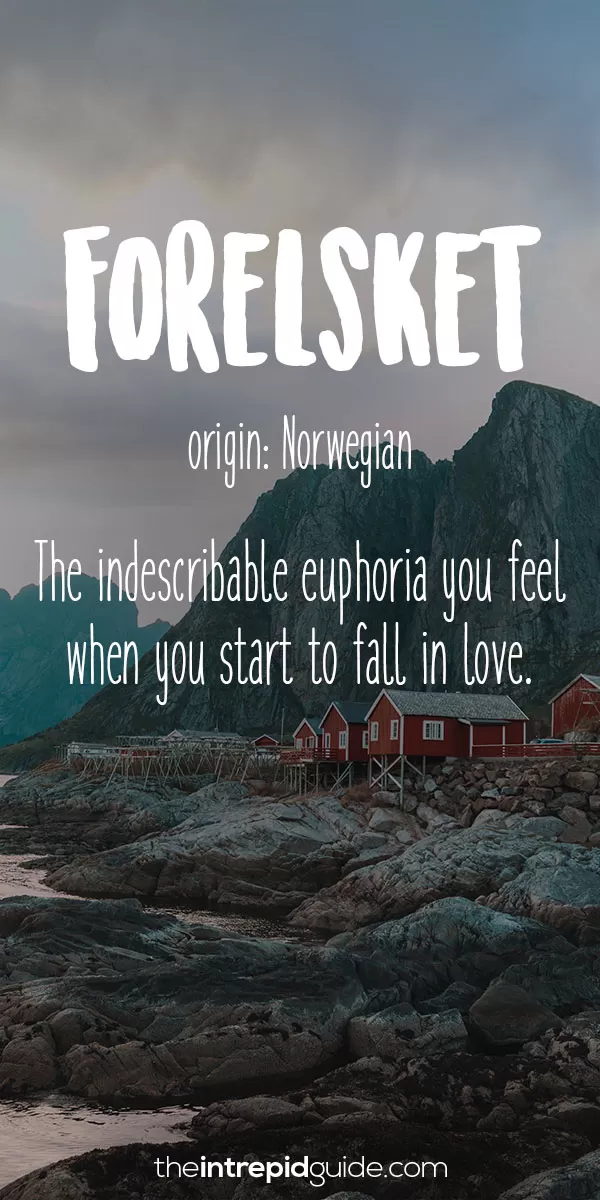
Pålegg – Anything that you can put on top of open-faced sandwiches, such as brun øst (Norwegian Cheese) cold cute, tomatoes, lettuce, spreads or other topping.
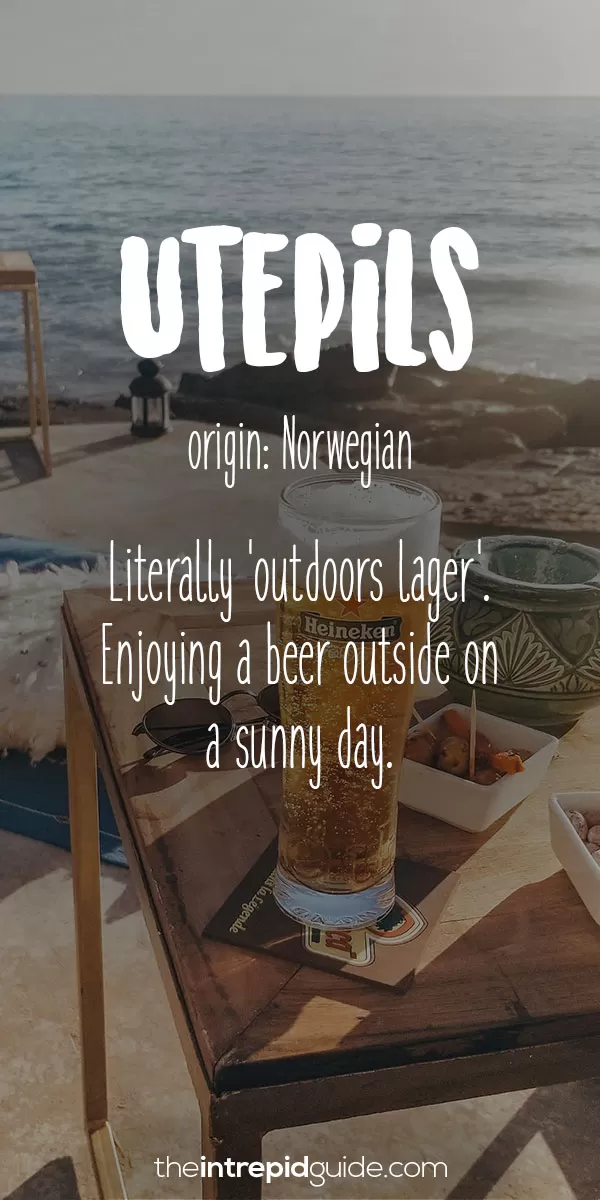
Uffda! / Uff da! – Is a versatile interjection and expression which basically means ‘Oh, I’m sorry to hear that’. It expresses surprise, astonishment, exhaustion, relief, and can be used to express empathy. It means a combination of ‘Ouch for you!’ and ‘I’m so sorry that you hurt yourself’. Within Scandinavian-American culture, Uff da often translates to, ‘I am overwhelmed’.
Yr – Yr can only be described as a very specific kind of rainfall with tiny, almost floating raindrops (or snowflakes). It’s similar to drizzle or mist but one as one Norwegian puts it ‘It paints a picture not only in how it’s spelled but how it’s said, it’s more a sound than a word. Also when conjugated: ‘ det yrer litt ‘. I see foggy whispers of misty rain in the fjords.’ ( Source ). I think this is the most beautiful untranslatable word I’ve learned so far since learning Norwegian.
Learn Norwegian for travel! Get my free Norwegian travel phrase guide here .
Pascuense (Easter Island)
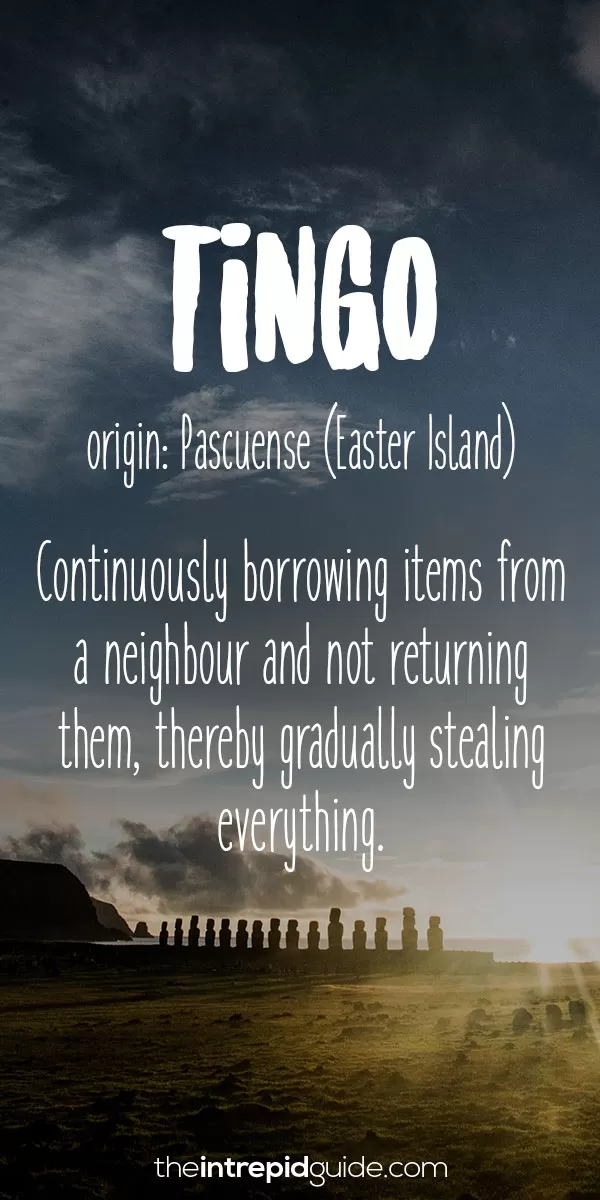
Zhaghzhagh – Pronounced [zhaang-zhaah-gh], it’s the uncontrollable chattering of teeth, either due to the cold, or from intense rage.
Dożywocie – A contract between parents and children, guaranteeing lifetime care in exchange for real estate.
Formacja – Formacja is used in colloquial speech to describe a state of mind that is widespread across a particular generation or period of time. The closest English word would be ‘zeitgeist’.
Kilkanaście – This Polish word refers specifically to any number between 12 and 19 and is used in a similar way as the English ‘umpteen’ or ‘many’, but neither translation is quite correct.
Kombinować – To make something or try to resolve a problem with the bare minimum and in an unusual way. This could be as a result of having limited access to resources or knowledge.
Radioukacz – Telegraphists who were part of the resistance movements on the Soviet side of the Iron Curtain.
Zalatwic – Zalatwic means ‘to get done’, but in a very specific way and is often either illegal or bends the rules. It involves using a bribe, political clout or connections, or simply personal charm to get the job done. This was especially common in Poland during the days of communism in Poland where it was probably impossible to live without ‘ zalatwic ’.
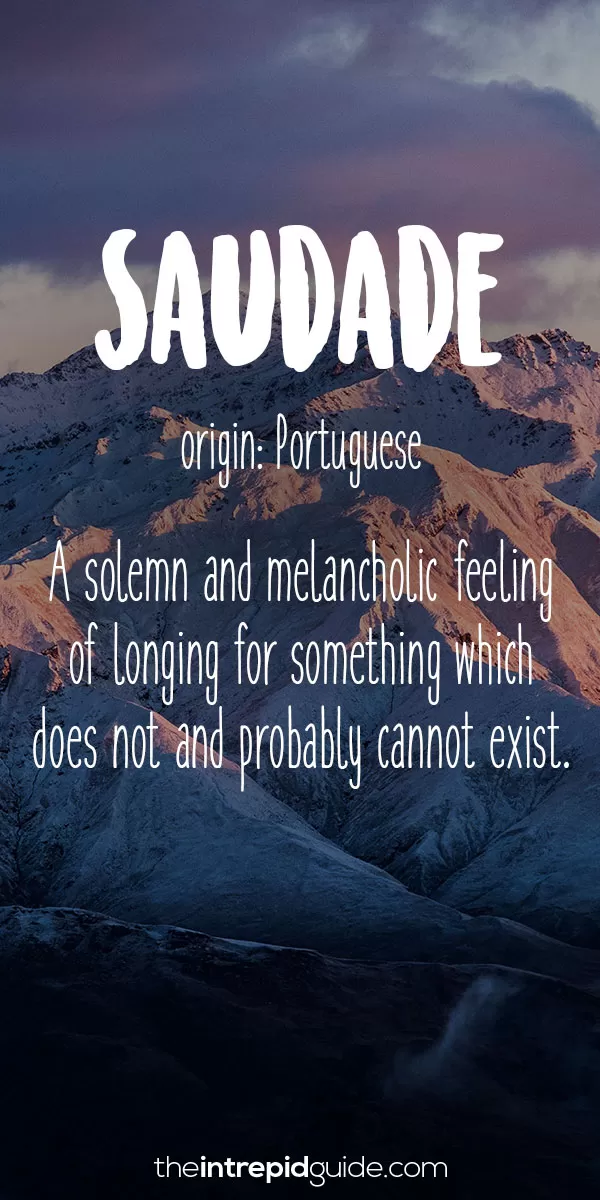
Desenrascanço – Desenrascanço literally means ‘disentanglement’, a term used in Portugal to describe the act of ‘disentangling’ oneself from a difficult situation by using all available means to solve the problem.
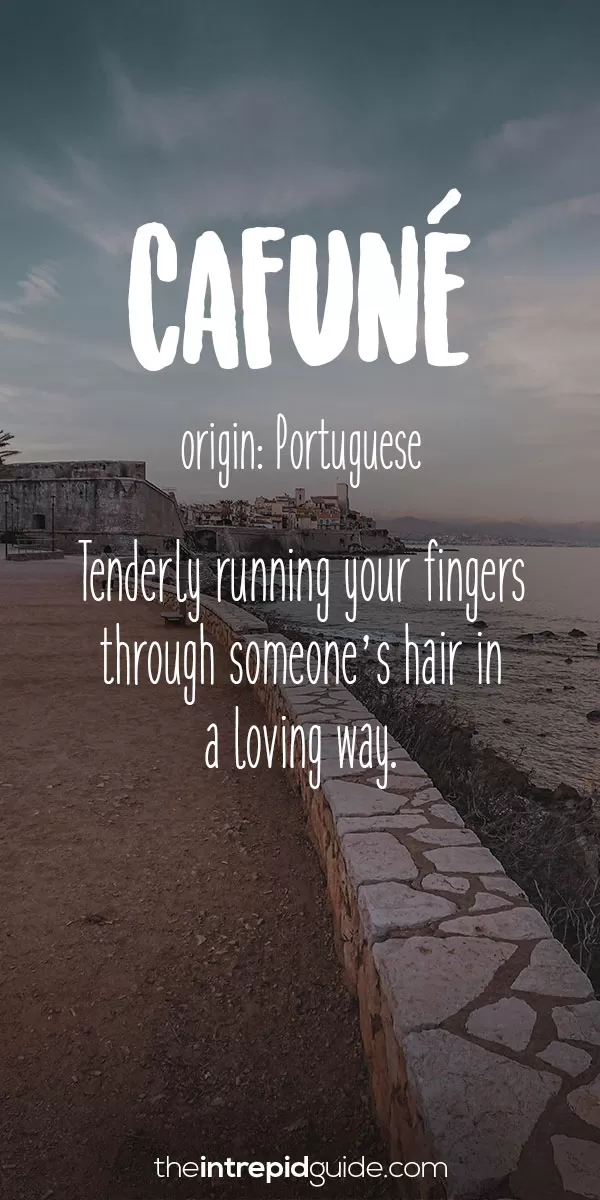
Learn Portuguese for travel! Get my free Portuguese travel phrase guide here .
Dor – A sad longing or yearning for someone.
Soare cu Dinti – When you look out the window and it looks lovely and sunny until you actually step outside. Soare cu Dinti describes a beautiful sunny, but very cold day.
Tshiluba (Congo)
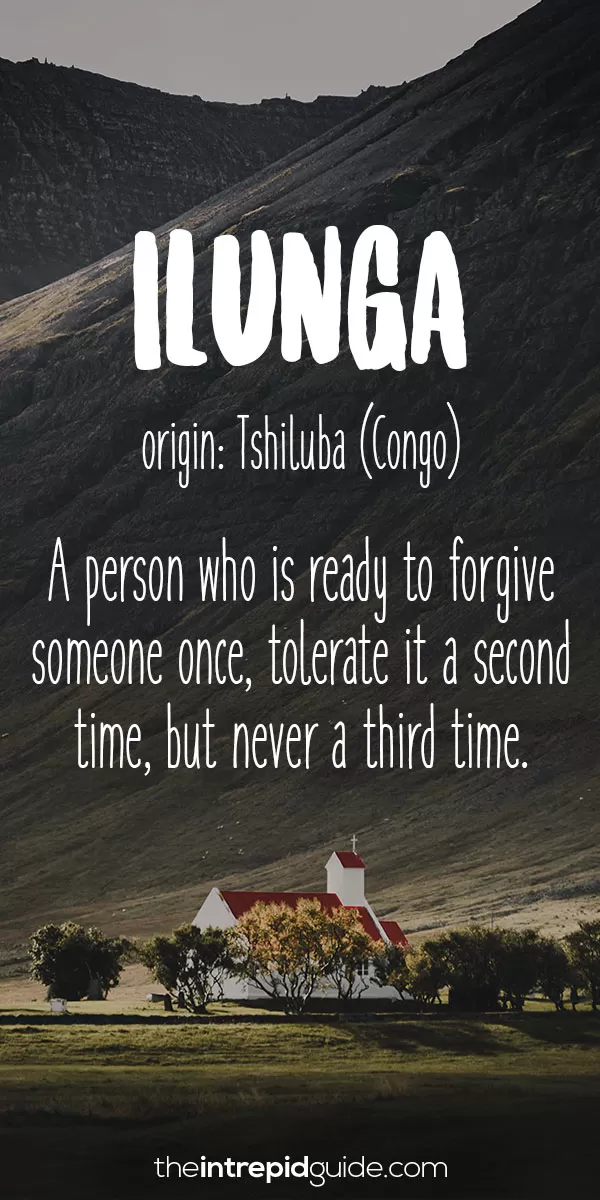
Tulu (Indian)
Karelu – The mark left on the skin from wearing something tight, such as jeans, socks, or a bra.
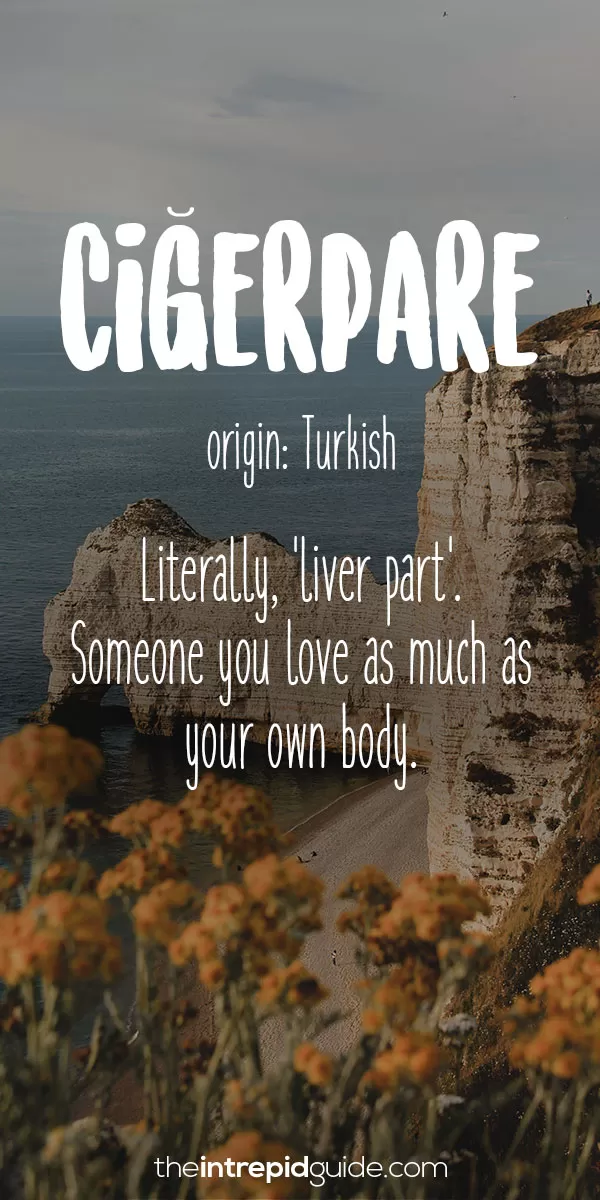
Goya – This Urdu word refers to a feeling of wonder and disbelief that accompanies a particularly realistic fantasy. The suspension of disbelief makes it seem so real that it temporarily becomes reality. This is usually associated with good storytelling.
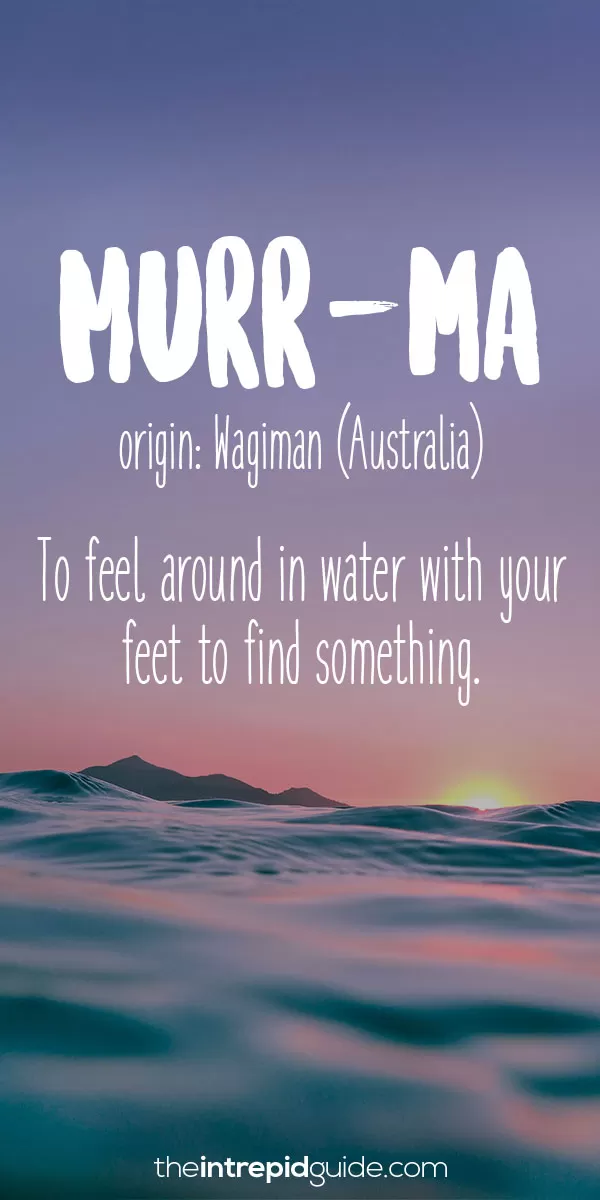
Glas wen – The literal translation is ‘blue smile’, and is used to describe a mocking sarcastic smile.
Hiraeth – Pronounced [here-eyeth] (roll the ‘r’), this beautiful Welsh word is much like the Portuguese saudade mentioned earlier or the Romanian dor , it conveys a feeling of homesickness, sense of regret, along with a general sadness over the lost or departed. This is a longing for one’s homeland, or even a romanticized past, with a yearning for it to come back.
Yaghan
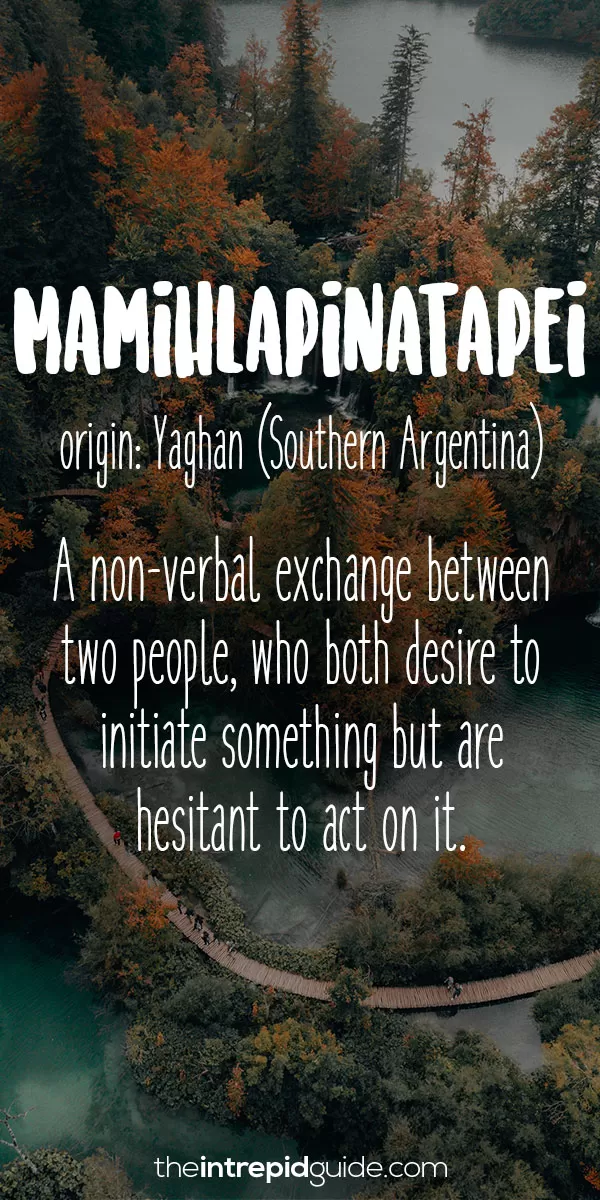
Shlimazl (שלימזל) – A chronically unlucky, usually inept, clumsy person.
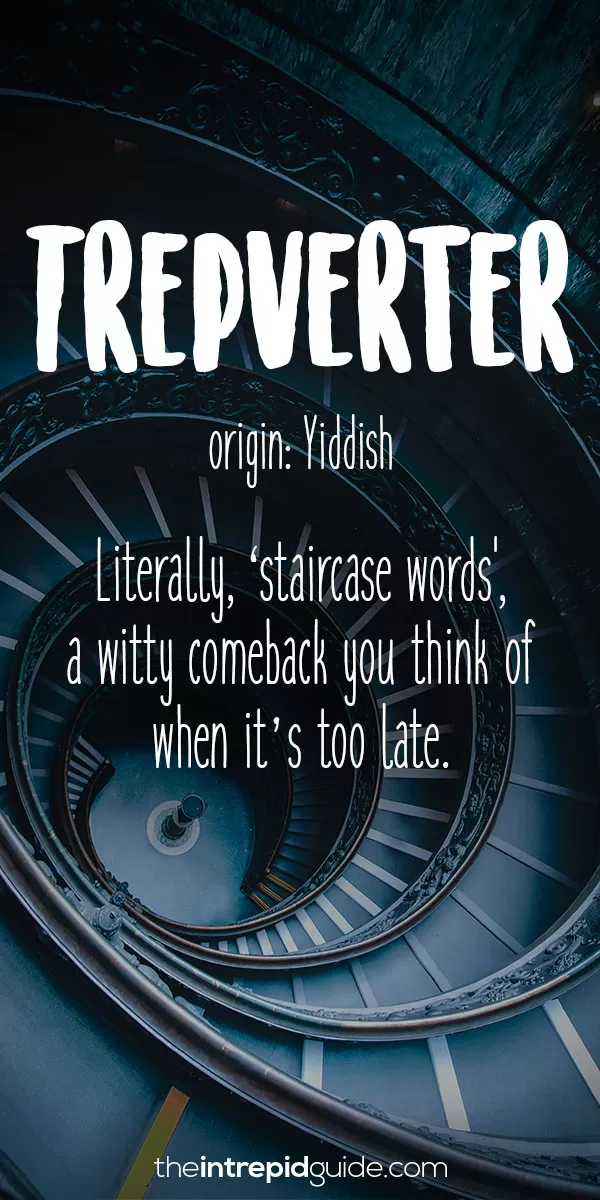
Luftmensch (לופֿטמענטש) – Luftmensch is used to refer a person with their head in the clouds. They are more concerned with airy intellectual pursuits than practical matters like earning an income. From the Yiddish לופֿט (luft, ‘air’) and מענטש (mentsh, ‘man’).
Farpotshket – Pronounced [fahr-POTS-SKEHT], farpotshket is when you or someone you trust tries to fix something but only ends up making things worse, causing irreparable damage. All you can do is shrug, knowing that you should’ve known better. Farpotshket also has an associated verb – potshky (POTs-ski), which means ‘to fiddle with something in a well-meaning and purposeful way, but with a complete lack of competence.’
Chutzpah – Is an untranslatable Yiddish word for adopting a ‘don’t-take-no-for-an-answer’ attitude where you’ll build up the guts to do something ballsy.
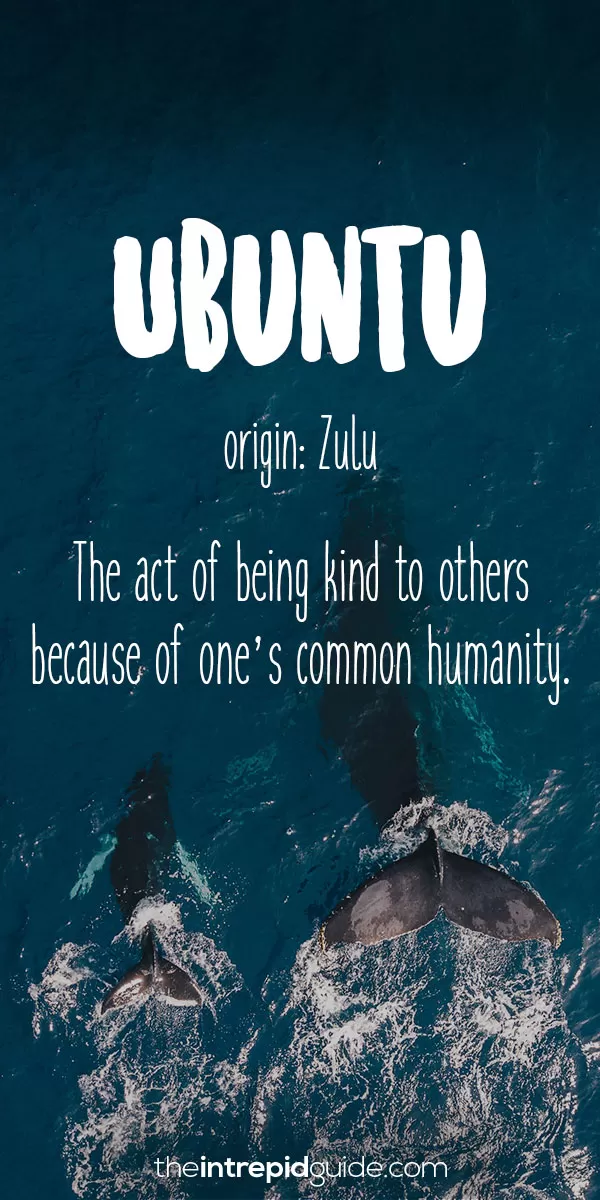
Over to you!
Which one of these words in your favourite? Was it the Malay, pisan zapra – the time it takes to eat a banana or the Portuguese cafuné – the act of tenderly running your fingers through someone’s hair. Share your favourites in the comments.
Can you think of any other ‘untranslatable’ words? Have you ever come across words and phrases that could not be translated into your native language? Let me know in the comments and I’ll add them to the list!
Want to know more about learning languages? Start here!
- 22 Top Language Learning Resources You Should Use
- How to Say ‘I Love You’ in 128 Different Languages [Ultimate A-Z Guide]
- How to Learn Languages Like Crazy, Even If You Have a Crazy Life [3-Step Method]
- 10 Proven Memory Hacks: How to Remember New Vocabulary Faster
- How long does it REALLY take to learn a language? [A Practical Guide]
- 18 Unexpected Advantages & Health Benefits of Learning A Foreign Language
- 23 Cool Gift for Language Learners They Will Actually Use and Love
- Memrise vs Duolingo: Which Language App is Best For You?
- Mondly Review: 10 Ways Mondly Drastically Improved My Language Learning
- 6 Language Learning Tips: How to Learn a Language from Home
- What Type of Language Learner Are You? Your 4-Step Personalised Learning Plan
- 44 Best Movies on Disney Plus for Learning Languages
- 13 Ways to Seamlessly Integrate Language Learning into Your Daily Life
- 10 Pro Tips: How to Learn a Language with a Full-Time Job
- 7 Reasons Why You Should Go on a Language Holiday
- Essential Travel Phrases: How to be Travel Fluent in 10 Simple Steps
- How to Learn Your First Foreign Language in 8 Simple Steps: A Beginner’s Guide
- 11 Life-Changing Reasons Why You Should Learn a Language
- 42 beautiful Inspirational Quotes for Language Learners
- Language learning tips: 11 Polyglots Reveal The Secrets of Their Success
- Top 10 Best Ways to Learn a Language Better and Faster
- How Many Languages are there in the World?
- 78 FREE Dictionaries to Learn a Language Fast [Free eBook Download]
- 22 KEY Travel Phrases That Will Transform Your Travels [Free Guide]
Like it? Pin it for later!

Michele creates language learning guides and courses for travel. What separates her from other instructors is her ability to explain complex grammar in a no-nonsense, straightforward manner using her unique 80/20 method. Get her free guide 9 reasons you’re not fluent…YET & how to fix it! Planning a trip? Learn the local language with her 80/20 method for less than the cost of eating at a tourist trap restaurant Start learning today!
18 Awesome Benefits of Learning a Foreign Language That’ll Blow Your Mind!
51 hilarious russian idioms that will make you giggle, 13 comments.
Michele, I hit your web-page by accident and found the Bengali word ঘোড়ার ডিম to be really really interesting. You are doing a fantastic job; have farther encouraged me move forward with at least learn another foreign language. Please keep up with the excellent job.
Best regards
I’m so happy to hear that Shameem :) Thank you :)
What about Swedish Dygn, mening 24h?
Great addition! Thanks Jan :)
The Norwegian Forelsket is the same in Danish, but spelled Förälskad in Swedish The concept of Norwegian Dugnad also exists in Finnish but in that language it’s called Talko
Thanks for sharing Jan :)
Spanish has another untranslatable word: ILUSION. It’s the feeling you get when something exciting is going to happen soon, like what a child feels waiting for their Christmas presents. The closest term is excitement, but this doesn’t quite capture the essence of ilusion, which has a more innocent, child-like “excited anticipation” :-)
Thanks for sharing Carmen :)
The norwegian word utepils could be translated into the finnish compound word “pussikalja”, literally “bag/pouch beer”. As in you buy the beer from a grocery store and then carry it in a plastic bag. Often implies company too, friends to hang around with.
Pussi: a bag or a pouch Kalja: beer.
Thanks for sharing Kimmo :)
The Maori word papakata would translate into Swedish as låghalt.
You could add to your (Swedish) Mormor/Farmor note that aunt according to the same system would be moster (mother’s sister) and faster (father’s sister) and uncle would be morbror (mother’s brother) and farbror (father’s brother).
Your Norwegian word pålegg exists also in Swedish with the same meaning, but is spelled pålägg, and in Danish where it’s spelled pålæg.
Perhaps also the Swedish word lokalsinne, meaning “good sense of direction” would make it?
Leave a Comment Cancel Reply
Save my name, email, and website in this browser for the next time I comment.
This site uses Akismet to reduce spam. Learn how your comment data is processed .

If you don't know where you are , how do you know where you're going? Find out how well you know Italian grammar today!

Around the world in 8 words: The changing language of travel
Not all those who wander are lost, and when it comes to travel, sometimes wandering is one of the most exciting things you can do. And if you live in the UK, you’re lucky enough to have access to many beautiful destinations on your doorstep.
In a time when travellers are both more adventurous and eco-conscious than ever, it’s no surprise that there’s a wealth of new vocabulary to describe how we travel, when we travel and how the experience makes us feel. Here are eight of our favourite travel words that you may not have heard before, including some new dictionary entries.
We’ve kicked off this blog with the humble staycation, ‘a holiday in one’s own country’. The term first became popular in the mid-2000s, when the global financial crisis meant people had less disposable income to spend on flash holidays and instead searched for cheaper local alternatives. Since 2020, the staycation is experiencing a resurgence. Benefits of staycations include cheaper travel costs, no spending hours in the airport and, of course, no need to worry about whether your passport expired last year.
Couch surfing
Once upon a time, if you wanted to meet new people on your travels, you could stay at a hostel or with a host on Airbnb. Now, you can couch surf. And not just in ‘the staying at various friends’ houses until you find a new place to rent’ sense (though that is still valid): couch surfing is quickly becoming a hot new travel trend. Travellers can now choose to couch surf all across the world via a dedicated website which treats travel as a cultural exchange, allowing people to connect with willing hosts and crash on their sofas.
Given that single-use and climate strike were selected as the Collins 2018 and 2019 Words of the Year respectively, it’s clear that the climate crisis is very much on everybody’s mind. This desire to make more sustainable choices is also impacting the way we spend our vacation days. Ecotourism is another popular travel trend, defined as tourism that is designed to contribute to the protection of the environment, or at least minimise damage. Examples of ecotourism include ditching short-haul flights, staying at eco-friendly resorts, or booking a staycation.
Perambulate
Have you ever perambulated over the hills or through the streets of a city? Spoiler alert, you definitely have. To say you are perambulating is a delightfully sophisticated way of saying that you are walking for pleasure or travelling by foot through a particular area. Perambulate comes from the Latin perambulare , which means to traverse. Some of history’s most famous perambulators include Virginia Woolf, Albert Einstein, Charles Darwin and Beethoven. You’re in good company.
Flashpacker
Flashpacking is the latest travel trend that brings a bit of glamour to typically unglamorous experiences. What comes to mind when you think of backpacking: questionable hostels, wet wipes, and sore shoulders? Flashpackers are backpackers with disposable income, ergo, the kind of travellers who are happy to spend a little more on a room with clean towels and book a direct train instead of three different coaches. No longer do you need to stuff your bag with as much underwear as you can carry because, as a flashpacker, you can splurge on dry cleaning.
Also known as a wanderer, a rover, or a rambler, a gadabout is defined as a person who moves about restlessly looking for the next fun activity. In the context of travel, this means you travel often or to many different places for the thrill of it. We particularly love this word because it has a long and vibrant history, with its use first appearing in the mid 18 th -century. It possibly stems from the Old English word gadling , meaning a companion or, later, a wanderer.
It’s not just backpacking that got a modern makeover. Camping is no longer the pursuit of the brave. Modern camping – or glamping – is all about the amenities. You may have come across the concept of glamping at music festivals such as Glastonbury, where music lovers with a taste for the finer things in life can get a hot shower and a tent the size of your average London studio flat. Glamping takes away all the pain of sleeping outdoors and guarantees you a good night sleep … almost.
Regardless of whether you like to spend your precious vacation days relaxing on a glorious beach or exploring a new city, we’re all looking for those magical moments in life. Funnily enough, there’s a word for that. Numinous is an adjective which captures the sense of something being mysterious or awe-inspiring. Originally used to describe moments of religious or spiritual wonder, it also perfectly encapsulates that feeling when you see a particularly breathtaking vista or a beauty spot that makes you realise just how big the world is on your travels. Looking for more travel-related word content? Check out our 7 mouth-watering foodie words with roots in other languages or the Despacito-inspired guide to Spanish
By Rachel Quin Rachel Quin is a freelance marketer and copywriter with a love of language, books and cats.
All opinions expressed on this blog are those of the individual writers, and do not necessarily reflect the opinions or policies of Collins, or its parent company, HarperCollins.
Related Articles
11 craic-ing words for st patrick’s day, spick and span – the annual spring clean, the etymology behind 4 eggs-ellent springtime words, tl;dr: social media terms you might not know, ghosts gather here the etymological history of halloween, other articles.
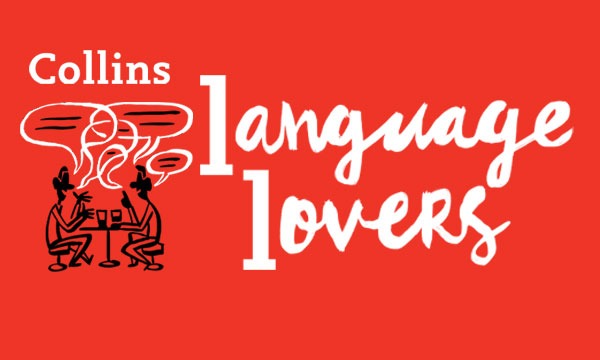
Formula One™ and the vocabulary of motor racing

Spanish words of the week: cubierta or cubierto?

The lazy, hazy days of summer
Sign up for the newsletter.
Get the latest news
Matador Original Series
39 essential phrases for travelers in 13 different languages.
(by Ellen Rabiner )
1. güle güle kullanin — “use it smiling” gewlay gewlay kooLAHnin — /gyleɪgyleɪku:lɑ:nɪn/
Almost any time someone buys something, güle güle kullanin — “use it smiling” — is an appropriate thing to tell them. It reminds me of when my grandparents used to say “wear it in good health” whenever I bought an article of clothing. I never heard anyone else in America use this phrase, so it must have come from somewhere in the “old country.”
2. kolay gelsin — “may it come easy” KOHLeye GELsin — /kolaɪgɜ:lsɪn/
When approaching someone who’s working, it’s nice to start with kolay gelsin , which means “may it come easy.” When approaching an employee at Turkcell or Turkish Airlines, for example, kolay gelsin sets a much better tone for your conversation than, “Do you speak English?”
3. aferin sana — “good for you” AHfairin SAHna — /ɑ:fɜ:rɪnsɑ:nɑ:/
As in, I tell people that God willing I will meet a Turkish husband, and the response is aferin sana — “good for you.” Or when someone says, “I’ve just learned 12 extraordinarily useful Turkish phrases,” the correct response is, of course, aferin sana .
4. Ich besorge das Bier – “I’ll get the beer” eeh bezorge das beer — /ɨx bɛzɔrgɘ das bir/
Besorgen means “to take care of,” and it’s used informally to mean get something or pay for something. Ich besorge das Bier (“I’ll get the beer”) is useful at Oktoberfest or any gathering with kiosks selling refreshments. After you use this phrase, your friend will probably offer to get the food. And when she asks whether you want Bratwurst or Knackwurst, you can answer, Das ist mir Wurst . You’re now punning in German!
5. das kannst du deiner Oma erzählen – “tell it to your Grandmother” das kanst doo dayner OHmah airtsaylen — /das kanst du daɪnər oma ertseːlɘn/
Das kannst du deiner Oma erzählen is the response to an unbelievable claim. For example, “I’m studying German three hours a day. I’ll be fluent in a week.” “Oh yeah? Das kannst du deiner Oma erzählen !”
6. nul acht funfzehn (0-8-15) — “standard issue / mediocre” nool acht FOONFtsayn — /nul ɒxt fʊnftsen/
The standard-issue rifle in WWI was a 0-8-15. The term caught on and is now used as a classy insult. I first heard this phrase from a friend describing a less than memorable sexual encounter. When she pegged it as nul-acht-funfzehn I thought she was talking about some obscure sexual position. What she was actually saying was, “meh.”
(by Agniezka Waluik)
7. 借过一下 Jie guo yixia – “Excuse me, let me through.” jie gwoh yi hsia
Do I need to stress the usefulness of this phrase in a country with a population of 1.3 billion people, who do not, as a rule, look around or step aside to let you get out of a bus? The last word is a softener, so you may skip it if need be.
8. 干吗 Ganma?! — “What the heck?!” gan mah
Enough of politeness. Sometimes you just run out of patience and you want to be able to express it. Ganma is your friend. A cabbie is taking you for a ride? A street vendor is obviously trying to fleece you? A scooter driver is honking at you even though you really can’t move aside? Ganma! This phrase will incur shock and awe — show them you’re not just another helpless tourist and you know what’s what.
9. 哪里 Nali — “Where?” nah lee
It’s a polite protestation when someone praises you; and you will be praised, whether for your exotic looks or great Chinese skills. Simply saying hello may earn you a good deal of admiration. Again: not a basic necessity phrase, but it will definitely bring out some smiles.
It’s one of those very local words that Chinese people — being brought up in a self-effacing culture — use all the time, but don’t really expect foreigners to know. Say it and you’re gaining a lot of credibility as a linguist, as well as a person who knows their manners.
Chinese (Mandarin)
(by Jocelyn Eikenburg )
10. Méi bànfǎ, rén tàiduō. – “There’s nothing you can do, too many people.”
In a country of 1.3 billion people, it only takes a small percentage of them to wreck your trip. When my Chinese husband and I traveled to Beijing during the national holiday in October, we spent half the day slogging through a mob that stretched across Tian’anmen Square just to get into the Forbidden City. I’ve also had to stand on crowded trains because I couldn’t get a seat and, while living in Shanghai, experienced my share of being sandwiched between anonymous butts and groins on rush-hour subway cars.
11. Zhēnde! Wǒ yìdiǎn dōu búkèqile! – “Really! I’m not being polite at all!”
Perfect for when people keep piling kung pao chicken into your bowl long after you’re full, or pouring you glass after drunken glass of baijiu — and think you’re just saying búyào (“I don’t want it”) to be polite.
Once, when a Chinese friend insisted I drink another round of Tsingdao, I had to repeat this phrase over and over while shielding my glass from his swinging beer bottle. Be ready to battle for your stomach and sobriety.
12. Fēi xià kǔgōngfū bùkě. – “It requires painstaking efforts.”
Some 5,000 tumultuous years of history have taught the Chinese that nothing comes easy. People usually say this when faced with any challenge, such as taking the national college entrance exams or pounding the pavement for a job.
It’s useful for climbing China’s mountains, squeezing into crowded transport, or walking into one of the noxious bathrooms at the train stations.
(by Tom Bartel )
13. Tonto(a) de remate – “stupid to an extreme degree”
Remate literally means a “rekilling” and is the word used when a soccer scoring shot bangs hard into the back of the net instead of just trickling over the goal line. I first heard it used by my friend Miguel to characterize his boss, Pedro.
14. Mas cara que espalda – “more face than back”
In English it means you have a lot of “cheek,” or perhaps “you’re a little big for your britches.” It takes a lot of cara , for example, to call your boss tonto de remate to his face.
15. Coger – “to take hold of”
When you hand someone something, you’ll say to them, coge , which just means “here, take it.” You use coger , for example, to say Esta mañana cogi el autobús (“This morning I caught the bus”).
In many countries other than Spain, however, coger means something entirely different. If you said that last sentence in Mexico City, you would have just said, “This morning I fucked a bus,” which would be confusing at best. Be careful.
16. ricevuto come un cane in chiesa – “to be unwelcome” reechayVOOtoh kohmay oon KAHnay een KYAYza – /ri:ʧevu:tɔ:kɔ:meu:nkɑ:nei:nkjezɑ:/
This is a colorful phrase meaning “received like a dog in church.” It’s similar to the English “like a whore in church,” but the alliteration in the “k” sounds of come , cane , and chiesa seem to give it more punch.
Example: What did your parents think of your Italian boyfriend arriving on his Vespa? L’hanno ricevuto come un cane in chiesa .
17. ogni morte di papa – “hardly ever” OHNyee MORtay di PApa – /ɔ:ŋi:mɔ:rtedi:pɑ:pɑ:/
Literally “every death of a pope,” ogni morte di papa is the equivalent of the English “once in a blue moon.” It seems so much more colorful to me because it conjures up visions of crowds mobbing St. Peter’s when a new pope is being chosen. How often do I go to Italy? Ogni morte di papa . Not nearly often enough.
18. non c’entra – “that’s irrelevant” non CHENtra – /non ʧɜ:ntrɑ:/
Entrarci is an extraordinarily useful verb, especially in the negative, when it means “that has nothing to do with it,” or, “this has nothing to do with you” (i.e., mind your own business). It’s also used in the interrogative: che c’entra ? Or che c’entri ? (what’s it to you?). If you disagree with the sentiment you simply counter with c’entra ! (does so!) or c’entro ! (it certainly does concern me!).
Example: È troppo caro . (It’s too expensive.) Che c’entrano I soldi ? Pago io ! (Forget money. I’m paying!)
(by Tim Patterson )
19. Mo da-meh. Yoh-para-chatta. Go-men. “No more, I’m already drunk, sorry.”
At some point during your stay, Japanese people will probably try to make you drink past your limit. That’s when this phrase comes in handy.
20. Ee-show ni kah-rah-o-keh ni ee-koh ka? – “Shall we go to karaoke together?”
This is a good line to use if trying to pick someone up from the bar. Think of karaoke as a transition point between the bar and the love hotel.
Note: Please don’t pronounce karaoke with lots of “EEE” sounds. It should sound like “kah-rah-o-keh,” not “carry-oh-key”.
21. Ara! Onara suru tsu-mori datta keh-do, un-chi ga de-chatta. – “Oops! I meant to fart but poop came out.”
Saying this useful phrase never gets old, especially in public places, especially on a first date, and most especially if it’s clearly one of only 10 Japanese phrases you’ve memorized.
When in Southeast Asia, I especially enjoy muttering in Japanese about crapping my pants while walking past Japanese tourists. The reactions are priceless.
(by Baxter Jackson )
22. Ana saeed Bush halas / Ana aheb Obama – “I’m glad Bush is gone / I like/love Obama.”
Both phrases will help you win the hearts and minds of Arab friends, but be warned — they still high five in the Middle East so get ready for some hand jiving.
23. Ana mohtam bil Islam – “I’m interested in Islam.”
If you’re interested in Islam (and I’m assuming you probably are if you’re traveling to the Middle East) saying Ana mohtam bil Islam will get you invites into Muslim homes faster than you can say apostasy.
24. Wahead sheesha nana/eyeneb/tufeh/zaloo min fadlak – “One mint/grape/apple/jasmine hooka please.”
Mutter this sentence in its entirety and your head will be soon be swimming in a mint, grape, apple, and jasmine cloud of tobacco.
(by Sarah Vazquez )
25. Umaleko paani / filter-ko paani – “boiled water / filter water”
Tap water is not safe to drink in Nepal. Simply ask Umaleko paani? or Filter-ko paani? It’s worth asking at least twice, because you need clean water to be a steadfast rule of your eating habits.
26. Pugyo – “full”
This is possibly the most useful phrase you will need to know. It’s very rude for a Nepali host to leave their guest with an empty stomach. When she comes around to give you a second helping and you’re already full (you will be full), hold your plate back and say with a big smile: Pugyo, Diddi. To be safe, hold a hand over your plate so she doesn’t dump food on it anyway.
27. Parchha / pardina – “I need / I don’t need.”
This a very useful phrase. Put a noun in front of parchha and you almost have a full sentence! For example: Ma umaleko paani parchha (I need boiled water).
(by Kelly Lalonde )
28. Hatari – “Danger!”
This could be a snake in the road or a warning about an endemic in the area. Take note and proceed with caution.
29. Shikamo – literally “I hold your feet.”
This greeting is for your elders. Young children will often mutter shikamo under their breath when you walk by. It may sound like “Sh…ooo.”
30. Pole – “I am sorry for your misfortune.”
This applies to everything from getting chalk dust on your clothes, to tripping, dropping an item, or sneezing.
Nigerian Pidgin English
(by Lola Akinmade )
31. Abeg – “please” (but usually not a repentant plea)
Example: Abeg! No waste my time! Which means, “Please! Don’t waste my time!”
32. K-leg – “questionable”
Example: Your story get k-leg! Which means, “Your story or gist sounds suspect or exaggerated.”
33. Wayo – “trickery”
Example: That man be wayo. Which means, “That man is a fraud!”
(by Chris Miller )
34. Ты сегодня выглядишь как огурец / огурчик – “You look like a cucumber / gherkin today.” Ty sevodnya vyglyadishʹ kak ogurets / ogurchik
Cucumber or gherkin, take your pick. It’s an old colloquial compliment. Saying to someone they look like either is to tell them they look fresh. Older women especially will appreciate this one.
35. Где туалет? Можно туалетную бумагу? – “Where’s the toilet? And may I have toilet paper?” Gde tualet? Mozhno tualetnuyu bumagu?
Get used to paying to use the toilet. And get used to asking for toilet paper. Restaurants and cafes in larger cities won’t charge to use the facilities, and they’ll have TP in the stalls. But a lot of places in suburban and rural areas — especially summertime cafes, train stations, and bus depots — have attendants working a window who will take your money and dispense TP to you upon entering the john.
Also, don’t try asking for a “bathroom.” If you’re understood they’ll think you’d like to have a shower.
36. Помогите пожалуйста! Я потерялся! – “Help please! I’m lost!” Pomogite pozhaluĭsta! Ya poteryalsya!
Traveling in Eastern Europe, you’re going to get lost. The streets are poorly marked, if marked at all. Some street signs haven’t even been updated since the fall of communism. Luckily, people are very helpful when it comes to giving directions.
Approach someone on the street and say Pomogite pozhaluĭsta! Ya poteryalsya! You probably won’t understand their answer, so be sure to have a map handy. But they’ll make sure you get where you’re going, even if they have to take you there themselves.
Portuguese (Brazilian)
(by Adam Roy )
37. Legal – “cool”
One of the most useful slang words in the Portuguese language, you can use legal to describe a whole host of things. People can be legal , as can clothes, places, and, ironically, gangster rap.
38. É o jeitinho brasileiro. – “It’s the Brazilian way.”
How can Brazil be the world’s largest Catholic country, the world’s party capital, and an industrial giant to boot? Why did Brazil lay out its capital in the shape of an airplane and stick it in the middle of nowhere? The answer is simple: É o jeitinho brasileiro .
39. Como vai, gatinha? – “How’s it going, baby?” (literally “kitten”)
A pretty simple pickup line. I take no responsibility for what happens if you actually try to use it.
Trending Now
I practiced german on duolingo for 2 months for a 7-day trip. was it worth it, discover matador, adventure travel, train travel, national parks, beaches and islands, ski and snow.
We use cookies for analytics tracking and advertising from our partners.
For more information read our privacy policy .
Matador's Newsletter
Subscribe for exclusive city guides, travel videos, trip giveaways and more!
You've been signed up!
Follow us on social media.
- New Zealand
- Greek Mythology
- Entertainment
- The Olympic Game
- 12 Super-Rich Members
- 9 Muses of Greek Gods Paradise
- Gifts, Wills and Bequests
- Book Your Adventure!

20 of the Most Beautiful Travel Words and their Unique Greek Origins
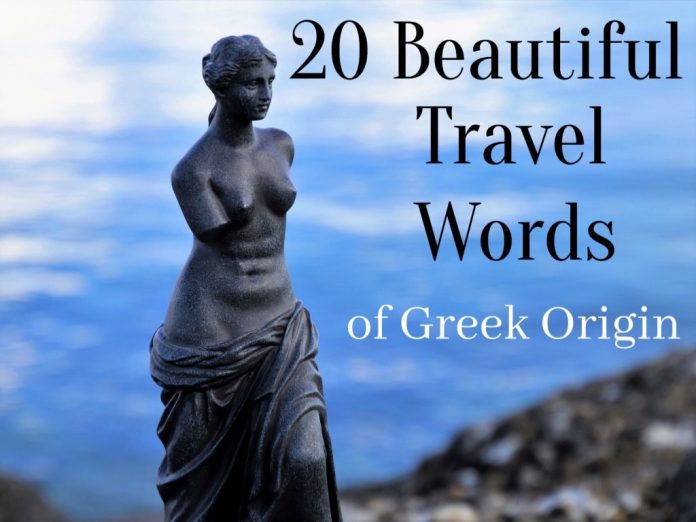
Beautiful travel words of Greek origin inspire and give meaning to all types of travel experiences.
By knowing about these Greek-related travel words, you will, in effect, gain a greater insight into the world of travel, especially when visiting Greece.
All of these beautiful travel words have something special about them.
It could be how a word sounds, the feelings, and wanderlust they inspire, the beautiful images they bring to mind, or some special uniqueness that makes them memorable.
The Most Beautiful Travel Words of Greek Origin
One thing is for sure, this list of the most beautiful travel words with unique Greek origins will expand your vocabulary—which is always a good thing.
I’ve also included another list of travel words at the end of this list (after the 20 most beautiful travel words) that didn’t make it into the top twenty.
The reason for doing this is so you can fully appreciate all the Greek-related travel words I considered for inclusion in this list of beautiful travel words.
It wasn’t easy to settle on these twenty best travel words of Greek origin, but I’m happy enough with the result.
Have a look and see what you think.
1. Aegean Sea – Travel Words
Origin: Greek
A beautiful word that brings to mind a few of the most beautiful Greek Islands , including Santorini, Mykonos, and Crete—to name a few.
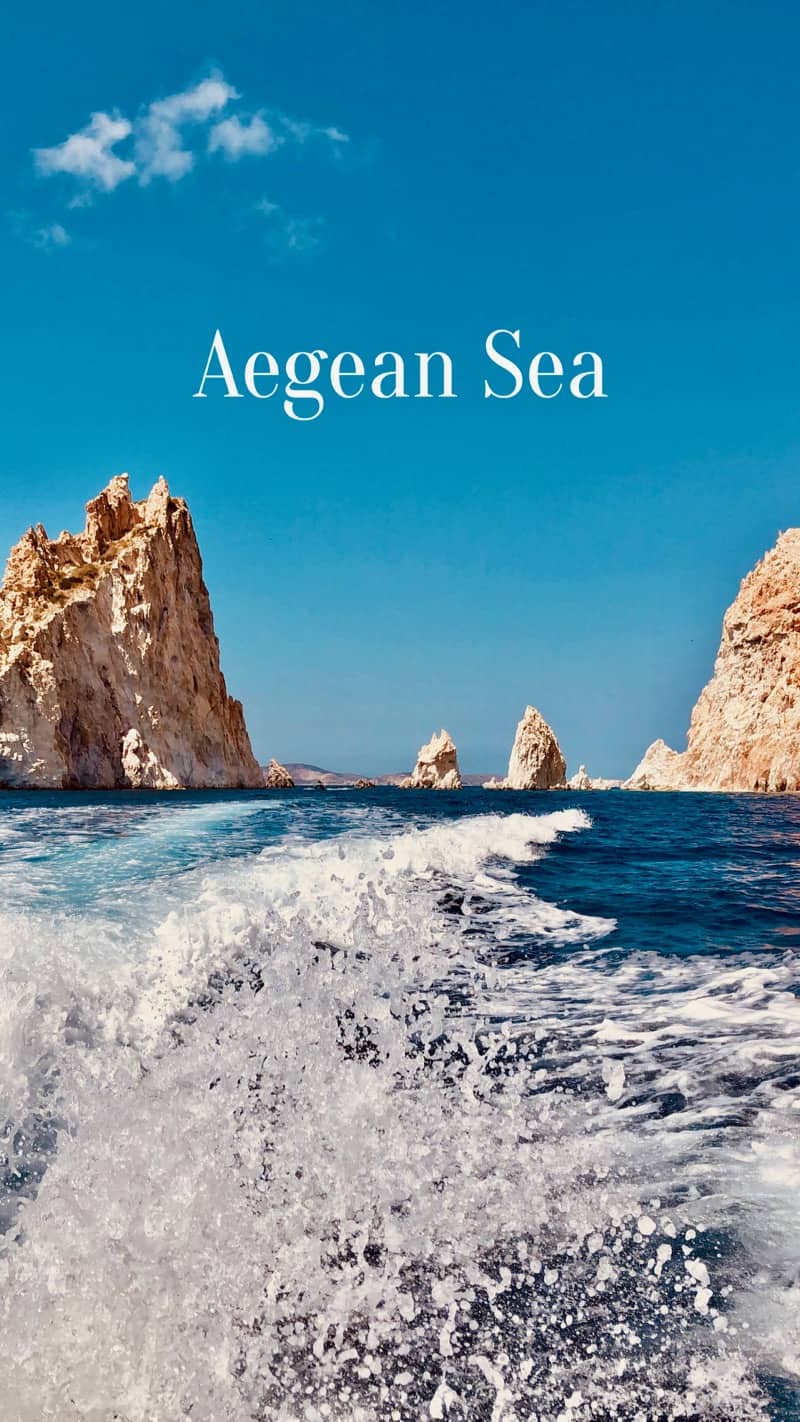
“Happy is the man, I thought, who, before dying, has the fortune to sail the Aegean sea.” – Nikos Kazantzakis.
According to Greek Mythology, the Aegean Sea owes its name to an ancient King of Athens, Aigeas (Aegeas).
Aegeas was the father of the famous Greek hero, Theseus, who slew the Minotaur on the island of Crete.
When returning to Athens, Theseus sailed back to Athens with black sails after forgetting to change the ship’s sails to white ones.
As a result, his father thought it meant that his son hadn’t survived the ordeal. The fateful error led to the King’s tragic death since he decided to end his life by jumping into the sea.
Eventually, the surrounding sea would become known as the Aegean Sea.
Aegean Airlines also took its name from the same source.
The word Athens immediately conjures up beautiful images of The Parthenon.
Most overseas travelers first arrive by plane to Athens when they vacation in Greece.

The city received its name from the Goddess Athena.
In Greek Mythology, Athena and Poseidon had a contest to see who would become the patron of the Greek city.
Athena gifted the people the olive tree, while Poseidon made a spring gush forth from rocks.
Athena’s gift was deemed the best of the two by the people, so the city was named in her honor.
I had to include this word as one of the most beautiful travel words of Greek origin.
Athena, the Goddess of wisdom, is also beautiful, as proven by the famous beauty contest between Aphrodite, Athena, and Hera.
It wouldn’t have been smart on my part not to have included Athens in a list of the most beautiful travel words.
An atlas is a collection or book of maps, but it’s also an airline company.

According to Greek legend, Atlas was a Titan condemned to carry the heavens upon his shoulders.
The Titan Atlas is the reason why we can all travel around and explore the world.
4. Eleutheromania
Have you ever felt the intense desire for freedom? Well, the word for this feeling is Eleutheromania.

It’s similar to the feeling of wanderlust in different languages. Travel is one way that makes people feel free, and eleutheromania is the desire for that feeling.
It comes from Ancient Greek ἐλευθερία (eleuthería, ‘freedom’) plus -mania.
It’s another word for Paradise!
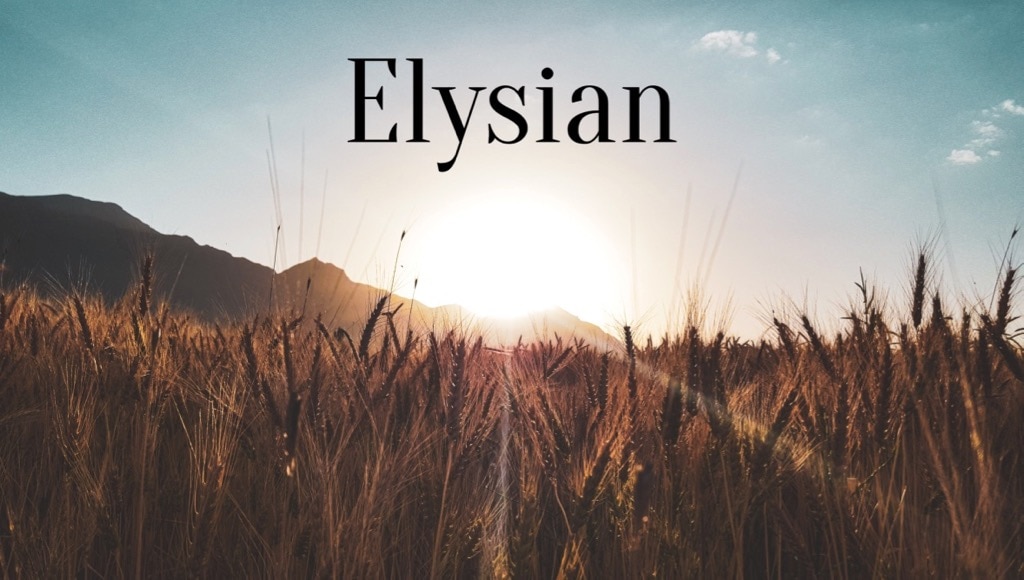
Greek Mythology deemed the Elysian Fields as being a heavenly resting place after death.
It was seen as the go-to-place in the afterlife. Sadly not everyone was allowed entry into Olympus, the home of the Gods.
One of France’s main streets is named after this heavenly abode, the Champs-Élysees in Paris.
The street is famous for connecting the Arc de Triomphe with the Place de la Concorde. Many consider it to be one of the world’s most famous commercial streets.
Elysian has to be one of the most beautiful travel words because everyone wants to end up in paradise one day. At least you can visit it in Paris.
6. Eudaimonia
It’s that happy feeling you get when you travel.

Feeling great when traveling, then the Greek word that describes it is eudaimonia.
It comes from Greek philosophy that has been translated as meaning happiness or well-being.
It has to be one of the biggest reasons why many people love traveling and exploring new places.
Europe is where it’s all at. You have Greece, Italy, and so many other great countries to visit.
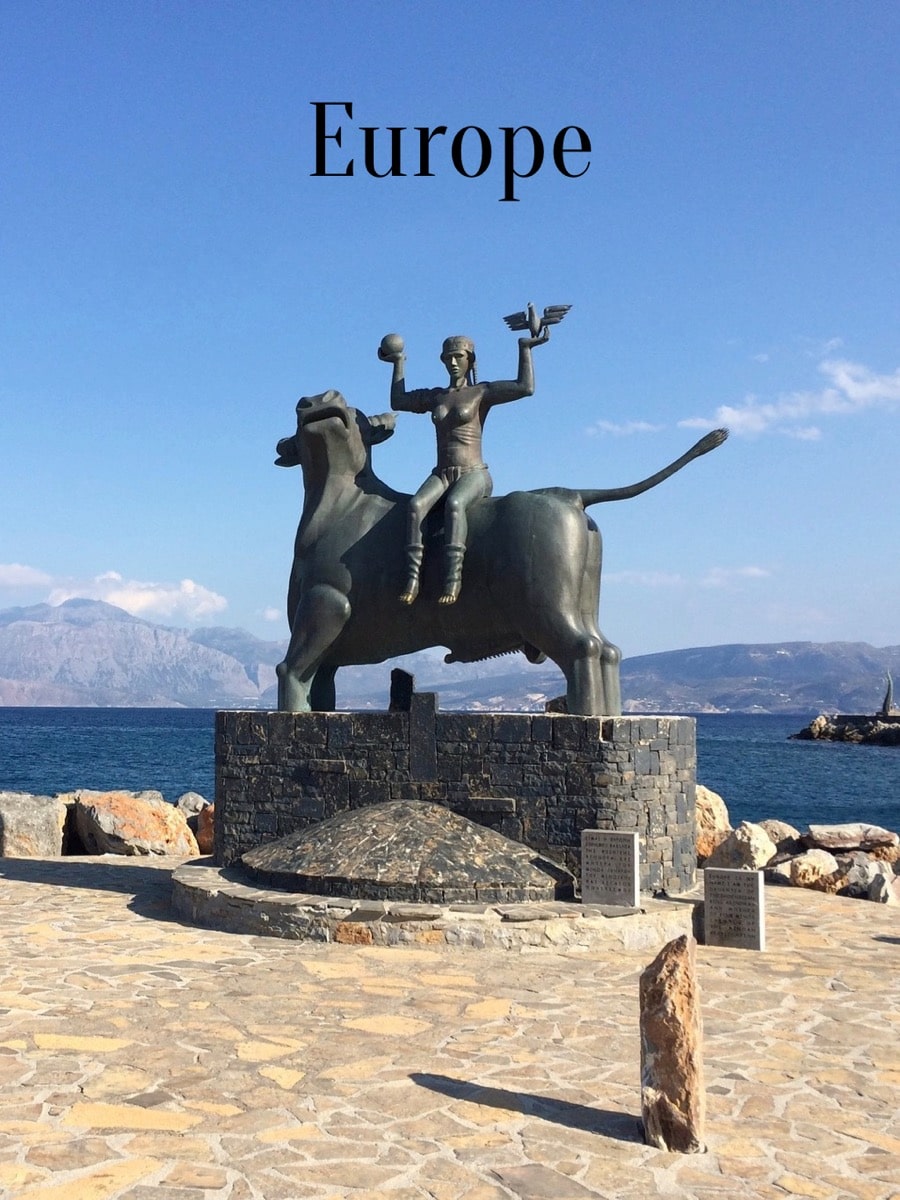
It all started with Europa, the mythological princess who ended up being seduced by Zeus.
Zeus took her to the island of Crete across the ocean after the princess sat on his back while he was disguised in the form of a beautiful white bull.
At the time, she had no idea that it was really Zeus, the king of the Gods.
No one could have foreseen that Europa would bestow her name to a group of countries that would one day be known as Europe.
It has become one of the most sought out travel destinations globally, and it all started with a weird sea voyage of her own.
You have the world, and then you have the Galaxy.

It all started with the Milky Way, which is based on the Greek myth of Heracles, who, as a child, spilled some milk.
The word is derived from the Greek galaxias (kuklos) ‘milky (vault)’, from gala, galakt- ‘milk.’
I thought about it carefully, but I couldn’t leave Greece out from this list of beautiful travel words.
Greece is where many tourists dream of visiting, especially during the Greek summer.
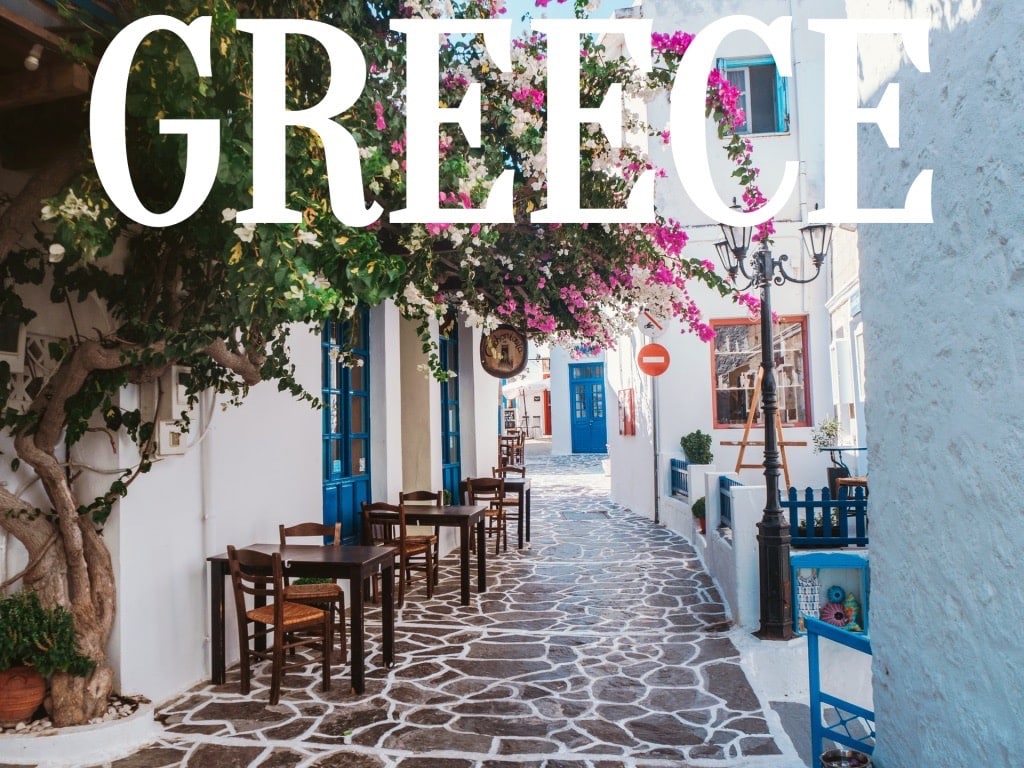
Aristotle used the term “Graiko” as the name for the first inhabitants of the region.
It was later adopted by the Romans and turned into “Graecus,” a Latin word, to describe the people on the land now known as Greece.
10. Greek Islands
If there is one word better than Greece, then it would have to be the Greek Islands.
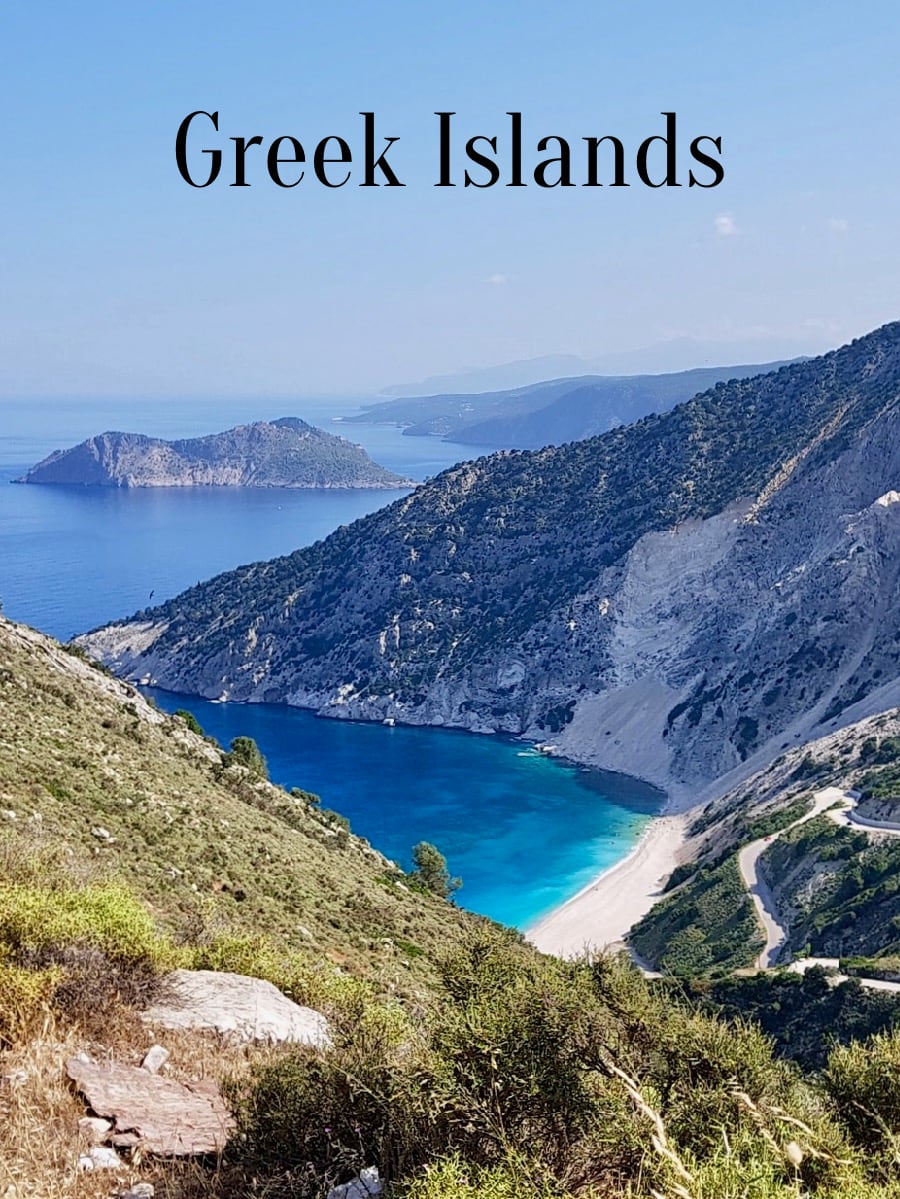
Santorini and Mykonos come to mind immediately when thinking about the Greek Islands.
With 227 inhabited Greek Islands to explore, and the rest, which number from 1200 to 6000 depending on the minimum size you consider, there’s something for everyone.
Once you’ve visited one of the best Greek Islands, you’ll be hooked forever.
11. Halcyon
The English word “halcyon ” describes an idyllically peaceful and perfect time that occurred in the past.
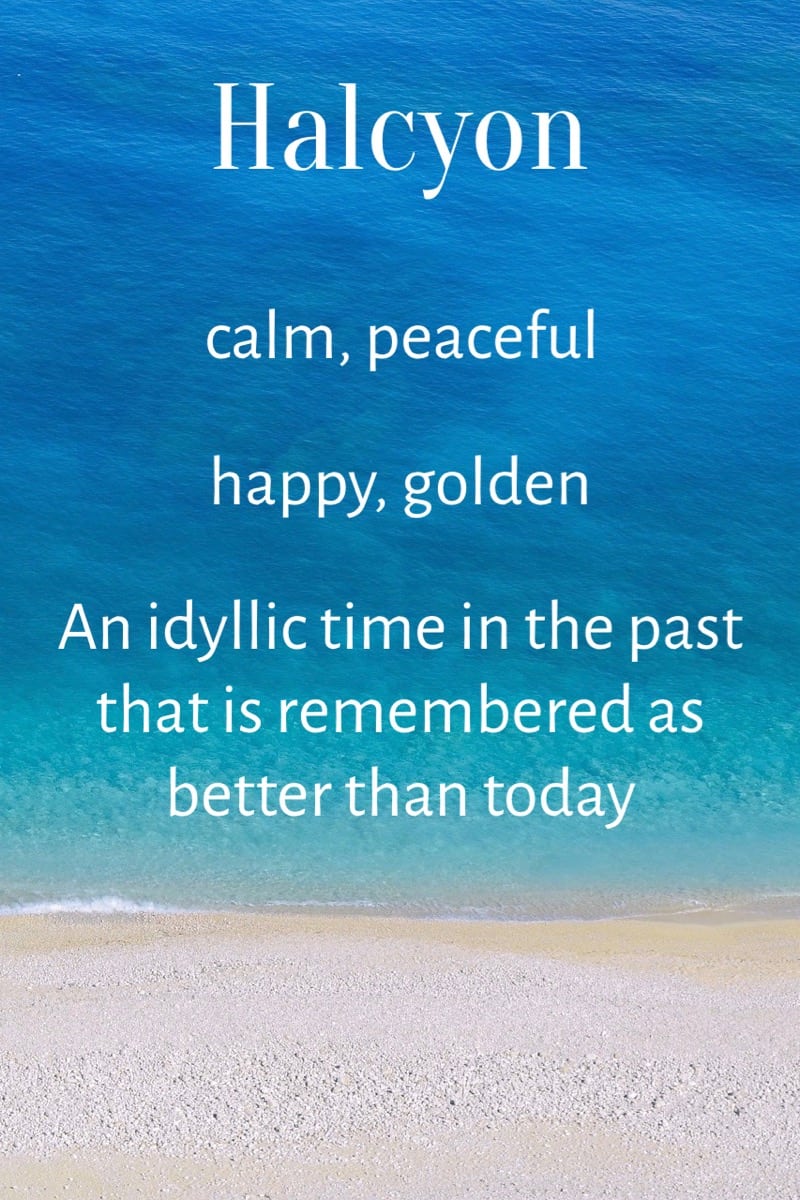
Halcyon means “kingfisher” in Greek.
A halcyon was a legendary bird in Greek Mythology that made its nest on the Aegean Sea. As the daughter of Aeolus, the god of winds, the bird possessed the power to calm the rough winds and waves.
The name of the God of travel deserves a place in the most beautiful Greek travel words for obvious reasons.

In Greek ἕρμα (herma) means “cairn, a pile of stones, boundary marker.”
13. Hodophile
If you love to travel, you can consider yourself a Hodophile.
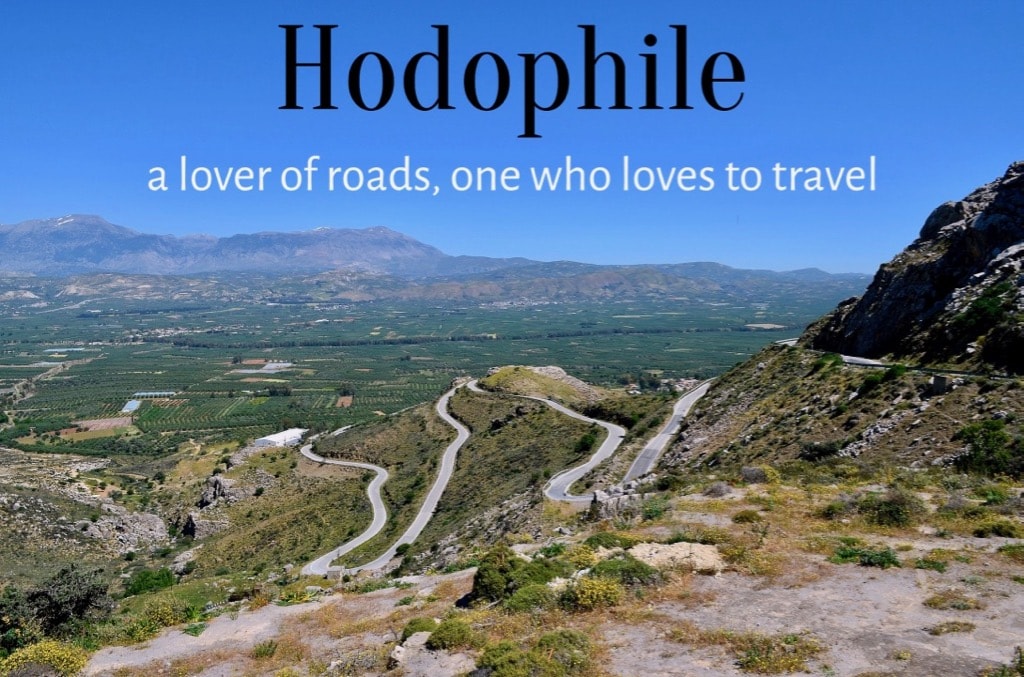
A lover of roads, one who loves to travel.
This word is derived from Ancient Greek ὁδός (hodós), which means travel.
How can a relatively unknown Greek Island be one of the most beautiful travel words?
Well, it’s all due to one of the most beautiful and famous travel poems of all time.

Ithaka Poem
As you set out for Ithaka hope your road is a long one, full of adventure, full of discovery. …
15. Odyssey
In ancient Greek times, the most famous journey would have to be the one described in Homer’s epic poem “The Odyssey.”
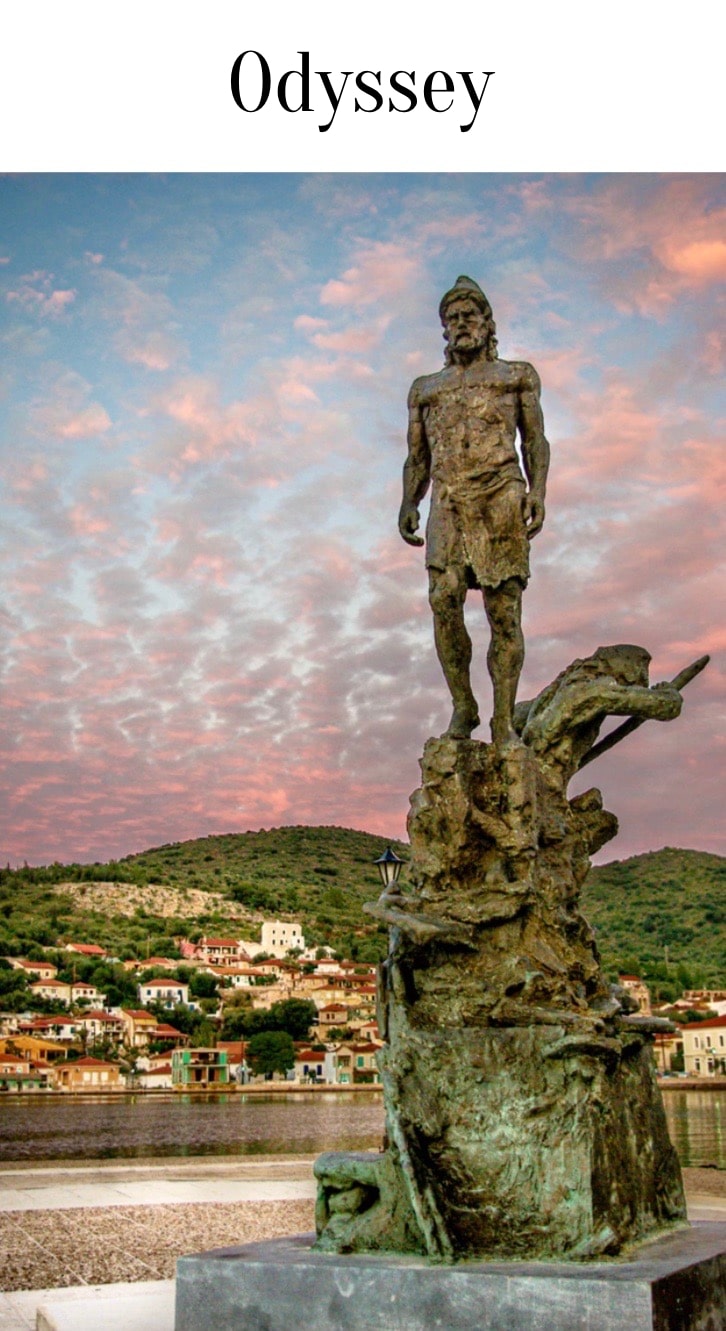
It took the Greek hero Odysseus ten years to return home after the Trojan War had finished.
16. Peripatetic
Someone who wanders from place to place, living a nomadic existence.
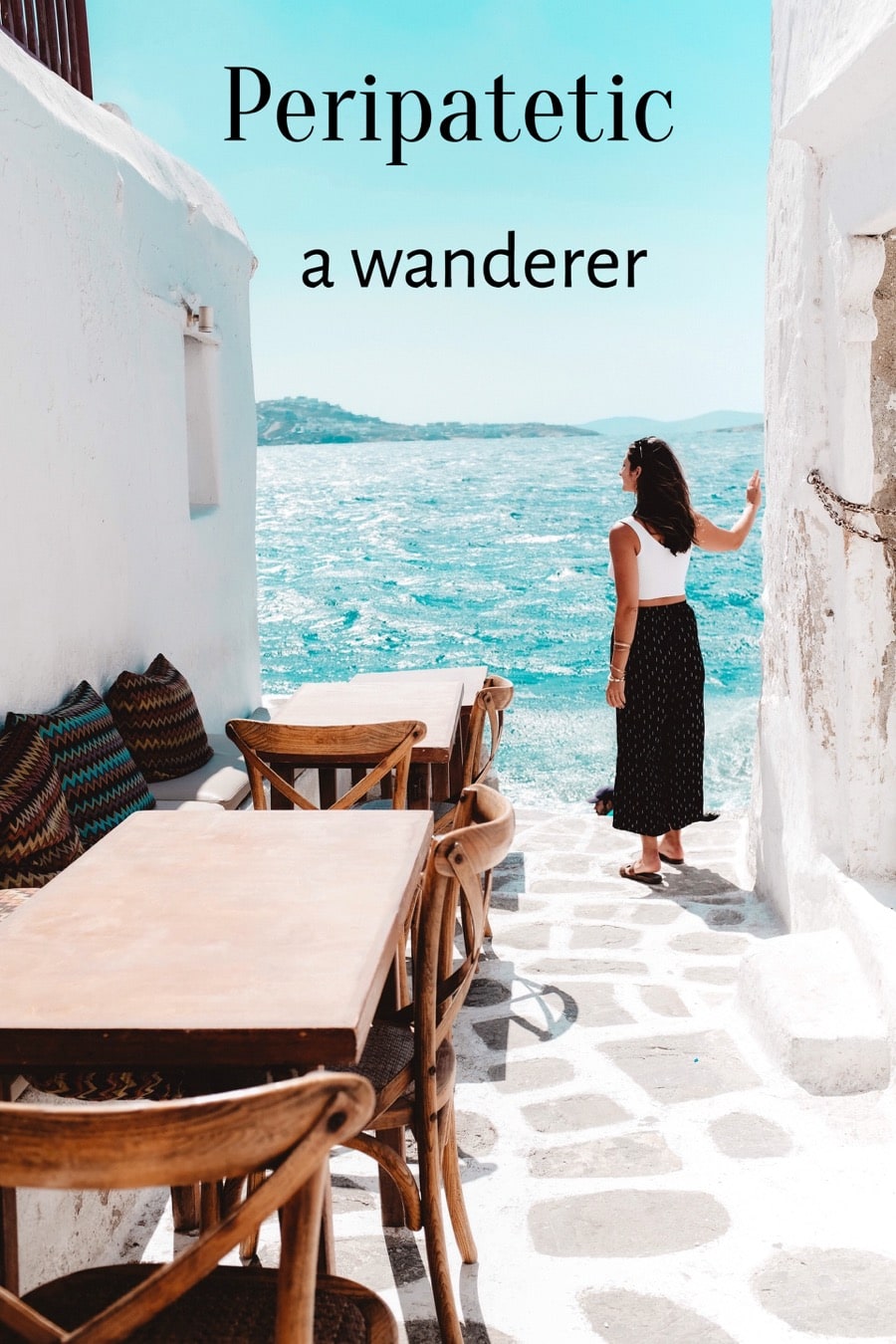
This word is traced back to the time of Aristotle and his followers. The philosophers often walked around peripatos (covered walk in the Lyceum) where Aristotle held his lectures.
It comes from the Greek word peripatētikos. From peripatein, meaning “to walk up and down.”
17. Santorini
Beautiful images of Santorini are often used in advertising and tourist brochures to get you thinking about taking a trip to Greece.
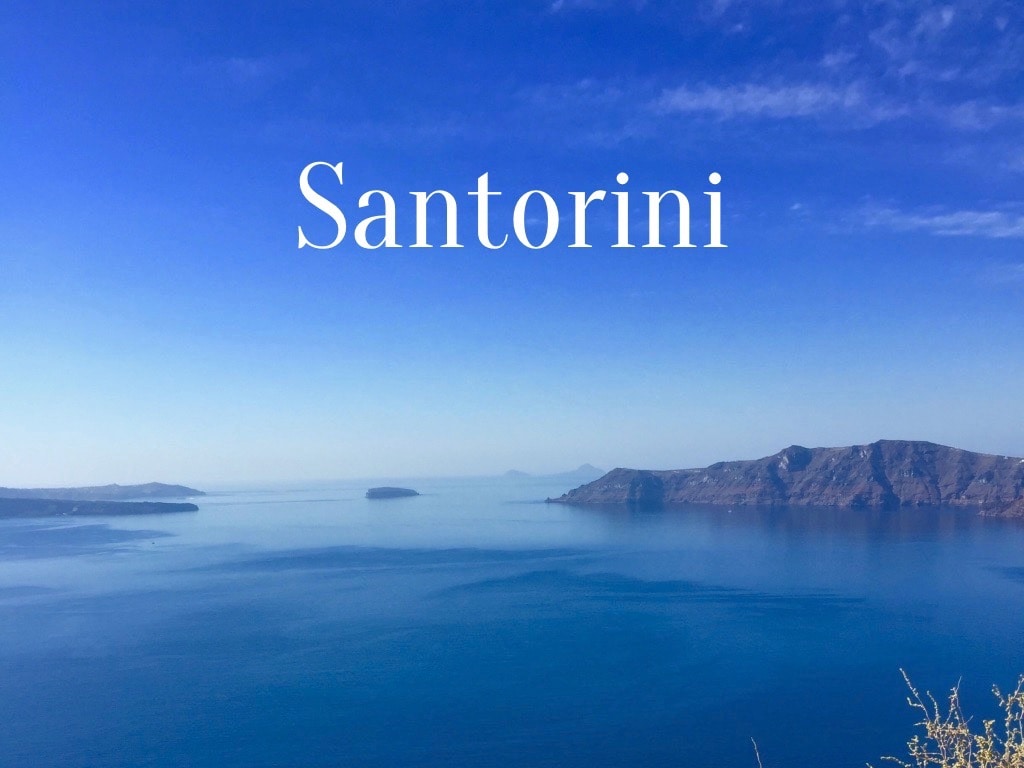
Ok, so it’s not a Greek word, but the island is in Greece, and it’s the most beautiful Greek Island in my opinion, so here it has to be.
18. Strikhedonia
If you ever felt like saying to hell with it, then you may be surprised to know that there’s actually a word for it. That word is strikhedonia.

It’s a popular Greek word associated with travel! That’s because many travelers and bloggers have done such a thing. To hell with it! I’ll quit my job and go traveling.
Obviously had to come from the Greeks.
19. Thalassophile
For all of you beach lovers out there, this is what you are, a Thalassophile.
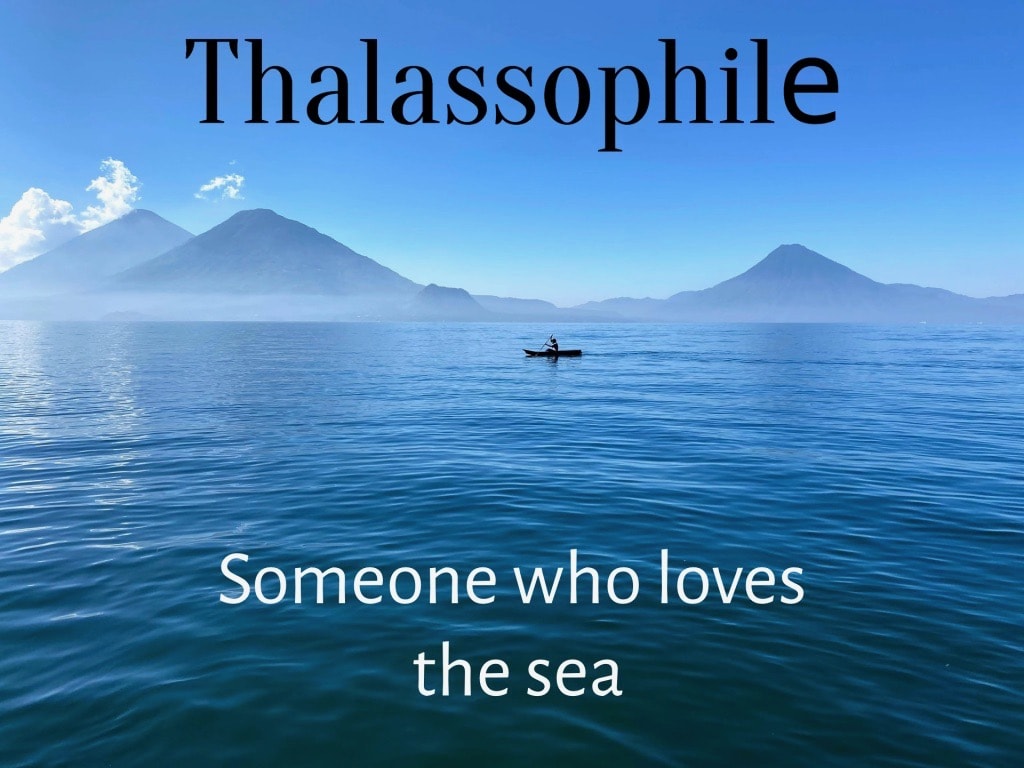
Derived from the Greek words θάλασσα / thalasso (sea), and -phile, from Greek philos ‘loving’.
20. Xenophilia
Someone who is attracted to foreign peoples, foreign cultures, manners, and/or customs.
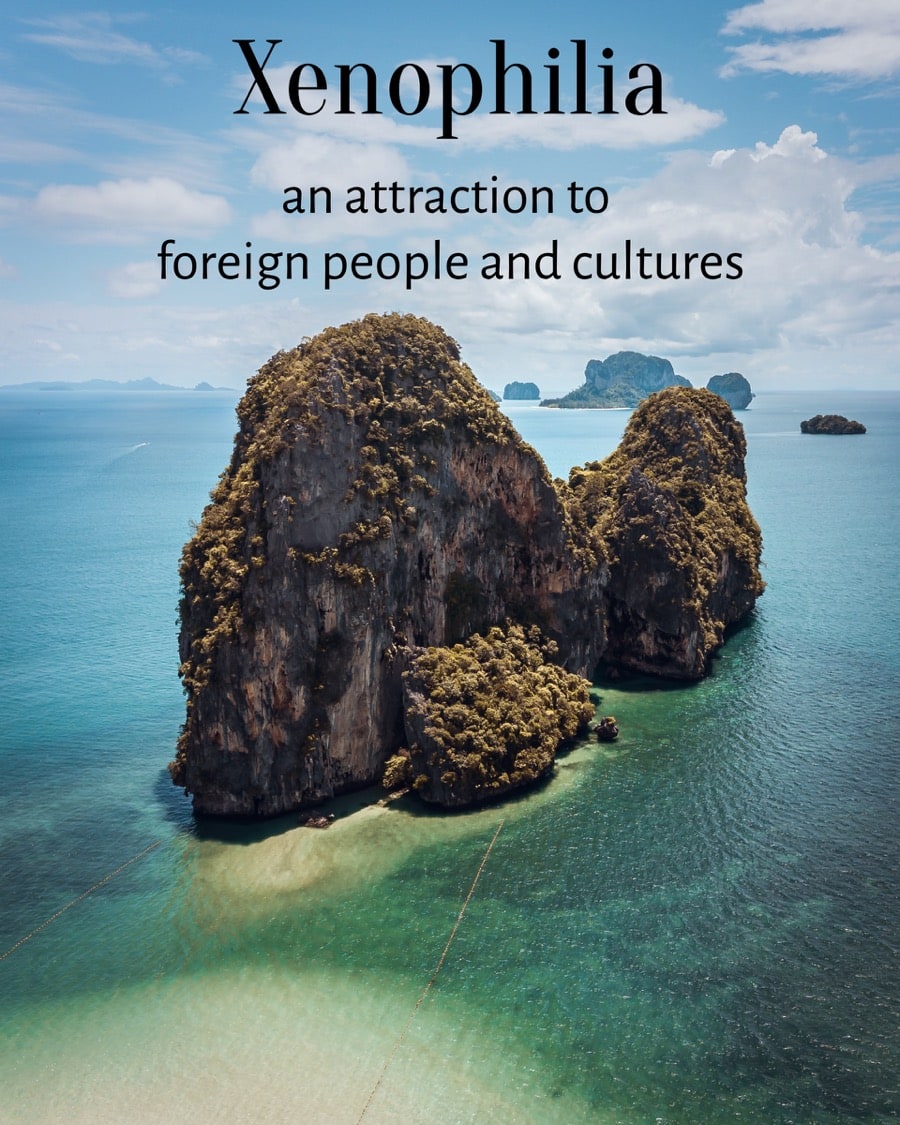
It’s the reason why so many of us pack our bags to go traveling. Foreign things make travel experiences so much more interesting.
This unique travel word comes from the Greek “xenos,” meaning “stranger, unknown, foreign,” and “philia,” defined as “attraction or love.”
The beauty of this word is that it has the opposite meaning of being a Xenophobe.
Xenophobe describes a person that dislikes or is prejudice against people from other countries. No one wants to be known as a Xenophobe.
For this reason, I include Xenophilia as one of the most beautiful travel words.
Travel Words with Greek Origins that missed out
Acatalepsy – the idea that it is impossible to understand anything, which includes travel experiences.
Airplane (Aeroplane) – from the Greek ἀήρ (aēr), “air” and either Latin planus, “level,” or Greek πλάνος (planos), “wandering”.
Anemoia – a nostalgic sense of longing for a past you yourself have never lived. Maybe you were born in the wrong time period, or maybe you love something about a certain decade in time, like the music.
Aragma – The act of chilling. When the Greeks say ‘pame gia aragma spiti sou, ‘it means ‘let’s go chill at your place.’
Cosmopolitan – can be traced back to Pythagoras, who first used the Greek word kosmos to describe the order of the universe.
Erotic – from Eros, the Greek God of desire.
Eunoia – beautiful thinking.
Iris – Goddess of the rainbow.
Meraki – putting a part of yourself (your soul) into what you’re doing with complete focus and love.
Museum – from the nine Muses who presided over the arts and sciences.
Music – literally means the art of the Muses.
Nemophilist – lover of the woods.
Peratzatha – people-watching.
Philoxenia (Filoxenia) – literally translated as “friend to the stranger” / hospitality.
Taxidi – the Greek word for trip or journey.
I’m sure you would have learned a new word or two for this extensive list of beautiful travel words.
Pin it … Share it
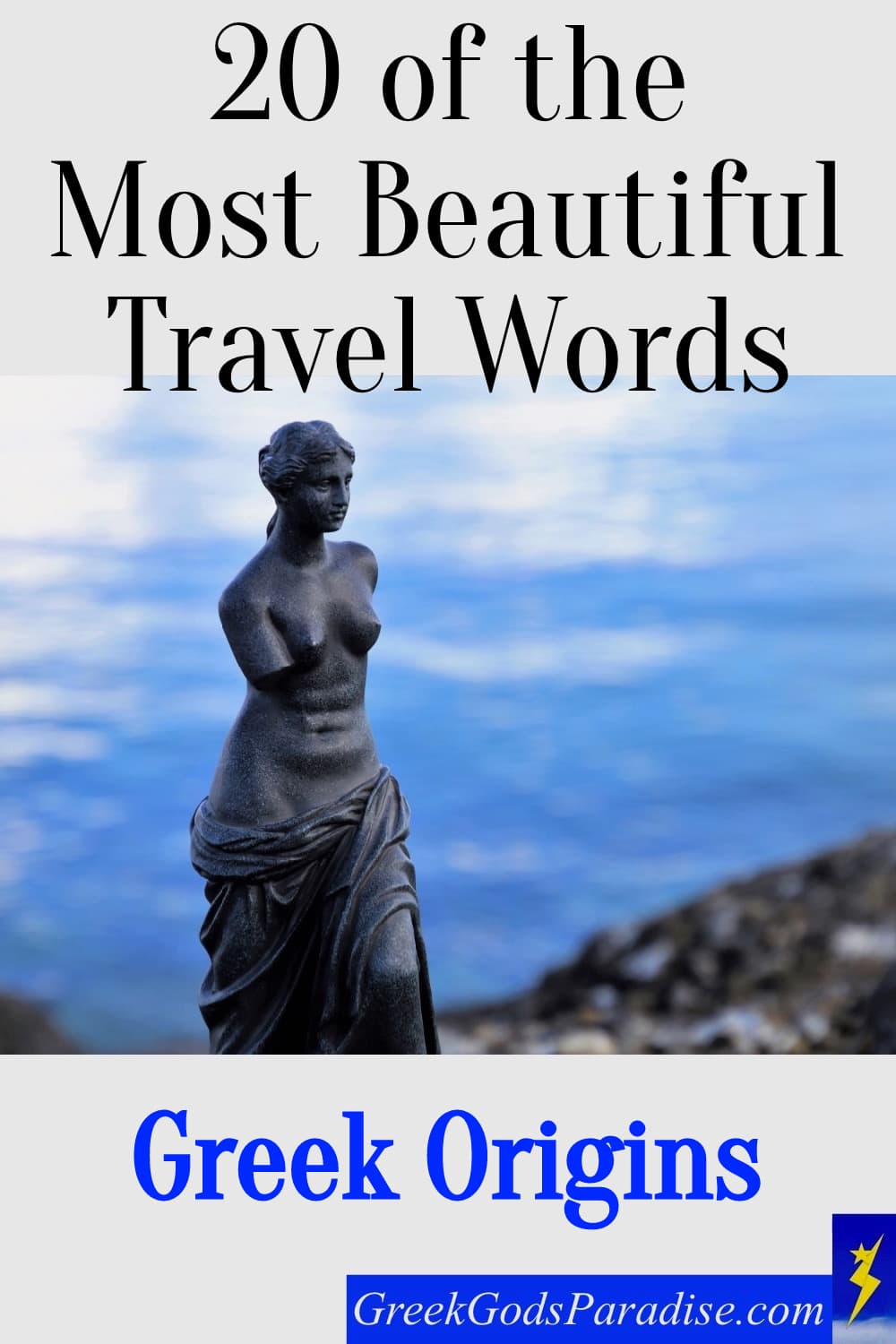
RELATED ARTICLES MORE FROM AUTHOR

Yanis Varoufakis: A Bold Comic-Cartoon Dive into Political Satire!

Ubud MONKEY FOREST Travel Guide: Exploring Wildlife, Culture, and More

21 Best BALI Beaches: Nicest, Prettiest to Most Beautiful

20 English words you might not know came from other languages

More From Forbes
On fox, donald trump calls climate change a ‘hoax’: ‘in the 1920’s they were talking about global freezing’.
- Share to Facebook
- Share to Twitter
- Share to Linkedin
Fox Business host Stuart Varney interviews Donald Trump on "Varney & Company"
In an exclusive interview Monday on Fox Business Network’s Varney & Company Monday, Donald Trump told host Stuart Varney that climate change is “a hoax.” The former president said “in my opinion, you have a thing called weather, and you go up, and you go down,” he said. “If you look into the 1920s, they were talking about a global freezing, okay? In other words, the globe was going to freeze.”
“And then they go global warming,” Trump continued. “Then they couldn’t use that because the temperatures were actually quite cool. And many different things. So now they just talk about climate change. The climate’s always been changing.”
The suggestion that the earth was “going to freeze” in the early 20th Century is an oft-repeated claim, but one that isn’t supported by science, writes Doug Struck in Scientific American . Struck noted that while it’s true that “there had been a gradual decrease in global average temperatures from about 1940,” the climate’s not “always changing” as Trump argued—at least, not naturally.
Struck cites Mark McCaffrey, programs and policy director of the National Center for Science Education based in Oakland, Calif., who says it’s precisely because of the human impact that the planet is warming, not cooling. "If it weren't for the fact that humans had become a force of nature, we would be slipping back into an ice age, according to orbital cycles...the stories about global cooling ‘are convenient for people to trot out and wave around,’ McCaffrey explained, but they don’t support Trump’s argument that climate change is a hoax.
Best Travel Insurance Companies
Best covid-19 travel insurance plans.
CLEVELAND, OHIO - SEPTEMBER 29: U.S. President Donald Trump participates in the first presidential ... [+] debate against Democratic presidential nominee Joe Biden at the Health Education Campus of Case Western Reserve University on September 29, 2020 in Cleveland, Ohio. This is the first of three planned debates between the two candidates in the lead up to the election on November 3. (Photo by Win McNamee/Getty Images)
In the wide-ranging interview, Trump told Varney he believes the 2024 election—he has hinted, but not explicity said he would be a candidate—would be decided over the 2020 election. “I actually think it is good for me,” Trump said, “I think if we don’t put out all of the crooked things we know what they are, that you won’t win in ’22 and you won’t win in ’24 if we don’t get to it.”
“You think 2022 and 2024 are all about the 2020 election, really?” Varney asked, pressing Trump, saying “if we go into 2022, the elections, and 2024, you’re still looking back to the election of 2020 saying that you really won, I don’t know if that’s very good for you or the Republican Party,” Varney told Trump.
“I think if we don’t put out all of the crooked things we know what they are, that you won’t win in ’22 and you won’t win in ’24 if we don’t get to it,” Trump said.

- Editorial Standards
- Reprints & Permissions

Sweeping Raids, Giant Camps and Mass Deportations: Inside Trump’s 2025 Immigration Plans
If he regains power, Donald Trump wants not only to revive some of the immigration policies criticized as draconian during his presidency, but expand and toughen them.
Donald Trump wants to reimpose a Covid 19-era policy of refusing asylum claims — this time basing that refusal on assertions that migrants carry other infectious diseases like tuberculosis. Credit... Doug Mills/The New York Times
Supported by
- Share full article

By Charlie Savage Maggie Haberman and Jonathan Swan
- Nov. 11, 2023
Former President Donald J. Trump is planning an extreme expansion of his first-term crackdown on immigration if he returns to power in 2025 — including preparing to round up undocumented people already in the United States on a vast scale and detain them in sprawling camps while they wait to be expelled.
The plans would sharply restrict both legal and illegal immigration in a multitude of ways.
Mr. Trump wants to revive his first-term border policies, including banning entry by people from certain Muslim-majority nations and reimposing a Covid 19-era policy of refusing asylum claims — though this time he would base that refusal on assertions that migrants carry other infectious diseases like tuberculosis.
He plans to scour the country for unauthorized immigrants and deport people by the millions per year.
To help speed mass deportations, Mr. Trump is preparing an enormous expansion of a form of removal that does not require due process hearings. To help Immigration and Customs Enforcement carry out sweeping raids, he plans to reassign other federal agents and deputize local police officers and National Guard soldiers voluntarily contributed by Republican-run states.
To ease the strain on ICE detention facilities, Mr. Trump wants to build huge camps to detain people while their cases are processed and they await deportation flights. And to get around any refusal by Congress to appropriate the necessary funds, Mr. Trump would redirect money in the military budget, as he did in his first term to spend more on a border wall than Congress had authorized.

In a public reference to his plans, Mr. Trump told a crowd in Iowa in September: “Following the Eisenhower model, we will carry out the largest domestic deportation operation in American history.” The reference was to a 1954 campaign to round up and expel Mexican immigrants that was named for an ethnic slur — “ Operation Wetback .”
The constellation of Mr. Trump’s 2025 plans amounts to an assault on immigration on a scale unseen in modern American history. Millions of undocumented immigrants would be barred from the country or uprooted from it years or even decades after settling here.
Such a scale of planned removals would raise logistical, financial and diplomatic challenges and would be vigorously challenged in court. But there is no mistaking the breadth and ambition of the shift Mr. Trump is eyeing.
In a second Trump presidency, the visas of foreign students who participated in anti-Israel or pro-Palestinian protests would be canceled. U.S. consular officials abroad will be directed to expand ideological screening of visa applicants to block people the Trump administration considers to have undesirable attitudes. People who were granted temporary protected status because they are from certain countries deemed unsafe, allowing them to lawfully live and work in the United States, would have that status revoked.
Similarly, numerous people who have been allowed to live in the country temporarily for humanitarian reasons would also lose that status and be kicked out, including tens of thousands of the Afghans who were evacuated amid the 2021 Taliban takeover and allowed to enter the United States. Afghans holding special visas granted to people who helped U.S. forces would be revetted to see if they really did.
And Mr. Trump would try to end birthright citizenship for babies born in the United States to undocumented parents — by proclaiming that policy to be the new position of the government and by ordering agencies to cease issuing citizenship-affirming documents like Social Security cards and passports to them. That policy’s legal legitimacy, like nearly all of Mr. Trump’s plans, would be virtually certain to end up before the Supreme Court.
In interviews with The New York Times, several Trump advisers gave the most expansive and detailed description yet of Mr. Trump’s immigration agenda in a potential second term. In particular, Mr. Trump’s campaign referred questions for this article to Stephen Miller, an architect of Mr. Trump’s first-term immigration policies who remains close to him and is expected to serve in a senior role in a second administration.
All of the steps Trump advisers are preparing, Mr. Miller contended in a wide-ranging interview, rely on existing statutes; while the Trump team would likely seek a revamp of immigration laws, the plan was crafted to need no new substantive legislation. And while acknowledging that lawsuits would arise to challenge nearly every one of them, he portrayed the Trump team’s daunting array of tactics as a “blitz” designed to overwhelm immigrant-rights lawyers.
“Any activists who doubt President Trump’s resolve in the slightest are making a drastic error: Trump will unleash the vast arsenal of federal powers to implement the most spectacular migration crackdown,” Mr. Miller said, adding, “The immigration legal activists won’t know what’s happening.”
Todd Schulte, the president of FWD.us, an immigration and criminal justice advocacy group that repeatedly fought the Trump administration, said the Trump team’s plans relied on “xenophobic demagoguery” that appeals to his hardest-core political base.
“Americans should understand these policy proposals are an authoritarian, often illegal, agenda that would rip apart nearly every aspect of American life — tanking the economy, violating the basic civil rights of millions of immigrants and native-born Americans alike,” Mr. Schulte said.
‘Poisoning the Blood’
Since Mr. Trump left office, the political environment on immigration has moved in his direction. He is also more capable now of exploiting that environment if he is re-elected than he was when he first won election as an outsider.
The ebbing of the Covid-19 pandemic and resumption of travel flows have helped stir a global migrant crisis, with millions of Venezuelans and Central Americans fleeing turmoil and Africans arriving in Latin American countries before continuing their journey north . Amid the record numbers of migrants at the southern border and beyond it in cities like New York and Chicago, voters are frustrated and even some Democrats are calling for tougher action against immigrants and pressuring the White House to better manage the crisis.
Mr. Trump and his advisers see the opening, and now know better how to seize it. The aides Mr. Trump relied upon in the chaotic early days of his first term were sometimes at odds and lacked experience in how to manipulate the levers of federal power. By the end of his first term, cabinet officials and lawyers who sought to restrain some of his actions — like his Homeland Security secretary and chief of staff, John F. Kelly — had been fired, and those who stuck with him had learned much.
In a second term, Mr. Trump plans to install a team that will not restrain him.
Since much of Mr. Trump’s first-term immigration crackdown was tied up in the courts, the legal environment has tilted in his favor: His four years of judicial appointments left behind federal appellate courts and a Supreme Court that are far more conservative than the courts that heard challenges to his first-term policies.
The fight over Deferred Action for Childhood Arrivals provides an illustration.
DACA is an Obama-era program that shields from deportation and grants work permits to people who were brought unlawfully to the United States as children. Mr. Trump tried to end it, but the Supreme Court blocked him on procedural grounds in June 2020.
Mr. Miller said Mr. Trump would try again to end DACA. And the 5-4 majority of the Supreme Court that blocked the last attempt no longer exists: A few months after the DACA ruling, Justice Ruth Bader Ginsburg died and Mr. Trump replaced her with a sixth conservative, Justice Amy Coney Barrett.
Mr. Trump’s rhetoric has more than kept up with his increasingly extreme agenda on immigration.
His stoking of fear and anger toward immigrants — pushing for a border wall and calling Mexicans rapists — fueled his 2016 takeover of the Republican Party. As president, he privately mused about developing a militarized border like Israel’s, asked whether migrants crossing the border could be shot in the legs and wanted a proposed border wall topped with flesh-piercing spikes and painted black to burn migrants’ skin.
As he has campaigned for the party’s third straight presidential nomination, his anti-immigrant tone has only grown harsher. In a recent interview with a right-wing website , Mr. Trump claimed without evidence that foreign leaders were deliberately emptying their “insane asylums” to send the patients across America’s southern border as migrants. He said migrants were “ poisoning the blood of our country .” And at a rally on Wednesday in Florida , he compared them to the fictional serial killer and cannibal Hannibal Lecter, saying, “That’s what’s coming into our country right now.”
Mr. Trump had similarly vowed to carry out mass deportations when running for office in 2016, but the government only managed several hundred thousand removals per year under his presidency, on par with other recent administrations. If they get another opportunity, Mr. Trump and his team are determined to achieve annual numbers in the millions.
Keeping People Out
Mr. Trump’s immigration plan is to pick up where he left off and then go much farther. He would not only revive some of the policies that were criticized as draconian during his presidency, many of which the Biden White House ended, but also expand and toughen them.
One example centers on expanding first-term policies aimed at keeping people out of the country. Mr. Trump plans to suspend the nation’s refugee program and once again categorically bar visitors from troubled countries, reinstating a version of his ban on travel from several mostly Muslim-majority countries, which President Biden called discriminatory and ended on his first day in office .
Mr. Trump would also use coercive diplomacy to induce other nations to help, including by making cooperation a condition of any other bilateral engagement, Mr. Miller said. For example, a second Trump administration would seek to re-establish an agreement with Mexico that asylum seekers remain there while their claims are processed. (It is not clear that Mexico would agree ; a Mexican court has said that deal violated human rights .)
Mr. Trump would also push to revive “safe third country” agreements with several nations in Central America, and try to expand them to Africa, Asia and South America. Under such deals, countries agree to take would-be asylum seekers from specific other nations and let them apply for asylum there instead.
While such arrangements have traditionally only covered migrants who had previously passed through a third country, federal law does not require that limit and a second Trump administration would seek to make those deals without it, in part as a deterrent to migrants making what the Trump team views as illegitimate asylum claims.
At the same time, Mr. Miller said, the Centers for Disease Control and Prevention would invoke the public health emergency powers law known as Title 42 to again refuse to hear any asylum claims by people arriving at the southern border. The Trump administration had internally discussed that idea early in Mr. Trump’s term, but some cabinet secretaries pushed back, arguing that there was no public health emergency that would legally justify it. The administration ultimately implemented it during the coronavirus pandemic.
Saying the idea has since gained acceptance in practice — Mr. Biden initially kept the policy — Mr. Miller said Mr. Trump would invoke Title 42, citing “severe strains of the flu, tuberculosis, scabies, other respiratory illnesses like R.S.V. and so on, or just a general issue of mass migration being a public health threat and conveying a variety of communicable diseases.”
Mr. Trump and his aides have not yet said whether they would re-enact one of the most contentious deterrents to unauthorized immigration that he pursued as president: separating children from their parents , which led to trauma among migrants and difficulties in reuniting families. When pressed, Mr. Trump has repeatedly declined to rule out reviving the policy . After an outcry over the practice, Mr. Trump ended it in 2018 and a judge later blocked the government from putting it back into effect.
Mass Deportations
Soon after Mr. Trump announced his 2024 campaign for president last November, he met with Tom Homan, who ran ICE for the first year and a half of the Trump administration and was an early proponent of separating families to deter migrants.
In an interview, Mr. Homan recalled that in that meeting, he “agreed to come back” in a second term and would “help to organize and run the largest deportation operation this country’s ever seen.”
Trump advisers’ vision of abrupt mass deportations would be a recipe for social and economic turmoil, disrupting the housing market and major industries including agriculture and the service sector.
Mr. Miller cast such disruption in a favorable light.
“Mass deportation will be a labor-market disruption celebrated by American workers, who will now be offered higher wages with better benefits to fill these jobs,” he said. “Americans will also celebrate the fact that our nation’s laws are now being applied equally, and that one select group is no longer magically exempt.”
One planned step to overcome the legal and logistical hurdles would be to significantly expand a form of fast-track deportations known as “expedited removal.” It denies undocumented immigrants the usual hearings and opportunity to file appeals, which can take months or years — especially when people are not in custody — and has led to a large backlog. A 1996 law says people can be subject to expedited removal for up to two years after arriving, but to date the executive branch has used it more cautiously, swiftly expelling people picked up near the border soon after crossing.
The Trump administration tried to expand the use of expedited removal , but a court blocked it and then the Biden team canceled the expansion. It remains unclear whether the Supreme Court will rule that it is constitutional to use the law against people who have been living for a significant period in the United States and express fear of persecution if sent home.
Mr. Trump has also said he would invoke an archaic law, the Alien Enemies Act of 1798 , to expel suspected members of drug cartels and criminal gangs without due process. That law allows for summary deportation of people from countries with which the United States is at war, that have invaded the United States or that have engaged in “predatory incursions.”
The Supreme Court has upheld past uses of that law in wartime. But its text seems to require a link to the actions of a foreign government , so it is not clear whether the justices will allow a president to stretch it to encompass drug cartel activity.
More broadly, Mr. Miller said a new Trump administration would shift from the ICE practice of arresting specific people to carrying out workplace raids and other sweeps in public places aimed at arresting scores of unauthorized immigrants at once.
To make the process of finding and deporting undocumented immigrants already living inside the country “radically more quick and efficient,” he said, the Trump team would bring in “ the right kinds of attorneys and the right kinds of policy thinkers” willing to carry out such ideas.
And because of the magnitude of arrests and deportations being contemplated, they plan to build “vast holding facilities that would function as staging centers” for immigrants as their cases progress and they wait to be flown to other countries.
Mr. Miller said the new camps would likely be built “on open land in Texas near the border.”
He said the military would construct them under the authority and control of the Department of Homeland Security. While he cautioned that there were no specific blueprints yet, he said the camps would look professional and similar to other facilities for migrants that have been built near the border .
Such camps could also enable the government to speed up the pace and volume of deportations of undocumented people who have lived in the United States for years and so are not subject to fast-track removal. If pursuing a long-shot effort to win permission to remain in the country would mean staying locked up in the interim, some may give up and voluntarily accept removal without going through the full process.
The use of these camps, Mr. Miller said, would likely be focused more on single adults because the government cannot indefinitely hold children under a longstanding court order known as the Flores settlement. So any families brought to the facilities would have to be moved in and out more quickly, he said.
The Trump administration tried to overturn the Flores settlement, but the Supreme Court did not resolve the matter before Mr. Trump’s term ended. Mr. Miller said the Trump team would try again.
To increase the number of agents available for ICE sweeps, Mr. Miller said, officials from other federal law enforcement agencies would be temporarily reassigned, and state National Guard troops and local police officers, at least from willing Republican-led states, would be deputized for immigration control efforts.
While a law known as the Posse Comitatus Act generally forbids the use of the armed forces for law enforcement purposes, another law called the Insurrection Act creates an exception. Mr. Trump would invoke the Insurrection Act at the border, enabling the use of federal troops to apprehend migrants, Mr. Miller said.
“Bottom line,” he said, “President Trump will do whatever it takes.”
Zolan Kanno-Youngs and Eileen Sullivan contributed reporting. Kitty Bennett contributed research.
Charlie Savage writes about national security and legal policy. He has been a journalist for more than two decades. More about Charlie Savage
Maggie Haberman is a senior political correspondent and the author of “Confidence Man: The Making of Donald Trump and the Breaking of America.” She was part of a team that won a Pulitzer Prize in 2018 for reporting on President Trump’s advisers and their connections to Russia. More about Maggie Haberman
Jonathan Swan is a political reporter who focuses on campaigns and Congress. As a reporter for Axios, he won an Emmy Award for his 2020 interview of then-President Donald J. Trump, and the White House Correspondents’ Association’s Aldo Beckman Award for “overall excellence in White House coverage” in 2022. More about Jonathan Swan
Advertisement

Sign in to add this item to your wishlist, follow it, or mark it as ignored

Coming 17 Sep, 2024
This game plans to unlock in approximately 3 weeks
Pre-Purchase Train Sim World® 5: Standard Edition
Pre-purchase train sim world® 5: deluxe edition.
Pre-Purchase this edition and play the game starting 5 days ahead of full release. Starts in approximately 2 weeks . Learn more about Advanced Access .
Pre-Purchase Train Sim World® 5: Special Edition
Content for this game browse all (104), about this game.

AI Generated Content Disclosure
The developers describe how their game uses AI Generated Content like this:
We are using ElevenLabs for some of our Voice-over production for Train Sim World® 5. All scripts and content are ours, but the voiceover itself has an AI element.
System Requirements
- OS *: 64-bit Windows 8.1, 10 or Windows 11
- Processor: Intel Core i5-4690 @ 3.5 GHz or AMD Ryzen 5 1500X @ 3.7 GHz
- Memory: 8 GB RAM
- Graphics: NVIDIA GeForce GTX 750 Ti or AMD Radeon RX 460 with 2 GB VRAM or more
- DirectX: Version 10
- Network: Broadband Internet connection
- Storage: 35 GB available space
- Sound Card: DirectX Compatible
- Additional Notes: Requires mouse and keyboard or Xbox Controller
- Processor: Intel Core i5-9600K @ 3.7 GHz or AMD Ryzen 5 3600 @ 3.6 GHz
- Memory: 16 GB RAM
- Graphics: NVIDIA GeForce RTX 2060 6 GB or AMD Radeon RX 5700 with 8 GB VRAM or more
- Storage: 80 GB available space
©2024 Dovetail Games, a trading name of RailSimulator.com Limited (“DTG”). “Train Sim World” and “SimuGraph” are trademarks or registered trademarks of DTG. Unreal® is a registered trademark or trademark of Epic Games, Inc. in the United States of America and elsewhere. Unreal® Engine, Copyright 1998 – 2024, Epic Games, Inc. All rights reserved. Portions of this software utilise SpeedTree® technology (©2014 Interactive Data Visualization, Inc.). SpeedTree® is a registered trademark of Interactive Data Visualization, Inc. All rights reserved. AIRBUS and its other trademarks are registered trademarks of Airbus. All rights reserved. Officially licensed product. Official Licensee of Amtrak. Amtrak is a registered service mark of National Railroad Passenger Corporation. The DB and ICE logos are registered trademarks of Deutsche Bahn AG. Southern is a trading name and trademark of Govia Thameslink Railway Ltd. TFL OFFICIAL LICENSED PRODUCT. Officially licensed by Metrolink®. All rights reserved. All other trademarks are the property of their respective owners. Unauthorised copying, adaptation, rental, re-sale, arcade use, charging for use, broadcast, cable transmission, public performance, distribution or extraction of the product or any trademark or copyright work that forms part of this product is prohibited. Developed and published by DTG.
More from Train Sim World Official
More like this, what curators say.
You can write your own review for this product to share your experience with the community. Use the area above the purchase buttons on this page to write your review.

You can use this widget-maker to generate a bit of HTML that can be embedded in your website to easily allow customers to purchase this game on Steam.
There is more than one way to buy this game. Please select a specific package to create a widget for:
Enter up to 375 characters to add a description to your widget:
Copy and paste the HTML below into your website to make the above widget appear

Popular user-defined tags for this product: (?)
Sign in to add your own tags to this product.

Trump calls political enemies ‘vermin,’ echoing dictators Hitler, Mussolini
On Veterans Day, the former president vowed to “root out” his liberal opponents, drawing backlash from historians who say his rhetoric is reminiscent of authoritarians

Former president Donald Trump denigrated his domestic opponents and critics during a Veterans Day speech Saturday, calling those on the other side of the aisle “vermin” and suggesting that they pose a greater threat to the United States than countries such as Russia, China or North Korea. That language is drawing rebuke from historians, who compared it to that of authoritarian leaders.
“We pledge to you that we will root out the communists, Marxists, fascists and the radical left thugs that live like vermin within the confines of our country that lie and steal and cheat on elections,” Trump said toward the end of his speech, repeating his false claims that the 2020 election was stolen. “They’ll do anything, whether legally or illegally, to destroy America and to destroy the American Dream.”
Trump went on further to state: “the threat from outside forces is far less sinister, dangerous and grave than the threat from within. Our threat is from within. Because if you have a capable, competent, smart, tough leader, Russia, China, North Korea, they’re not going to want to play with us.”
The former president’s speech in Claremont, N.H., echoed his message of vengeance and grievance , as he called himself a “very proud election denier” and decried his legal entanglements, once again attacking the judge in a New York civil trial and re-upping his attacks on special counsel Jack Smith. In the speech, Trump once again portrayed himself as a victim of a political system that is out to get him and his supporters.
Yet Trump’s use of the word “vermin” both in his speech and in a Truth Social post on Saturday drew particular backlash.
“The language is the language that dictators use to instill fear,” said Timothy Naftali, a senior research scholar at Columbia University’s School of International and Public Affairs. “When you dehumanize an opponent, you strip them of their constitutional rights to participate securely in a democracy because you’re saying they’re not human. That’s what dictators do.”
Ruth Ben-Ghiat, a historian at New York University, said in an email to The Washington Post that “calling people 'vermin’ was used effectively by Hitler and Mussolini to dehumanize people and encourage their followers to engage in violence.”
“Trump is also using projection: note that he mentions all kinds of authoritarians ‘communists, Marxists, fascists and the radical left’ to set himself up as the deliverer of freedom,” Ben-Ghiat said. “Mussolini promised freedom to his people too and then declared dictatorship.”
Steven Cheung, a Trump campaign spokesman, told The Post “those who try to make that ridiculous assertion are clearly snowflakes grasping for anything because they are suffering from Trump Derangement Syndrome and their entire existence will be crushed when President Trump returns to the White House.”
Cheung later clarified that he meant to say their “sad, miserable existence" instead of their “entire existence.”
Trump also received widespread criticism and condemnation recently from groups such as the Anti-Defamation League for saying in an interview that undocumented immigrants were “ poisoning the blood of our country .”
Domingo Garcia, president of the League of United Latin American Citizens, the oldest Hispanic civil rights group in the country, said at the time that Trump’s comments about blood indicate his language is “getting more extreme,” comparing it to Nazi propaganda about Jewish people.
Trump’s divisive rhetoric comes as he remains the clear polling leader in the dwindling GOP primary field and as he and his allies have already started to plot ways for the federal government to punish his critics and opponents should he win back the White House next November. The Post recently reported that Trump — who faces 91 charges across four criminal cases — is naming the people he wants to investigate and prosecute , and his associates are drafting plans to potentially invoke the Insurrection Act on his first day in office, which would allow him to deploy the military in response to civil demonstrations.
In addition to attacking the “radical left,” he also spent part of the New Hampshire speech lashing out at a New York judge overseeing his civil fraud case, calling New York Attorney General Letitia James (D) a “disaster” and reiterating his descriptions of Smith as “deranged.” Smith has brought two indictments against Trump: one in a case charging Trump with illegally hoarding classified documents and the other alleging he sought to disrupt the peaceful transfer of power by seeking to overturn the results of the 2020 election, leading to the Jan. 6 , 2021, attack on the U.S. Capitol.
“The Trump-hating prosecutor in the case, his wife and family despise me much more than he does and I think he’s about a ten,” he said. “They’re about a 15, on a scale of ten. … He’s a disgrace to America.”
Election 2024
Follow live updates on the 2024 election and Vice President Kamala Harris and former president Donald Trump from our reporters on the campaign trail and in Washington
DNC 2024: Catch up on Day 4 of the DNC , where Kamala Harris accepted the Democratic presidential nomination .
Presidential polls: Check out how Harris and Trump stack up, according to The Washington Post’s presidential polling averages of seven battleground states.
Senate control: Senate Democrats are at risk of losing their slim 51-49 majority this fall. The Post breaks down the eight races and three long shots that could determine Senate control .
VP picks: Harris has officially secured the Democratic presidential nomination chose chosen Minnesota Gov. Tim Walz, a Midwestern Democrat and former high school teacher , to be her running mate. GOP presidential nominee Trump chose Sen. JD Vance (Ohio) , a rising star in the Republican Party. Here’s where Vance and Walz stand on key policies .


IMAGES
COMMENTS
Craving for new ways to describe an experience or a longing for an adventure? In today's post, we will walk you through the top travel words from languages
Describe your travels with these unique and beautiful travel words from different languages around the world. I love travelling and I love languages, so imagine my excitement when I came across a treasure trove of travel words and wanderlust synonyms that describe how we feel before, during, and after we travel.
Learn how to say travel in different languages so that you can start to use your language skills on your next trip.
Explore our list for saying travel in different languages. Learn 100+ ways to say travel in other languages, expand your skills and connect across cultures.
️ 100 Unique and Creative Travel Words with Beautiful Meanings Want to add mellifluous, invigorating, heartfelt, and the most beautiful words in the world to your vocabulary? Arm yourself with these unique words in different languages and thank me later 🙂 Let's get going with these prettiest words!
At a loss for words to describe a beautiful experience? Here are the best unusual travel words in different languages for inspiration!
Discover 100 unique and creative travel words from different languages that capture the essence of wanderlust and adventure.
Looking for the best travel words to describe your adventures? Check out these unusual travel words and their definitions and find a way to describe your wanderlust in different languages! Have you seen these travel words before, or do you know any other words for travel lovers?
The Most Beautiful Travel Words Speaking a foreign language is one thing, but knowing how to express using mere words fully can be a great thing too. Below is our list of the best words that describe travel and the sense of wanderlust perfect for all hodophiles, globetrotters, roadies, and itinerants out there.
Love Travel? Thinking of Traveling? These Foreign Words About Travel Perfectly Describe the Different Feelings on a Traveler's Journey.
The young and the restless will want to incorporate this word into their lexicon. The adjective refers to those who are constantly moving from place to place—in other words, a nomadic existence.
Discover 56 beautiful words in other languages that you'll want to use, expanding your linguistic horizons and embracing global diversity.
Exploring different languages and learning new travel words can broaden your vocabulary and allow you to express yourself in new and exciting ways. Incorporating travel words from other cultures into your writing or speech can add depth and personality to your communication.
Understanding many languages is very beneficial. Learn these 10 travel words in different languages around the world for your next trips.
Here are 100 ways to say hello in different languages, translated by Google Translate and checked in part by our friends at Babbel, so you're ready for wherever your travels take you next.
From Afrikaans to Zulu, here are 203 most beautiful untranslatable words in other languages around the world that should exist in English.
Below I have a comprehensive list of synonyms for travel words, from different language origins. The list goes beyond vacation words and travel terms. These interesting travel-related words are also related to journey in the literal but also figurative meaning. Many of these words' meanings can't be summed up in one word in English.
Looking for more travel-related word content? Check out our 7 mouth-watering foodie words with roots in other languages or the Despacito-inspired guide to Spanish By Rachel Quin Rachel Quin is a freelance marketer and copywriter with a love of language, books and cats.
Looking for unusual travel words that can fully express how you feel? Here's a list of beautiful travel words from different languages. Click here to read.
Knowing some English phrases can make your trip safer and more fun, even if you're not traveling to a place where English is the official language!
One of the most useful slang words in the Portuguese language, you can use legal to describe a whole host of things. People can be legal, as can clothes, places, and, ironically, gangster rap.
Beautiful travel words of Greek origin inspire and give meaning to all types of travel experiences. By knowing about these Greek-related travel words, you will, in effect, gain a greater insight into the world of travel, especially when visiting Greece. All of these beautiful travel words have something special about them. It could be how a word sounds, the feelings, and wanderlust they ...
Travel: it's a word that evokes excitement, adventure, and discovery. But did you know that the word 'travel' has different meanings and connotations in various cultures? In English, 'travel' refers to the act of going from one place to another, typically for pleasure or business. However, in some languages, the word for 'travel' carries a deeper cultural significance.
The English language is notoriously difficult to learn for those who don't grow up speaking it at home. Those of us for whom it is a first language aren't very good about learning other ones ...
In other words, the globe was going to freeze." "And then they go global warming," Trump continued. "Then they couldn't use that because the temperatures were actually quite cool.
Disney joins other companies such as Airbnb and Walmart that are using increasingly aggressive strategies in attempts to steer lawsuits they face from consumers into arbitration, a private legal ...
That gets tricky when a word's meaning is ambiguous. Here, [Not out] means HOME. In a different puzzle, the same clue might have an answer like "safe" (as in baseball) or "secret."
To increase the number of agents available for ICE sweeps, Mr. Miller said, officials from other federal law enforcement agencies would be temporarily reassigned, and state National Guard troops ...
Enter the hobby, expand or kick-start your collection with different editions; FREE STARTER PACK introduces you to Train Sim World 5 with the Training Center, STANDARD EDITION comes with the 3 new routes, DELUXE EDITION also comes with additional new trains, and SPECIAL EDITION comes with an additional set of TSW5 Compatible routes.
"The language is the language that dictators use to instill fear," said Timothy Naftali, a senior research scholar at Columbia University's School of International and Public Affairs.